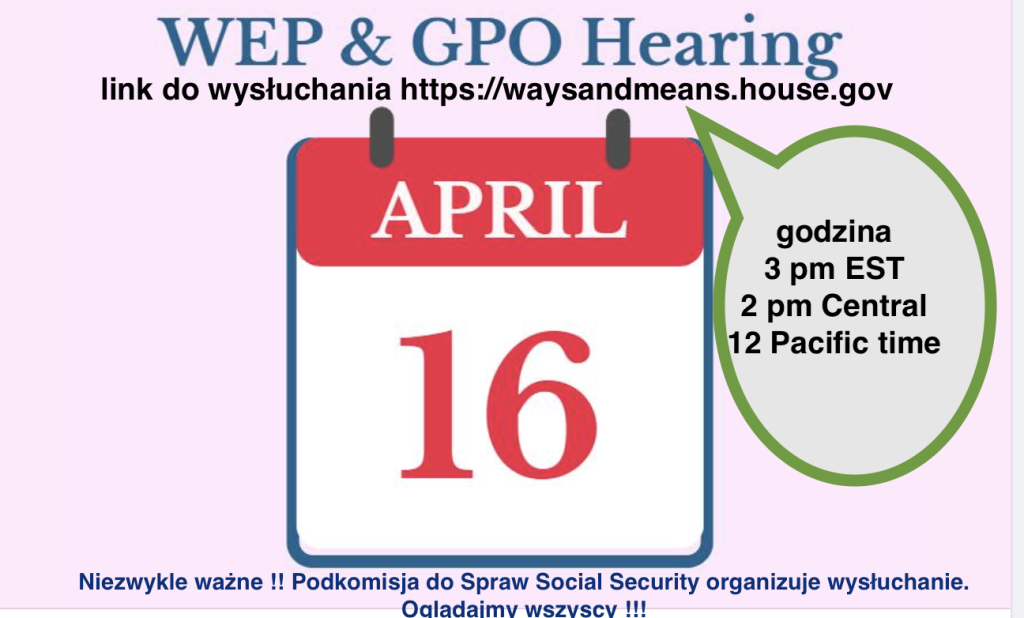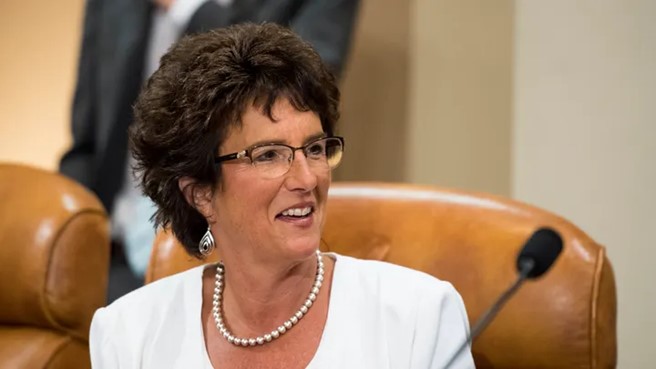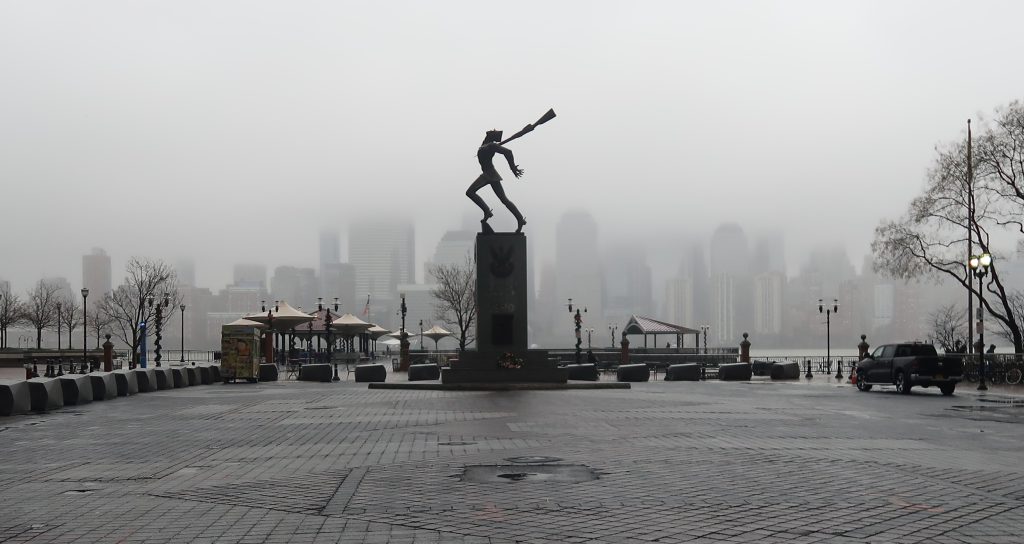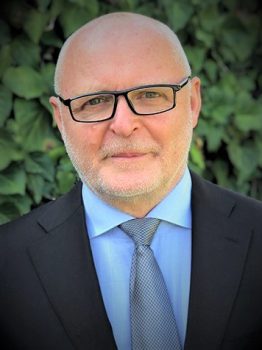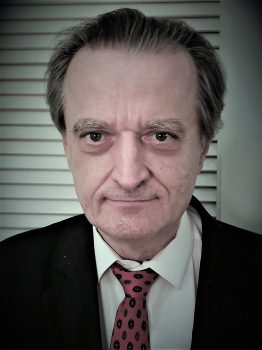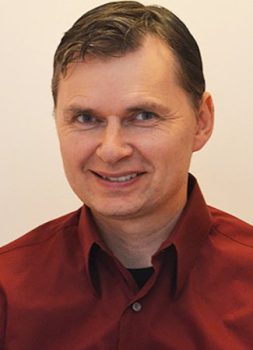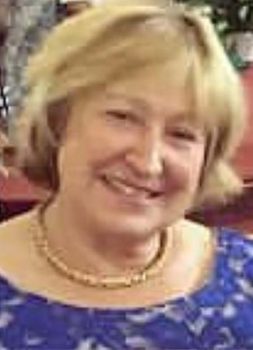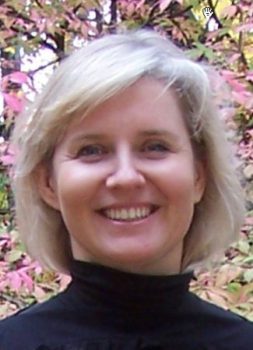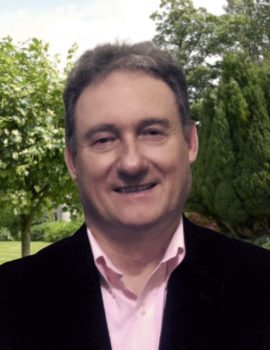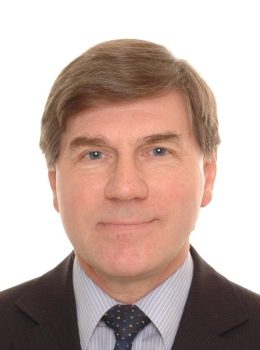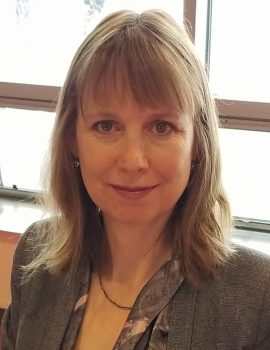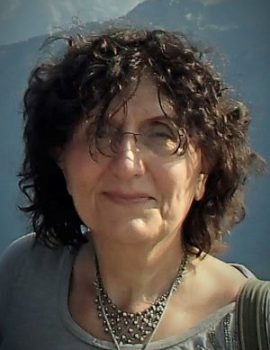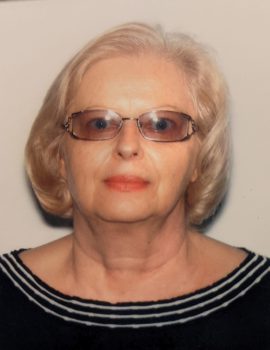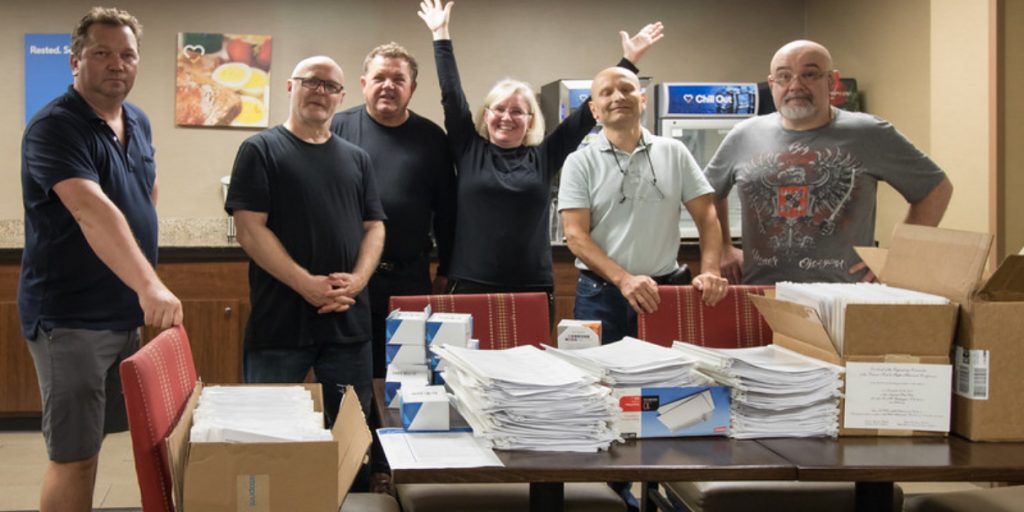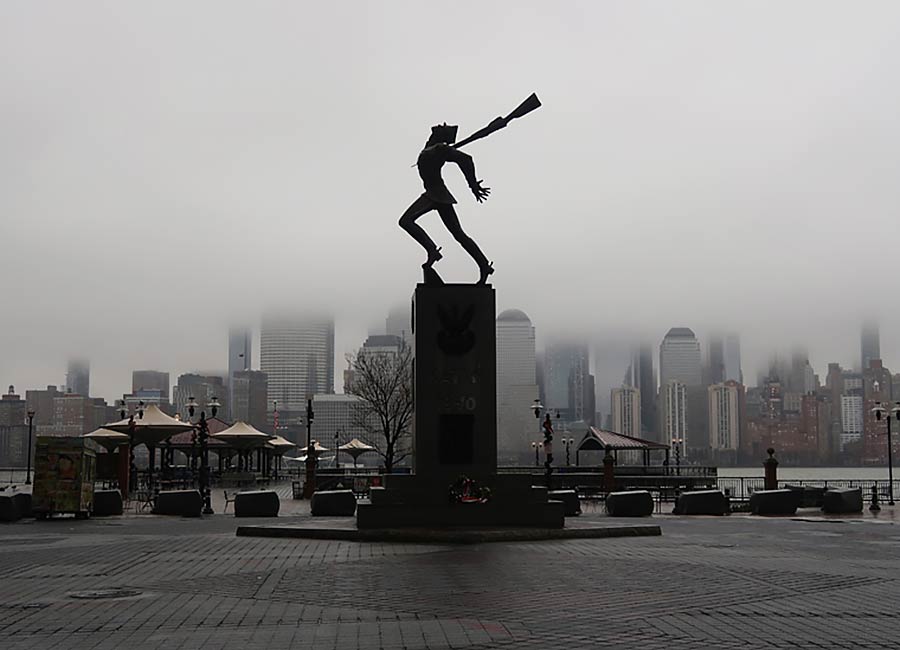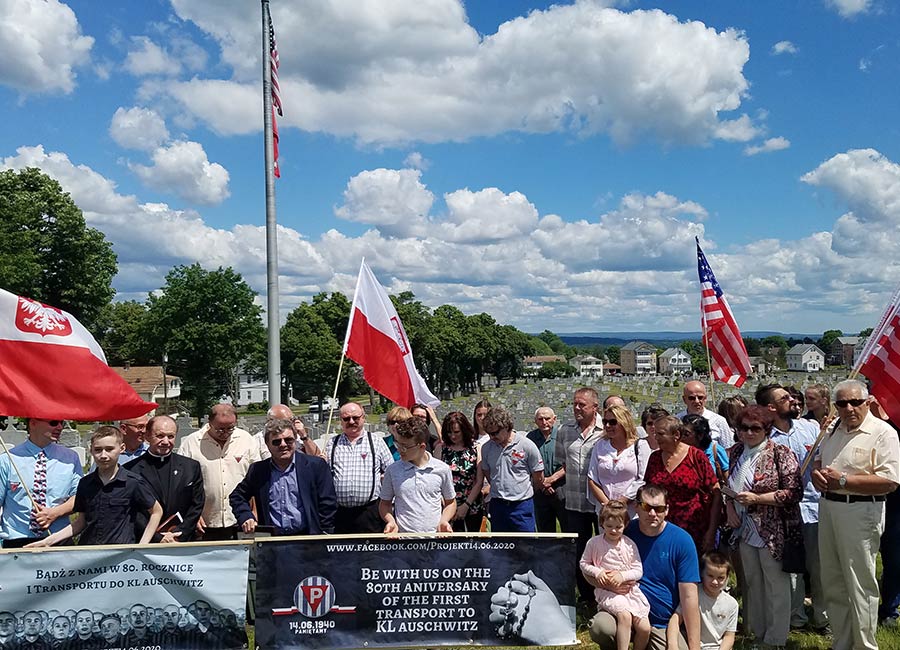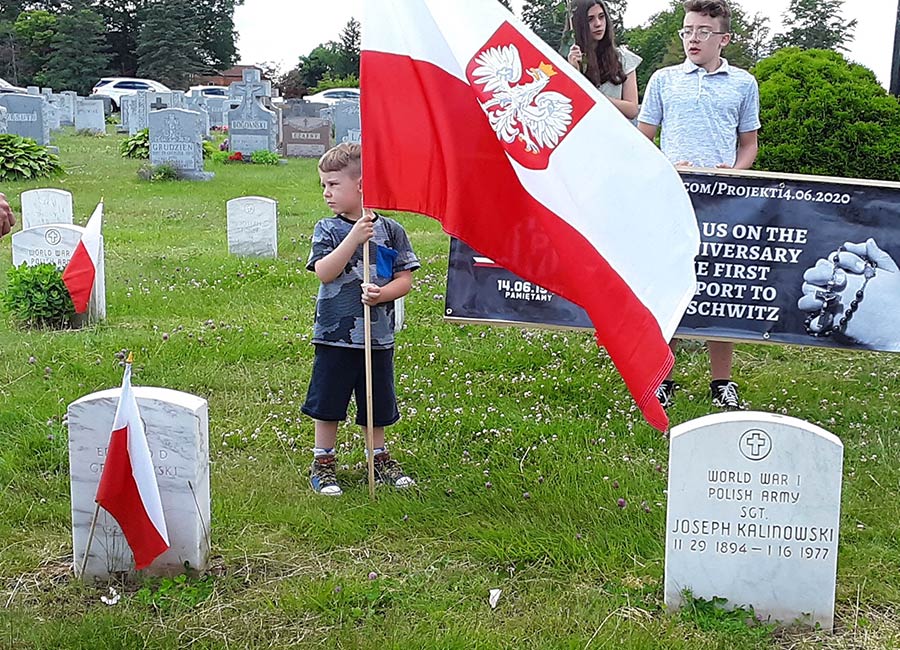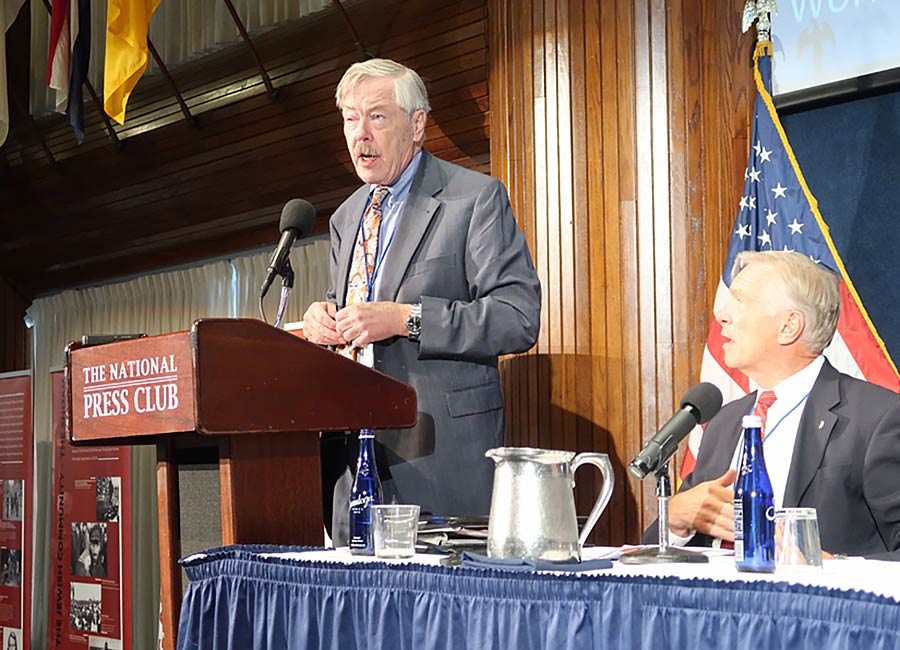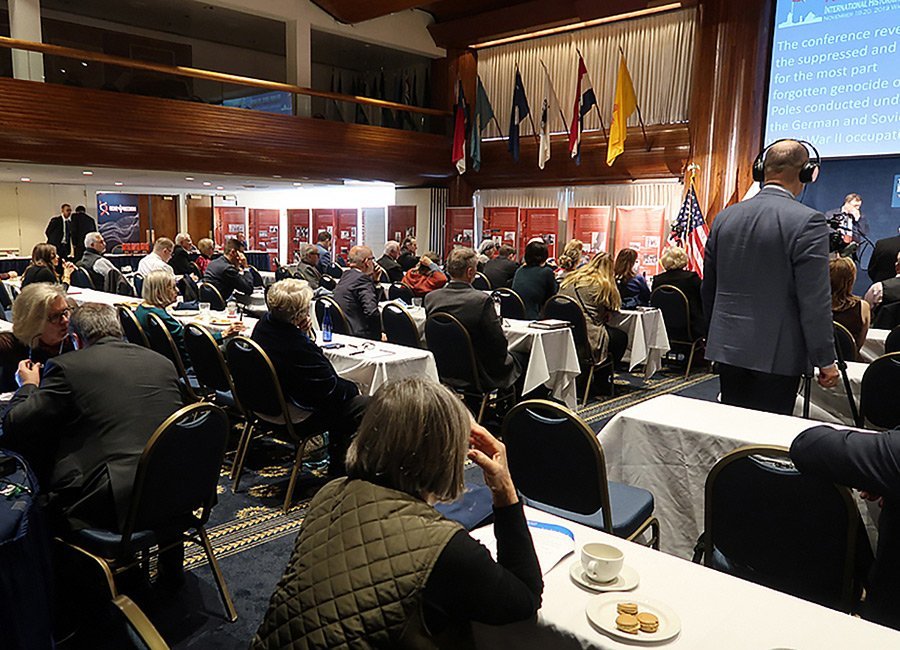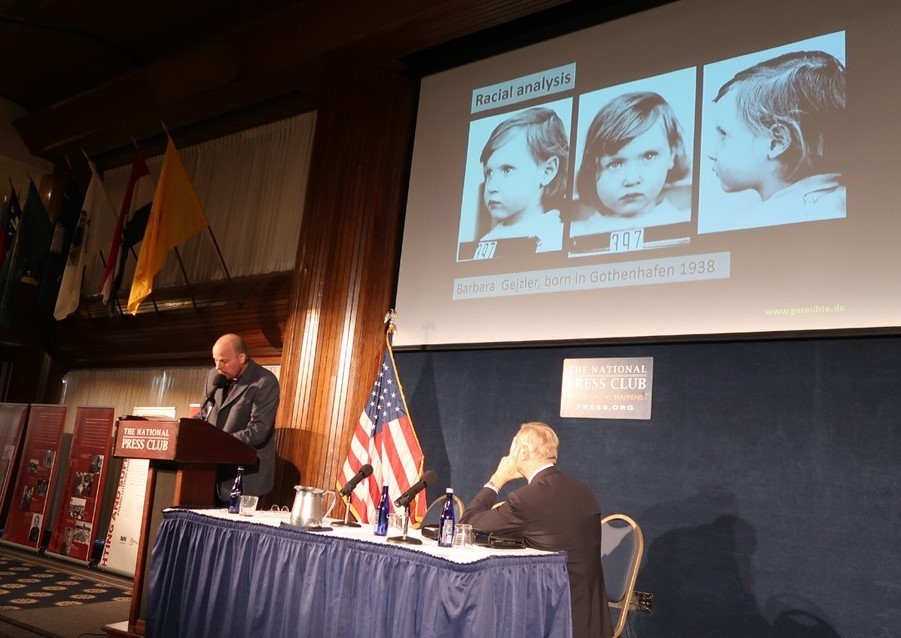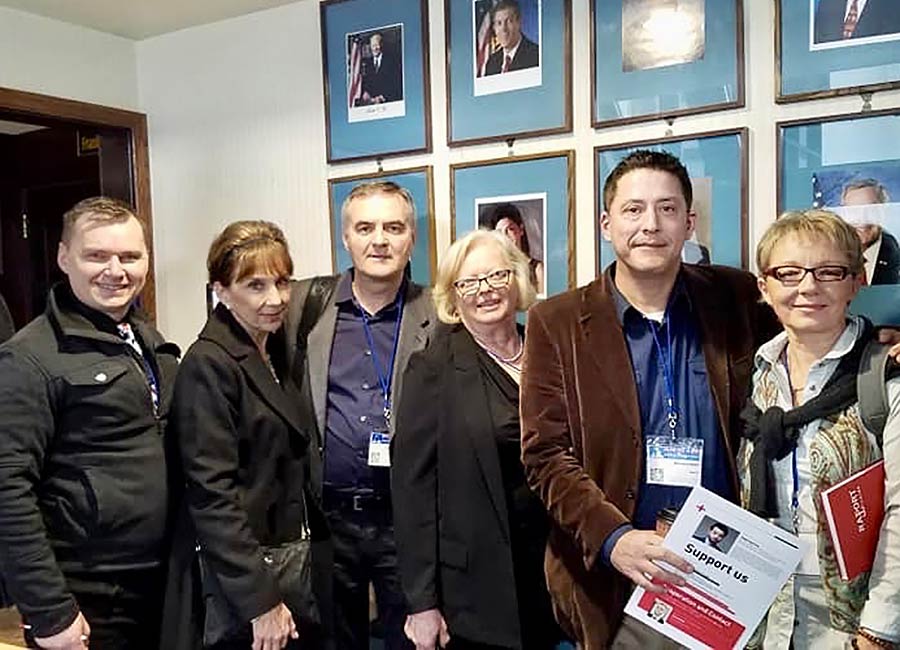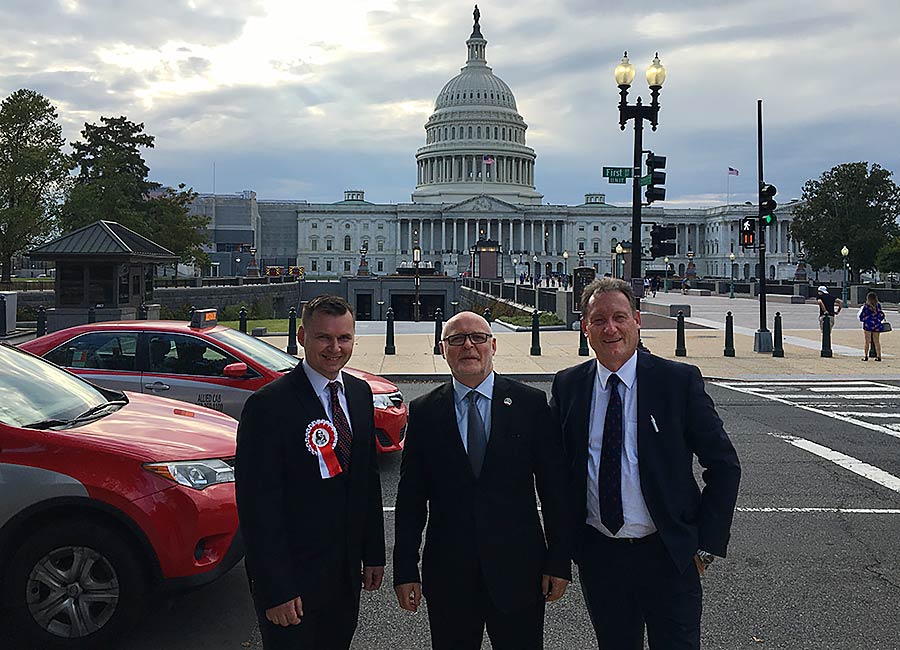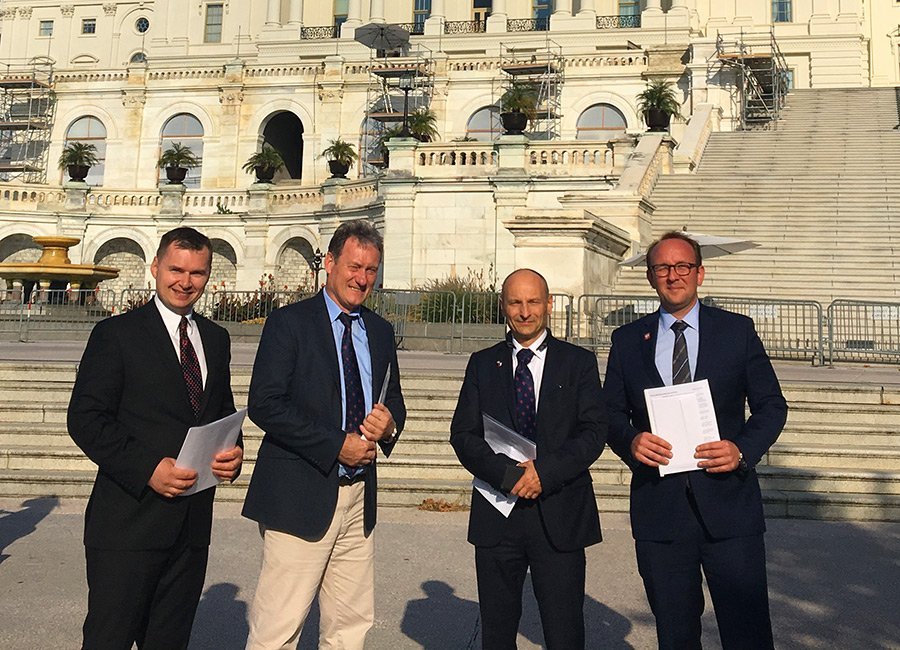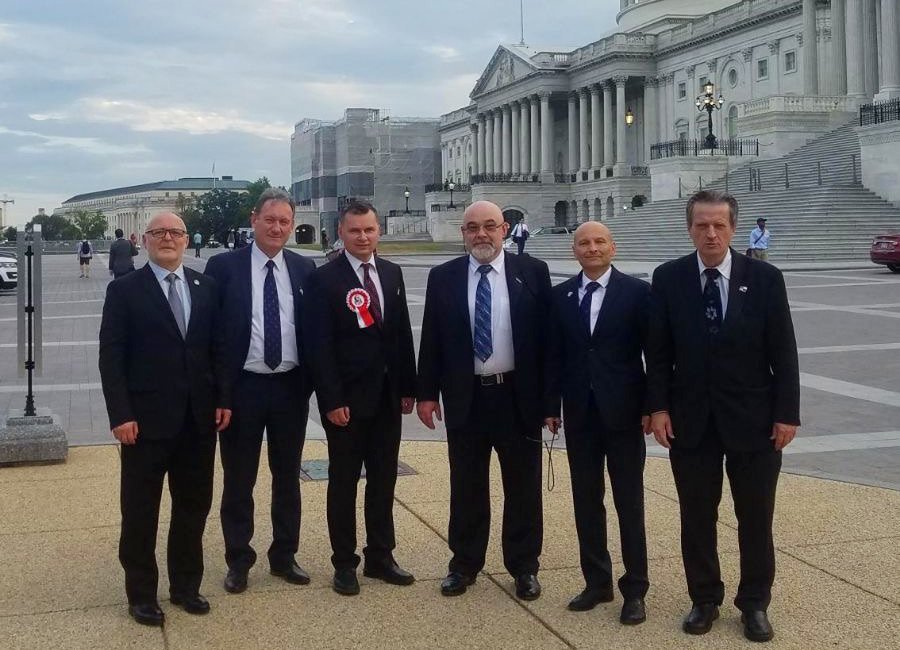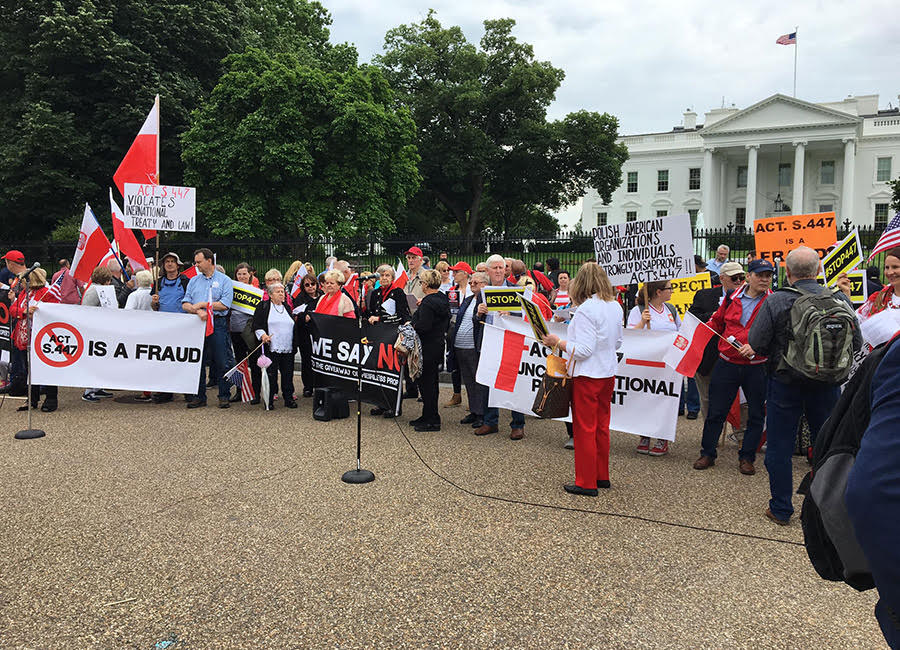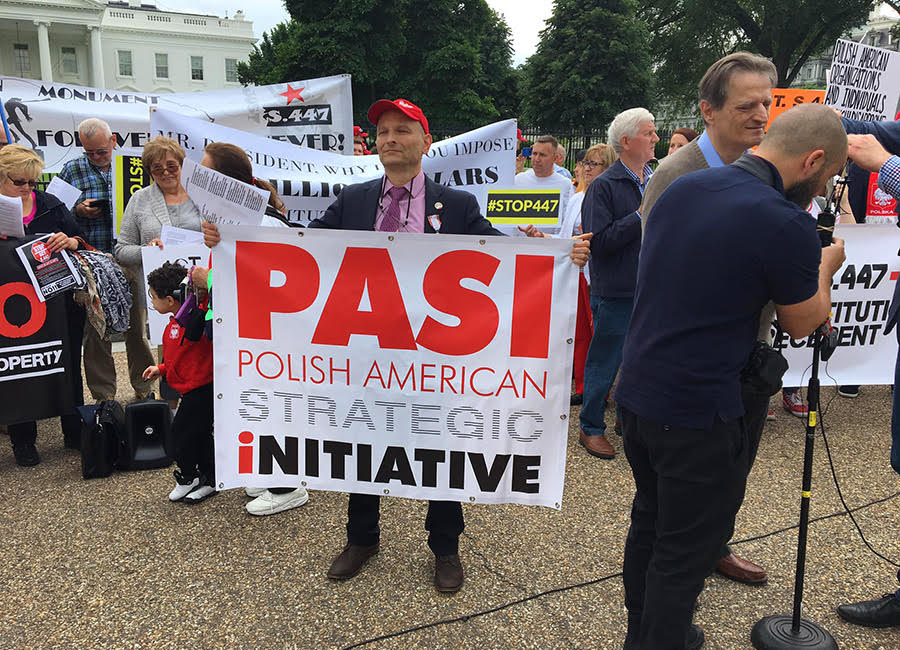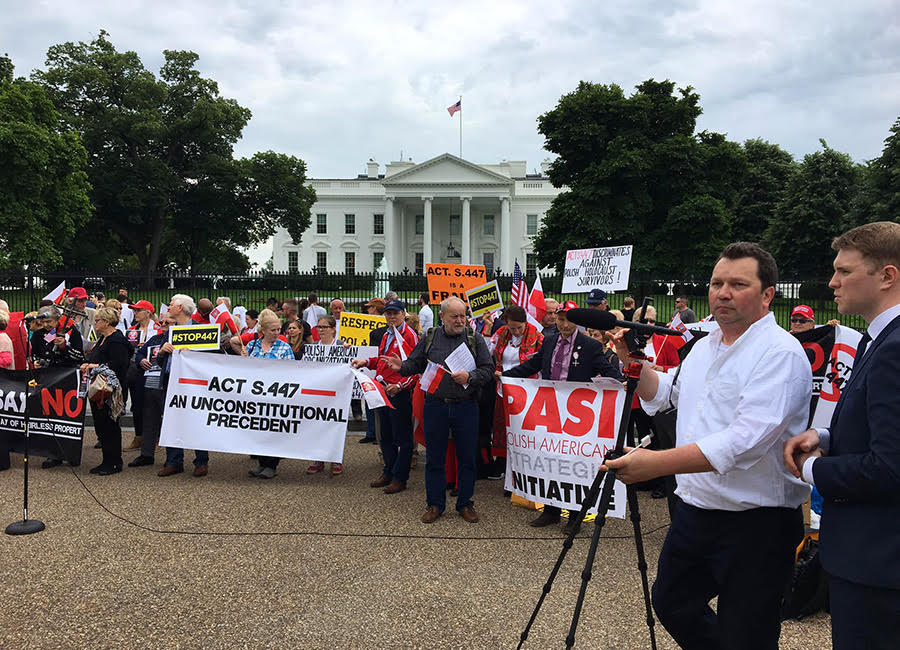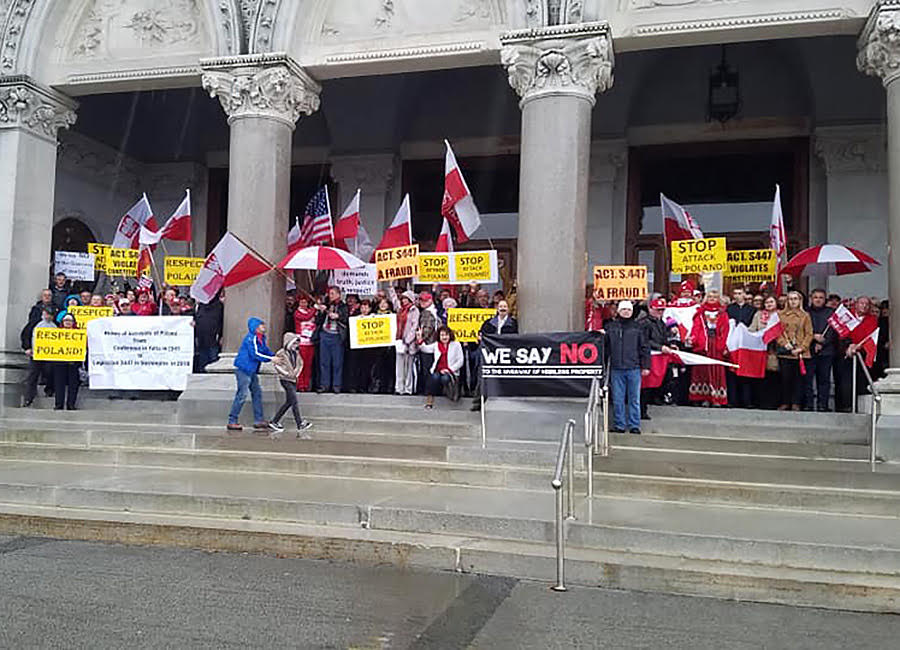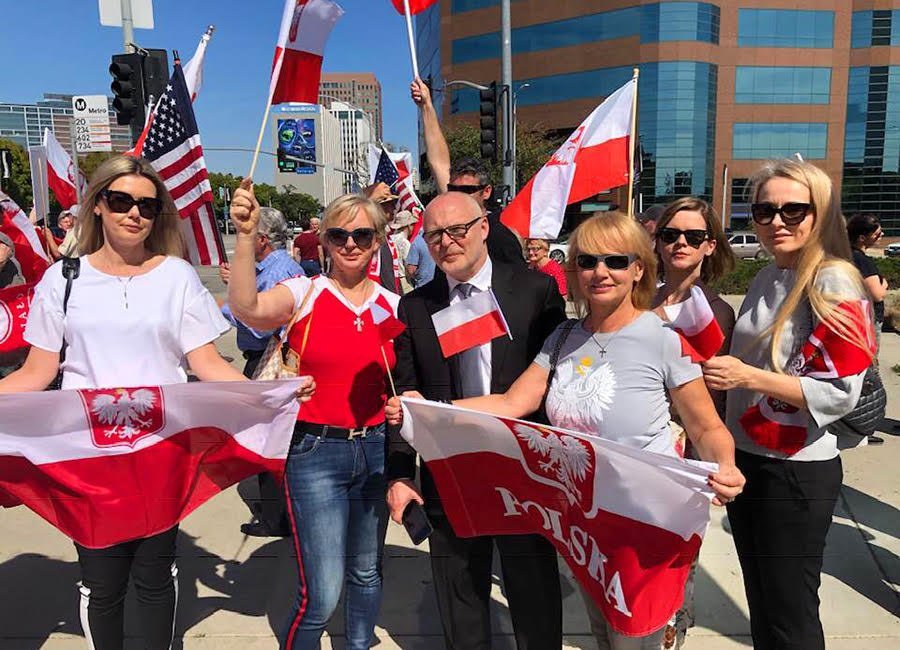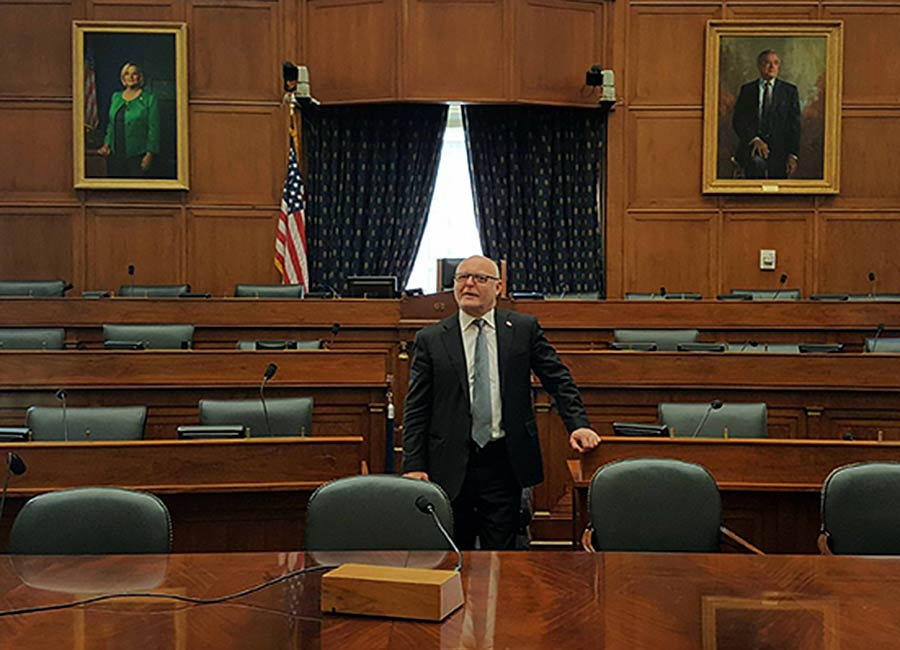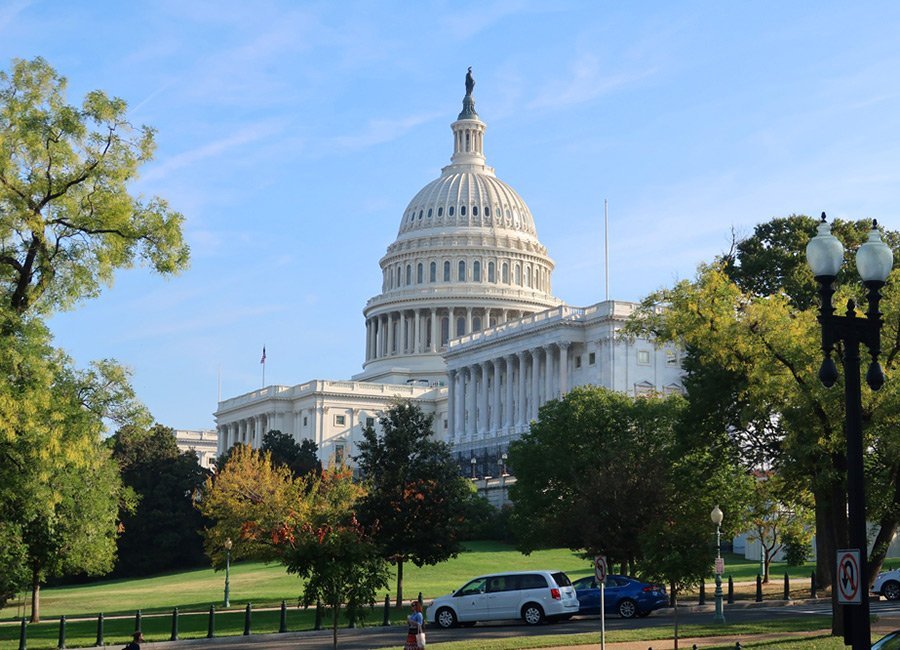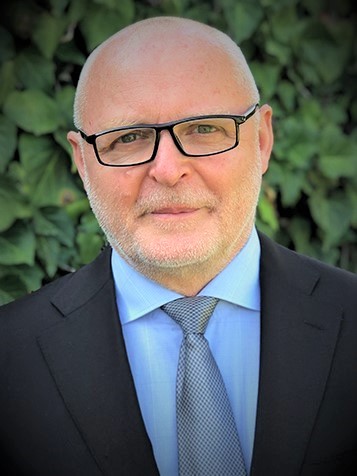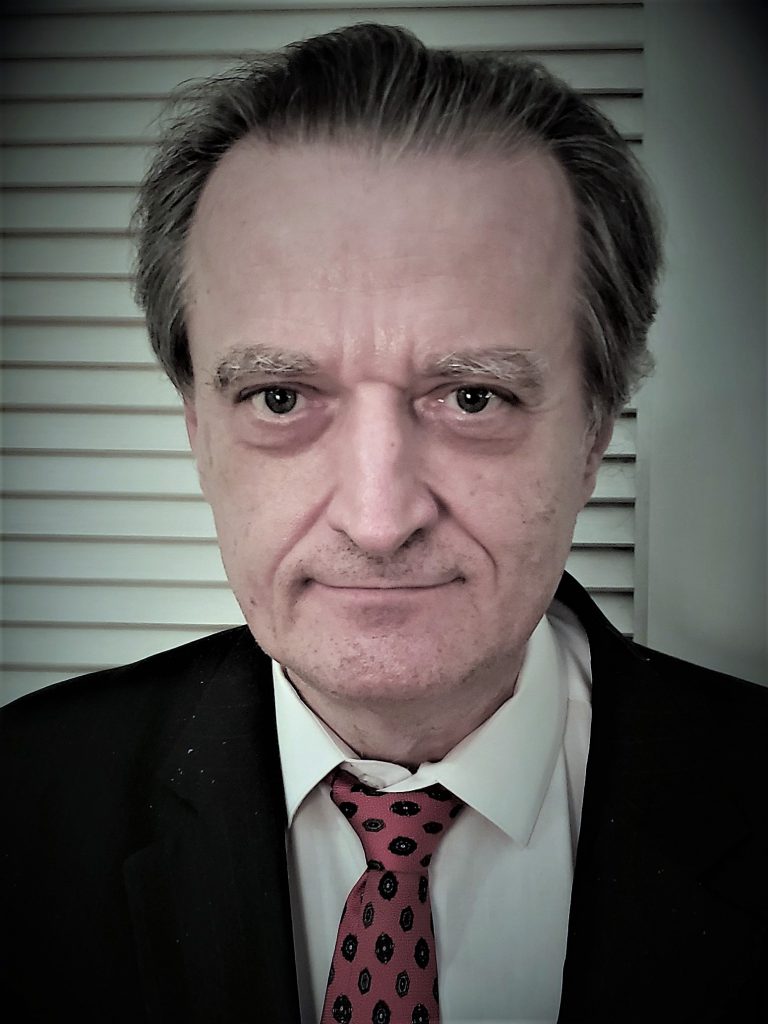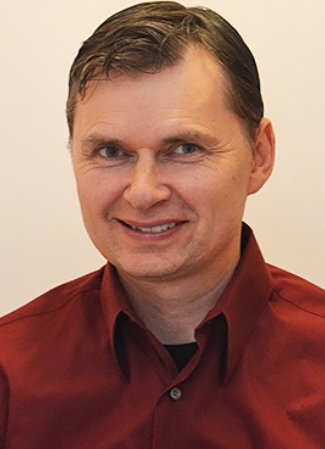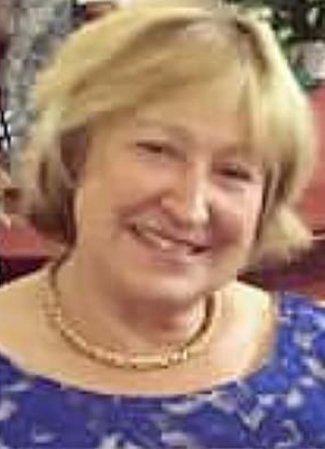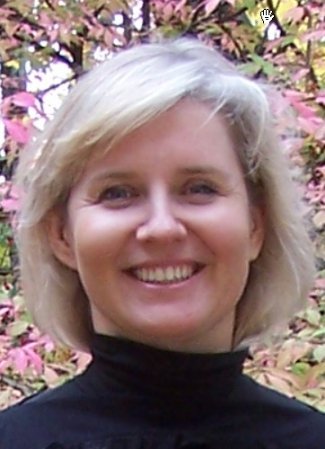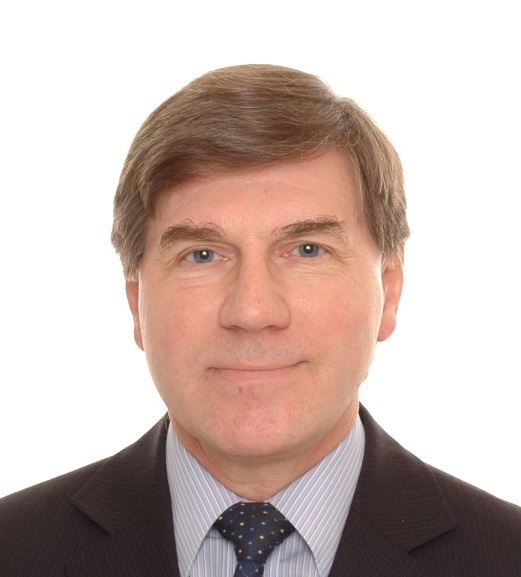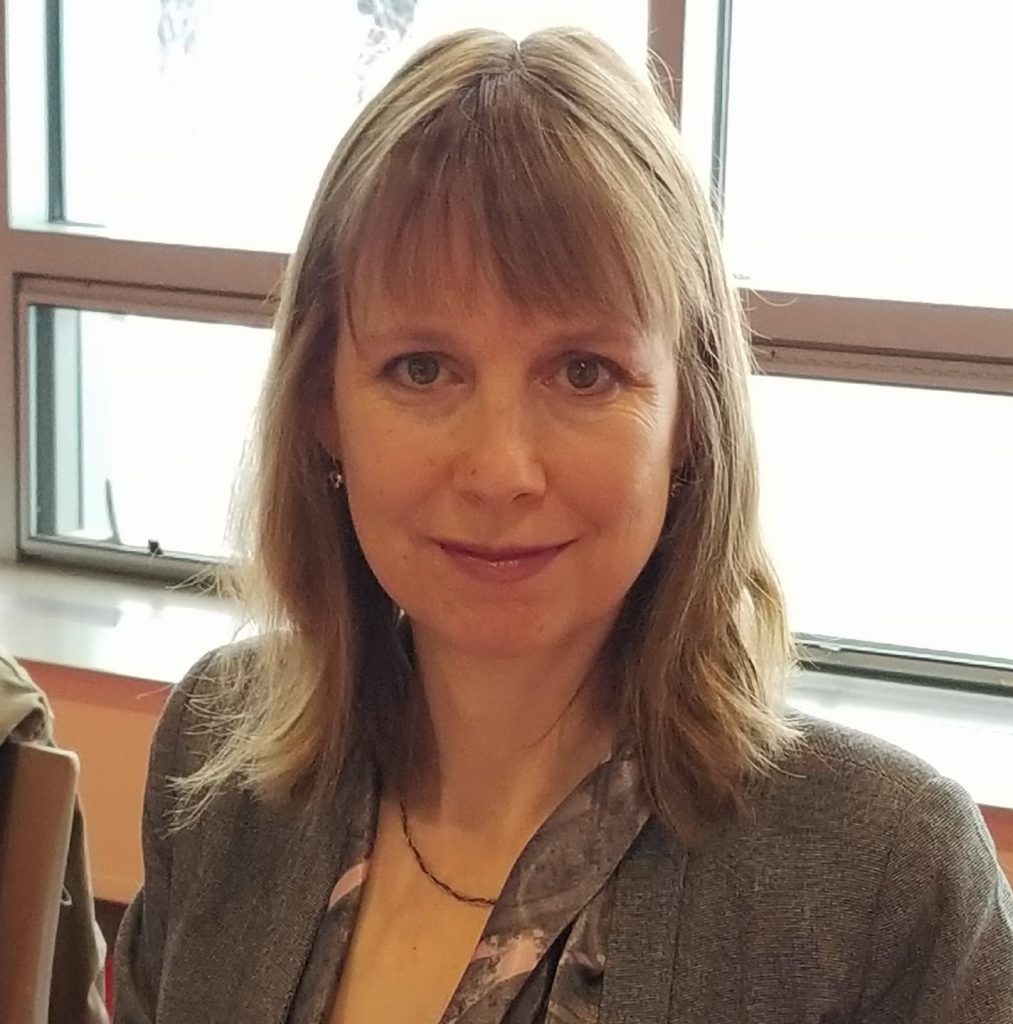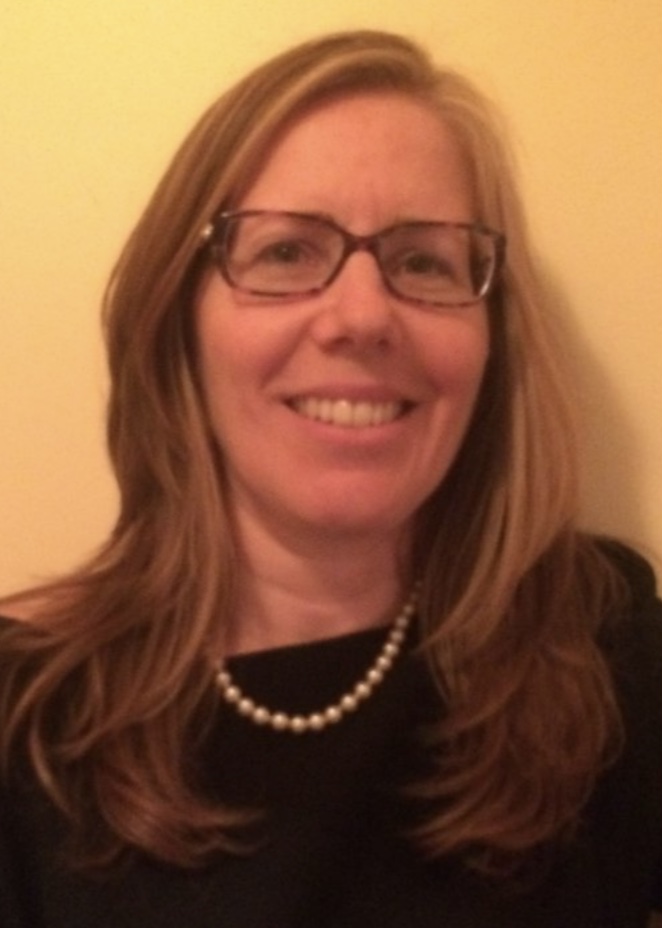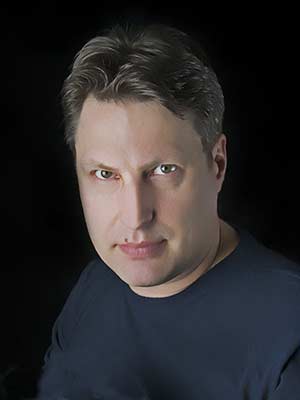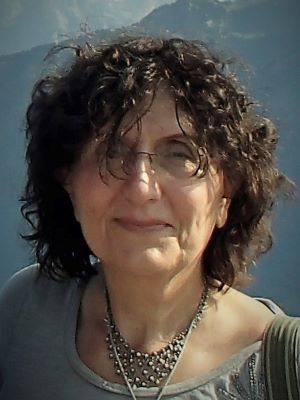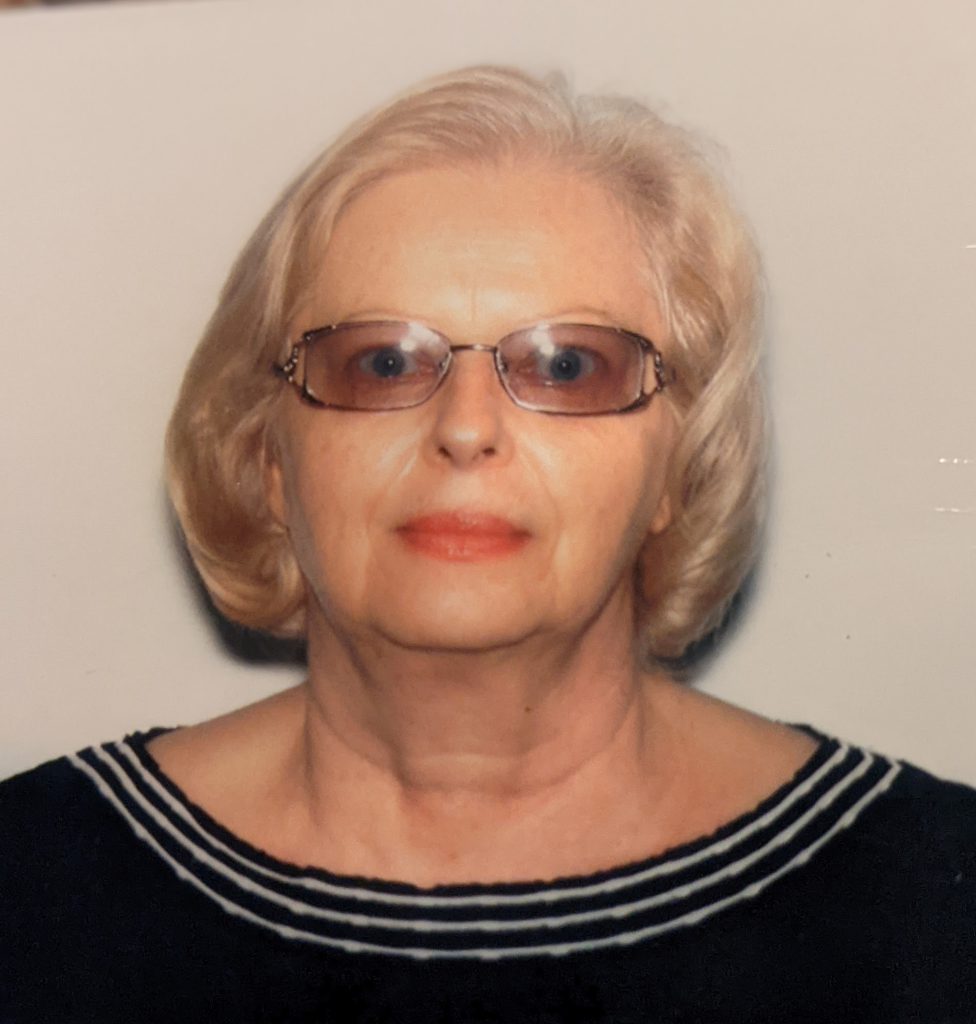Polish American
Strategic Initiative
Building a Better America Through Inclusion and Honesty
An important information all Polish American retirees and soon-to-be-retirees need to know. Ważna informacja, o której powinni wiedzieć wszyscy emerytowani Amerykanie polskiego pochodzenia oraz ci, którzy niedługo nabędą prawa do emerytury w USA
Deadline: September 30, 2025.
An executive order titled “Modernizing Payments to and From America’s Bank Account” mandates that all federal benefit payments must be made electronically by September 30, 2025.
This includes:
– Social Security
– SSI & SSDI
– Tax refunds
– Federal vendor payments
Acceptable digital payment methods include:
– Direct deposit to a bank account
– Debit/prepaid cards
– Digital wallets
– Real-time payment systems
What You Need to Do:
– Enroll in direct deposit at SSA.gov
– Update your contact and banking information
– Watch for fraud: SSA and U.S. Treasury will never charge to enroll or expedite benefits
– Report hardship to SSA or the Electronic Payment Solution Center to discuss exemptions
⸻
2. New Login Requirement for SSA Accounts.
Effective: June 7, 2025.
You can no longer log into your “my Social Security” account with your old SSA username and password. You must now use:
– Login.gov – https://www.login.gov
– ID.me – https://www.id.me
You can still verify your identity using:
– Landline phone calls
– Security keys
– Backup codes
– Video call verification (ID.me only)
Support Info:
– Login.gov Help: https://www.login.gov/help
– ID.me Help Center: https://help.id.me/
Note: SSA no longer provides assistance for online login issues. All help must come from Login.gov or ID.me.
Termin ostateczny: 30 września 2025 r.
Na mocy zarządzenia wykonawczego zatytułowanego „Modernizacja płatności do i z konta bankowego Ameryki”, wszystkie federalne wypłaty świadczeń muszą być realizowane wyłącznie w formie elektronicznej do dnia 30 września 2025 r. Dotyczy to m.in.:
• Świadczeń Social Security
• SSI i SSDI
• Zwrotów podatkowych
• Płatności dla federalnych kontrahentów
Akceptowane formy płatności cyfrowej:
• Przelew bezpośredni na konto bankowe
• Karty debetowe / przedpłacone
• Portfele cyfrowe
• Systemy płatności w czasie rzeczywistym
Co należy zrobić:
• Zarejestruj się do przelewu bezpośredniego na SSA.gov
• Zaktualizuj swoje dane kontaktowe i informacje bankowe
• Uważaj na oszustwa: SSA i Departament Skarbu USA nigdy nie pobierają opłat za rejestrację ani przyspieszenie wypłat
• W przypadku trudności finansowych zgłoś się do SSA lub Centrum Rozwiązań Płatności Elektronicznych, aby omówić możliwe wyjątki
⸻
2. Nowy Wymóg Logowania do Kont SSA
Obowiązuje od: 7 czerwca 2025 r.
Nie można już logować się do konta „my Social Security” za pomocą starej nazwy użytkownika i hasła SSA. Od teraz wymagane jest użycie jednego z systemów:
• Login.gov – https://www.login.gov
• ID.me – https://www.id.me
Weryfikacja tożsamości nadal jest możliwa za pomocą:
• Połączeń telefonicznych na telefon stacjonarny
• Fizycznych kluczy zabezpieczających
• Kodów zapasowych
• Wideoweryfikacji (tylko przez ID.me)
Pomoc techniczna:
• Pomoc Login.gov: https://www.login.gov/help
• Centrum Pomocy ID.me: https://help.id.me/
Uwaga: SSA nie zapewnia już pomocy w przypadku problemów z logowaniem online. Cała pomoc techniczna jest teraz dostępna wyłącznie przez Login.gov lub ID.me.
POSITION OF AMERICAN POLISH ORGANIZATIONS ON
THE ELECTION OF THE PRESIDENT OF THE REPUBLIC OF POLAND IN 2025.
STANOWISKO AMERYKAŃSKICH ORGANIZACJI POLONIJNYCH W SPRAWIE
WYBORÓW PREZYDENTA RZECZYPOSPOLITEJ POLSKIEJ W 2025 ROKU.
The presidential elections in 2025 will be a key moment for the future of Poland. The process of deepening the federalization of the European Union, supported by some political circles in the country, including in particular those associated with Donald Tusk and Rafał Trzaskowski, raises our justified concerns. Further transfer of key competences to EU institutions, dominated by the largest member states, and especially Germany, may result in a weakening of Poland’s position, the progressive de-industrialization of the country and a limitation, or even the loss of our sovereignty.
In light of these challenges, we support Karol Nawrocki’s candidacy for the office of the President of the Republic of Poland. His previous activities, especially in the area of cultivating Polish national identity, allow us to believe that he will be able to defend Poland’s interests more effectively than his opponent, both domestically and internationally.
We call on Poles at home and abroad to consciously participate in the presidential elections in 2025 and support Karol Nawrocki in the upcoming round of elections. Let us take care of Poland’s future together in these difficult times!
May 29, 2025
Signed:Jerzy Bogdziewicz, President of the Florida Division of the Polish American Congress
Richard Brzozowski, President of the New York – Long Island Division of the Polish American Congress
Andrzej Burghardt, President of the New Jersey Division of the Polish American Congress
Miroslawa Dulczewska-Miller, Founder & Honorary President, Polonia for Poland
Krzysztof Gajda, President of the Association of Poles in Texas
Jolanta Hałaczkiewicz, President of the Michigan Division of the Polish American Congress
Edward Wojciech Jeśman, President, Polish American Strategic Initiative (PASI)
and President of the Polish American Congress of Southern California
Tomasz Kącki, President, Polish American Congress – Ohio Division
Tomasz Kołodziej, President of the Washington/Maryland/Virginia Division – Polish American Congress
Leszek Pawlik, President, Coalition of Polish Americans
Andrzej Prokopczuk, President of the Northern California Division of the Polish American Congress
Brian Rusk, National Director, 1st Vice President, Polish American Congress, Western New York Division
Bożena Celina Urbankowska, President of the Polish American Congress of Northern New Jersey
Marek Waniołka, President of the Polish American Congress of Missouri
Wiesław Wierzbowski, President of the Eastern Massachusetts Division of the Polish American Congress
Wybory prezydenckie w 2025 roku będą momentem kluczowym dla przyszłości Polski. Proces pogłębiania federalizacji Unii Europejskiej, popierany przez niektóre środowiska polityczne w kraju, w tym szczególnie te związane z Donaldem Tuskiem i Rafałem Trzaskowskim, budzi nasze uzasadnione obawy. Dalsze przekazywanie kluczowych kompetencji na rzecz instytucji unijnych, zdominowanych przez największe państwa członkowskie, a szczególnie przez Niemcy, może skutkować osłabieniem pozycji Polski, postępującą de-industrializacją kraju oraz ograniczeniem, lub nawet w końcu utratą naszej suwerenności.
W świetle tych wyzwań popieramy kandydaturę Karola Nawrockiego na urząd Prezydenta Rzeczypospolitej Polskiej. Jego dotychczasowa działalność, zwłaszcza w obszarze pielęgnowania polskiej tożsamości narodowej, pozwala sądzić, że będzie on w stanie skuteczniej niż jego kontrkandydat bronić interesów Polski tak w kraju, jak i na arenie międzynarodowej.
Wzywamy Polaków w kraju i za granicą do świadomego udziału w wyborach prezydenckich w 2025 roku oraz poparcia Karola Nawrockiego w nadchodzącej turze wyborów. Zadbajmy wspólnie o przyszłość Polski w tych trudnych czasach!
29 maja 2025
Podpisano:Jerzy Bogdziewicz, Prezes Wydziału Floryda Kongresu Polonii Amerykańskiej
Richard Brzozowski, Prezes Wydziału New York – Long Island Kongresu Polonii Amerykańskiej
Andrzej Burghardt, Prezes Wydziału New Jersey Kongresu Polonii Amerykańskiej
Miroslawa Dulczewska-Miller, Founder & Honorary President, Polonia for Poland
Krzysztof Gajda, Prezes Stowarzyszenia Polaków w Teksasie
Jolanta Hałaczkiewicz, Prezes Wydziału Michigan Kongresu Polonii Amerykańskiej
Edward Wojciech Jeśman, President, Polish American Strategic Initiative (PASI)
i Prezes Kongresu Polonii Amerykańskiej Południowej Kalifornii
Tomasz Kącki, President, Polish American Congress – Ohio Division
Tomasz Kołodziej, Prezes Wydziału Waszyngton/Maryland/Wirginia – Kongres Polonii Amerykańskiej
Leszek Pawlik, President, Coalition of Polish Americans
Andrzej Prokopczuk, Prezes Wydziału Północnej Kalifornii Kongresu Polonii Amerykańskiej
Brian Rusk, National Director, 1st Vice President, Polish American Congress, Western New York Division
Bożena Celina Urbankowska, Prezes Kongresu Polonii Amerykańskiej Północnego New Jersey
Marek Waniołka, President of Polish American Congress of Missouri
Wiesław Wierzbowski, Prezes Wydziału Wschodniego Massachusetts Kongresu Polonii Amerykańskiej
Historic Victory for Polish Americans: Social Security Fairness Achieved
On January 5, 2025, President Joe Biden signed the Social Security Fairness Act into law, a momentous achievement that ends the unjust penalties imposed by the Windfall Elimination Provision (WEP) and the Government Pension Offset (GPO). These provisions had long resulted in unfair reductions to Social Security benefits for individuals who contributed to foreign pension systems, including Poland’s ZUS.
This historic legislation ensures that Polish Americans—and all those affected—will now receive their full Social Security benefits without reductions. Even more impactful, the law applies retroactively to January 2024, meaning beneficiaries will receive back payments for the previous year.
For thousands of retirees, this victory is not only a financial triumph—it is a powerful affirmation of fairness and recognition of their contributions.
The Role of PASI: A Victory Rooted in Advocacy
This landmark achievement is a testament to the relentless advocacy of the Polish American Strategic Initiative (PASI). For over four years, PASI has been a steadfast advocate for justice, rallying Polish Americans and collaborating with the National Task Force to fight for this cause. Despite encountering resistance, indifference, and outright opposition, PASI’s commitment never wavered.
This triumph is a shining example of how civic engagement and collaboration can drive tangible change within the Polish American community. It underscores the profound impact of collective action and a shared vision.
Let’s Build on This Momentum Together
Imagine the heights we can reach when we unite for a common cause. This victory proves that when we stand together, organized and resolute, we can make a difference. While this success was driven by a dedicated core group, it is clear that broader participation is essential for future progress.
Here’s How You Can Help:
~ Join PASI- Become an active member to strengthen our collective voice.
~ Donate: Support PASI’s ongoing work by contributing to our GoFundMe campaign
Link for donations
Another way to donate is to send a check or money order to:
PASI Educational Organization
c/o Gene Sokolowski, Ph.D.
13952 Greendale Drive
Woodbridge, VA 22191
(Write “WEP/GPO” in the Memo)
or directly send money to the PASI Edu bank account
Bank Name: TD Bank
Account Name: PASI Educational Organization
Account Number: 4407889687
Routing Number: 054001725
(Write “WEP/GPO” in the Memo)
~ Spread the Word:, Share PASI’s mission with friends, family, and colleagues to expand our reach and influence.
Visit Our WebPage to get involved today.
Let this victory inspire a new era of engagement and collaboration for Polish Americans. Together, we can continue to protect our rights, preserve our heritage, and achieve even greater milestones.
Together, we can tackle challenges, amplify our voice, and achieve even greater successes.
Civic engagement isn’t just about policies—it’s about building a community that uplifts and empowers all its members.
Let’s continue to make history—join PASI today and be the change!
Historyczne Zwycięstwo dla Polonii: Sprawiedliwość w Social Security Stała się Faktem
5 stycznia 2025 roku prezydent Joe Biden podpisał Ustawę o Sprawiedliwości w Social Security (Social Security Fairness Act), która zniosła dwa niesprawiedliwe przepisy federalne: Windfall Elimination Provision (WEP) oraz Government Pension Offset (GPO).
Te przepisy przez lata karały osoby, które odprowadzały składki do zagranicznych systemów emerytalnych, takich jak polski ZUS. Teraz wszyscy uprawnieni będą otrzymywać pełne świadczenia Social Security, bez jakichkolwiek redukcji.
Co więcej, ustawa działa wstecz od stycznia 2024 roku, co oznacza, że beneficjenci otrzymają również zaległe płatności za cały ubiegły rok. To przełomowa zmiana, która przyniesie ulgę tysiącom emerytów polskiego pochodzenia!
Rola PASI: zwycięstwo zakorzenione w orędownictwie
Ten sukces nie byłby możliwy bez niezłomnej determinacji Polish American Strategic Initiative (PASI), jedynej organizacji polonijnej, która przez cztery lata skutecznie walczyła o sprawiedliwość dla Polaków i innych imigrantów. Współpracując z National Task Force ( Krajową Grupą Zadaniową do spraw uchylenia WEP/GPO), PASI przeprowadziła kampanię, która pokonała liczne przeszkody, w tym opór i brak zainteresowania ze strony niektórych środowisk.
To zwycięstwo pokazuje, jak wiele można osiągnąć dzięki zaangażowaniu obywatelskiemu i współpracy.
Budujmy wszyscy razem momentum
Wyobraźcie sobie, co możemy razem osiągnąć w przyszłości! Chociaż ten sukces był wynikiem pracy małej grupy zaangażowanych osób, potrzebujemy większej liczby ludzi, którzy wniosą swoje talenty i czas, działając w duchu jedności i wspólnego dobra.
Jak możecie pomóc organizacji:
~ Przyłącz się do PASI- zostań członkiem PASI, aby wzmocnić nasz zbiorowy głos.
~ Wesprzyj bieżącą działalność PASI, dokonując wpłaty na naszą kampanię na GoFundMe. Zbiórka pieniędzy pod nazwą" Support PASI. Wesprzyj PASI"
Link do zbiórki
Inne sposoby przekazania pieniędzy na PASI to wysłanie czeku na
PASI Educational Organization
c/o Gene Sokolowski, Ph.D.
13952 Greendale Drive
Woodbridge, VA 22191
(Proszę zrobić dopisek WEP/GPO)
bezpośrednia wpłata na bank
Bank Name: TD Bank
Account Name: PASI Educational Organization
Account Number: 4407889687
Routing Number: 054001725
(Proszę zrobić dopisek WEP/GPO)
~ Rozpowszechniaj informacje: Podziel się misją PASI ze znajomymi, rodziną i współpracownikami, aby zwiększyć nasz zasięg i wpływ.
Niech to zwycięstwo, otworzy nową erę i zainspiruje Amerykanów polskiego pochodzenia do współpracy.
Odwiedź naszą stronę internetową, aby zaangażować się już dziś.
Razem możemy nadal chronić nasze prawa, zachować nasze dziedzictwo, wzmocnić nasz głos i osiągnąć jeszcze większe sukcesy
Zaangażowanie obywatelskie to nie tylko polityka—to budowanie społeczności, która wspiera i wzmacnia swoich członków.
Razem możemy pisać historię—dołącz do PASI już dziś i bądź częścią zmiany!
Historic Victory for Polish Americans: Social Security Fairness Achieved
On January 5, 2025, President Joe Biden signed the Social Security Fairness Act into law, a momentous achievement that ends the unjust penalties imposed by the Windfall Elimination Provision (WEP) and the Government Pension Offset (GPO). These provisions had long resulted in unfair reductions to Social Security benefits for individuals who contributed to foreign pension systems, including Poland’s ZUS.
This historic legislation ensures that Polish Americans—and all those affected—will now receive their full Social Security benefits without reductions. Even more impactful, the law applies retroactively to January 2024, meaning beneficiaries will receive back payments for the previous year.
For thousands of retirees, this victory is not only a financial triumph—it is a powerful affirmation of fairness and recognition of their contributions.
The Role of PASI: A Victory Rooted in Advocacy
This landmark achievement is a testament to the relentless advocacy of the Polish American Strategic Initiative (PASI). For over four years, PASI has been a steadfast advocate for justice, rallying Polish Americans and collaborating with the National Task Force to fight for this cause. Despite encountering resistance, indifference, and outright opposition, PASI’s commitment never wavered.
This triumph is a shining example of how civic engagement and collaboration can drive tangible change within the Polish American community. It underscores the profound impact of collective action and a shared vision.
Let’s Build on This Momentum Together
Imagine the heights we can reach when we unite for a common cause. This victory proves that when we stand together, organized and resolute, we can make a difference. While this success was driven by a dedicated core group, it is clear that broader participation is essential for future progress.
Here’s How You Can Help:
~ Join PASI- Become an active member to strengthen our collective voice. |
|
~ Donate: Support PASI’s ongoing work by contributing to our GoFundMe campaign |
|
Link for donations |
|
Another way to donate is to send a check or money order to: |
|
PASI Educational Organization |
|
c/o Gene Sokolowski, Ph.D. |
|
13952 Greendale Drive |
|
Woodbridge, VA 22191 |
|
(Write “WEP/GPO” in the Memo) |
|
or directly send money to the PASI Edu bank account |
|
Bank Name: TD Bank |
|
Account Name: PASI Educational Organization |
|
Account Number: 4407889687 |
|
Routing Number: 054001725 |
|
(Write “WEP/GPO” in the Memo) |
|
~ Spread the Word:, Share PASI’s mission with friends, family, and colleagues to expand our reach and influence. |
|
Visit Our WebPage to get involved today. |
|
Let this victory inspire a new era of engagement and collaboration for Polish Americans. Together, we can continue to protect our rights, preserve our heritage, and achieve even greater milestones. |
|
Together, we can tackle challenges, amplify our voice, and achieve even greater successes. |
|
Civic engagement isn’t just about policies—it’s about building a community that uplifts and empowers all its members. |
|
Let’s continue to make history—join PASI today and be the change! |
Historyczne Zwycięstwo dla Polonii: Sprawiedliwość w Social Security Stała się Faktem
5 stycznia 2025 roku prezydent Joe Biden podpisał Ustawę o Sprawiedliwości w Social Security (Social Security Fairness Act), która zniosła dwa niesprawiedliwe przepisy federalne: Windfall Elimination Provision (WEP) oraz Government Pension Offset (GPO).
Te przepisy przez lata karały osoby, które odprowadzały składki do zagranicznych systemów emerytalnych, takich jak polski ZUS. Teraz wszyscy uprawnieni będą otrzymywać pełne świadczenia Social Security, bez jakichkolwiek redukcji.
Co więcej, ustawa działa wstecz od stycznia 2024 roku, co oznacza, że beneficjenci otrzymają również zaległe płatności za cały ubiegły rok. To przełomowa zmiana, która przyniesie ulgę tysiącom emerytów polskiego pochodzenia!
Rola PASI: zwycięstwo zakorzenione w orędownictwie
Ten sukces nie byłby możliwy bez niezłomnej determinacji Polish American Strategic Initiative (PASI), jedynej organizacji polonijnej, która przez cztery lata skutecznie walczyła o sprawiedliwość dla Polaków i innych imigrantów. Współpracując z National Task Force ( Krajową Grupą Zadaniową do spraw uchylenia WEP/GPO), PASI przeprowadziła kampanię, która pokonała liczne przeszkody, w tym opór i brak zainteresowania ze strony niektórych środowisk.
To zwycięstwo pokazuje, jak wiele można osiągnąć dzięki zaangażowaniu obywatelskiemu i współpracy.
Budujmy wszyscy razem momentum
Wyobraźcie sobie, co możemy razem osiągnąć w przyszłości! Chociaż ten sukces był wynikiem pracy małej grupy zaangażowanych osób, potrzebujemy większej liczby ludzi, którzy wniosą swoje talenty i czas, działając w duchu jedności i wspólnego dobra.
Jak możecie pomóc organizacji:
~ Przyłącz się do PASI- zostań członkiem PASI, aby wzmocnić nasz zbiorowy głos. |
|
~ Wesprzyj bieżącą działalność PASI, dokonując wpłaty na naszą kampanię na GoFundMe. Zbiórka pieniędzy pod nazwą" Support PASI. Wesprzyj PASI" |
|
Link do zbiórki |
|
Inne sposoby przekazania pieniędzy na PASI to wysłanie czeku na |
|
PASI Educational Organization |
|
c/o Gene Sokolowski, Ph.D. |
|
13952 Greendale Drive |
|
Woodbridge, VA 22191 |
|
(Proszę zrobić dopisek WEP/GPO) |
|
bezpośrednia wpłata na bank |
|
Bank Name: TD Bank |
|
Account Name: PASI Educational Organization |
|
Account Number: 4407889687 |
|
Routing Number: 054001725 |
|
(Proszę zrobić dopisek WEP/GPO) |
|
~ Rozpowszechniaj informacje: Podziel się misją PASI ze znajomymi, rodziną i współpracownikami, aby zwiększyć nasz zasięg i wpływ. |
|
Niech to zwycięstwo, otworzy nową erę i zainspiruje Amerykanów polskiego pochodzenia do współpracy. |
|
Odwiedź naszą stronę internetową, aby zaangażować się już dziś. |
|
Razem możemy nadal chronić nasze prawa, zachować nasze dziedzictwo, wzmocnić nasz głos i osiągnąć jeszcze większe sukcesy |
|
Zaangażowanie obywatelskie to nie tylko polityka—to budowanie społeczności, która wspiera i wzmacnia swoich członków. |
|
Razem możemy pisać historię—dołącz do PASI już dziś i bądź częścią zmiany! |
Summary of PASI Actions in the National Campaign to pass HR 82,
Social Security Fairness Act
The Polish American Strategic Initiative (PASI), a nonprofit organization that advocates for the political interests of the Polish American community, was the only Polish American organization that was actively and continually involved in the national campaign that urged Congress to pass HR 82, Social Security Fairness Act of 2023. HR 82 was passed by the House on 12 November 2024 with 372 votes and was passed by the Senate on 21 December 2024 with 76 votes. HR 82 was signed into law by President Biden on 5 January 2025.
For the last 42 years, the Windfall Elimination Provision (WEP) unfairly reduced the Social Security pensions of 2.1 million retirees who earned a non-Social Security pension. Most of those affected are retired public servants but also included are retirees who earned a foreign pension. As a result, a significant number of Polish Americans who earned a Polish pension were also affected. The Government Pension Offset (GPO) unfairly reduced the spousal and survivor benefits of spouses who earned a non-social Security pension. Fortunately, Polish Americans who earned a Polish pension are not affected by the GPO.
No previous legislative efforts were able to repeal these provisions, which unfairly harmed retirees, particularly those most vulnerable to financial hardship.
2021 - PASI Starts Researching WEP Issues.
From March 2021 to April 2021, PASI researches and identifies complex issues related to the WEP. PASI members Gene Sokolowski, Margaret Ciuraszkiewicz, Irena Gullion, Jacek Marczyński, Dianne Winsor, Peter Sroczyński, and Devon Gullion, together with Elzbieta Baumgartner, and Eugene Brzyski, who are experts on WEP and GPO, develop the PowerPoint Presentation “Town Hall Meeting" for Polish Americans and others who do not receive full social benefits or those who will be affected by WEP/GPO”. Piotr Sroczyński develops the video version of this presentation in which Tomek Jarmoszko is the speaker for the Polish audience and Dr. Gene Sokolowski is the speaker for the English audience.
Link to the Polish version
Link to the English version
On August 22, 2021, PASI invites Polonia organizations and individuals to educate them on the WEP and GPO at the Zoom Town Hall meeting, which explains how to fight for changing this unjust law and asks Polish American organizations to join our fight to repeal the WEP and GPO.
A Grass-Roots Movement Starts In 2020 and PASI Joins It at the End of August 2021
•
Rep. Rodney Davis (R-IL) sponsors HR 82, which is meant to repeal the WEP and GPO in the 117th Congress.
•
PASI begins its effort to repeal the WEP and GPO in September 2021 by joining the National WEP/GPO Repeal Task Force. PASI’s unrelenting effort will last for the next three-and-a-half years from August 2021 to January 2025.
•
The PASI core team consists of Dr. Gene Sokolowski, Margaret Ciuraszkiewicz, and Jacek Marczyński.
•
Task Force meetings take place each Monday and PASI is represented at the meetings by Dr. Gene Sokolowski and Margaret Ciuraszkiewicz.
•
Later in the process, Dr. Gene Sokolowski joins the newly-formed Task Force Steering Committee. Members of the Task Force’s Steering Committee are in regular contact with Representative Davis’s office.
From a Seemingly Impossible Goal to Victory – Our Timeline
2022: A Difficult Start
•
In January 2022, PASI issues an alert to PASI members and others to urge their Representatives to cosponsor HR 82.
•
PASI and the Task Force conduct a nonstop communications campaign using several communication channels including social media, newspapers, radio programs, church bulletins, and flyers posted at local businesses and public places.
•
Margaret Ciuraszkiewicz proposes establishing a communications system that allows any user of the PASI website to send prepared emails and letters to Representatives, and how to contact a Representative by phone. Jacek Marczyński builds a tool that enables this functionality. Later on, the functionality is enhanced to allow for users to be updated on Representatives’ positions on supporting HR 82.
•
The PASI Facebook page and Twitter account are used extensively for messaging in order to secure the required 290 cosponsors in the House.
•
PASI begins a non-stop call-for-action campaign directed at Representatives, Senators, the President and Vice-President, and the House Speaker to urge them to support HR 82. 650 PASI members and supporters are asked to send letters to each individual that were written largely by Dr. Sokolowski.
•
Margaret Ciuraszkiewicz sends emails out and Facebook posts with required action.
•
In March 2022, Ms. Baumgartner, in collaboration with PASI, writes an article “Co nowego w kongresie w sprawie Windfall Elimination Provision”.
•
PASI begins a campaign to identify Polish Americans who are impacted by WEP.
•
In April 2022, PASI and Ms. Baumgartner speak on Radio Chicago and invite Polish Americans to join PASI at the Zoom meeting that focuses on the WEP at this link
•
In April 2022, PASI organizes a petition directed at Representative John Larson, Chairman of the Subcommittee on Social Security, to pressure him to allow the vote on HR 82 to go forward. Signatures in support of the petition are collected by Margaret Ciuraszkiewicz from New York and Marie Glowacki from Albany, NY. They went to CT to collect signatures among Rep. Larsson constituents. After the signatures are collected, Mariusz Bielski delivers the petition to Mr. Larson’s office.
•
In May 2022, a “Day of Action” starts with Congressional visits by PASI and Task Force members, followed by a rally called “Repeal WEP & GPO – Washington Rally 2022”, and again followed by Congressional visits from PASI and Task Force members. Videos of the rally and other PASI and Task Force actions are at this link
•
PASI project coordinators, with Peter Sroczyński’s leadership, create a three-and-a-half-minute video of the rally and send it to all 435 House Members. The video is at this link
•
Several additional YouTube videos are created by PASI to educate Polish Americans on the WEP and GPO.
•
PASI issues several newsletters devoted to the repeal of WEP and GPO.
•
In July 2022, Dr. Sokolowski and Wojtek Jeśman, PASI President, appeal to Polish Americans to urge their Representatives to support HR 82. The videos are at this link and the other one
•
In September 2022, Wojtek Jeśman appeals to Polonia in a YouTube video to support HR 82. Please click here
•
In October 2022, during the Pulaski Day Parade in New York, volunteers distribute a Nowy Dziennik handout to parade participants with an article by Dr. Sokolowski on how to fight for repealing the WEP. The article’s title is “Zadziałajmy w sprawie swoich emerytur- wezwanie do działania” and it appeared in the October 1 - 7, 2022 issue.
•
2022 ends in disappointment. Even though HR 82 was placed on the Consensus Calendar by receiving more than the 290 cosponsors needed to place it on the House Floor for debate and a vote, the House Ways and Means Committee pulled the bill for mark-up.
•
The only way to put HR 82 back on the House Floor for a vote is to initiate a Discharge Petition. Unfortunately, not enough Members are able to be physically present on the House Floor to sign it before the 117th Congress ends.
2023: Momentum Builds
•
The 118th Congress begins and PASI is gratified that Representatives Graves (R-LA) and Spanberger (D-VA) now champion HR 82.
•
Dr. Sokolowski is a member of the Task Force Steering Committee that meets regularly with their staffers.
•
PASI produces flyers, podcasts, and videos appealing to Polonia, both in Polish and English, to join the fight for repealing the WEP and GPO. The videos are at these links:
first video
second video
third video
•
In February 2023, PASI launches a campaign in Polish Catholic churches in the metro areas of Illinois ( Zofia Chruszcz and Irena Patulska) and New York( Margaret Ciuraszkiewicz) to inform Polonia about the WEP/GPO fight and how to help PASI in this fight.
•
On March 18, 2023, PASI creates an online petition on behalf of Foreign Pension Recipients in 13 languages (English, Polish, French, German, Spanish, Albanian, Italian, Portuguese, Russian, Greek, Serbian, Chinese, Turkish) to appeal to other ethnic Americans who are also affected by the WEP and GPO. The petition is at this link
•
In June 2023, PASI members (Margaret Ciuraszkiewicz, Marie Glowacki, and Betty Markasevic) attend the festival “Little Poland in New Britain” in Connecticut to inform Polonia members about the petition and answer questions on how to fight for repeal of the WEP.
•
In addition to Task Force Steering Committee members, other stakeholder organizations attend the meetings hosted by the staffers of Representative Graves and Spanberger. These include the Fraternal Order of Police, International Association of Firefighters, National Association of Letter Carriers, California Retired Teachers Association, American Federation of Teachers, National Education Association, and various Federal and State retiree associations.
•
PASI and the Task Force continue their communications campaigns using social media and the PASI website to urge targeted Representatives to cosponsor HR 82 and urge targeted Senators to cosponsor HR 82’s companion bill S 597.
•
On September 13, 2023, Dr. Sokolowski is a speaker advocating for all Foreign Pension Recipients at a press conference held by Representatives Graves and Spanberger at the House Triangle podium on the Capitol Grounds.
•
On the same day, Dr. Sokolowski is a speaker advocating again for all Foreign Pension Recipients at an Advocacy Summit held by the Task Force on adjacent Capitol Grounds.
•
As part of PASI’s efforts to ensure that Polish pensioners no longer are WEP’ed, PASI assumed the lead within the Task Force to advocate for all Foreign Pension Recipients, which includes almost 117,000 retirees. Dr. Sokolowski coordinates the implementation of communications strategies with three organizations (American Citizens Abroad, Democrats Abroad, and Association of American Residents Overseas) that represent Americans working/retired abroad who were earning/earned a foreign pension and would be/were subject to the WEP.
•
Representing the concerns of affected Polish Americans, PASI submitted written comments requested by the Social Security Subcommittee at their November 2023 Hearing on HR 82. The comments explained precisely why the WEP was unjust for Foreign Pension Recipients.
•
In response to the Subcommittee’s request, PASI also submitted written testimonies of Polish Americans (Izabela Sadowska, Władysława Domaradzka, Anastazja Gierzban, Wioletta Bielecki, Stanislawa Kaczyński, Sławomir Dubiel, Czesława Koc-Dubiel) with a Polish pension who suffered financial hardship because of the WEP.
2024: Momentum Continues
•
PASI and the Task Force continue meeting with the staffers of Representatives Graves and Spanberger, who help research the Members of Congress to target and provided appropriate messaging.
•
Although there are 60 cosponsors for S 597, the companion bill to HR 82, PASI and the Task Force targets Senators who did not yet cosponsor it.
•
Each month involves an intensive communications effort conducted at both chambers.
•
PASI and Task Force members attend the June Hearing by the Social Security Subcommittee on the Social Security Trust Fund.
•
PASI again submits written comments on behalf of Foreign Pension Recipients as requested by the Subcommittee.
•
330 cosponsors are finally secured for HR 82 and the bill appears to have the votes to pass. However, two members of the Freedom Caucus deviously have the bill tabled.
•
Representatives Graves and Spanberger initiate a Discharge Petition and PASI and the Task Force launch a communications campaign that helps secure more than the required number of signers. The Nowy Dziennik article is at this link
•
PASI and Task Force members meet with staffers in each House office urging a vote for HR 82.
•
PASI and Task Force members meet with staffers in the majority of Senate offices urging a vote for HR 82. Dr. Sokolowski is the PASI representative that personally lobbies House and Senate offices.
•
Dr. Sokolowski attends a rally on the Capitol grounds on 11 December, seen live on Facebook and other media. The rally features many Congressional luminaries, including Senator Schumer, and all of them commit to vote for HR 82.
•
December 21, 2024, despite six amendments submitted by Senators Grassley, Cruz, Crapo, and Paul, which are rejected, HR 82 passes with 76 votes.
January 5, 2025: The Fight Is Won - President Biden signs the HR 82 into law.
Within the Polish American community, it was entirely Polish American individuals under PASI’s leadership that helped achieve this remarkable victory. PASI remains hopeful that Polish American organizations will choose to join us in future political initiatives.
It's important to note that PASI was assisted by many Polish American individuals who responded to our requests for action.
They participated in our email campaigns, included PASI’s requested actions in parish bulletins, wrote press articles for publication, published PASI’s articles, participated in radio broadcasts including Radio Maryja, personally testified before the Connecticut Assembly’s Labor and Public Employees Committee, produced a number of YouTube educational videos on the WEP and GPO, participated in PASI’s educational Zoom meetings on the WEP and GPO, provided financial contributions, established an online petition in 13 languages that urged Congress to repeal the WEP and GPO, and took part in so many other actions. The Polish American Congress Divisions of Long Island, New Jersey, and Missouri contributed to PASI’s efforts by participating in email campaigns that targeted selected Representatives and Senators. PASI is aware of no other Polish American organization that was involved in the national campaign to get HR 82 signed into law.
Compiled on 5 January 2025
The attachments that follow are some examples of the many communications materials PASI originated and disseminated through our website, Facebook page, and other channels during our four-year fight to repeal the WEP and GPO. The materials mainly consist of letters to Representatives and Senators, articles in Polish American news outlets and newspapers, calls to action, parish bulletins, and leaflets. It’s also important to note that PASI provided extensive educational information through multiple Zoom meetings and videos.
Podsumowanie działań PASI w Ogólnokrajowej Kampanii na rzecz uchwalenia HR 82,
ustawa, ktora nazywa się Social Security Fairness Act.
Polsko-Amerykańska Inicjatywa Strategiczna (PASI),jest organizacją non-profit 501(c)(4), która broni interesów politycznych społeczności polsko-amerykańskiej, a naszymi członkami są osoby mieszkające w 28 stanach Ameryki. PASI była jedyną organizacją polonijną, która aktywnie i stale angażowała się w ogólnokrajową kampanię wzywającą Kongres do przyjęcia HR 82, Social Security Fairness Act z 2023 r. Ustawa HR 82 została przyjęta przez Izbę Reprezentantów 12 listopada 2024 r. 372 głosami, a przez Senat 21 grudnia 2024 r. 76 głosami. HR 82 został podpisany przez Prezydenta Bidena 5 stycznia 2025 r.
Przez ostatnie 42 lata przepis dotyczący Windfall Elimination Provision (Klauzula Dodatkowych Dochodów),
czyli WEP, niesprawiedliwie obniżył emerytury Social Security dla 2,1 miliona emerytów, którzy pobierali drugą emeryturę inną niż Social Security. Większość dotkniętych osób to emerytowani urzędnicy państwowi, ale uwzględnieni są także emeryci, którzy uzyskali emeryturę zagraniczną. W rezultacie dotknęło to także znaczną liczbę Polaków w Ameryce, którzy otrzymywali polską emeryturę.
Government Pension Offset (Rządowe Potrącenia Emerytalne), czyli GPO,
niesprawiedliwie obniżyła świadczenia dla współmałżonków i pozostałych przy życiu małżonków, którzy pobierali emerytury bądź renty spoza systemu Ubezpieczeń Społecznych. Na szczęście GPO nie dotyczy Amerykanów polskiego pochodzenia, którzy otrzymują polską emeryturę.
Żadne wcześniejsze wysiłki legislacyjne nie były w stanie uchylić tych przepisów, które niesprawiedliwie krzywdziły emerytów, zwłaszcza tych najbardziej narażonych na trudności finansowe.
2021 — PASI rozpoczyna badanie problemów związanych z WEP.
Od marca 2021 r. do kwietnia 2021 r. PASI bada i identyfikuje kompleksowe problemy związane z WEP. Członkowie PASI Gene Sokolowski, Margaret Ciuraszkiewicz, Irena Guillon, Jacek Marczyński, Dianne Winsor, Peter Sroczyński i Devon Guillon wraz z ekspertami w zakresie WEP i GPO: Elżbietą Baumgartner i Eugene Brzyskim, opracowują prezentację w programie PowerPoint „Town Hall Meeting" dla Amerykanów polskiego i innych, którzy nie otrzymują pełnych emerytur Social Security lub innych, których dotkniętych WEP/GPO”.
Piotr Sroczyński opracowuje wersję wideo tej prezentacji, w której Tomek Jarmoszko jest prelegentem dla polonijnej publiczności, a Dr. Gene Sokołowski jest prelegentem dla angielskiej publiczności.
Link do polskiej wersji
Link do wersji angielskiej
W dniu 22 sierpnia 2021 PASI zaprasza organizacje polonijne i osoby indywidualne na spotkanie na platformie internetowej ZOOM, aby omówić kwestię WEP/ GPO, nauczyć, jak walczyć o zmianę tych niesprawiedliwych przepisów oraz zwraca się do organizacji polonijnych o podjęcie wspólnej walki o uchylenie WEP i GPO.
W 2020 r. niewielka grupa Amerykanów rozpoczyna działalność nad zmianą tego federalnego prawa, a PASI dołącza do niej pod koniec sierpnia 2021 r.
•
Rep. Rodney Davis (R-IL) sponsoruje HR 82, którego celem jest uchylenie WEP i GPO podczas 117 Kongresu.
•
PASI rozpoczyna wysiłki na rzecz uchylenia WEP i GPO w sierpniu 2021 r., dołączając do Krajowej Grupy Zadaniowej ds. Uchylenia WEP/GPO. Nieustanne wysiłki PASI będą trwały przez kolejne trzy i pół roku, od sierpnia 2021 r. do stycznia 2025 r.
•
Podstawowy zespół PASI składa się z Dr. Gene Sokolowskiego, Margaret Ciuraszkiewicz i Jacka Marczyński.
•
Spotkania Krajowej Grupy Zadaniowej odbywają się w każdy poniedziałek przez 4 lata, a PASI jest na nich reprezentowana przez Dr. Gene'a Sokołowskiego i Małgorzatę Ciuraszkiewicz.
•
Na późniejszym etapie Dr. Gene Sokołowski dołącza do nowo utworzonego Komitetu Sterującego Grupy Zadaniowej. Członkowie Komitetu Sterującego Grupy Zadaniowej są w regularnym kontakcie z biurem Przedstawiciela Rodney Davisa.
Od pozornie niemożliwego celu do zwycięstwa – nasz porządek chronologiczny
2022: Trudny początek
•
W styczniu 2022 r. PASI wysyła apel do członków PASI i innych osób, aby nakłoniły swoich Reprezentantów do współsponsorowania HR 82.
•
PASI i Grupa Zadaniowa prowadzą nieprzerwaną kampanię komunikacyjną, wykorzystując kilka kanałów komunikacji, w tym media społecznościowe, meile, gazety, programy radiowe, biuletyny kościelne i ulotki rozwieszane w lokalnych firmach i miejscach publicznych.
•
Małgorzata Ciuraszkiewicz proponuje utworzenie systemu komunikacji, który umożliwi każdemu użytkownikowi strony internetowej PASI przesyłanie gotowych e-maili i listów do swoich Reprezentantów oraz umożliwienie telefonicznego kontaktu z Przedstawicielem. Jacek Marczyński buduje narzędzie programowe umożliwiające taką funkcjonalność. Później funkcjonalność zostaje ulepszona, aby umożliwić użytkownikom aktualizowanie stanowisk Reprezentantów w sprawie wsparcia HR 82.
•
Strona PASI na Facebooku i konta twitterowe koordynatorów projektu PASI są szeroko wykorzystywane do przesyłania wiadomości w celu zapewnienia wymaganych 290 współ- sponsorów w Izbie Reprezentantów.
•
PASI rozpoczyna nieprzerwaną kampanię wzywającą do działania skierowaną do Reprezentantów, Senatorów, Prezydenta i Wiceprzewodniczącego oraz Przewodniczącego Izby, aby nakłonić ich do wsparcia HR 82 i wprowadzenia HR 82 pod głosowanie. 650 członków i zwolenników PASI proszonych jest o przesłanie gotowych listów ze strony PASI do reprezentantów kongresowych, których treść uprzednio przygotował Dr. Sokołowski
•
Małgorzata Ciuraszkiewicz rozsyła e-maile i posty na Facebooku z wymaganymi działaniami.
•
W marcu 2022 r. Pani Baumgartner przy współpracy z PASI pisze artykuł „Co nowego w Kongresie w sprawie Windfall Elimination Provision”.
•
PASI rozpoczyna kampanię mającą na celu identyfikację tych Amerykanów polskiego pochodzenia, którzy podlegają prawu WEP.
•
W kwietniu 2022 r. PASI i pani Baumgartner przemawiają w Radio Chicago i zapraszają Polonię do udziału w spotkaniu na platformie internetowej Zoom, żeby znaleźć osoby pokrzywdzone tą klauzulą. WEP, pod tym linkiem
•
W kwietniu 2022 r. PASI pisze petycję skierowaną do Kongresmena z okręgu wyborczego CT -1, Johna Larsona , przewodniczącego Podkomisji ds. Zabezpieczenia Społecznego, w której wyborcy z jego okręgu wzywają go do dalszego procedowania HR 82. Podpisy, wyłącznie wyborców z tego okręgu pod petycją zbierają przybyłe tam: Margaret Ciuraszkiewicz z Nowego Jorku i Marie Głowacki z Albany. Po zebraniu podpisów Mariusz Bielski dostarcza petycję do biura pana Larsona.
•
W maju 2022 r. „Dzień Akcji na Kapitolu”! Rozpoczyna się wizytami członków PASI i Grupy Zadaniowej, po których następuje wiec zatytułowany „Uchylenie WEP i GPO – Waszyngton 2022”, po którym ponownie następują wizyty w Kongresie członków PASI i Grupy Zadaniowej. Filmy z wiecu i innych działań PASI i Grupy Zadaniowej znajdują się pod tym linkiem
•
Koordynatorzy projektu PASI pod przewodnictwem Petera Sroczyńskiego tworzą trzy i pół minutowy film z wiecu i wysyłają go do wszystkich 435 posłów. Film znajduje się pod tym linkiem
•
PASI tworzy kilka dodatkowych filmów na YouTube, aby edukować Polaków w zakresie WEP i GPO.
•
PASI wydaje kilka biuletynów poświęconych uchyleniu WEP i GPO.
•
W lipcu 2022 Dr. Sokołowski i Wojtek Jeśman, Prezydent PASI, apelują do Polonii, aby nakłonili swoich Przedstawicieli do poparcia HR 82. Filmy znajdują się
pod tym linkiem oraz pod innym linkiem
•
we wrześniu 2022 Wojtek Jeśman ponownie apeluje do Polonii w odezwie umieszczonej na YouTube o popacie HR 82 pod tym linkiem.
•
W październiku 2022 r. podczas Parady z okazji Dnia Pułaskiego w Nowym Jorku wolontariusze rozdają uczestnikom parady specjalne wydanie gazety „Nowy Dziennik” zawierające artykuł Dr. Sokołowskiego o tym, jak walczyć o uchylenie WEP. Artykuł nosi tytuł „Zadziałajmy w sprawie swoich emerytur- wezwanie do działania” i ukazał się w numerze 1–7 października 2022 r.
•
Rok 2022 kończy się rozczarowaniem. Mimo że HR 82 został umieszczony w “Kongresowym Kalendarzu Uzgodnień ” ( Consensus Calendar), po dopełnieniu wymogu 290 współsponsorów potrzebnych do wprowadzenia go pod głosowanie w Izbie (House Floor) w celu debaty i głosowania, Komisja ds. Sposobów i Środków Izby Reprezentantów wycofuje projekt ustawy pod pretekstem wprowadzenia korekty.
•
Jedynym sposobem na ponowne skierowanie HR 82 do Izby Reprezentantów pod głosowanie jest złożenie wniosku o udzielenie absolutorium ( tzw. Discharge Petition) . Niestety, nie ma wystarczającej liczby Kongresmenów obecnych w Izbie, aby doprowadzić do głosowania nad projektem ustawy przez zakończeniem kadencji 117 Kongresu.
2023: Nabiera rozmachu
•
Rozpoczyna się 118 Kongres i PASI z satysfakcją, przyjmuje informację , że przedstawiciele Graves (R-LA) i Spanberger (D-VA) są głównymi sponsorami HR 82.
•
Dr Sokołowski jest członkiem Komitetu Sterującego Grupy Zadaniowej regularnie spotyka się z pracownikami głównych sponsorów .
•
PASI produkuje ulotki, podcasty i filmy wideo, w których zachęca Polonię, zarówno w języku polskim, jak i angielskim, do włączenia się w walkę o uchylenie WEP i GPO. Filmy znajdują się pod tymi linkami:
pierwsze wideo
drugie wideo
trzecie wideo
•
W lutym 2023 PASI rozpoczyna kampanię w polskich kościołach katolickich w obszarach metropolitalnych Illinois (Zofia Chruszcz i Irena Patulska) i Nowego Jorku (Małgorzata Ciuraszkiewicz), aby poinformować Polonię o walce WEP/GPO i o tym, jak pomóc PASI w tej walce.
•
W dniu 18 marca 2023 r. PASI tworzy internetową petycję w imieniu zagranicznych beneficjentów emerytur w 13 językach (angielskim, polskim, francuskim, niemieckim, hiszpańskim, albańskim, włoskim, portugalskim, rosyjskim, greckim, serbskim, chińskim i tureckim), w której zwraca się do tych grup etnicznych, aby podpisywali petycję skierowaną do Kongresu o zniesienie WEP/ GPO. Petycja znajduje się pod tym linkiem
•
W czerwcu 2023 roku członkowie PASI :Margaret Ciuraszkiewicz, Marie Głowacki i Betty Markasevic na festiwalu „Mała Polska w New Britain” w Connecticut rozdają kopie petycji, informują Polonię o działaniach PASI w sprawie zniesienia WEP/GPO i odpowiadają na pytania dotyczące walki o uchylenie WEP.
•
Oprócz członków Komitetu Sterującego Grupy Zadaniowej w spotkaniach organizowanych przez pracowników Przedstawicieli Gravesa i Spanberger biorą rownież udział inne organizacje zainteresowanych stron. Należą do nich Braterski Zakon Policji, Międzynarodowe Stowarzyszenie Strażaków, Krajowe Stowarzyszenie Urzędu Pocztowego, Kalifornijskie Stowarzyszenie Emerytowanych Nauczycieli, Amerykańska Federacja Nauczycieli, Stowarzyszenie Edukacji Narodowej oraz różne federalne i stanowe stowarzyszenia emerytów.
•
PASI i Grupa Zadaniowa kontynuują swoje kampanie komunikacyjne, korzystając z mediów społecznościowych i strony internetowej PASI, aby nakłonić wybranych Reprezentantów do współ sponsorowania HR 82 i nakłonić wybranych Senatorów do współ sponsorowania ustawy towarzyszącej HR 82 zwanej S 597.
•
W dniu 13 września 2023 r. Dr. Sokołowski występuje jako mówca reprezentujący wszystkich beneficjentów zagranicznych emerytur na konferencji prasowej zorganizowanej przez przedstawicieli Gravesa i Spanberger, która odbywa się przy Kapitolu miejscu zwanym “ House Triangle”
•
Tego samego dnia Dr. Sokołowski ponownie przemawia na rzecz wszystkich beneficjentów zagranicznych emerytur na kolejnym wiecu zwanym “ Szczyt Rzecznictwa “zorganizowanym przez Grupę Zadaniową przy Kapitolu.
•
W ramach wysiłków PASI mających na celu zapewnienie, że polonijni emeryci nie będą już objęci przepisami WEP, PASI objęła przewodnictwo w Grupie Zadaniowej mającej na celu wspieranie wszystkich zagranicznych beneficjentów emerytur, co obejmuje prawie 117 000 emerytów. Dr. Sokołowski koordynuje wdrażanie strategii komunikacyjnych z trzema organizacjami :American Citizens Abroad, Demokraci Abroad i Association of American Residents Overseas, które reprezentują Amerykanów pracujących /emerytowanych za granicą, którzy wypracowują /uzyskali emeryturę zagraniczną i będą podlegać /podlegąją WEP.
•
Reprezentując obawy zainteresowanych Polaków, Dr Sokolowski z PASI przedstawia pisemne uwagi, o które zwróciła się Podkomisja ds. Ubezpieczeń Społecznych podczas przesłuchania w sprawie HR 82 w listopadzie 2023 r. W uwagach dokładnie wyjaśnia, dlaczego przepis federalny WEP jest niesprawiedliwy wobec zagranicznych beneficjentów emerytur.
•
W odpowiedzi na wniosek Podkomisji, PASI przekazała także pisemne zeznania Polaków :Izabeli Sadowskiej, Władysławy Domaradzkiej, Anastazji Gierzban, Wioletty Bieleckiej, Stanisławy Kaczyńskiej, Sławomira Dubiela i Czesławy Koc-Dubiel, tych członków Polonii , którzy nabyli prawa do polskiej emeryturY i wobec, których Social Security stosuje WEP.
2024: Tempo trwa
•
PASI i Grupa Zadaniowa w dalszym ciągu spotykają się z pracownikami Przedstawicieli Gravesa i Spanbergera, którzy ukierunkowują nas w działaniu.
•
Chociaż S 597( projekt ustawy towarzyszącej HR 82 ) ma 60 współ sponsorów, PASI i Grupa Zadaniowa koncentrują wysiłki na tych Senatorów, którzy jeszcze jej nie współ sponsorują .
•
Każdy miesiąc to intensywne działania komunikacyjne prowadzone w obu Izbach Kongresu.
•
Członkowie PASI i Grupy Zadaniowej biorą udział w czerwcowym przesłuchaniu przed Podkomisją ds. Social Security w sprawie Funduszu Powierniczego Social Security.
•
Zgodnie z żądaniem Podkomisji, PASI ponownie przedstawia pisemne uwagi w imieniu zagranicznych beneficjentów emerytur.
•
Ostatecznie udaje się pozyskać 330 współ sponsorów dla HR 82 i wygląda na to, że ustawa zostanie już uchwalona. Jednakże dwóch członków Klubu Wolności stosuje unik i w przebiegły sposób odrzuca projekt ustawy.
•
Przedstawiciele Graves i Spanberger inicjują petycję o udzielenie absolutorium, a PASI i Grupa Zadaniowa rozpoczynają kampanię komunikacyjną, która pomaga pozyskać więcej niż wymaganą liczbę sygnatariuszy.
Artykuł w Nowym Dzienniku znajduje się pod tym linkiem
•
Członkowie PASI i Grupy Zadaniowej ponownie jadą do Kongresu i spotykają się z pracownikami w 435 biurach Izby Reprezentantów, wzywając do głosowania nad HR 82.
•
Członkowie PASI i Grupy Zadaniowej spotykają się \ też z pracownikami 100 biur senackich , wzywając do głosowania na HR 82. Dr. Sokołowski jest przedstawicielem PASI, który osobiście lobbuje w biurach Izby Reprezentantów i Senatu.
•
Dr. Sokołowski uczestniczy w wiecu na Kapitolu w dniu 11 grudnia, który można oglądać na żywo na Facebooku i w innych mediach. W wiecu bierze udział wielu Reprezentantów Kongresu, w tym Senator Schumer i wszyscy zobowiązują się do głosowania na HR 82.
•
21 grudnia 2024 r., pomimo sześciu poprawek zgłoszonych przez Senatorów: Grassleya, Cruza, Crapo i Paula, które zostały odrzucone, HR 82 zostaje przyjęty większością 76 głosów.
5 stycznia 2025 r.: Walka została wygrana – Prezydent Biden podpisuje ustawę HR 82.
W społeczności Polonii amerykańskiej to wyłącznie osoby pochodzenia polskiego pod przywództwem PASI pomogły w osiągnięciu tego niezwykłego zwycięstwa. PASI pozostaje pełna nadziei, że organizacje polonijne i amerykańskie zechcą przyłączyć się do nas w przyszłych inicjatywach politycznych.
Należy zauważyć, że PASI otrzymało pomoc od wielu Polaków, którzy odpowiedzieli na nasze prośby o podjęcie działań. Brali udział w naszych kampaniach e-mailowych, zamieszczali działania, o które prosiła PASI, w biuletynach parafialnych, pisali artykuły prasowe do publikacji, brali udział w audycjach radiowych, w tym w Radiu Maryja, osobiście zeznawali przed Komisją Pracy i Pracowników Publicznych Zgromadzenia Connecticut, wyprodukowali wiele filmów na YouTube, podcastów, filmy edukacyjne na temat WEP i GPO, uczestniczyli w spotkaniach edukacyjnych PASI na Zoomie na temat WEP i GPO, zapewnili wsparcie finansowe, złożyli swój podpis pod internetową petycją w 13 językach, w której nalegali, aby Kongres uchylił WEP i GPO oraz brali udział w wielu innych akcjach. Oddziały Kongresu Polonii Amerykańskiej w Long Island, New Jersey i Missouri wsparły wysiłki PASI, uczestnicząc w kampaniach e-mailowych skierowanych do wybranych Reprezentantów i Senatorów. PASI nie zna żadnej innej organizacji Polsko Amerykańskiej zaangażowanej w ogólnokrajową kampanię na rzecz podpisania ustawy HR 82.
Opracowano 5 stycznia 2025 r
Poniższe załączniki to kilka przykładów ogromnej ilości materiałów komunikacyjnych, które PASI stworzyła i rozpowszechniła za pośrednictwem naszej strony internetowej, strony na Facebooku i innych kanałów podczas naszej czteroletniej walki o uchylenie WEP i GPO. Materiały obejmują głównie listy do Reprezentantów i Senatorów, artykuły w polsko-amerykańskich serwisach informacyjnych i gazetach, wezwania do działania, biuletyny parafialne i ulotki. Należy również zauważyć, że PASI przekazała obszerne informacje edukacyjne w ramach wielu filmów na youtube i spotkań na Zoomie.
Summary of PASI Actions in the National Campaign to pass HR 82, Social Security Fairness Act
The Polish American Strategic Initiative (PASI), a nonprofit organization that advocates for the political interests of the Polish American community, was the only Polish American organization that was actively and continually involved in the national campaign that urged Congress to pass HR 82, Social Security Fairness Act of 2023. HR 82 was passed by the House on 12 November 2024 with 372 votes and was passed by the Senate on 21 December 2024 with 76 votes. HR 82 was signed into law by President Biden on 5 January 2025.
For the last 42 years, the Windfall Elimination Provision (WEP) unfairly reduced the Social Security pensions of 2.1 million retirees who earned a non-Social Security pension. Most of those affected are retired public servants but also included are retirees who earned a foreign pension. As a result, a significant number of Polish Americans who earned a Polish pension were also affected. The Government Pension Offset (GPO) unfairly reduced the spousal and survivor benefits of spouses who earned a non-social Security pension. Fortunately, Polish Americans who earned a Polish pension are not affected by the GPO.
No previous legislative efforts were able to repeal these provisions, which unfairly harmed retirees, particularly those most vulnerable to financial hardship.
2021 - PASI Starts Researching WEP Issues.
From March 2021 to April 2021, PASI researches and identifies complex issues related to the WEP. PASI members Gene Sokolowski, Margaret Ciuraszkiewicz, Irena Gullion, Jacek Marczyński, Dianne Winsor, Peter Sroczyński, and Devon Gullion, together with Elzbieta Baumgartner, and Eugene Brzyski, who are experts on WEP and GPO, develop the PowerPoint Presentation “Town Hall Meeting" for Polish Americans and others who do not receive full social benefits or those who will be affected by WEP/GPO”. Piotr Sroczyński develops the video version of this presentation in which Tomek Jarmoszko is the speaker for the Polish audience and Dr. Gene Sokolowski is the speaker for the English audience.
Link to the Polish version |
Link to the English version |
On August 22, 2021, PASI invites Polonia organizations and individuals to educate them on the WEP and GPO at the Zoom Town Hall meeting, which explains how to fight for changing this unjust law and asks Polish American organizations to join our fight to repeal the WEP and GPO.
A Grass-Roots Movement Starts In 2020 and PASI Joins It at the End of August 2021
| • |
Rep. Rodney Davis (R-IL) sponsors HR 82, which is meant to repeal the WEP and GPO in the 117th Congress. |
| • |
PASI begins its effort to repeal the WEP and GPO in September 2021 by joining the National WEP/GPO Repeal Task Force. PASI’s unrelenting effort will last for the next three-and-a-half years from August 2021 to January 2025. |
| • |
The PASI core team consists of Dr. Gene Sokolowski, Margaret Ciuraszkiewicz, and Jacek Marczyński. |
| • |
Task Force meetings take place each Monday and PASI is represented at the meetings by Dr. Gene Sokolowski and Margaret Ciuraszkiewicz. |
| • |
Later in the process, Dr. Gene Sokolowski joins the newly-formed Task Force Steering Committee. Members of the Task Force’s Steering Committee are in regular contact with Representative Davis’s office. |
From a Seemingly Impossible Goal to Victory – Our Timeline
2022: A Difficult Start
| • |
In January 2022, PASI issues an alert to PASI members and others to urge their Representatives to cosponsor HR 82. |
| • |
PASI and the Task Force conduct a nonstop communications campaign using several communication channels including social media, newspapers, radio programs, church bulletins, and flyers posted at local businesses and public places. |
| • |
Margaret Ciuraszkiewicz proposes establishing a communications system that allows any user of the PASI website to send prepared emails and letters to Representatives, and how to contact a Representative by phone. Jacek Marczyński builds a tool that enables this functionality. Later on, the functionality is enhanced to allow for users to be updated on Representatives’ positions on supporting HR 82. |
| • |
The PASI Facebook page and Twitter account are used extensively for messaging in order to secure the required 290 cosponsors in the House. |
| • |
PASI begins a non-stop call-for-action campaign directed at Representatives, Senators, the President and Vice-President, and the House Speaker to urge them to support HR 82. 650 PASI members and supporters are asked to send letters to each individual that were written largely by Dr. Sokolowski. |
| • |
Margaret Ciuraszkiewicz sends emails out and Facebook posts with required action. |
| • |
In March 2022, Ms. Baumgartner, in collaboration with PASI, writes an article “Co nowego w kongresie w sprawie Windfall Elimination Provision”. |
| • |
PASI begins a campaign to identify Polish Americans who are impacted by WEP. |
| • |
In April 2022, PASI and Ms. Baumgartner speak on Radio Chicago and invite Polish Americans to join PASI at the Zoom meeting that focuses on the WEP at this link |
| • |
In April 2022, PASI organizes a petition directed at Representative John Larson, Chairman of the Subcommittee on Social Security, to pressure him to allow the vote on HR 82 to go forward. Signatures in support of the petition are collected by Margaret Ciuraszkiewicz from New York and Marie Glowacki from Albany, NY. They went to CT to collect signatures among Rep. Larsson constituents. After the signatures are collected, Mariusz Bielski delivers the petition to Mr. Larson’s office. |
| • |
In May 2022, a “Day of Action” starts with Congressional visits by PASI and Task Force members, followed by a rally called “Repeal WEP & GPO – Washington Rally 2022”, and again followed by Congressional visits from PASI and Task Force members. Videos of the rally and other PASI and Task Force actions are at this link |
| • |
PASI project coordinators, with Peter Sroczyński’s leadership, create a three-and-a-half-minute video of the rally and send it to all 435 House Members. The video is at this link |
| • |
Several additional YouTube videos are created by PASI to educate Polish Americans on the WEP and GPO. |
| • |
PASI issues several newsletters devoted to the repeal of WEP and GPO. |
| • |
In July 2022, Dr. Sokolowski and Wojtek Jeśman, PASI President, appeal to Polish Americans to urge their Representatives to support HR 82. The videos are at this link and the other one |
| • |
In September 2022, Wojtek Jeśman appeals to Polonia in a YouTube video to support HR 82. Please click here |
| • |
In October 2022, during the Pulaski Day Parade in New York, volunteers distribute a Nowy Dziennik handout to parade participants with an article by Dr. Sokolowski on how to fight for repealing the WEP. The article’s title is “Zadziałajmy w sprawie swoich emerytur- wezwanie do działania” and it appeared in the October 1 - 7, 2022 issue. |
| • |
2022 ends in disappointment. Even though HR 82 was placed on the Consensus Calendar by receiving more than the 290 cosponsors needed to place it on the House Floor for debate and a vote, the House Ways and Means Committee pulled the bill for mark-up. |
| • |
The only way to put HR 82 back on the House Floor for a vote is to initiate a Discharge Petition. Unfortunately, not enough Members are able to be physically present on the House Floor to sign it before the 117th Congress ends. |
2023: Momentum Builds
| • |
The 118th Congress begins and PASI is gratified that Representatives Graves (R-LA) and Spanberger (D-VA) now champion HR 82. |
| • |
Dr. Sokolowski is a member of the Task Force Steering Committee that meets regularly with their staffers. |
| • |
PASI produces flyers, podcasts, and videos appealing to Polonia, both in Polish and English, to join the fight for repealing the WEP and GPO. The videos are at these links: first video second video third video |
| • |
In February 2023, PASI launches a campaign in Polish Catholic churches in the metro areas of Illinois ( Zofia Chruszcz and Irena Patulska) and New York( Margaret Ciuraszkiewicz) to inform Polonia about the WEP/GPO fight and how to help PASI in this fight. |
| • |
On March 18, 2023, PASI creates an online petition on behalf of Foreign Pension Recipients in 13 languages (English, Polish, French, German, Spanish, Albanian, Italian, Portuguese, Russian, Greek, Serbian, Chinese, Turkish) to appeal to other ethnic Americans who are also affected by the WEP and GPO. The petition is at this link |
| • |
In June 2023, PASI members (Margaret Ciuraszkiewicz, Marie Glowacki, and Betty Markasevic) attend the festival “Little Poland in New Britain” in Connecticut to inform Polonia members about the petition and answer questions on how to fight for repeal of the WEP. |
| • |
In addition to Task Force Steering Committee members, other stakeholder organizations attend the meetings hosted by the staffers of Representative Graves and Spanberger. These include the Fraternal Order of Police, International Association of Firefighters, National Association of Letter Carriers, California Retired Teachers Association, American Federation of Teachers, National Education Association, and various Federal and State retiree associations. |
| • |
PASI and the Task Force continue their communications campaigns using social media and the PASI website to urge targeted Representatives to cosponsor HR 82 and urge targeted Senators to cosponsor HR 82’s companion bill S 597. |
| • |
On September 13, 2023, Dr. Sokolowski is a speaker advocating for all Foreign Pension Recipients at a press conference held by Representatives Graves and Spanberger at the House Triangle podium on the Capitol Grounds. |
| • |
On the same day, Dr. Sokolowski is a speaker advocating again for all Foreign Pension Recipients at an Advocacy Summit held by the Task Force on adjacent Capitol Grounds. |
| • |
As part of PASI’s efforts to ensure that Polish pensioners no longer are WEP’ed, PASI assumed the lead within the Task Force to advocate for all Foreign Pension Recipients, which includes almost 117,000 retirees. Dr. Sokolowski coordinates the implementation of communications strategies with three organizations (American Citizens Abroad, Democrats Abroad, and Association of American Residents Overseas) that represent Americans working/retired abroad who were earning/earned a foreign pension and would be/were subject to the WEP. |
| • |
Representing the concerns of affected Polish Americans, PASI submitted written comments requested by the Social Security Subcommittee at their November 2023 Hearing on HR 82. The comments explained precisely why the WEP was unjust for Foreign Pension Recipients. |
| • |
In response to the Subcommittee’s request, PASI also submitted written testimonies of Polish Americans (Izabela Sadowska, Władysława Domaradzka, Anastazja Gierzban, Wioletta Bielecki, Stanislawa Kaczyński, Sławomir Dubiel, Czesława Koc-Dubiel) with a Polish pension who suffered financial hardship because of the WEP. |
2024: Momentum Continues
| • |
PASI and the Task Force continue meeting with the staffers of Representatives Graves and Spanberger, who help research the Members of Congress to target and provided appropriate messaging. |
| • |
Although there are 60 cosponsors for S 597, the companion bill to HR 82, PASI and the Task Force targets Senators who did not yet cosponsor it. |
| • |
Each month involves an intensive communications effort conducted at both chambers. |
| • |
PASI and Task Force members attend the June Hearing by the Social Security Subcommittee on the Social Security Trust Fund. |
| • |
PASI again submits written comments on behalf of Foreign Pension Recipients as requested by the Subcommittee. |
| • |
330 cosponsors are finally secured for HR 82 and the bill appears to have the votes to pass. However, two members of the Freedom Caucus deviously have the bill tabled. |
| • |
Representatives Graves and Spanberger initiate a Discharge Petition and PASI and the Task Force launch a communications campaign that helps secure more than the required number of signers. The Nowy Dziennik article is at this link |
| • |
PASI and Task Force members meet with staffers in each House office urging a vote for HR 82. |
| • |
PASI and Task Force members meet with staffers in the majority of Senate offices urging a vote for HR 82. Dr. Sokolowski is the PASI representative that personally lobbies House and Senate offices. |
| • |
Dr. Sokolowski attends a rally on the Capitol grounds on 11 December, seen live on Facebook and other media. The rally features many Congressional luminaries, including Senator Schumer, and all of them commit to vote for HR 82. |
| • |
December 21, 2024, despite six amendments submitted by Senators Grassley, Cruz, Crapo, and Paul, which are rejected, HR 82 passes with 76 votes. |
January 5, 2025: The Fight Is Won - President Biden signs the HR 82 into law.
Within the Polish American community, it was entirely Polish American individuals under PASI’s leadership that helped achieve this remarkable victory. PASI remains hopeful that Polish American organizations will choose to join us in future political initiatives.
It's important to note that PASI was assisted by many Polish American individuals who responded to our requests for action.
They participated in our email campaigns, included PASI’s requested actions in parish bulletins, wrote press articles for publication, published PASI’s articles, participated in radio broadcasts including Radio Maryja, personally testified before the Connecticut Assembly’s Labor and Public Employees Committee, produced a number of YouTube educational videos on the WEP and GPO, participated in PASI’s educational Zoom meetings on the WEP and GPO, provided financial contributions, established an online petition in 13 languages that urged Congress to repeal the WEP and GPO, and took part in so many other actions. The Polish American Congress Divisions of Long Island, New Jersey, and Missouri contributed to PASI’s efforts by participating in email campaigns that targeted selected Representatives and Senators. PASI is aware of no other Polish American organization that was involved in the national campaign to get HR 82 signed into law.
Compiled on 5 January 2025
The attachments that follow are some examples of the many communications materials PASI originated and disseminated through our website, Facebook page, and other channels during our four-year fight to repeal the WEP and GPO. The materials mainly consist of letters to Representatives and Senators, articles in Polish American news outlets and newspapers, calls to action, parish bulletins, and leaflets. It’s also important to note that PASI provided extensive educational information through multiple Zoom meetings and videos.
Podsumowanie działań PASI w Ogólnokrajowej Kampanii na rzecz uchwalenia HR 82, ustawa, ktora nazywa się Social Security Fairness Act.
Polsko-Amerykańska Inicjatywa Strategiczna (PASI),jest organizacją non-profit 501(c)(4), która broni interesów politycznych społeczności polsko-amerykańskiej, a naszymi członkami są osoby mieszkające w 28 stanach Ameryki. PASI była jedyną organizacją polonijną, która aktywnie i stale angażowała się w ogólnokrajową kampanię wzywającą Kongres do przyjęcia HR 82, Social Security Fairness Act z 2023 r. Ustawa HR 82 została przyjęta przez Izbę Reprezentantów 12 listopada 2024 r. 372 głosami, a przez Senat 21 grudnia 2024 r. 76 głosami. HR 82 został podpisany przez Prezydenta Bidena 5 stycznia 2025 r.
Przez ostatnie 42 lata przepis dotyczący Windfall Elimination Provision (Klauzula Dodatkowych Dochodów), czyli WEP, niesprawiedliwie obniżył emerytury Social Security dla 2,1 miliona emerytów, którzy pobierali drugą emeryturę inną niż Social Security. Większość dotkniętych osób to emerytowani urzędnicy państwowi, ale uwzględnieni są także emeryci, którzy uzyskali emeryturę zagraniczną. W rezultacie dotknęło to także znaczną liczbę Polaków w Ameryce, którzy otrzymywali polską emeryturę. Government Pension Offset (Rządowe Potrącenia Emerytalne), czyli GPO, niesprawiedliwie obniżyła świadczenia dla współmałżonków i pozostałych przy życiu małżonków, którzy pobierali emerytury bądź renty spoza systemu Ubezpieczeń Społecznych. Na szczęście GPO nie dotyczy Amerykanów polskiego pochodzenia, którzy otrzymują polską emeryturę.
Żadne wcześniejsze wysiłki legislacyjne nie były w stanie uchylić tych przepisów, które niesprawiedliwie krzywdziły emerytów, zwłaszcza tych najbardziej narażonych na trudności finansowe.
2021 — PASI rozpoczyna badanie problemów związanych z WEP.
Od marca 2021 r. do kwietnia 2021 r. PASI bada i identyfikuje kompleksowe problemy związane z WEP. Członkowie PASI Gene Sokolowski, Margaret Ciuraszkiewicz, Irena Guillon, Jacek Marczyński, Dianne Winsor, Peter Sroczyński i Devon Guillon wraz z ekspertami w zakresie WEP i GPO: Elżbietą Baumgartner i Eugene Brzyskim, opracowują prezentację w programie PowerPoint „Town Hall Meeting" dla Amerykanów polskiego i innych, którzy nie otrzymują pełnych emerytur Social Security lub innych, których dotkniętych WEP/GPO”. Piotr Sroczyński opracowuje wersję wideo tej prezentacji, w której Tomek Jarmoszko jest prelegentem dla polonijnej publiczności, a Dr. Gene Sokołowski jest prelegentem dla angielskiej publiczności.
Link do polskiej wersji |
Link do wersji angielskiej |
W dniu 22 sierpnia 2021 PASI zaprasza organizacje polonijne i osoby indywidualne na spotkanie na platformie internetowej ZOOM, aby omówić kwestię WEP/ GPO, nauczyć, jak walczyć o zmianę tych niesprawiedliwych przepisów oraz zwraca się do organizacji polonijnych o podjęcie wspólnej walki o uchylenie WEP i GPO.
W 2020 r. niewielka grupa Amerykanów rozpoczyna działalność nad zmianą tego federalnego prawa, a PASI dołącza do niej pod koniec sierpnia 2021 r.
| • |
Rep. Rodney Davis (R-IL) sponsoruje HR 82, którego celem jest uchylenie WEP i GPO podczas 117 Kongresu. |
| • |
PASI rozpoczyna wysiłki na rzecz uchylenia WEP i GPO w sierpniu 2021 r., dołączając do Krajowej Grupy Zadaniowej ds. Uchylenia WEP/GPO. Nieustanne wysiłki PASI będą trwały przez kolejne trzy i pół roku, od sierpnia 2021 r. do stycznia 2025 r. |
| • |
Podstawowy zespół PASI składa się z Dr. Gene Sokolowskiego, Margaret Ciuraszkiewicz i Jacka Marczyński. |
| • |
Spotkania Krajowej Grupy Zadaniowej odbywają się w każdy poniedziałek przez 4 lata, a PASI jest na nich reprezentowana przez Dr. Gene'a Sokołowskiego i Małgorzatę Ciuraszkiewicz. |
| • |
Na późniejszym etapie Dr. Gene Sokołowski dołącza do nowo utworzonego Komitetu Sterującego Grupy Zadaniowej. Członkowie Komitetu Sterującego Grupy Zadaniowej są w regularnym kontakcie z biurem Przedstawiciela Rodney Davisa. |
Od pozornie niemożliwego celu do zwycięstwa – nasz porządek chronologiczny
2022: Trudny początek
| • |
W styczniu 2022 r. PASI wysyła apel do członków PASI i innych osób, aby nakłoniły swoich Reprezentantów do współsponsorowania HR 82. |
| • |
PASI i Grupa Zadaniowa prowadzą nieprzerwaną kampanię komunikacyjną, wykorzystując kilka kanałów komunikacji, w tym media społecznościowe, meile, gazety, programy radiowe, biuletyny kościelne i ulotki rozwieszane w lokalnych firmach i miejscach publicznych. |
| • |
Małgorzata Ciuraszkiewicz proponuje utworzenie systemu komunikacji, który umożliwi każdemu użytkownikowi strony internetowej PASI przesyłanie gotowych e-maili i listów do swoich Reprezentantów oraz umożliwienie telefonicznego kontaktu z Przedstawicielem. Jacek Marczyński buduje narzędzie programowe umożliwiające taką funkcjonalność. Później funkcjonalność zostaje ulepszona, aby umożliwić użytkownikom aktualizowanie stanowisk Reprezentantów w sprawie wsparcia HR 82. |
| • |
Strona PASI na Facebooku i konta twitterowe koordynatorów projektu PASI są szeroko wykorzystywane do przesyłania wiadomości w celu zapewnienia wymaganych 290 współ- sponsorów w Izbie Reprezentantów. |
| • |
PASI rozpoczyna nieprzerwaną kampanię wzywającą do działania skierowaną do Reprezentantów, Senatorów, Prezydenta i Wiceprzewodniczącego oraz Przewodniczącego Izby, aby nakłonić ich do wsparcia HR 82 i wprowadzenia HR 82 pod głosowanie. 650 członków i zwolenników PASI proszonych jest o przesłanie gotowych listów ze strony PASI do reprezentantów kongresowych, których treść uprzednio przygotował Dr. Sokołowski |
| • |
Małgorzata Ciuraszkiewicz rozsyła e-maile i posty na Facebooku z wymaganymi działaniami. |
| • |
W marcu 2022 r. Pani Baumgartner przy współpracy z PASI pisze artykuł „Co nowego w Kongresie w sprawie Windfall Elimination Provision”. |
| • |
PASI rozpoczyna kampanię mającą na celu identyfikację tych Amerykanów polskiego pochodzenia, którzy podlegają prawu WEP. |
| • |
W kwietniu 2022 r. PASI i pani Baumgartner przemawiają w Radio Chicago i zapraszają Polonię do udziału w spotkaniu na platformie internetowej Zoom, żeby znaleźć osoby pokrzywdzone tą klauzulą. WEP, pod tym linkiem |
| • |
W kwietniu 2022 r. PASI pisze petycję skierowaną do Kongresmena z okręgu wyborczego CT -1, Johna Larsona , przewodniczącego Podkomisji ds. Zabezpieczenia Społecznego, w której wyborcy z jego okręgu wzywają go do dalszego procedowania HR 82. Podpisy, wyłącznie wyborców z tego okręgu pod petycją zbierają przybyłe tam: Margaret Ciuraszkiewicz z Nowego Jorku i Marie Głowacki z Albany. Po zebraniu podpisów Mariusz Bielski dostarcza petycję do biura pana Larsona. |
| • |
W maju 2022 r. „Dzień Akcji na Kapitolu”! Rozpoczyna się wizytami członków PASI i Grupy Zadaniowej, po których następuje wiec zatytułowany „Uchylenie WEP i GPO – Waszyngton 2022”, po którym ponownie następują wizyty w Kongresie członków PASI i Grupy Zadaniowej. Filmy z wiecu i innych działań PASI i Grupy Zadaniowej znajdują się pod tym linkiem |
| • |
Koordynatorzy projektu PASI pod przewodnictwem Petera Sroczyńskiego tworzą trzy i pół minutowy film z wiecu i wysyłają go do wszystkich 435 posłów. Film znajduje się pod tym linkiem |
| • |
PASI tworzy kilka dodatkowych filmów na YouTube, aby edukować Polaków w zakresie WEP i GPO. |
| • |
PASI wydaje kilka biuletynów poświęconych uchyleniu WEP i GPO. |
| • |
W lipcu 2022 Dr. Sokołowski i Wojtek Jeśman, Prezydent PASI, apelują do Polonii, aby nakłonili swoich Przedstawicieli do poparcia HR 82. Filmy znajdują się pod tym linkiem oraz pod innym linkiem |
| • |
we wrześniu 2022 Wojtek Jeśman ponownie apeluje do Polonii w odezwie umieszczonej na YouTube o popacie HR 82 pod tym linkiem. |
| • |
W październiku 2022 r. podczas Parady z okazji Dnia Pułaskiego w Nowym Jorku wolontariusze rozdają uczestnikom parady specjalne wydanie gazety „Nowy Dziennik” zawierające artykuł Dr. Sokołowskiego o tym, jak walczyć o uchylenie WEP. Artykuł nosi tytuł „Zadziałajmy w sprawie swoich emerytur- wezwanie do działania” i ukazał się w numerze 1–7 października 2022 r. |
| • |
Rok 2022 kończy się rozczarowaniem. Mimo że HR 82 został umieszczony w “Kongresowym Kalendarzu Uzgodnień ” ( Consensus Calendar), po dopełnieniu wymogu 290 współsponsorów potrzebnych do wprowadzenia go pod głosowanie w Izbie (House Floor) w celu debaty i głosowania, Komisja ds. Sposobów i Środków Izby Reprezentantów wycofuje projekt ustawy pod pretekstem wprowadzenia korekty. |
| • |
Jedynym sposobem na ponowne skierowanie HR 82 do Izby Reprezentantów pod głosowanie jest złożenie wniosku o udzielenie absolutorium ( tzw. Discharge Petition) . Niestety, nie ma wystarczającej liczby Kongresmenów obecnych w Izbie, aby doprowadzić do głosowania nad projektem ustawy przez zakończeniem kadencji 117 Kongresu. |
2023: Nabiera rozmachu
| • |
Rozpoczyna się 118 Kongres i PASI z satysfakcją, przyjmuje informację , że przedstawiciele Graves (R-LA) i Spanberger (D-VA) są głównymi sponsorami HR 82. |
| • |
Dr Sokołowski jest członkiem Komitetu Sterującego Grupy Zadaniowej regularnie spotyka się z pracownikami głównych sponsorów . |
| • |
PASI produkuje ulotki, podcasty i filmy wideo, w których zachęca Polonię, zarówno w języku polskim, jak i angielskim, do włączenia się w walkę o uchylenie WEP i GPO. Filmy znajdują się pod tymi linkami: pierwsze wideo drugie wideo trzecie wideo |
| • |
W lutym 2023 PASI rozpoczyna kampanię w polskich kościołach katolickich w obszarach metropolitalnych Illinois (Zofia Chruszcz i Irena Patulska) i Nowego Jorku (Małgorzata Ciuraszkiewicz), aby poinformować Polonię o walce WEP/GPO i o tym, jak pomóc PASI w tej walce. |
| • |
W dniu 18 marca 2023 r. PASI tworzy internetową petycję w imieniu zagranicznych beneficjentów emerytur w 13 językach (angielskim, polskim, francuskim, niemieckim, hiszpańskim, albańskim, włoskim, portugalskim, rosyjskim, greckim, serbskim, chińskim i tureckim), w której zwraca się do tych grup etnicznych, aby podpisywali petycję skierowaną do Kongresu o zniesienie WEP/ GPO. Petycja znajduje się pod tym linkiem |
| • |
W czerwcu 2023 roku członkowie PASI :Margaret Ciuraszkiewicz, Marie Głowacki i Betty Markasevic na festiwalu „Mała Polska w New Britain” w Connecticut rozdają kopie petycji, informują Polonię o działaniach PASI w sprawie zniesienia WEP/GPO i odpowiadają na pytania dotyczące walki o uchylenie WEP. |
| • |
Oprócz członków Komitetu Sterującego Grupy Zadaniowej w spotkaniach organizowanych przez pracowników Przedstawicieli Gravesa i Spanberger biorą rownież udział inne organizacje zainteresowanych stron. Należą do nich Braterski Zakon Policji, Międzynarodowe Stowarzyszenie Strażaków, Krajowe Stowarzyszenie Urzędu Pocztowego, Kalifornijskie Stowarzyszenie Emerytowanych Nauczycieli, Amerykańska Federacja Nauczycieli, Stowarzyszenie Edukacji Narodowej oraz różne federalne i stanowe stowarzyszenia emerytów. |
| • |
PASI i Grupa Zadaniowa kontynuują swoje kampanie komunikacyjne, korzystając z mediów społecznościowych i strony internetowej PASI, aby nakłonić wybranych Reprezentantów do współ sponsorowania HR 82 i nakłonić wybranych Senatorów do współ sponsorowania ustawy towarzyszącej HR 82 zwanej S 597. |
| • |
W dniu 13 września 2023 r. Dr. Sokołowski występuje jako mówca reprezentujący wszystkich beneficjentów zagranicznych emerytur na konferencji prasowej zorganizowanej przez przedstawicieli Gravesa i Spanberger, która odbywa się przy Kapitolu miejscu zwanym “ House Triangle” |
| • |
Tego samego dnia Dr. Sokołowski ponownie przemawia na rzecz wszystkich beneficjentów zagranicznych emerytur na kolejnym wiecu zwanym “ Szczyt Rzecznictwa “zorganizowanym przez Grupę Zadaniową przy Kapitolu. |
| • |
W ramach wysiłków PASI mających na celu zapewnienie, że polonijni emeryci nie będą już objęci przepisami WEP, PASI objęła przewodnictwo w Grupie Zadaniowej mającej na celu wspieranie wszystkich zagranicznych beneficjentów emerytur, co obejmuje prawie 117 000 emerytów. Dr. Sokołowski koordynuje wdrażanie strategii komunikacyjnych z trzema organizacjami :American Citizens Abroad, Demokraci Abroad i Association of American Residents Overseas, które reprezentują Amerykanów pracujących /emerytowanych za granicą, którzy wypracowują /uzyskali emeryturę zagraniczną i będą podlegać /podlegąją WEP. |
| • |
Reprezentując obawy zainteresowanych Polaków, Dr Sokolowski z PASI przedstawia pisemne uwagi, o które zwróciła się Podkomisja ds. Ubezpieczeń Społecznych podczas przesłuchania w sprawie HR 82 w listopadzie 2023 r. W uwagach dokładnie wyjaśnia, dlaczego przepis federalny WEP jest niesprawiedliwy wobec zagranicznych beneficjentów emerytur. |
| • |
W odpowiedzi na wniosek Podkomisji, PASI przekazała także pisemne zeznania Polaków :Izabeli Sadowskiej, Władysławy Domaradzkiej, Anastazji Gierzban, Wioletty Bieleckiej, Stanisławy Kaczyńskiej, Sławomira Dubiela i Czesławy Koc-Dubiel, tych członków Polonii , którzy nabyli prawa do polskiej emeryturY i wobec, których Social Security stosuje WEP. |
2024: Tempo trwa
| • |
PASI i Grupa Zadaniowa w dalszym ciągu spotykają się z pracownikami Przedstawicieli Gravesa i Spanbergera, którzy ukierunkowują nas w działaniu. |
| • |
Chociaż S 597( projekt ustawy towarzyszącej HR 82 ) ma 60 współ sponsorów, PASI i Grupa Zadaniowa koncentrują wysiłki na tych Senatorów, którzy jeszcze jej nie współ sponsorują . |
| • |
Każdy miesiąc to intensywne działania komunikacyjne prowadzone w obu Izbach Kongresu. |
| • |
Członkowie PASI i Grupy Zadaniowej biorą udział w czerwcowym przesłuchaniu przed Podkomisją ds. Social Security w sprawie Funduszu Powierniczego Social Security. |
| • |
Zgodnie z żądaniem Podkomisji, PASI ponownie przedstawia pisemne uwagi w imieniu zagranicznych beneficjentów emerytur. |
| • |
Ostatecznie udaje się pozyskać 330 współ sponsorów dla HR 82 i wygląda na to, że ustawa zostanie już uchwalona. Jednakże dwóch członków Klubu Wolności stosuje unik i w przebiegły sposób odrzuca projekt ustawy. |
| • |
Przedstawiciele Graves i Spanberger inicjują petycję o udzielenie absolutorium, a PASI i Grupa Zadaniowa rozpoczynają kampanię komunikacyjną, która pomaga pozyskać więcej niż wymaganą liczbę sygnatariuszy. Artykuł w Nowym Dzienniku znajduje się pod tym linkiem |
| • |
Członkowie PASI i Grupy Zadaniowej ponownie jadą do Kongresu i spotykają się z pracownikami w 435 biurach Izby Reprezentantów, wzywając do głosowania nad HR 82. |
| • |
Członkowie PASI i Grupy Zadaniowej spotykają się \ też z pracownikami 100 biur senackich , wzywając do głosowania na HR 82. Dr. Sokołowski jest przedstawicielem PASI, który osobiście lobbuje w biurach Izby Reprezentantów i Senatu. |
| • |
Dr. Sokołowski uczestniczy w wiecu na Kapitolu w dniu 11 grudnia, który można oglądać na żywo na Facebooku i w innych mediach. W wiecu bierze udział wielu Reprezentantów Kongresu, w tym Senator Schumer i wszyscy zobowiązują się do głosowania na HR 82. |
| • |
21 grudnia 2024 r., pomimo sześciu poprawek zgłoszonych przez Senatorów: Grassleya, Cruza, Crapo i Paula, które zostały odrzucone, HR 82 zostaje przyjęty większością 76 głosów. |
5 stycznia 2025 r.: Walka została wygrana – Prezydent Biden podpisuje ustawę HR 82.
W społeczności Polonii amerykańskiej to wyłącznie osoby pochodzenia polskiego pod przywództwem PASI pomogły w osiągnięciu tego niezwykłego zwycięstwa. PASI pozostaje pełna nadziei, że organizacje polonijne i amerykańskie zechcą przyłączyć się do nas w przyszłych inicjatywach politycznych.
Należy zauważyć, że PASI otrzymało pomoc od wielu Polaków, którzy odpowiedzieli na nasze prośby o podjęcie działań. Brali udział w naszych kampaniach e-mailowych, zamieszczali działania, o które prosiła PASI, w biuletynach parafialnych, pisali artykuły prasowe do publikacji, brali udział w audycjach radiowych, w tym w Radiu Maryja, osobiście zeznawali przed Komisją Pracy i Pracowników Publicznych Zgromadzenia Connecticut, wyprodukowali wiele filmów na YouTube, podcastów, filmy edukacyjne na temat WEP i GPO, uczestniczyli w spotkaniach edukacyjnych PASI na Zoomie na temat WEP i GPO, zapewnili wsparcie finansowe, złożyli swój podpis pod internetową petycją w 13 językach, w której nalegali, aby Kongres uchylił WEP i GPO oraz brali udział w wielu innych akcjach. Oddziały Kongresu Polonii Amerykańskiej w Long Island, New Jersey i Missouri wsparły wysiłki PASI, uczestnicząc w kampaniach e-mailowych skierowanych do wybranych Reprezentantów i Senatorów. PASI nie zna żadnej innej organizacji Polsko Amerykańskiej zaangażowanej w ogólnokrajową kampanię na rzecz podpisania ustawy HR 82.
Opracowano 5 stycznia 2025 r
Poniższe załączniki to kilka przykładów ogromnej ilości materiałów komunikacyjnych, które PASI stworzyła i rozpowszechniła za pośrednictwem naszej strony internetowej, strony na Facebooku i innych kanałów podczas naszej czteroletniej walki o uchylenie WEP i GPO. Materiały obejmują głównie listy do Reprezentantów i Senatorów, artykuły w polsko-amerykańskich serwisach informacyjnych i gazetach, wezwania do działania, biuletyny parafialne i ulotki. Należy również zauważyć, że PASI przekazała obszerne informacje edukacyjne w ramach wielu filmów na youtube i spotkań na Zoomie.
The official signing of HR 82 by President Biden will be Monday, January 5th at 4:00 p.m. Dr Gene Sokolowski will be present at this prestigious ceremony on behalf of PASI.
Oficjalne podpisanie HR 82 przez Prezydenta Bidena odbędzie się w poniedziałek , 5 stycznia o 4 po południu. Na tej prestiżowej ceremonii z ramienia PASI będzie obecny Dr Gene Sokołowski
DEC 21, 2024
VICTORY!!!!!!!
21 GRUDNIA 2024 r.
WIELKI SUKCES POLONII AMERYKAŃSKIEJ !!!!!!!
Wyeliminowanie WEP z przepisów amerykańskich.
VICTORY!!!!!!!
WIELKI SUKCES POLONII AMERYKAŃSKIEJ !!!!!!!
Wyeliminowanie WEP z przepisów amerykańskich.
On 21 of December 2024, 15 minutes past midnight, The Social Security Fairness Act passed the Senate by a vote of 76-20!
The bill now heads to President Biden's desk to be signed into law.
US Congress Passes Bill that Eliminates 40-Year-old Penalties on Social Security Pensioners and Beneficiaries. H.R. 82 repeals two unjust penalties that were put in place decades ago.
The first is the Windfall Elimination Provision (WEP), which reduces the Social Security pension of an individual who also earned a second, non-Social Security pension. The WEP has unjustly reduced the Social Security pensions of Polish Americans simply because they earned a Polish pension.
The second is the Government Pension Offset (GPO), which reduces the spousal and survivor benefits of an individual who earned a non-Social Security pension. Polish Americans who earned a Polish pension are not affected by the GPO.
PASI , a member of the National WEP/GPO Repeal Task Force, a coalition of organizations that includes teachers, police officers, firefighters, emergency responders, postal workers, government agency workers, union members, and other groups worked for the past three years lobbying Congress to repeal the unjust penalties.
The Windfall Elimination Provision (WEP), which has plagued us, as transnational workers, for decades, will soon be repealed.
https://www.cnn.com/2024/12/21/business/senate-votes-on-social-security-fairness-act-hold/index.html
Thank you all for your participation and support in this effort.
Here is the list of Senators who voted against the repeal.
https://apple.news/APRs53exOTjaVd87mKhZPyA
21 grudnia 2024 r., 15 minut po północy, Ustawa o Uczciwości w Ubezpieczeniach Społecznych została przyjęta przez Senat większością głosów 76 do 20!
Kongres USA przegłosował ustawę H.R. 82 znoszącą ponad 40 letnie kary nakładane na amerykańskich emerytów i beneficjentów ubezpieczenia społecznego. HR 82 uchyla dwie niesprawiedliwe kary.
Pierwszą z nich jest przepis dotyczący eliminacji nieoczekiwanych dochodów (WEP), który zmniejsza emeryturę z Ubezpieczeń Społecznych osoby, która uzyskała również drugą emeryturę spoza systemu Ubezpieczeń Społecznych. WEP niesprawiedliwie obniżał emerytury Polakom z Ubezpieczeń Społecznych tylko dlatego, że otrzymywali oni polską emeryturę.
Drugi to Government Pension Offset (GPO), który zmniejszał świadczenia dla współmałżonków lub pozostającej przy życiu osoby, która nie pobierała emerytury z Ubezpieczeń Społecznych. GPO nie dotyczy Polonii.
PASI , członek Krajowej Grupy Zadaniowej ds. Uchylenia WEP/GPO, koalicji organizacji składającej się z nauczycieli, funkcjonariuszy policji, strażaków, osób udzielających pomocy w sytuacjach kryzysowych, pracowników poczty, pracowników agencji rządowych, członków związków zawodowych i innych grup, które działały przez ostatnie trzy lata lobbując Kongres o uchylenie niesprawiedliwych kar. Przepis dotyczący eliminacji nieoczekiwanych dochodów (WEP), któremu podlegaliśmy od dziesięcioleci , jako odbiorcy zagranicznych emerytur ,
oczekuje teraz na podpis prezydenta, po czym wprowadzona zostanie w życie.
https://www.cnn.com/2024/12/21/business/senate-votes-on-social-security-fairness-act-hold/index.html
Dziękujemy wszystkim za udział i wsparcie w tym przedsięwzięciu.
Oto lista senatorów, którzy głosowali przeciwko uchyleniu.
https://apple.news/APRs53exOTjaVd87mKhZPyA
The bill now heads to President Biden's desk to be signed into law. US Congress Passes Bill that Eliminates 40-Year-old Penalties on Social Security Pensioners and Beneficiaries. H.R. 82 repeals two unjust penalties that were put in place decades ago.
The first is the Windfall Elimination Provision (WEP), which reduces the Social Security pension of an individual who also earned a second, non-Social Security pension. The WEP has unjustly reduced the Social Security pensions of Polish Americans simply because they earned a Polish pension.
The second is the Government Pension Offset (GPO), which reduces the spousal and survivor benefits of an individual who earned a non-Social Security pension. Polish Americans who earned a Polish pension are not affected by the GPO.
PASI , a member of the National WEP/GPO Repeal Task Force, a coalition of organizations that includes teachers, police officers, firefighters, emergency responders, postal workers, government agency workers, union members, and other groups worked for the past three years lobbying Congress to repeal the unjust penalties. The Windfall Elimination Provision (WEP), which has plagued us, as transnational workers, for decades, will soon be repealed.
https://www.cnn.com/2024/12/21/business/senate-votes-on-social-security-fairness-act-hold/index.html
Thank you all for your participation and support in this effort.
Here is the list of Senators who voted against the repeal.
https://apple.news/APRs53exOTjaVd87mKhZPyA
Kongres USA przegłosował ustawę H.R. 82 znoszącą ponad 40 letnie kary nakładane na amerykańskich emerytów i beneficjentów ubezpieczenia społecznego. HR 82 uchyla dwie niesprawiedliwe kary.
Pierwszą z nich jest przepis dotyczący eliminacji nieoczekiwanych dochodów (WEP), który zmniejsza emeryturę z Ubezpieczeń Społecznych osoby, która uzyskała również drugą emeryturę spoza systemu Ubezpieczeń Społecznych. WEP niesprawiedliwie obniżał emerytury Polakom z Ubezpieczeń Społecznych tylko dlatego, że otrzymywali oni polską emeryturę.
Drugi to Government Pension Offset (GPO), który zmniejszał świadczenia dla współmałżonków lub pozostającej przy życiu osoby, która nie pobierała emerytury z Ubezpieczeń Społecznych. GPO nie dotyczy Polonii.
PASI , członek Krajowej Grupy Zadaniowej ds. Uchylenia WEP/GPO, koalicji organizacji składającej się z nauczycieli, funkcjonariuszy policji, strażaków, osób udzielających pomocy w sytuacjach kryzysowych, pracowników poczty, pracowników agencji rządowych, członków związków zawodowych i innych grup, które działały przez ostatnie trzy lata lobbując Kongres o uchylenie niesprawiedliwych kar. Przepis dotyczący eliminacji nieoczekiwanych dochodów (WEP), któremu podlegaliśmy od dziesięcioleci , jako odbiorcy zagranicznych emerytur , oczekuje teraz na podpis prezydenta, po czym wprowadzona zostanie w życie.
https://www.cnn.com/2024/12/21/business/senate-votes-on-social-security-fairness-act-hold/index.html
Dziękujemy wszystkim za udział i wsparcie w tym przedsięwzięciu.
Oto lista senatorów, którzy głosowali przeciwko uchyleniu.
https://apple.news/APRs53exOTjaVd87mKhZPyA
NOV 12, 2024
THE HOUSE OF REPRESENTATIVE PASSED H.R. 82 WITH HISTORIC 327 VOTES IN FAVOR
12 LISTOPADA 2024 R.
IZBA REPREZENTANÓW UCHWALIŁA H.R. 82 Z 327 HISTORYCZNYMI GŁOSAMI ZA
THE HOUSE OF REPRESENTATIVE PASSED H.R. 82 WITH HISTORIC 327 VOTES IN FAVOR
IZBA REPREZENTANÓW UCHWALIŁA H.R. 82 Z 327 HISTORYCZNYMI GŁOSAMI ZA
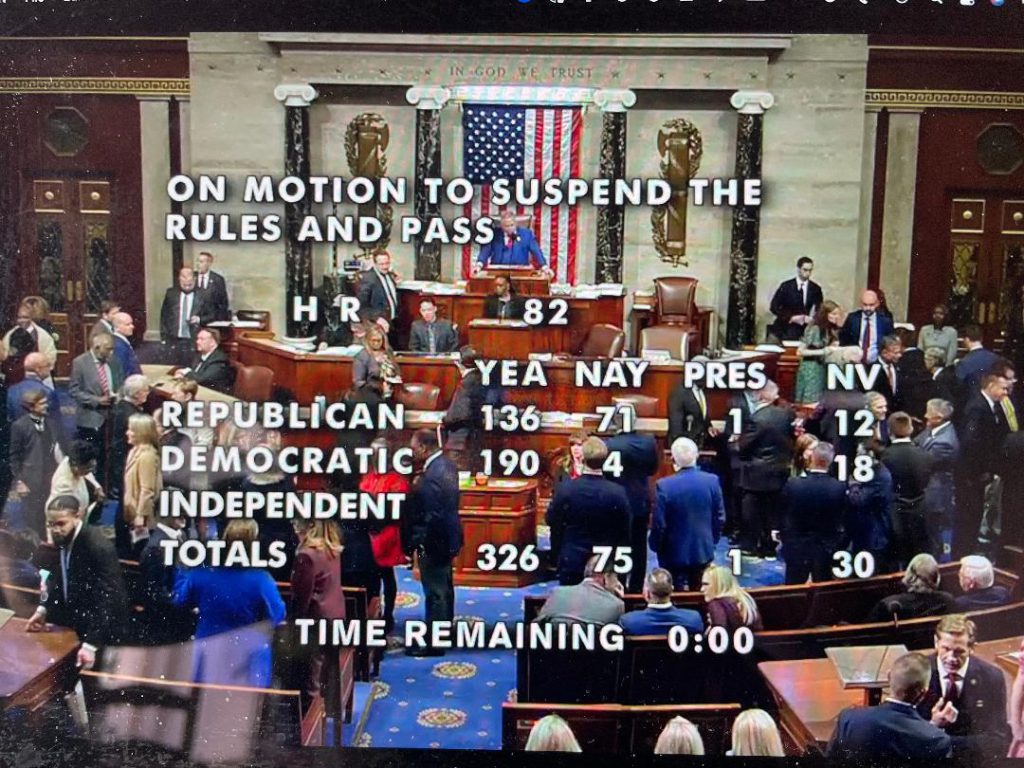
The results of voting on H.R. 82
Wynik Głosowania w sprawie H.R. 82
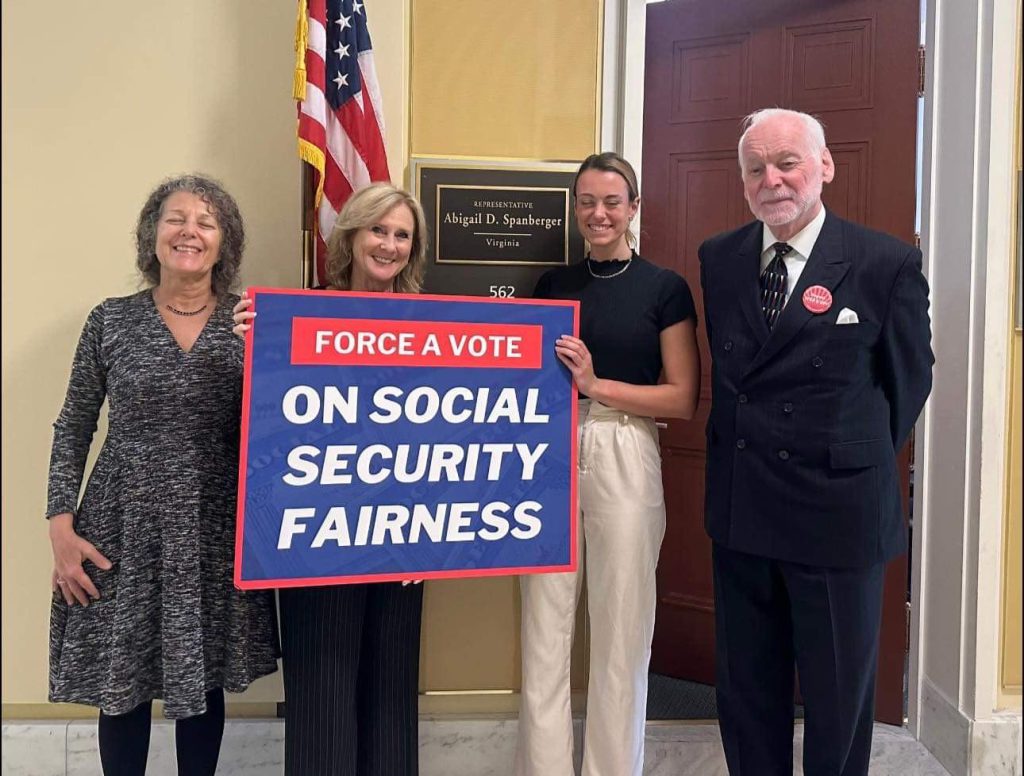
From the left to right: Pam Aleksandroff( National Task Force to Repeal WEP/ GPO and PASI member) , Susan Dixon ( National Task Force to Repeal WEP/ GPO and PASI member) , Abbie Holland( Rep. Spanberger’s staffer), Gene Sokolowski Ph. D. ( President of PASI EDU)
On November 12, 2024 our members together with The National Task to Repeal WEP/GPO members visited the House of Representative building in Washington D.C. to secure votes on H.R. 82.
Od lewej do prawej: Pam Aleksandroff( Krajowa Grupa Zadaniowa ds. Uchylenia WEP/GPO i członek PASI) , Susan Dixon ( Krajowa Grupa Zadaniowa ds. Uchylenia WEP/GPO i członek PASI) , Abbie Holland( Rep. Spanberger’s staffer), Gene Sokolowski Ph. D. ( Prezydent PASI EDU)
12 listopada 2024 r. nasi członkowie wraz z członkami Krajowej Grupy Zadaniowej ds. Uchylenia WEP/GPO odwiedzili budynek Izby Reprezentantów w Waszyngtonie, aby zabezpieczyć głosy w sprawie ustawy H.R. 82.
On November 12, 2024 our members together with The National Task to Repeal WEP/GPO members visited the House of Representative building in Washington D.C. to secure votes on H.R. 82.
12 listopada 2024 r. nasi członkowie wraz z członkami Krajowej Grupy Zadaniowej ds. Uchylenia WEP/GPO odwiedzili budynek Izby Reprezentantów w Waszyngtonie, aby zabezpieczyć głosy w sprawie ustawy H.R. 82.
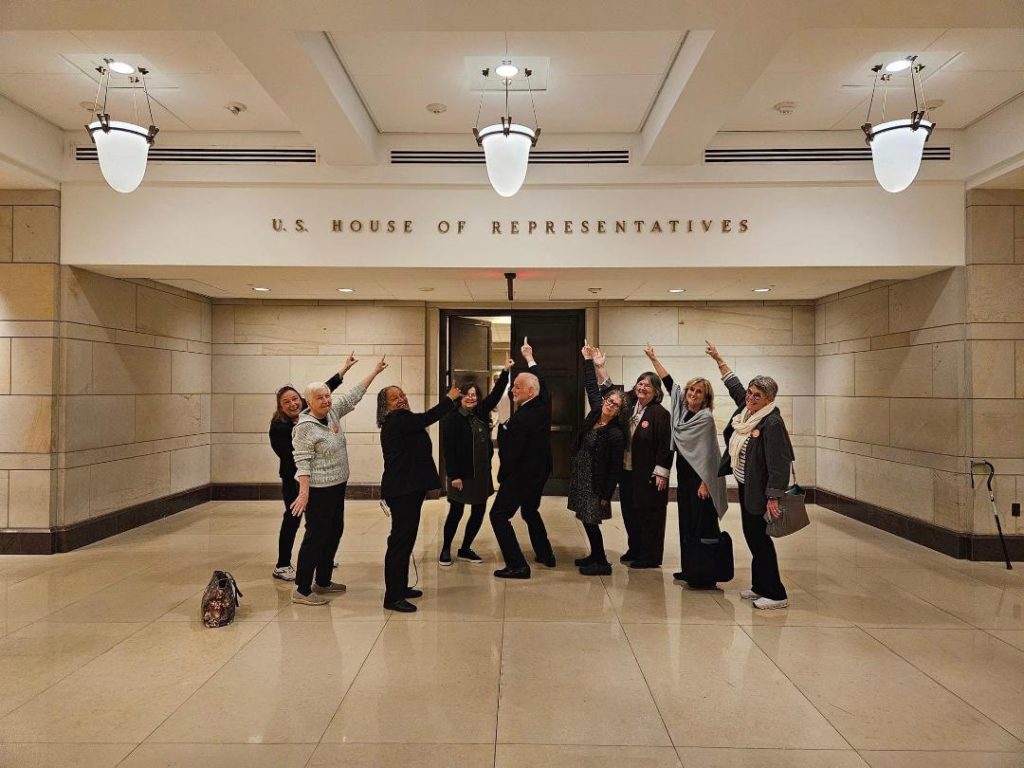
From left to right: Patrice Earnest, Aging Specialist and Consultant Bette Marafino, President of the Connecticut Alliance for Retired Americans (ARA) Mary Moninger, Lois Fields-Carson, Ohio State President of OAPSE/AFSCME Mary Elia, Past President of the West Haven Federation of Teachers and Connecticut ARA Activist Gene Sokolowski, EDU President Polish American Strategic Initiative (PASI) Pam Alexandroff, Janis Mickles Hernandez, Past President of the Louisiana Retired Teachers Association (LRTA); Current – Legislative Co-Chair of Federal Legislation Susan Dixon, President of the California Retired Teachers Association (CalRTA) Sandra Meinsen, Retired Connecticut Educator and WEP/GPO Advocate
Od lewej do prawej: Patrice Earnest, Specjalista i konsultant ds. starzenia się, Bette Marafino, Prezes Connecticut Alliance for Emerytowanych Amerykanów (ARA) Mary Moninger, Lois Fields-Carson, Prezydent OAPSE/AFSCME stanu Ohio Mary Elia, Były prezes Federacji Nauczycieli West Haven i działacz ARA w Connecticut Gene Sokolowski, Prezes EDU Polsko-Amerykańskiej Inicjatywy Strategicznej (PASI) Pam Alexandroff, Janis Mickles Hernandez, Były prezes Stowarzyszenia Emerytowanych Nauczycieli Luizjany (LRTA); Obecnie – współprzewodnicząca ds. legislacji ds. ustawodawstwa federalnego Susan Dixon, prezes Kalifornijskiego Stowarzyszenia Emerytowanych Nauczycieli (CalRTA) Suzie Dixon, Sandy Meinsen Emerytowany nauczyciel Connecticut i rzecznik WEP/GPO .
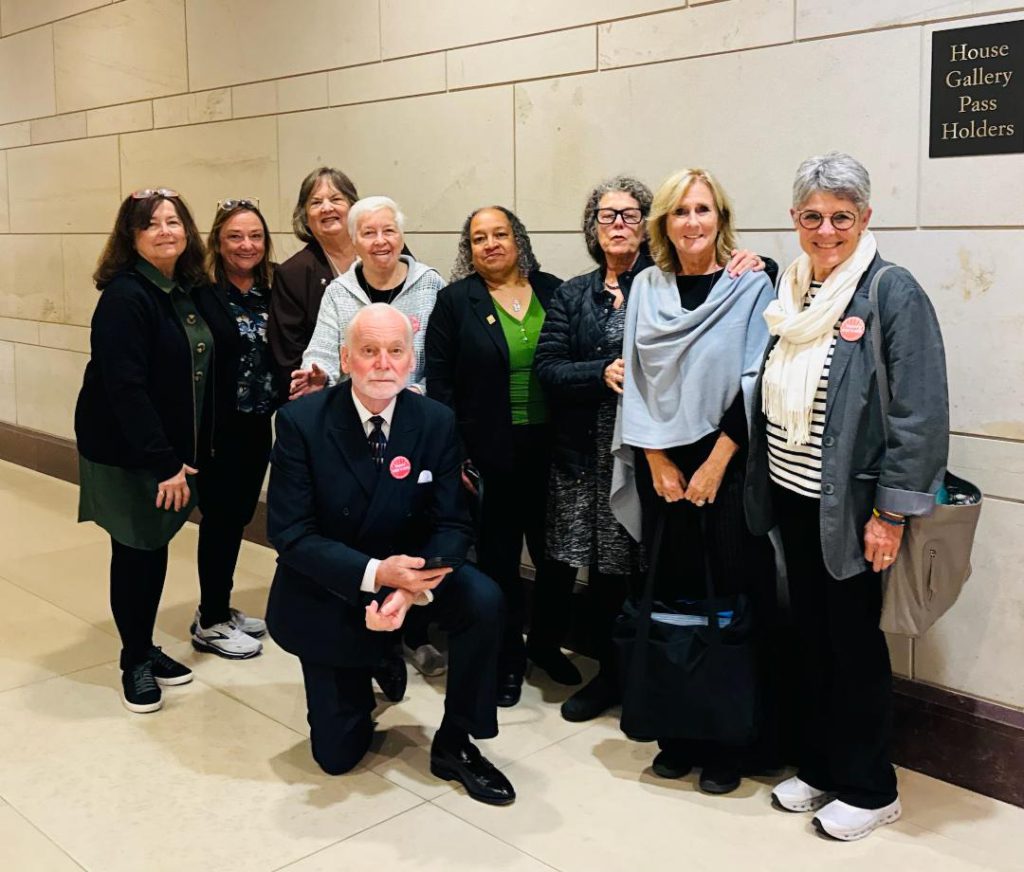
Members of the National Task Force to Repeal WEP/GPO during a lobbying campaign on behalf of those wronged by the law retirees in the U.S. Congress on November 12, 2024
Członkowie Krajowej Grupy Zadaniowej do Zniesienia WEP/GPO podczas akcji lobbującej na rzecz pokrzywdzonych emerytów w Kongresie USA w dniu 12 listopada 2024
ATTENTION POLONIA!!!! CALL TO ACTION
On November 12, Congress is scheduled to vote on H.R. 82 !!!!!!!
There will be two bills put to the vote that day;
H.R. 82 Social Security Fairness Act OF 2023
H.R. 5342 (known as "THE Arrington bill") OR H.R. 5342 - Equal Treatment of Public Servants Act of 2023.
ONLY H.R. 82 WILL ELIMINATE WEP/GPO PENALTIES FOREVER - THAT IS WHY WE REQUIRE ALL POLISH-AMERICANS TO CALL THEIR REPRESENTATIVES AND CONVINCE THEM TO VOTE EXCLUSIVELY FOR H.R. 82!!!!
PLEASE ALSO STARTING SUNDAY, NOVEMBER 10, THROUGH MONDAY AND TUESDAY, USE SOCIAL MEDIA AND SEND CONGRESS MEMBERS A MESSAGE WITH THE FOLLOWING CONTENT: PLEASE vote exclusively on H.R.82!!!
UWAGA POLONIO!!!! WIELKA MOBILIZACJA DO DZIAŁANIA
12 listopada jest zaplanowane przez Kongres głosowanie nad H.R. 82 !!!!!!!
Tego dnia będa dwa projekty postawione pod. głosowanie ;
H.R. 82 Social Security Fairness Act OF 2023
H.R. 5342 ( znany jako " THE Arrington bill) CZYLI NAD H.R. 5342 - Equal Treatment of Public Servants Act of 2023.
TYLKO H.R. 82 ZNOSI NA ZAWSZE KARY WEP /GPO - DLATEGO WYMAGAMY OD WSZYSTKICH Z POLONII ABY DZWONILI DO SWOICH REPREZENTANTÓW II PRZEKONALI ICH ABY WYŁĄCZNIE GŁOSOWALI NA H.R. 82!!!!
PROSIMY TEŻ ZACZYNAJĄC OD NIEDZIELI 10 LISTOPADA , PRZEZ PONIEDZIAŁEK I WTOREK UŻYWAĆ MEDIÓW SPOŁECZNOŚCIOWYCH I WYSYŁAĆ KONGRESMENOM Komunikat następującej treści: PLEASE vote exclusively on H.R.82!!!
On November 12, Congress is scheduled to vote on H.R. 82 !!!!!!!
There will be two bills put to the vote that day;
H.R. 82 Social Security Fairness Act OF 2023
H.R. 5342 (known as "THE Arrington bill") OR H.R. 5342 - Equal Treatment of Public Servants Act of 2023.
ONLY H.R. 82 WILL ELIMINATE WEP/GPO PENALTIES FOREVER - THAT IS WHY WE REQUIRE ALL POLISH-AMERICANS TO CALL THEIR REPRESENTATIVES AND CONVINCE THEM TO VOTE EXCLUSIVELY FOR H.R. 82!!!!
PLEASE ALSO STARTING SUNDAY, NOVEMBER 10, THROUGH MONDAY AND TUESDAY, USE SOCIAL MEDIA AND SEND CONGRESS MEMBERS A MESSAGE WITH THE FOLLOWING CONTENT: PLEASE vote exclusively on H.R.82!!!
12 listopada jest zaplanowane przez Kongres głosowanie nad H.R. 82 !!!!!!!
Tego dnia będa dwa projekty postawione pod. głosowanie ;
H.R. 82 Social Security Fairness Act OF 2023
H.R. 5342 ( znany jako " THE Arrington bill) CZYLI NAD H.R. 5342 - Equal Treatment of Public Servants Act of 2023.
TYLKO H.R. 82 ZNOSI NA ZAWSZE KARY WEP /GPO - DLATEGO WYMAGAMY OD WSZYSTKICH Z POLONII ABY DZWONILI DO SWOICH REPREZENTANTÓW II PRZEKONALI ICH ABY WYŁĄCZNIE GŁOSOWALI NA H.R. 82!!!!
PROSIMY TEŻ ZACZYNAJĄC OD NIEDZIELI 10 LISTOPADA , PRZEZ PONIEDZIAŁEK I WTOREK UŻYWAĆ MEDIÓW SPOŁECZNOŚCIOWYCH I WYSYŁAĆ KONGRESMENOM Komunikat następującej treści: PLEASE vote exclusively on H.R.82!!!
EXTREMELY URGENT!
PLEASE TAKE THE THREE ACTIONS BELOW IN GREEN
From Now Until 15 November
The more letters you send, the better!
ACTION 1: Thank your Senator for cosponsoring S 597 and urge him/her to vote yea when S 597 is brought to the Senate floor for a vote.
ACTION 2: Thank your Representative for cosponsoring HR 82 and urge him/her to vote yea when HR 82 is brought to the House floor for a vote.
ACTION 3: Thank your Representative for signing the HR 82 Discharge Petition and urge him/her to vote yea when HR 82 is brought to the House floor for a vote.
BARDZO PILNE!
PROSZĘ WYKONAĆ TRZY DZIAŁANIA PONIŻEJ OZNACZONE NA ZIELONO
Od teraz do 15 listopada
Im więcej listów wyślesz, tym lepiej!
AKCJA 1: Podziękuj swojemu senatorowi za współsponsorowanie S 597 i nalegaj, aby głosował za, gdy S 597 zostanie przedstawiony pod głosowanie w Senacie.
AKCJA 2: Podziękuj swojemu przedstawicielowi za współsponsorowanie HR 82 i nalegaj, aby głosował za, gdy HR 82 zostanie przedstawiony pod głosowanie w Izbie Reprezentantów.
AKCJA 3: Podziękuj swojemu przedstawicielowi za podpisanie petycji w sprawie uwolnienia HR 82 i zachęć go do głosowania za przyjęciem HR 82 w Izbie Reprezentantów.
EXTREMELY URGENT!
PLEASE TAKE THE THREE ACTIONS BELOW IN GREEN
From Now Until 15 November
The more letters you send, the better!
ACTION 1: Thank your Senator for cosponsoring S 597 and urge him/her to vote yea when S 597 is brought to the Senate floor for a vote.
ACTION 2: Thank your Representative for cosponsoring HR 82 and urge him/her to vote yea when HR 82 is brought to the House floor for a vote.
ACTION 3: Thank your Representative for signing the HR 82 Discharge Petition and urge him/her to vote yea when HR 82 is brought to the House floor for a vote.
BARDZO PILNE!
PROSZĘ WYKONAĆ TRZY DZIAŁANIA PONIŻEJ OZNACZONE NA ZIELONO
Od teraz do 15 listopada
Im więcej listów wyślesz, tym lepiej!
AKCJA 1: Podziękuj swojemu senatorowi za współsponsorowanie S 597 i nalegaj, aby głosował za, gdy S 597 zostanie przedstawiony pod głosowanie w Senacie.
AKCJA 2: Podziękuj swojemu przedstawicielowi za współsponsorowanie HR 82 i nalegaj, aby głosował za, gdy HR 82 zostanie przedstawiony pod głosowanie w Izbie Reprezentantów.
AKCJA 3: Podziękuj swojemu przedstawicielowi za podpisanie petycji w sprawie uwolnienia HR 82 i zachęć go do głosowania za przyjęciem HR 82 w Izbie Reprezentantów.
From August 26 th to September 10 th, 2024Od 26 Sierpnia do 10 Września 2024 r.
PASI CALL TO ACTION – 2 ACTIONSPASI WEZWANIE DO DZIAŁANIA - 2 AKCJE
1st ACTION: URGE YOUR REPRESENTATIVE TO SIGN THE DISCHARGE PETITION FOR H.R. 82!
1-SZA AKCJA : ZACHĘĆ SWOJEGO REPREZENTANTA KONGRESOWEGO
DO PODPISANIA PETYCJI O ABSOLUTORIUM DLA H.R. 82!
2nd ACTION: URGE 10 SENATORS TO COSPONSOR S. 597!
2-GA AKCJA : ZACHĘĆ 10 SENATORÓW DO WSPÓŁSPONSOROWANIA S.597!
NEW ACTIONNOWA AKCJA
Call to Action for American Polonia!!
We must now get the Senate to bring S. 597, Social Security Fairness Act, to the Senate floor for a vote. Once passed, it will be sent to the House for a floor vote.
With Senator Menendez’s recent conviction, this reduced the number of Senators who cosponsored S. 597 from 60 to 59 cosponsors. We need 60 or more Senate cosponsors for S. 597 to pass. Therefore, we are emailing a letter to each of 40 Senators who have not cosponsored S. 597.
We begin on July 23 and continue every day to July 31.
This is what you have to do: Click on the Action tab and take action listed under URGE TO 40 SENS TO COSPONS S.597 EVERYDAY FROM JULY 23 TO JULY 31.
On the next page you will see the message “Urge 40 Senators to cosponsor S 597, Social Security Fairness Act, to fully repeal the WEP and GPO”. Please click on the green button “Send Emails to Senators”.
On the next page, a prepared letter will appear. Please fill in your name, email (if you have one), and occupation. Then click on the green button “Send Emails to 40 Senators”.
EVERYONE PLEASE HELP AND EMAIL THE 40 SENATORS. Thank you for your support!
Wezwanie do działania dla Polonii amerykańskiej!!
Musimy teraz nakłonić Senat do przedłożenia pod głosowanie ustawy S. 597, Ustawa o uczciwości zabezpieczenia społecznego. Po przyjęciu zostanie przesłany do Izby Reprezentantów w celu głosowania.
Niedawne skazanie senatora Menendeza spowodowało zmniejszenie liczby senatorów, którzy współsponsorowali S. 597, z 60 do 59 współsponsorów. Potrzebujemy 60 lub więcej współsponsorów Senatu, aby S. 597 został zaliczony. Dlatego wysyłamy e-mailem list do każdego z 40 senatorów, którzy nie byli współsponsorami S. 597.
Rozpoczynamy 23 lipca i kontynuujemy codziennie do 31 lipca.
Oto, co musisz zrobić: Kliknij zakładkę Akcja i wykonaj działania wymienione w sekcji WYŚLIJ CODZIENNIE DO 40 SENATORÓW PROŚBĘ O KOSPONSOROWANIE S.597 OD 23 LIPCA DO 31 LIPCA
Na następnej stronie zobaczysz komunikat: „Namawiaj 40 senatorów do współsponsorowania S 597, Ustawy o uczciwości zabezpieczenia społecznego, w celu całkowitego uchylenia WEP i GPO”. Prosimy o kliknięcie zielonego przycisku „Wyślij e-maile do senatorów”.
Na następnej stronie pojawi się przygotowany list. Podaj swoje imię i nazwisko, adres e-mail (jeśli go posiadasz) i zawód. Następnie kliknij zielony przycisk „Wyślij e-maile do 40 senatorów”.
PROSIMY WSZYSTKICH O POMOC I WYSYŁANIE E-MAILÓW DO 40 SENATORÓW. Dziękuję za Twoje wsparcie!
TIME IS NOW!!!!!! hearing on WEP/GPO
IMPORTANT!!!!
LET'S ALL WATCH ONLINE!!!
OUR PRESIDENT PASI edu DR. GENE SOKOŁOWSKI WILL BE PRESENT IN THE COURT DURING THIS HEARING.
The SUBCOMMITTEE ON SOCIAL SECURITY will hold a hearing on WEP/GPO on Tuesday, April 16, 2024.
The viewing link will go live at exactly 3 pm EST on Tuesday, April 16, 2024!!!
https://waysandmeans.house.gov
3pm EST, 2pm Central, 12pm Pacific time,
TIME IS NOW !!!!!! wysłuchanie w sprawie WEP/GPO
WAŻNE!!!!!
OGLĄDAJMY WSZYSCY ONLINE!!!
NASZ PREZES PASI edu DR. GENE SOKOŁOWSKI BĘDZIE OBECNY NA SALI PODCZAS TEGO WYSŁUCHANIA.
PODKOMISJA DO SPRAW SOCIAL SECURITY organizuje we wtorek 16 kwietnia 2024 wysłuchanie w sprawie WEP/GPO.
Link do wysłuchania zacznie działać dokładnie o 3 pm EST we wtorek 16.04.2024!!!
https://waysandmeans.house.gov
godz 3pm EST, godz 2 pm Central , 12 pm Pacific time,
IMPORTANT!!!!
LET'S ALL WATCH ONLINE!!!
OUR PRESIDENT PASI edu DR. GENE SOKOŁOWSKI WILL BE PRESENT IN THE COURT DURING THIS HEARING.
The SUBCOMMITTEE ON SOCIAL SECURITY will hold a hearing on WEP/GPO on Tuesday, April 16, 2024.
The viewing link will go live at exactly 3 pm EST on Tuesday, April 16, 2024!!!
https://waysandmeans.house.gov
3pm EST, 2pm Central, 12pm Pacific time,
WAŻNE!!!!!
OGLĄDAJMY WSZYSCY ONLINE!!!
NASZ PREZES PASI edu DR. GENE SOKOŁOWSKI BĘDZIE OBECNY NA SALI PODCZAS TEGO WYSŁUCHANIA.
PODKOMISJA DO SPRAW SOCIAL SECURITY organizuje we wtorek 16 kwietnia 2024 wysłuchanie w sprawie WEP/GPO.
Link do wysłuchania zacznie działać dokładnie o 3 pm EST we wtorek 16.04.2024!!!
https://waysandmeans.house.gov
godz 3pm EST, godz 2 pm Central , 12 pm Pacific time,
Call to Action for American Polonia
We BEGIN action on APRIL 10 and continue every day TILL APRIL 26
Wezwanie do działania dla Polonii amerykańskiej!!!!!!
ROZPOCZYNAMY akcję 10 KWIETNIA i kontynuujemy codziennie AŻ DO 26 KWIETNIA
Help end the unfair reduction of Social Security pensions earned by Polish Americans who also earned a Polish pension.
Please urge 10 selected Representatives to cosponsor HR 82.
Please urge 12 selected Senators to cosponsor S 597.
Please try to email our letter to them, Wednesday through Friday, from 10 to 26 April.
TO EMAIL THE 10 REPRESENTATIVES:
Click on the ACTION tab above. Then click on URGE REPS TO COSPONSOR HR 82. |
|
The next page says “Urge 10 Representatives to cosponsor HR 82, Social Security Fairness Act of 2023, to fully repeal the WEP and GPO”. Click on the green button that says Take Action. |
|
On the next page, please insert the requested information and click on the green button that says Send Emails to 10 Representatives. Your email letter will be sent to all 10 Representatives at once. |
TO EMAIL THE 12 SENATORS:
Click on the ACTION tab above. Then click on URGE SENS TO COSPONSOR S 597. |
|
The next page says “Urge 12 Senators to cosponsor S 597, Social Security Fairness Act, to fully repeal the WEP and GPO”. Click on the green button that says Take Action. |
|
On the next page, please insert the requested information and click on the green button that says Send Email to 12 Senators. Your email letter will be sent to all 12 Senators at once. |
Because this is an election year, we need everyone’s help to get the WEP and GPO repealed before the end of the 118th Congress. Thank you for your support!
Pomóżcie położyć kres niesprawiedliwemu obniżeniu emerytur z Ubezpieczeń Społecznych przysługujących Amerykanom polskiego pochodzenia, którzy również wypracowali prawa do polskiej emerytury.
Proszę nakłonić 10 wybranych przez nas Reprezentantów do współsponsorowania HR 82.
Proszę nakłonić 12 wybranych przez nas Senatorów do współsponsorowania S 597.
Spróbuj wysłać do nich gotowy list e-mailem, od wtorku do piątku, od 9 do 26 kwietnia. ( wysyłamy codziennie!)
WYŚLIJ E-MAIL DO 10 KONGRESMENÓW:
Kliknij zakładkę AKCJA. Następnie kliknij przycisk ZACHĘĆ PRZEDSTAWICIELI DO KOSPONSOROWANIA HR 82. |
|
Na następnej stronie widnieje informacja: „ZACHĘĆ 10 przedstawicieli do współsponsorowania HR 82, ustawy o uczciwości zabezpieczenia społecznego z 2023 r., w celu całkowitego uchylenia WEP i GPO”. Kliknij zielony przycisk z napisem "Podejmij działanie." |
|
Na następnej stronie, wpisz żądane informacje i kliknij na zielony przycisk that says Wyślij Emaile do 10 Kongresmenów. Twój emailowy list zostanie wysłany do wszystkich 10 Kongresmenów jednocześnie. |
WYŚLIJ E-MAIL DO 12 SENATORÓW:
Kliknij zakładkę AKCJA. Następnie kliknij Zachęć Senatorów do współsponsorowania S 597. |
|
Na następnej stronie widnieje informacja: „Namawiaj 12 senatorów do współsponsorowania S 597, Ustawy o uczciwości zabezpieczenia społecznego, w celu całkowitego uchylenia WEP i GPO”. Kliknij zielony przycisk z napisem "Podejmij działanie". |
|
Na następnej stronie wpisz żądane informacje i kliknij zielony przycisk z napisem Wyślij e-mail do 12 senatorów. Twój list e-mailowy zostanie wysłany do wszystkich 12 senatorów jednocześnie. |
Ponieważ jest to rok wyborczy, potrzebujemy pomocy wszystkich, aby doprowadzić do uchylenia WEP i GPO przed końcem 118. Kongresu. Dziękuję za PAŃSTWA POMOC !
Open Letter against Poland’s military engagement in Ukraine List Otwarty w sprawie zaangażowania wojskowego Polski na Ukrainie
Andrzej Duda, President of Poland – [email protected]
Donald Tusk, Prime Minister of Poland – [email protected]
Radoslaw Sikorski, Minister of Foreign Affairs – [email protected]
Malgorzata Kidawa-Blonska, Marshal of the Senate – [email protected] and [email protected]
Szymon Hołownia, Marshal of the Sejm – [email protected]
c/o Ambassador Marek Magierowski – [email protected]
Embassy of the Republic of Poland
2640 16th St NW, Washington, DC 20009
Andrzej Duda, Prezydent Polski – [email protected]
Donald Tusk, Premier Polski – [email protected]
Radosław Sikorski, Minister Spraw Zagranicznych – [email protected]
Małgorzata Kidawa-Błońska, Marszałek Senatu – [email protected] and [email protected]
Szymon Hołownia, Marszałek Sejmu – [email protected]
c/o Ambasador Marek Magierowski – [email protected]
Ambasada Rzeczpospolitej Polski
2640 16th St NW, Washington, DC 20009
American Polonia welcomes Poland’s President Duda and Prime Minister Tusk in Washington, DC, as they meet with President Biden on March 12th. We hope that this critical visit will advance Poland’s image as a key advocate of normalizing European relations and steadfast proponent of a new security architecture through peace and cooperation in Europe.
As we approach the 10th anniversary of the military conflict in Ukraine, we hope Poland will lead the world on the path to de-escalation of the conflict and a negotiated settlement. We strongly believe that Europe needs not war but peace. All the differences of interests must be negotiated and resolved peacefully.
Many within the Polish American community strongly believe that NATO should remain a defense alliance and not an instrument of unrestrained geopolitical ambitions of its most dominant members. Poland must not allow itself to be drawn or forced into military engagement(s) outside of Polish borders unless attacked.
The trajectory of future developments is not easy to predict nor is it predetermined. However, it is a given that the future political and military decisions of the Russian Federation will depend on the actions of its adversaries. Escalatory behaviors will be predictably met with escalatory reactions. Russia’s conviction of facing an existential threat and its clearly signaled determination to use all its capabilities in the conflict need to be seriously considered before any escalatory steps are taken.
The consequences of conflict escalation advocated by some European leaders might lead to highly tragic outcomes in Poland and globally. We urge Polish politicians to refrain from offensive rhetorical excesses and empty threats, which regrettably indicate an inability to realistically assess Poland’s capabilities in a situation of actual military confrontation.
Polish Americans stand ready to support and assist President Duda and Prime Minister Tusk as they work together to strengthen and maintain Poland’s deterrence capabilities but remain adamantly opposed to engaging Poland deeper in a war that cannot be won, and which would ultimately lead to the destruction of Poland. We appeal to Poland’s leaders to align with those European leaders who call for a peaceful resolution of the war.
Amerykańska Polonia oczekuje przyjazdu Prezydenta Polski Dudy i Premiera Tuska którzy 12 marca przybędą do Waszyngtonu na spotkanie z Prezydentem Bidenem. Mamy nadzieję, że ta krytycznie ważna wizyta wzmocni wizerunek Polski jako orędownika normalizacji stosunków europejskich i kluczowego rzecznika nowej architektury bezpieczeństwa w Europie opartej na pokoju i współpracy.
W obliczu zbliżającej się dziesiątej rocznicy konfliktu zbrojnego na Ukrainie, mamy nadzieję, że Polska poprowadzi świat w kierunku deeskalacji tego konfliktu i jego rozwiązania na drodze negocjacji. Wierzymy głęboko w to, że Europa potrzebuje nie wojny, ale pokoju. Wszelkie różnice interesów muszą być negocjowane i rozwiązywane pokojowo.
Wielu członków Polonii jest głęboko przekonanych, że NATO powinno pozostać sojuszem obronnym, a nie instrumentem realizacji ambicji geopolitycznych dominujących członków sojuszu. Polska nie może dać się wciągnąć lub być zmuszona do militarnego zaangażowania poza granicami Polski, chyba że najpierw sama zostanie zaatakowana.
Kierunek przyszłego rozwoju sytuacji nie jest łatwy do przewidzenia ani z góry ustalony. Wiadomo jednak, że przyszłe decyzje polityczne i wojskowe Federacji Rosyjskiej będą uzależnione w dużej mierze od działań jej przeciwników. Zachowania eskalujące, spotkają się, jak można przewidzieć, z eskalacyjnymi reakcjami drugiej strony. Przekonanie Rosji o tym, że stoi ona w obliczu egzystencjalnego zagrożenia oraz fakt, że wyraźnie sygnalizuje ona swą determinację, aby wykorzystać w konflikcie wszystkie swoje militarne możliwości muszą być poważnie brane pod uwagę i uwzględniane przed podejmowaniem jakichkolwiek kroków eskalujących sytuację.
Konsekwencje eskalacji konfliktu, za którą opowiadają się i do której dążą niektórzy przywódcy europejscy, mogą mieć bardzo tragiczne skutki dla Polski i świata. Wzywamy polskich polityków, aby powstrzymywali się od obraźliwych, retorycznych ekscesów i pustych gróźb, które ilustrują niestety wyłącznie ich niemożność realistycznej oceny rzeczywistych możliwości Polski w sytuacji faktycznej konfrontacji militarnej.
Amerykanie polskiego pochodzenia są gotowi wspierać i służyć pomocą Prezydentowi Dudzie i Premierowi Tuskowi w ich działaniach na rzecz wzmocnienia i utrzymania polskiego potencjału odstraszania militarnego, jednak stanowczo sprzeciwiają się głębszemu angażowaniu Polski w wojnę, której nie da się wygrać i która może ostatecznie doprowadzić do zniszczenia Polski. Apelujemy do przywódców Polski, aby dołączyli do tych przywódców europejskich, którzy wzywają do pokojowego rozwiązania tego konfliktu.
| Edward Wojciech Jeśman, President | Dr. Gene Sokolowski, President |
| Polish American Strategic Initiative (PASI) and | Polish American Strategic Initiative |
| Polish American Congress of So. California | Educational Organization (PASI EDU) |
| ([email protected]“) | ([email protected]“) |
| Andrzej Burghard, President | Bozena Celina Urbankowski, President |
| Polish American Congress, New Jersey Division | Polish American Congress Northern New Jersey Div |
| Les A. Sosnowski, J.D., Ph.D. | Edward Swiderski, President |
| Attorney, Illinois | Polish National Alliance Lodge 113 |
| Amsterdam, NY | |
| Marek Rudnicki, MD, PhD, FACS, Dr hc | Dr. Marek Kierlańczyk |
| Chicago, Illinois | Chicago, Illinois |
| Adam Bąk, Entrepreneur & Philanthropist | Dr. Krystyna Zamorska, Independent Scholar |
| New York / New Jersey | West Hartford, Connecticut |
| Edward Dusza, Publisher/Author | Marek Bober, Journalist |
| Stevens Point, Wisconsin | Chicago, Illinois |
| John T. Szymkowicz, J.D | Urszula Oleksyn, Educator |
| Washington, D.C. | Fullerton, California |
| Andrew Brylowski, M.D. | Prof. Andrzej Targowski |
| Diplomate & Fellow | Honorowy Prezes Stowarzyszenia Dzieci PW 1944 |
| American Board of Psychiatry & Neurology | b. Prezes Światowej Rady ds. Badań Polonii |
| American Psychiatric Association | Honorowy Prezes Stowarzyszenia PESEL |
| Dallas, Texas | Los Angeles, California |
| Fr. Marek Stroba, OMI | Henryk Feliks Marciniak, President & CEO |
| Precious Blood Church | Road to Peace Foundation, Illinois |
| Chula Vista, California | Road to Peace Inc., Canada |
| Leszek Szałek, vice-President | Aleksander Janowski, Publisher |
| Polish American Engineers Club | Literary Magazine “Przypływ” |
| of Silicon Valley, California | Deerfield Beach, Florida |
| Bogumila Gladysz, Fr. President | Bart Habrowski |
| Polish American Business & Professional | Past President District Toronto |
| Association Inc. | Canadian Polish Congress |
| Plainville, Connecticut | Acting president Branch 1 |
| Polish National Union of Canada | |
| Mikołaj Sawicki, Ph.D., D.Sc. | Róża Wójcik, Ph.D. |
| Retired Prof. of Physics | Richland, WA |
| Boulder, Colorado | |
| Anna Maria Russell, Ph.D., Scientist | Jan Peczkis, Educator and Writer |
| San Diego, California | Chicago, Illinois |
| Andrzej Raczy | Benedykt Zajaczkowski |
| Hamtramck, Michigan | Toronto, Ontario |
| Ryszard Kwiecinski | Richard Zawisny |
| Kirkland, Washington | Staten Island, New York |
| Stanislaw Frej | Ela-Honorata Wysoczanska-Bretland |
| London, Ontario, Kanada | Delft, Netherlands |
| Andrzej Kozak | Anthony Litwinowicz |
| El Cajon, California | Maybrook, New York |
| Maria Kozlowska-Marszalek | Benon Kolibabka |
| Rochester, New York | Cheshire, Connecticut |
| Lucinda Kondrat, Retired Teacher | Anna Leja |
| Riverside, California | Hickory Hills, Illinois |
| Jerzy Menclewicz, MBA | Damian Sokolowski |
| Laguna Hills, California | Denver, Colorado |
| Jan Baginski | Andrzej Woroniecki |
| Hackensack, New Jersey | Fair Oaks, California |
| Zdzislaw Filipkowski | Dariusz Zelek |
| Middle Village, New York | Scottsdale, Arizona |
| Maria Koleda | Mitch & Grace Nocula |
| West Chester, Pensylvania | Schaumburg, Illinois |
| Stanislav Wliszczak | Andrzej Kabat |
| Macungie, Pennsylvania | Oslo, Norway |
| Adam Bałusz | David L. Blatt |
| Chicago, Illinois | Chicago, Illinois |
| Karolina Zatorska | Barbara Kieca |
| Newport Beach, California | Chicago, Illinois |
| Ben Chapinski | Iwona Johnson |
| St Petersburg, Florida | Chicago, Illinois |
| Agnieszka J. Ferens, RN-BSN | Andrzej Porwit |
| San Diego, California | Placerville, California |
| Ewa & Michal Milewscy | Stanislaw Kuszel |
| Kenosha, Wisconsin | |
| Alicja Towster | Christine Brycki |
| Overland Park, Kansas | Mt. Laurel, New Jersey |
PASI Statement on recent actions of the new Polish Government
January 31, 2024Oświadczenie PASI w sprawie ostatnich działań nowego polskiego rządu
31 stycznia 2024 r.
We view with great concern the contentious actions recently taken by the new Polish Government, ostensibly to restore liberal democracy in Poland.
The new Administration’s firings of the CEOs and boards at TVP, Polskie Radio, and the Polish Press Agency raise serious questions about its intentions and long-term commitment to media freedom. The dramatic arrest of two opposition lawmakers under controversial circumstances and the questionable dismissal of the head of the National Public Prosecutor’s Office raise doubts about the Government’s adherence to the law’s letter and the pledge to restore its rule. The revised process by which members of the National Council of the Judiciary are appointed also causes concern.
These and other reportedly corrective actions that the new Administration has taken, whether right or wrong, have regrettably caused widespread political and social turmoil, mainly because of the Prime Minister’s “iron broom” approach.
Equally concerning are signals that suggest significant slowing or abandonment of strategically essential investments such as the Świnoujście Port, the construction of a nuclear power plant, and the building of the Central Communication Port.
We, therefore, call on the new Polish Government to work in unison with the President and opposition party members to heal the current political divide and mitigate the consequent chaos by achieving common solutions to the issues that affect the Polish people. We further implore the Administration to continue implementing the planned infrastructure projects that will carry Poland into the next critically needed stage of national development.
Z wielkim zaniepokojeniem przyglądamy się kontrowersyjnym działaniom podjętym ostatnio przez nowy rząd polski, rzekomo w celu przywrócenia liberalnej demokracji w Polsce.
Zwolnienia dyrektorów generalnych i zarządów TVP, Polskiego Radia i Polskiej Agencji Prasowej rodzą poważne pytania co do tego jak nowa Aadministracja rozumie wolnośc mediów. Dramatyczne aresztowanie w kontrowersyjnych okolicznościach dwóch posłów opozycji oraz budząca wątpliwości dymisja szefa Prokuratury Krajowej rodza pytania co do obietnicy przywrocenia przez nowa Administracje rzadow prawa. Zmieniony proces powoływania członków Krajowej Rady Sądownictwa rowniez budzi niepokój.
Z ubolewaniem stwierdzamy ze te i inne rzekomo naprawcze dzialania podjęte przez nową administrację, niezależnie od tego, czy są słuszne, czy nie, spowodowały szerokie zamieszanie polityczne i społeczne, głównie z powodu polityki przyjetej przez premiera i okreslanej przez niego samego jako uzywanie „żelaznej miotły”.
Równie niepokojące są sygnały sugerujące znaczne spowolnienie lub wrecz zaniechanie inwestycji o znaczeniu strategicznym, takich jak Port Świnoujście, budowa elektrowni jądrowej czy budowa Centralnego Portu Komunikacyjnego.
Wzywamy zatem nowy rząd polski do współpracy z Prezydentem i członkami partii opozycyjnej w celu uzdrowienia obecnego podziału politycznego i złagodzenia wynikającego z niego chaosu poprzez wypracowywanie wspólnych rozwiązań dla problemów dotykających Polaków. Ponadto usilnie prosimy Administrację o kontynuację realizacji zaplanowanych projektów infrastrukturalnych, które pozwola Polsce osiagnac kolejny, krycznie potrzebny stopien rozwoju kraju.
PRESS RELEASE
JUNE 2, 2023
KOMUNIKAT PRASOWY
2 CZERWCA 2023 R.
PRESS RELEASE BY POLISH AMERICAN STRATEGIC INITIATIVE (PASI) REGARDING THE U.S. GOVERNMENT CONCERN OVER THE POTENTIAL USE OF NEW POLISH LEGISLATION ESTABLISHING STATE COMMISSION FOR THE STUDY OF RUSSIAN INFLUENCE TO TARGET OPPOSITION.
The May 29, 2023, statement issued by the United States Department of State regarding the new Polish law establishing the state commission for the study of Russian influence expresses concern over the Polish government’s passage of the legislation claiming that it “could be misused to interfere with Poland’s free and fair elections.” True or false, we and other Polish American organizations view this statement as another direct intrusion of the United States government in Poland’s internal affairs, of which we disapprove and admonish. We also note the recent history of election interference in the United States, which irrefutably confirms that the State Department cannot instruct Poland on the subject.
KOMUNIKAT PRASOWY POLSKO AMERYKAŃSKIEJ INICJATYWY STRATEGICZNEJ (PASI) DOTYCZĄCY ZANIEPOKOJENIA RZĄDU USA CO DO POTENCJALNEGO WYKORZYSTANIA NOWEGO POLSKIEGO USTAWODAWSTWA POWOŁUJĄCEGO PAŃSTWOWĄ KOMISJĘ DO SPRAW WPŁYWÓW ROSYJSKICH PRZECIWKO OPOZYCJI.
Oświadczenie Departamentu Stanu Stanów Zjednoczonych z dnia 29 maja 2023 r. dotyczące nowego Polskiego prawa powołującego państwową komisję do badania wpływów rosyjskich wyraża niepokój Z powodu przyjęcia tej ustawy przez polski rząd, twierdząc, że „może być niewłaściwie wykorzystana do ingerowania w wolne i uczciwe wybory w Polsce”. Prawda czy fałsz, my i inne polsko-amerykańskie organizacje postrzegają to oświadczenie jako kolejną bezpośrednią ingerencję rządu Stanów Zjednoczonych w wewnętrzne sprawy Polski, które potępiamy. Zwracamy również uwagę na najnowszą historię przypadków ingerencji wyborczej w Stanach Zjednoczonych, co niezbicie potwierdza fakt że Departament Stanu nie może instruować Polski w tym zakresie.
Letter to the State Department
June 5, 2023
List do Departamentu Stanu
5 czerwca 2023 r.
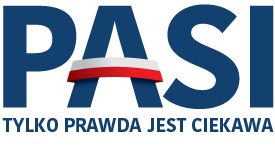
Honorable Dereck J. Hogan
Principal Deputy Assistant Secretary
Bureau of European and Eurasian Affairs
2201 C St NW, Washington, DC 20520
Dear Mr. Hogan,
We note with concern the May 29, 2023, press statements from the Department of State and the American Embassy in Warsaw claiming – true or false – that the proposed creation of a commission to investigate Russian influences on the internal security of Poland during 2007-2022 “could be misused to interfere with Poland’s free and fair elections.”
Without taking sides in the Polish political debates, we view your statement as another direct intrusion of the United States government in Poland’s internal affairs. The foreign influences in Polish politics are diverse and many, but very few amount to the level of open and direct interference presented by the U.S. State Department statements. Also, considering our recent history of election interference, the State Department is in no position to instruct Poland on the subject.
As there are many recent noteworthy examples of U.S. interference in Poland’s internal affairs, we respectfully request the opportunity to provide our perspective on matters of concern to prevent their recurrence in the future. We believe our counsel will help avoid unnecessary stress in U.S.-Polish relations.
Sincerely,
Czcigodny Dereck J. Hogan
Główny zastępca asystenta sekretarza
Biuro ds. Europejskich i Eurazjatyckich
2201 C St NW, Waszyngton, DC 20520
Szanowny Panie Hogan,
Oświadczenie Departamentu Stanu Stanów Zjednoczonych z dnia 29 maja 2023 r. dotyczące nowego polskiego prawa powołującego państwową komisję do badania wpływów rosyjskich wyraża niepokój Z z powodu przyjęcia tej ustawy przez polski rząd, twierdząc, że „może być niewłaściwie wykorzystana do ingerowania w wolne i uczciwe wybory w Polsce”.
Prawda czy fałsz, Bez wzgledu na to czy jest to uzasadniona czy nie uzasadniona obawa, my i inne polsko-amerykańskie organizacje postrzegają to oświadczenie jako kolejną bezpośrednią ingerencję rządu Stanów Zjednoczonych w wewnętrzne sprawy Polski, które potępiamy. Zwracamy również uwagę na najnowszą historię przypadków ingerencji wyborczej w Stanach Zjednoczonych, co niezbicie potwierdza fakt że Departament Stanu nie może instruować Polski w tym zakresie.
Ponieważ w ostatnim czasie pojawiło się wiele godnych uwagi wartych odnotowania przykładów ingerencji Stanów Zjednoczonych w sprawy wewnętrzne Polski, zwracamy sie z uprzejmą oferą gotowosci podzielenia sie naszą perspektywą na temat kwestii mogących potencjalnie budzić zaniepokojenie, aby zapobiec podobnym przypadkom w przyszłości. Wierzymy, że nasze konsultacje pomogą uniknąć niepotrzebnych stresujących momentów w stosunkach polsko-amerykańskich.
Z poważaniem,
|
Edward Jeśman, President |
Gene Sokolowski, Ph.D., President |
| Polish American Strategic Initiative (PASI) | PASI Education Organization (PASI EDU) |
| [email protected] | [email protected] |
|
(310) 291-2681 (310) 291-2681 |
Phone: (703) 966-5109Phone: (703) 966-5109 |
| Andrzej Burghardt, President | Wieslaw Wierzbowski, President |
| Polish American Congress, | Polish American Congress, |
| New Jersey Division | Eastern Massachusetts Division |
| Walter Golebiewski, President | Marek Waniolka, President |
| Polish American Congress, | Polish American Congress, |
| Florida Western Division | Missouri Division |
| Bozena Celina Urbankowski, President | Jerzy Bogdziewicz, President |
| Polish American Congress, | Polish American Congress, |
| Northern New Jersey Division | Florida |
Letter to the Constitutional Tribunal in Poland
regarding its pending Sovereign Immunity ruling
(May 23, 2023 - Case K25/20)
List do Trybunału Konstytucyjnego w Polsce
Stanowisko Polish American Strategic Initiative w sprawie K 25/20
(23 maja 2023 r. – sprawa K25/20)

Trybunał Konstytucyjny
c/o Prezes Julia Przyłębska
al. Jana Chrystiana Szucha 12A
00-918 Warszawa
Via email: [email protected]
Statement
On May 23, 2023, the Constitutional Tribunal in Warsaw is scheduled to hear case K 25/20 and consider whether applying the Foreign Sovereign Immunity principle in civil lawsuits related to war crimes, crimes against humanity, and genocide is constitutional within the Polish judicial system.
The potential decision in favor of change that would allow lawsuits against foreign sovereigns to move forward in Polish courts might provide a venue for compensation claims for many victims of World War II. However, the change would also create a dangerous legal precedent with serious international ramifications that would, in turn, have an impact, based on principles of legal symmetry and reciprocity, on lawsuits against the Republic of Poland in foreign jurisdictions, especially in the United States.
Taking into consideration these ramifications is essential and the decision to introduce change should not be treated lightly. Throughout the years, United States courts have routinely dismissed civil lawsuits against the Republic of Poland and held that the Foreign Sovereign Immunities Act shields Poland from such actions.
The ruling in favor of change might inadvertently end Poland’s ability to assert a sovereign immunity defense and open a virtual floodgate of lawsuits against the Republic of Poland from individuals or legal entities seeking restitution or compensation for the losses, real or fictitious, suffered during World War II and as an effect of postwar Communist-era nationalizations. Such a development might ultimately cost Poland billions of dollars in foreign judgments.
Sincerely,
Trybunał Konstytucyjny
c/o Prezes Julia Przyłębska
al. Jana Chrystiana Szucha 12A
00-918 Warszawa
Email: [email protected]
Oświadczenie
23 maja 2023 r. Trybunał Konstytucyjny w Warszawie ma rozpatrzyć sprawę K 25/20 i orzec czy stosowanie w polskim systemie prawnym obrony opartej na zasadzie immunitetu obcego państwa w sprawach cywilnych dotyczących zbrodni wojennych, zbrodni przeciwko ludzkości i ludobójstwa jest zgodne z Konstytucją.
Ewentualne rozstrzygnięcie dopuszczające prowadzenie w polskich sadach postępowań cywilnych przeciwko rządom państw obcych może umożliwić ubieganie się o odszkodowania wielu ofiarom II wojny światowej. Zmiana prawna tego typu może jednak również stworzyć niebezpieczny precedens prawny o poważnych skutkach międzynarodowych, który może mieć wpływ, w oparciu o zasady symetrii prawnej i wzajemności, na procesy sądowe przeciwko Rzeczypospolitej Polskiej w obcych jurysdykcjach, zwłaszcza w Stanach Zjednoczonych.
Decyzja Trybunału nie powinna być podjęta pochopnie. Świadomość wymienionych konsekwencji jest niezbędna przy jej podejmowaniu. Przez lata sądy w Stanach Zjednoczonych rutynowo odrzucały pozwy cywilne przeciwko Rzeczypospolitej Polskiej i utrzymywały, że Ustawa o Immunitecie Państw Obcych chroni Polskę przed takimi pozwami.
Orzeczenie zmieniające prawo krajowe może odebrać Polsce w sposób niezamierzony możliwość używania argumentu immunitetu państwowego jako sposobu obrony i doprowadzić do masowych powództw przeciwko Rzeczypospolitej Polskiej od osób fizycznych lub prawnych domagających się zwrotu lub odszkodowania za straty, rzeczywiste lub fikcyjne, poniesione podczas II wojny światowej oraz w wyniku komunistycznych nacjonalizacji po wojnie. Taki rozwój wydarzeń może prowadzić do zagranicznych wyroków, które będą kosztować Polskę miliardy dolarów.
Z poważaniem,
 “
“Edward Wojciech Jeśman, President
Polish American Strategic Initiative (PASI)
[email protected]
Phone:Telefon: (310) 291-2681Phone:Telefon: (310) 291-2681
 “
“Gene Sokolowski, Ph.D., President
PASI Educational Organization
[email protected]
Phone:Telefon: (703) 966-5109Phone:Telefon: (703) 966-5109
Andrzej Duda, President of the Republic of Poland
Mateusz Morawiecki, Prime Minister of the Republic of Poland
Zbigniew Rau, Minister of Foreign Affairs
Arkadiusz Mularczyk, Secretary of State
Zbigniew Ziobro, Minister of Justice
Elżbieta Witek, Marszałek Sejmu RP
Tomasz Grodzki, Marszałek Senatu RP
Marek Magierowski, Ambasador RP in USA
Piotr Wilczek, Ambasador RP in Great Britain
Marta Wolańska, Consul General, Los Angeles
Paweł Zyzak, Consul General, Chicago
Adrian Kubicki, Consul General, New York
Monika Sobczak, Consul General, Houston
Komisja Spraw Zagranicznych
Komisja Finansów Publicznych
Komisja Administracji i Spraw Wewnętrznych
Komisja Ustawodawcza
Komisja Mniejszości Narodowych i Etnicznych
Klub Parlamentarny Prawo i Sprawiedliwość
Klub Parlamentarny Koalicja Obywatelska
Koalicyjny Klub Parlamentarny Lewicy
Klub Parlamentarny Koalicja Polska
Koło Poselskie Konfederacja
Koło Parlamentarne Polska 2050
Koło Parlamentarne Porozumienie
Koło Poselskie Kukiz’15
Koło Parlamentarne Lewicy Demokratycznej
Koło Poselskie Polskie Sprawy
Koło Poselskie Wolnościowcy
Jarosław Kaczyński
Władysław Kosiniak-Kamysz
Krzysztof Gawkowski
Agnieszka Ścigaj
Iwona Michalek
Paulina Hennin-Kloska
Grzegorz Braun
Krzysztof Bosak
Konrad Berkowicz
Małgorzata Gosiewska
Frank Spula, President, Polish American Congress
[email protected]
[email protected]
[email protected]
[email protected]
[email protected]
[email protected]
[email protected]
[email protected]
[email protected]
[email protected]
[email protected]
[email protected]
[email protected]
[email protected]
[email protected]
[email protected]
[email protected]
[email protected]
[email protected]
[email protected]
[email protected]
[email protected]
[email protected]
[email protected]
[email protected]
[email protected]
[email protected]
[email protected]
[email protected]
[email protected]
[email protected]
[email protected]
[email protected]
[email protected]
[email protected]
[email protected]
[email protected]
[email protected]
[email protected]
[email protected]
Andrzej Duda, President of the Republic of Poland
Mateusz Morawiecki, Prime Minister of the Republic of Poland
Zbigniew Rau, Minister of Foreign Affairs
Arkadiusz Mularczyk, Secretary of State
Zbigniew Ziobro, Minister of Justice
Elżbieta Witek, Marszałek Sejmu RP
Tomasz Grodzki, Marszałek Senatu RP
Marek Magierowski, Ambasador RP in USA
Piotr Wilczek, Ambasador RP in Great Britain
Marta Wolańska, Consul General, Los Angeles
Paweł Zyzak, Consul General, Chicago
Adrian Kubicki, Consul General, New York
Monika Sobczak, Consul General, Houston
Komisja Spraw Zagranicznych
Komisja Finansów Publicznych
Komisja Administracji i Spraw Wewnętrznych
Komisja Ustawodawcza
Komisja Mniejszości Narodowych i Etnicznych
Klub Parlamentarny Prawo i Sprawiedliwość
Klub Parlamentarny Koalicja Obywatelska
Koalicyjny Klub Parlamentarny Lewicy
Klub Parlamentarny Koalicja Polska
Koło Poselskie Konfederacja
Koło Parlamentarne Polska 2050
Koło Parlamentarne Porozumienie
Koło Poselskie Kukiz’15
Koło Parlamentarne Lewicy Demokratycznej
Koło Poselskie Polskie Sprawy
Koło Poselskie Wolnościowcy
Jarosław Kaczyński
Władysław Kosiniak-Kamysz
Krzysztof Gawkowski
Agnieszka Ścigaj
Iwona Michalek
Paulina Hennin-Kloska
Grzegorz Braun
Krzysztof Bosak
Konrad Berkowicz
Małgorzata Gosiewska
Frank Spula, President, Polish American Congress
[email protected]
[email protected]
[email protected]
[email protected]
[email protected]
[email protected]
[email protected]
[email protected]
[email protected]
[email protected]
[email protected]
[email protected]
[email protected]
[email protected]
[email protected]
[email protected]
[email protected]
[email protected]
[email protected]
[email protected]
[email protected]
[email protected]
[email protected]
[email protected]
[email protected]
[email protected]
[email protected]
[email protected]
[email protected]
[email protected]
[email protected]
[email protected]
[email protected]
[email protected]
[email protected]
[email protected]
[email protected]
[email protected]
[email protected]
[email protected]
Andrzej Duda, President of the Republic of Poland – [email protected]
Mateusz Morawiecki, Prime Minister of the Republic of Poland – [email protected]
Zbigniew Rau, Minister of Foreign Affairs – [email protected]
Arkadiusz Mularczyk, Secretary of State – [email protected]
Zbigniew Ziobro, Minister of Justice – [email protected]
Elżbieta Witek, Marszałek Sejmu RP – [email protected]
Tomasz Grodzki, Marszałek Senatu RP- [email protected]
Marek Magierowski, Ambasador RP in USA – [email protected]
Piotr Wilczek, Ambasador RP in Great Britain – [email protected]
Marta Wolańska, Consul General, Los Angeles – [email protected]
Paweł Zyzak, Consul General, Chicago – [email protected]
Adrian Kubicki, Consul General, New York – [email protected]
Monika Sobczak, Consul General, Houston – [email protected]
Komisja Spraw Zagranicznych – [email protected]
Komisja Finansów Publicznych – [email protected]
Komisja Administracji i Spraw Wewnętrznych – [email protected]
Komisja Ustawodawcza – [email protected]
Komisja Mniejszości Narodowych i Etnicznych – [email protected]
Klub Parlamentarny Prawo i Sprawiedliwość – [email protected]
Klub Parlamentarny Koalicja Obywatelska – [email protected]
Koalicyjny Klub Parlamentarny Lewicy – [email protected]
Klub Parlamentarny Koalicja Polska – [email protected]
Koło Poselskie Konfederacja – [email protected]
Koło Parlamentarne Polska 2050 – [email protected]
Koło Parlamentarne Porozumienie – [email protected]
Koło Poselskie Kukiz’15 – [email protected]
Koło Parlamentarne Lewicy Demokratycznej – [email protected]
Koło Poselskie Polskie Sprawy – [email protected]
Koło Poselskie Wolnościowcy – [email protected]
Jarosław Kaczyński – [email protected]
Władysław Kosiniak-Kamysz – [email protected]
Krzysztof Gawkowski – [email protected]
Agnieszka Ścigaj – [email protected]
Iwona Michalek – [email protected]
Paulina Hennin-Kloska – [email protected]
Grzegorz Braun – [email protected]
Krzysztof Bosak – [email protected]
Konrad Berkowicz – [email protected]
Małgorzata Gosiewska – [email protected]
Frank Spula, President, Polish American Congress – [email protected]
Stop Penalizing Foreign Pensioners – Repeal the Windfall Elimination Provision
To: THE UNITED STATES CONGRESSAction Congress Must Take: Repeal the unfair Windfall Elimination Provision (WEP)
What Congress Must Do: Pass House Bill H.R. 82 and Senate Bill S. 597
Why Congress Must Repeal the WEP: The WEP unfairly reduces the U.S. Social Security benefits of not only U.S. government workers but also of those who have worked both in the United States and another country.
Why This Is Important:
• U.S. citizens who have worked outside the U.S., naturalized U.S. citizens who have worked in their country of birth, and legal immigrants all have their monthly Social Security pension significantly reduced because they receive a foreign pension.
• For 2023, their Social Security pension can be reduced by up to $557.50 each month.
• The WEP disproportionately affects lower income earners and a large number of these earners are foreign pension recipients whose combined income is often at or near the poverty level.
CALL TO ACTION!
Why should hard-working people be penalized simply because they earned a foreign pension?
Please sign our WEP Repeal Petition so that Congress will see that this longstanding injustice adversely affects many and must be repealed now!
Zaprzestać karania emerytów, którzy wypracowali zagraniczne emerytury – Uchylić klauzulę nadmiernego wzbogacenia (WEP)
Do KONGRESU STANÓW ZJEDNOCZONYCHKongres musi podjąć następujące działanie: uchylić klauzulę nadmiernego wzbogacenia (WEP)
Co Kongres musi zrobić: uchwalić ustawę H.R. 82 oraz ustawę senacką S. 597
Dlaczego Kongres musi uchylić WEP: WEP niesprawiedliwie zmniejsza świadczenia z Ubezpieczeń Społecznych ( Social Security) nie tylko pracownikom rządowym, ale także tym, którzy pracowali zarówno w Stanach Zjednoczonych, jak i za granicą
Dlaczego jest to ważne:
• Obywatele USA, którzy pracowali poza Stanami Zjednoczonymi, naturalizowani obywatele USA, którzy pracowali w kraju, z którego pochodzą i legalni imigranci mają znacznie obniżone swoje miesięczne emerytury wypłacane z amerykańskiego systemu ubezpieczeń społecznych (Social Security). Ta redukcja jest spowodowana otrzymywaniem emerytury wypracowanej w innym kraju.
• W 2023 r. ich emerytura wypłacana z U.S. Social Security może zostać obniżona aż o 557,50 USD miesięcznie.
• WEP nieproporcjonalnie krzywdzi osoby o niższych dochodach, a wielu z nich to właśnie emeryci, którzy nabyli prawo do emerytury w kraju, w którym pracowali przed osiedleniem się w Stanach Zjednoczonych. Ich łączny dochód często znajduje się blisko progu ubóstwa.
WEZWANIE DO DZIAŁANIA!
Dlaczego ludzie, którzy ciężko pracowali całe swoje życie mają być karani tylko dlatego, że nabyli świadczenia emerytalne w innym kraju?
Proszę podpisać naszą petycję o uchylenie WEP, aby Kongres zobaczył, że ta długotrwała niesprawiedliwość ma negatywny wpływ na wielu i musi zostać natychmiast uchylona!
THE MEMORY OF THOSE WHO DIED FOR OUR FREEDOM
DESERVES THE DEFENSE FROM THE LIVING
FIGHT OVER THE KATYN MEMORIAL IN JERSEY CITY CONTINUES
PAMIĘĆ O TYCH, KTÓRZY ZGINĘLI ZA NASZĄ WOLNOŚĆ
ZASŁUGUJE NA OBRONĘ PRZEZ ŻYJĄCYCH
WALKA O POMNIK KATYŃSKI W JERSEY CITY TRWA
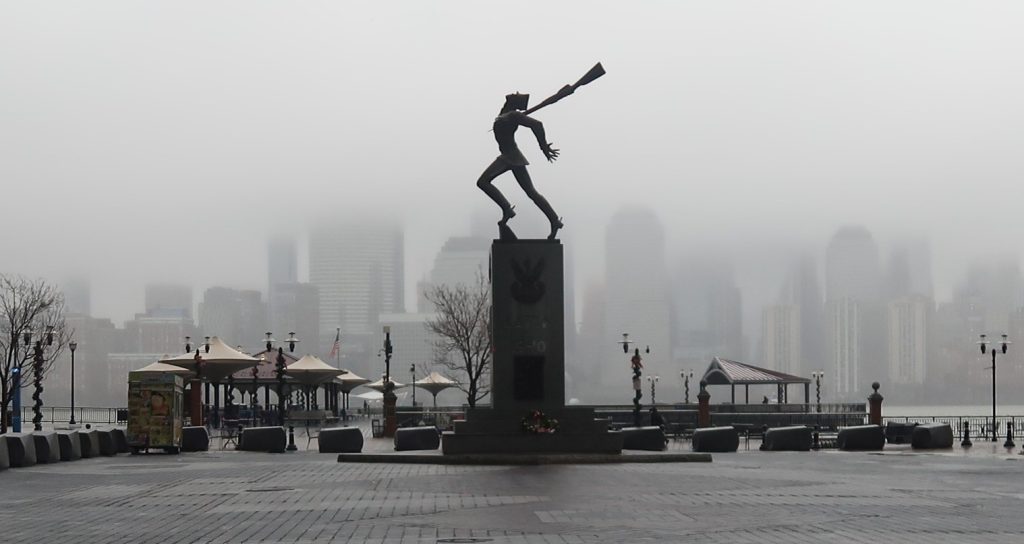
Katyn Monument in Jersey City, NJ in January 2019 Pomnik Katyński w Jersey City w styczniu 2019 roku
Today, the same forces that failed in 2018 to remove/relocate the Monument are engaged in a new assault on the Katyn Memorial. Under the guise of a plaza “renovation,” the Exchange Place Alliance will heedlessly attempt to convert forty percent of the Plaza’s public space into a private roadway servicing buildings owned by corporations of the board members of the Alliance itself. Further, the new Plaza designs reveal an aggressive attack on the Katyn Memorial yet again. Because Jersey City’s 2018 referendum brought about an ordinance guaranteeing that the Katyn Memorial will remain in Exchange Place Plaza in perpetuity, a new tactic is employed: it aims to obscure, scar, confine, deny access, degrade, and conceal the Memorial from view.
The Exchange Place Alliance has led this “Monument wrecking crew” since its president, Michael DeMarco, the arch-foe of the Katyn Memorial and a Polonophobe, publicly declared the Monument to be “gruesome” and demanded its removal from Exchange Place Plaza. His collaborator Mayor Steven Fulop – another Polonophobe – added insult to injury, causing international scandal and outrage in 2018 when he called Stanislaw Karczewski, Speaker of Poland’s Senate, who protested the scandalous plans to remove the Monument “a joke, anti-Semite, white nationalist, and Holocaust denier.”
The Exchange Place Alliance’s actions and the unlawful process in which the approval of the Exchange Place Plaza renovation was obtained caused significant and understandable opposition within the community. Left with no options – due to the intransigence of the Exchange Place Alliance District Management Corporation and its unwillingness to open access to the Monument – the Polish American Strategic Initiative (PASI), Polish American Strategic Initiative Educational Organization (PASI EDU), and Jeanne Daly, a local Jersey City resident, filed in June 2022 a court action against the Jersey City Planning Board and Exchange Place Alliance. Simultaneously, fundraising was initiated – as was done in 2018 – to support the legal challenge.
The plaintiffs argue that the approval of the Plaza renovation issued by the Jersey City Planning Board was unlawful, and the case should be remanded back to the Planning Board for reconsideration to allow for previously banned public input. The plaintiffs want to keep the surroundings of the Monument open, access to the Monument unimpeded on all sides, and the iconic views of the Memorial with the panorama of Manhattan in the background preserved. The lawsuit rejects the Alliance’s attempts to hide the Monument, minimize its visual impact, and ultimately degrade its importance. As we remember, the Jersey City Planning Board initially rejected the Exchange Place Alliance District Management Corporation’s renovation plans; the decision was unlawfully reversed two weeks later when the Jersey City Planning Board succumbed to political pressures exerted – as it is alleged – by Steven Fulop, mayor of Jersey City and another Katyn Monument foe. Did Mr. DeMarco’s Mack-Cali past political donation of $250K to the mayor’s election fund have anything to do with the reversal? Any answers? We are curious.
Regrettably, the PASI litigation and fundraising have been attacked and criticized extensively in social media by Wojciech Mazur, vice president of a group known as the Committee for the Conservation of the Katyn Memorial and other Historic Objects, also known as CCKHMO. The group has aligned itself with the views of the Exchange Place Alliance District Management Corporation. The CCKHMO supports and defends the actions of the Exchange Place Alliance, even though they clash with, and are rejected by, the majority of the Polish American community. The Exchange Place Alliance has used and exploited the public support of CCKHMO to erroneously claim that the Polish American community supports the reconstruction of the Plaza in the form proposed by the Alliance.
Marek Bober’s interview with Wojciech Mazur, published in Gwiazda Polarna, and reprinted by Waldemar Biniecki in Kuryer Polski, sadly fails to provide truthful and factual information about the Katyn Monument developments and neglects to fact-check Mr. Mazur’s assertions. These include erroneous statements regarding PASI and Ms. Krystyna Piórkowska, one of the most active, engaged, and best-informed defenders of the Monument. Many statements made by Mr. Mazur do not align with reality and are utterly self-serving. They seriously misrepresent and exaggerate his role, attack and mischaracterize the roles played by others, especially by Ms. Piórkowska, to finally segue to an absurd claim that the PASI litigation somehow contributed to the disappointing outcomes of the U.S. elections. Furthermore, PASI is blamed for ruining the CCKHMO’s relationship with the Exchange Place Alliance. According to Mr. Mazur, the PASI litigation forced CCKHMO to sign an official statement confirming its loyalty to the Exchange Place Alliance District Management Corporation. A truly bizarre and revealing admission!
THE FACTS: The Exchange Place renovation project removes approximately forty percent of the Plaza, a public property, from public use and converts it into a private roadway benefiting only private interests. The project unacceptably congests the space surrounding the Monument, restricts frontal and side access to it, and unreasonably constrains the area around it, drastically limiting the number of participants in future Katyn commemorations. The only access to the Monument left relatively unimpeded remains in the back of the Monument. The plans amount to a land grab and a calculated insult to the memory of the victims and the living.
If allowed, the changes being implemented to Exchange Place by the Alliance will seriously impact the Katyn Monument. As a result, the Katyn Memorial will stand close to the newly established private roadway and be confined to a small oval area separated from the Plaza, making it barely visible. The approach to the Monument would be obstructed on two sides with long benches with absurd, almost six-foot-tall reclining backs and serving no purpose other than obstruction of access. A twenty-one-foot-long and over-five-foot-high masonry wall will be installed directly in front of the Monument. This wall and the high-backed benches are gratuitous and only serve to confine and separate the Monument from the Plaza, restrict access to it, obstruct the view of the Memorial, and arbitrarily limit the size of commemorations taking place at the Memorial. Fifteen trees planted around the Monument and growing bigger every year will ensure further restriction of its view. An approximately eleven-foot distance between the base of the Monument and the benches, created as an effect of the planned changes, will constraint access to, and movement around the Monument: it will result in a “suffocatingly” small, cordoned off, isolated area, which intentionally separates the Monument from the open space of the Plaza, of which it should continue to be an integral part, and enjoy an unimpeded access from all sides.
Furthermore, the redesign of the Plaza with its walls, bushes, and trees obstructs views not only of the Monument but also of Manhattan across the Hudson River, which violates the New Jersey Public Trust Doctrine, a state law enacted to guard and preserve the unspoiled views of New Jersey shorelines and waterfronts.
Considering all the above, one must sadly conclude that there is no other reasonable explanation for limiting access to and obstructing the view of the Katyn Memorial than the Polonophobic biases of the decision-makers. The CCKMHO’s and Mr. Mazur’s willingness to betray the Memorial of the Polish WWII genocide for a few handshakes and a photo op with Jersey City Polonophobes intent on degrading the Memorial is undignified and truly regrettable.
The innocent victims of the Katyn genocide, who were shot with hands tied behind their backs, could not fight for their lives. But we can and should defend their memory, honor, and dignity. Please join our legal challenge and contribute to the Katyn Monument legal defense. Please make a check out to “PASI Educational Organization” or wire your donation directly, bank to bank. Please write “Katyn Monument Litigation” in the memo section. The PASI Educational Organization is a 501(c)(3) non-profit organization and all donations are tax deductible. Your contribution is greatly appreciated, and we thank you for your support.
Mail your check to:
PASI Educational Organization
c/o Gene Sokolowski, Ph.D.
13952 Greendale Drive
Woodbridge, VA 22191
Donate using Paypal: Click Here
Wire transfer your contribution to:
Bank Name: TD Bank
Account Name: PASI Educational Organization
Account Number: 4407889687
Routing Number: 054001725
To see the court documentation and the report in support of the litigation written by a licensed New Jersey city planner, please visit the PASI website at www.joinpasi.org.
Please do not hesitate to contact us with any questions you might have.
 “
“Edward Wojciech Jeśman, President
Polish American Strategic Initiative
[email protected]
(310) 291-2681(310) 291-2681
Pomnik Katyński w Jersey City odsłonięty w 1991 r. jest zdecydowanie najważniejszym i najbardziej znanym symbolem ludobójstwa Polaków podczas II wojny światowej w Stanach Zjednoczonych. Pomnik jest niestety obiektem niekończących się ataków ze strony Exchange Place Alliance District Management Corporation, publiczno-prywatnego podmiotu prawnego kierowanego przez developerów będących właścicielami nieruchomości położonych dookoła Exchange Place Plaza lub w jej pobliżu. W 2018 roku burmistrz Jersey City Steven Fulop i prezes Exchange Place Alliance Michael DeMarco doszli do porozumienia w celu usunięcia Pomnika Katyńskiego z Exchange Place, miejsca, w którym stał przez 27 lat. W reakcji na międzynarodowe potępienie burmistrz i prezes DeMarco próbowali przenieść Pomnik o jedną przecznicę na południe, na York Street, wąską ulicę znajdującą się u wylotu śmierdzącego kanału. Dzięki wsparciu finansowemu amerykańskiej Polonii, grupy zaangażowane w obronę Pomnika zebrały ponad 6000 podpisów mieszkańców Jersey City i wymusiły na władzach miejskich przeprowadzenie referendum w tej sprawie. Pomnik Katyński stoi na Exchange Place do dziś dzięki wynikom referendum i wspólnemu wysiłkowi wielu osób.
Dziś te same siły, którym w 2018 roku nie udało się usunąć/przenieść Pomnika, zaangażowane są w nowy atak na Pomnik Katyński. Pod pretekstem „renowacji” placu Exchange Place Alliance próbuje przekształcić czterdzieści procent placu, będącego własnością publiczną w prywatną drogę obsługującą budynki należące do korporacji mających swych przedstawicieli w zarządzie Exchange Place Alliance. Plany przebudowy placu są nie tylko próbą zawłaszczenia własności publicznej, lecz również oczywistym atakiem na Pomnik Katyński. Ponieważ efektem referendum w Jersey City w 2018 r. była decyzja Rady Miasta gwarantująca, że Pomnik Katyński pozostanie na Exchange Place Plaza na zawsze, zastosowano obecnie nową strategię, która ma na celu jednocześnie zasłonięcie, okaleczenie, ukrycie, ograniczenie widoczności i utrudnienie dostępu do Pomnika i – w efekcie – jego degradację.
Exchange Place Alliance stoi na czele grupy której celem jest marginalizacja i degradacja Pomnika. Jego prezes, Michael DeMarco, wróg Pomnika Katyńskiego i polonofob, publicznie uznał przekaz pomnika za niewłaściwy i „makabryczny” i zażądał usunięcia go z Exchange Place. Jego współpracownik, burmistrz Steven Fulop – kolejny polonofob – dolał oliwy do ognia, wywołując międzynarodowy skandal i oburzenie w 2018 roku, kiedy nazwał marszałka Senatu Rzeczypospolitej Polskiej, Stanisława Karczewskiego, który protestował przeciwko skandalicznym planom usunięcia pomnika „kpiną, antysemitą, białym nacjonalistą i negacjonistą Holokaustu”.
Działania Exchange Place Alliance i bezprawne postępowanie Urzędu Planowania w Jersey City, który zatwierdził plany „renowacji” Exchange Place Plaza wywołały znaczący i zrozumiały sprzeciw społeczności polonijnej. Pozostawiona bez wyboru – z powodu nieustępliwości Exchange Place Alliance i jej niechęci do zagwarantowania kontynuacji otwartego dostępu do Pomnika – Polsko-Amerykańska Inicjatywa Strategiczna (PASI), Organizacja Edukacyjna Polsko-Amerykańskiej Inicjatywy Strategicznej (PASI EDU) oraz Jeanne Daly, mieszkanka Jersey City, złożyli w czerwcu 2022 r. pozew sądowy przeciwko Urzędowi Planowania Miasta Jersey City i Exchange Place Alliance. Równocześnie rozpoczęto – podobnie jak w 2018 r. – zbiórkę pieniędzy na wsparcie działań prawnych.
Powodowie argumentują, że zgoda na renowację Placu wydana przez Urząd Planowania była niezgodna z prawem, i że sprawa powinna zostać skierowana z powrotem do Urzędu w celu jej ponownego rozpatrzenia, aby umożliwić udział w podejmowaniu decyzji lokalnej społeczności, która wcześniej została z tego procesu wykluczona. Powodowie chcą zachowania swobodnego dostępu do Pomnika i otwartej przestrzeni wokół niego z panoramą Manhattanu w tle. W pozwie skrytykowano działania Exchange Place Alliance mające na celu ukrycie Pomnika, zminimalizowanie jego wizualnego oddziaływania i ostatecznie jego degradacji. Jak pamiętamy, Urząd Planowania Miasta New Jersey początkowo odrzucił plany renowacji proponowane przez Exchange Place Alliance; decyzja ta została uchylona dwa tygodnie później, kiedy to Urząd Planowania Jersey City uległ naciskom politycznym wywieranym – jak wieść niesie – przez Stevena Fulopa, burmistrza Jersey City i wroga Pomnika Katyńskiego. Czy wcześniejsze wsparcie funduszu wyborczego burmistrza przez DeMarco Mack-Cali w wysokości 250 000 dolarów miała coś wspólnego z tą decyzją? Czy doczekamy się odpowiedzi? Jesteśmy ciekawi!
Jest godne ubolewania, że sprawa sądowa zapoczątkowana przez PASI została zaatakowana i szeroko krytykowana w mediach społecznościowych przez Wojciecha Mazura, wiceprzewodniczącego grupy znanej jako Komitet Konserwacji Pomnika Katyńskiego i Innych Obiektów Zabytkowych, znanej również jako CCKHMO. Grupa ta broni i wspiera działania Exchange Place Alliance, mimo że te są niezgodne z oczekiwaniami i odrzucane przez większość Polonii Amerykańskiej. Exchange Place Alliance wykorzystuje publiczne poparcie CCKHMO, i błędnie twierdzi, że Polonia amerykańska popiera przebudowę Exchange Place Plaza w formie proponowanej przez Alliance.
W wywiadzie Marka Bobera z Wojciechem Mazurem, opublikowanym w Gwieździe Polarnej i przedrukowanym przez Waldemara Binieckiego w Kuryerze Polskim, nie przedstawiono niestety rzetelnych, opartych na faktach informacji na temat Pomnika i nie zweryfikowano twierdzeń pana Mazura. Wśród nich są błędne i nieprawdziwe wypowiedzi dotyczące PASI i pani Krystyny Piórkowskiej, jednej z najbardziej aktywnych, zaangażowanych i najlepiej poinformowanych obrończyń Pomnika. Wiele stwierdzeń pana Mazura mija się z rzeczywistością i nie ma pokrycia w faktach. Wywiad fałszywie przedstawia i wyolbrzymia jego rolę, atakuje, przeinacza i umniejsza role odgrywane przez innych, a zwłaszcza przez panią Piórkowską. Wywiad zawiera absurdalne stwierdzenie, że sprawa sądowa zapoczątkowana przez PASI odwróciła uwagę Polonii od wyborów w USA i przyczyniła się do ich rozczarowujących wyników. PASI jest obwiniane ponadto za zrujnowanie stosunków CCKHMO z Exchange Place Alliance. Według pana Mazura, proces sądowy zainicjowany przez PASI zmusił CCKHMO do podpisania oficjalnego oświadczenia potwierdzającego lojalność organizacji wobec Exchange Place Alliance. Doprawdy dziwaczne i znaczące wyznanie!
FAKTY: Renowacja Exchange Place przekształca około czterdzieści procent Placu, będącego własnością publiczną, w prywatną drogę dojazdową przeznaczoną do wyłącznego użytku klienteli zlokalizowanych przy niej prywatnych budynków. Projekt w sposób niedopuszczalny i nieracjonalny redukuje przestrzeń wokół Pomnika, drastycznie ograniczając w ten sposób liczbę uczestników przyszłych uroczystości katyńskich przy jednoczesnym uniemożliwieniu dostępu do Pomnika z przodu i z boków. Jedyny dostęp do Pomnika, który pozostaje stosunkowo otwarty, znajduje się z tyłu Pomnika. Istniejące plany sprowadzają się do zawłaszczenia własności publicznej i celowo lekceważą zarówno pamięć ofiar katyńskiego ludobójstwa, jak i potrzeby żyjących.
Jeśli zmiany proponowane przez Alliance zostaną w pełni zrealizowane będzie to miało poważny negatywny wpływ na Pomnik i jego otoczenie. W ich rezultacie Pomnik zostanie odseparowany od reszty Placu i usadowiony za wałami i drzewami, wewnątrz niewielkiego owalu tuż obok nowopowstałej prywatnej ulicy. Podejście do Pomnika będzie zablokowane z dwóch stron długimi ławkami z absurdalnie wysokimi, prawie dwumetrowymi oparciami, których celem jest utrudnienie i ograniczenia dostępu do Pomnika. Betonowy mur o długości dwudziestu jeden stóp i wysokości ponad pięciu stóp zostanie zainstalowany bezpośrednio przed Pomnikiem. Mur, wały i ławki mają na celu ograniczenie i oddzielenie Pomnika od reszty Placu, ograniczenie dostępu do niego, zasłonięcie Pomnika oraz ograniczenie liczby uczestników obchodów odbywających się przy Pomniku. Piętnaście drzew posadzonych wokół Pomnika i rosnących z roku na rok spowoduje dalsze, postępujące ograniczanie jego widoczności. Jedenastostopowa odległość między podstawą Pomnika a ławkami, która powstanie w wyniku planowanych zmian, ograniczy dostęp do Pomnika i utrudni poruszanie się dookoła niego. Zmiany zamykają Pomnik na małym owalu, który przytłaczająco, izoluje i separuje Pomnik od reszty Placu, zamiast pozostawić go jako integralną część jego otwartej przestrzeni i umożliwić swobodny dostęp do niego ze wszystkich stron.
Co więcej, projekt Placu z jego murami, krzewami i drzewami zasłania widok nie tylko pomnika, ale także Manhattanu po drugiej stronie rzeki Hudson, co narusza New Jersey Public Trust Doctrine, stanowe prawo uchwalone w celu ochrony i zachowania nienaruszonego widoku wybrzeża i linii brzegowych.
Biorąc pod uwagę wymienione wyżej fakty, trzeba niestety stwierdzić, że nie ma innego logicznego wytłumaczenia dla ograniczenia dostępu i zasłonięcia widoku Pomnika Katyńskiego niż polonofobiczne uprzedzenia decydentów.
Sprzeniewierzenie się pamięci ofiar i idei Pomnika Ofiar Ludobójstwa Katyńskiego w zamian za kilka uścisków dłoni i sesję zdjęciową z polonofobami z Jersey City pragnącymi degradacji Pomnika przez CCKMHO i pana Mazura jest naganne i godne pożałowania.
Ofiary ludobójstwa w Katyniu, rozstrzelane ze związanymi z tyłu rękami, nie mogły walczyć o życie. MY jednak możemy i powinniśmy bronić ich pamięci, honoru i godności. Dołącz do nas i wesprzyj finansowo obronę prawną Pomnika Katyńskiego. Prosimy o wypisanie czeku na konto „PASI Educational Organization”, dokonanie donacji za pomocą systemu Paypal lub o bezpośredni przelew bankowy. Na dole czeku prosimy napisać „Katyn Monument Litigation”. PASI Educational Organization jest organizacją non-profit 501(c)(3), a wszystkie donacje można odliczyć od podatku. Bardzo doceniany Państwa zaangażowanie. Dziękujemy za wsparcie.
Adres do wysłania czeku:
PASI Educational Organization
c/o Gene Sokolowski, Ph.D.
13952 Greendale Drive
Woodbridge, VA 22191
Donacje przez Paypal: Kliknij tutaj
Dane dla przelewu bankowego:
Nazwa banku: TD Bank
Nazwa konta: PASI Educational Organization
Numer konta: 4407889687
Numer rozliczeniowy: 054001725
Dokumentacja sądowa i raport wspierający sprawę sądową sporządzony przez licencjonowanego w stanie New Jersey specjalistę od spraw planowania urbanistycznego znajduje się na witrynie internetowej PASI: www.joinpasi.org.
W przypadku jakichkolwiek pytań prosimy o kontakt.
 “
“Edward Wojciech Jeśman, President
Polsko-Amerykańska Inicjatywa Strategiczna
[email protected]
(310) 291-2681(310) 291-2681
Representative Walorski was a member of the House Ways and Means Committee and served as the ranking member of the Subcommittee on Worker and Family Support, where she focused on helping small businesses grow and expanding opportunities for American workers. Jackie was also the ranking member of the House Ethics Committee, where she worked to hold members of the House to the highest standards of transparency, accountability, and ethical conduct.
Walorski worked diligently on issues affecting Indiana Hoosiers and Americans in general. A strong supporter of veterans, she held the Veterans Administration accountable for its failures. Her legislation to protect veterans from over-prescription of addictive painkillers was signed into law as were her mobility equipment standards to protect disabled veterans. She saw agriculture as the backbone of America and supported legislation that helped farmers flourish. On national defense and security, she was committed to ensuring our military has the tools necessary to defeat any threat. On the economy and jobs, she worked to reform the tax code so that it was fairer and simpler for small businesses and families. Walorski also opposed raising taxes on energy and took on the EPA, whose regulations she believed drove up the cost of energy. Jackie also worked to repeal the overly burdensome health care law and replace it with reforms that lowered costs and increased choices for patients.
Before Congress, Jackie served in the Indiana Statehouse for three terms. Also, she and her husband, Dean Swihart, served as missionaries in Romania for four years providing impoverished children with medical care.
Representative Walorski’s untimely death is a distressing shock to her family, Congressional colleagues, Indiana constituents, and American Polonia.
Republikańska Reprezentantka Indiany, pani Jackie Walorski, zginęła w wypadku samochodowym we środę, 3 sierpnia, w powiecie Elkhart w stanie Indiana. Miała 58 lat. Dwoje pracowników pani Walorski, Zachery Potts (27 lat) i Emma Thomson (28 lat) podróżowali razem z nią , gdy samochód jadący naprzeciwko skręcił w lewo i zderzył się z nimi czołowo. Wszystkie cztery osoby zostały uznane za zmarłe na miejscu zdarzenia. Jacqueline R. Walorski reprezentowała drugi dystrykt kongresowy Indiany od 2013 roku aż do jej śmierci w 2022 roku.
Reprezentantka Walorski była członkinią Komisji Środków Finansowych Izby Reprezentantów oraz pełniła funkcję członka podkomisji ds. wsparcia dla pracowników i rodziny, gdzie koncentrowała się na pomaganiu małym firmom w ich rozwoju i poszerzaniu możliwości dla amerykańskich pracowników. Jackie była także członkiem Komisji Etyki Izby Reprezentantów, gdzie pracowała nad utrzymaniem najwyższych standardów etycznych i przejrzystości wśród członków Izby Reprezentantów.
Walorski pilnie pracowała nad problemami mieszkańców Indiany i wszystkich Amerykanów. Była szczególnie uczulona na sprawy weteranów oraz ostrym krytykiem Urzędu ds. Weteranów za jego opieszałość. Jej ustawodawstwo miało na celu ochronę weteranów przed nadmiernym przepisywaniem uzależniających środków przeciwbólowych, podobnie jak poprawa standardów sprzętu ortopedycznego dla niepełnosprawnych weteranów. Uważała rolnictwo jako jedną podstawowych gałęzi gospodarki Stanów Zjednoczonych i wspierała ustawodawstwo, które pomagało rolnikom w rozwoju. W sprawach obrony i bezpieczeństwa narodowego była zaangażowana w zapewnienie Silom Zbrojnym USA narzędzi niezbędnych do pokonania każdego zagrożenia i przeciwnika. W dziedzinie gospodarki i zatrudnienia pracowała nad zreformowaniem przepisów podatkowych, tak aby były sprawiedliwsze i prostsze dla małych firm i rodzin. Pani Walorski sprzeciwiała się także podnoszeniu podatków za energię, była sceptykczna wobec EPA, której regulacje, jak sądziła, podnosiły koszty energii. Jackie Walorski pracowała również nad uchyleniem nadmiernie uciążliwej ustawy o ochronie zdrowia i zastąpieniem jej reformami, które obniżyłyby koszty leczenia i zwiększyły wybór dla pacjentów.
Jackie Walorski przez trzy kadencje zasiadała w Stanowej izbie Reprezentantów stanu Indiana. Ponadto ona i jej mąż, Dean Swihart, przez cztery lata pracowali jako misjonarze w Rumunii, zapewniając opiekę medyczną dla ubogich dzieci.
Przedwczesna śmierć reprezentantki Walorski jest bolesnym szokiem dla jej rodziny, kolegów z Kongresu, wyborców Indiany i Polonii Amerykańskiej.
The Jersey City Katyn Monument landmark, an important symbol of the WW2 genocide of Poles, is under attack again by local groups with evident commercial and political interests. Their previous attempts to dismantle the monument and relocate it to the middle of a smelly storm drain were successfully thwarted. Unfortunately, they are now pushing forward with a new plan that obstructs the monument’s view and restricts the public’s access to it. Their planned removal of the decorative apron not only defiles the integrity of the artistic vision of Andrzej Pitynski, the monument’s creator, it also threatens the monument’s structural integrity and stability. The removal of the apron was irresponsibly approved by the Jersey City Planning Board without any structural calculations or requisite discussion. If the worst scenario is realized and the monument shifts to one side, however minimal it might be, the city will likely be forced to condemn it because it would threaten public safety. Also, the lack of proper ingress and egress raises public safety concerns. Furthermore, the arrogant and dismissive behavior of the Exchange Place Alliance’s representatives toward the public adds needless insult to injury.
We are asking for your help in defending the venerated Katyn Memorial which stands prominently in Exchange Place, Jersey City, NJ. This 34-foot-tall monument is dedicated to the victims of the horrific WW2 Katyn Forest genocidal mass murder. For over 30 years this monument has hosted memorial ceremonies, wreath layings, and visits by numerous dignitaries including President of Poland, Andrzej Duda and his wife. Ironically, this monument also witnessed the attack on the World Trade Center in 2001, which produced the now iconic images of the Katyn Memorial in the foreground while the Twin Towers on the opposite side of the Hudson River burned and collapsed. A plaque commemorating the victims of 9/11 was created by Andrzej Pitynski and added to the memorial’s granite plinth.
Now in 2022, a new attack on the Katyn Memorial has begun. A 7-foot-high physical and visual barrier is to be installed on its three sides, thereby permanently restricting all gatherings and ceremonies formerly held in front of the monument while facing east over the Hudson River to the New York City skyline. This barrier design is a blatant assault and insult to the Polish community, the memory of those who were murdered in the Katyn Forest, and the lives lost in the 9/11 tragedy. Equally egregious, this obstruction defiles Andrzej Pitynski’s artistic vision and intent.
On June 24, 2022, PASI and PASI EDU, together with Jersey City resident and ally Jeanne Daly, filed a court action in defense of the Katyn Monument. This action is against both the Jersey City Planning Board and the Exchange Place Alliance, the same “non-profit” shell entity consisting of corporate developers and Jersey City major, Steven Fulop’s campaign donors who initiated the removal of the Katyn Memorial in 2018. We are seeking to overturn May 10, 2022, Jersey City Planning Board’s approval of the current plans submitted by the Exchange Place Alliance and send them back to the Planning Board for a thorough review based on unrestricted public input.
Time is of the essence! On July 16, 2022, the Monument was suddenly enclosed with a chain link fence that was erected without publicly-announced justification or the required permits. Join us in opposing the vengeful destruction of the Katyn Monument! Contact Jersey City Council members and express your disapproval of the Exchange Place Alliance’s deceitful actions! Support the court action and join our political action group!
Your tax-deductible, financial contribution to the Katyn Monument litigation fund will be greatly appreciated. Please make a check out to “PASI Educational Organization” or wire or Zelle your donation directly, bank to bank. Please do not forget to write “Katyn Monument Litigation” in the memo section. The PASI Educational Organization is a 501(c)(3) non-profit organization. All donations to the PASI Educational Organization are tax deductible.
1) Mail your check to:
PASI Educational Organization
c/o Gene Sokolowski, Ph.D.
13952 Greendale Drive
Woodbridge, VA 22191
2) Wire transfer your contribution to:
Bank Name: TD Bank
Account Name: PASI Educational Organization
Account Number: 4407889687
Routing Number: 054001725
3) Transfer funds electronically, bank to bank, with Zelle.
Please contact us with any questions you might have.
We thank you for your support in this critically important matter.
/s/ Gene Sokolowski, Ph.D., President
Polish American Strategic Initiative Educational Organization (PASI EDU)
[email protected]
(703) 966-5109(703) 966-5109
/s/ Edward Wojciech Jesman, President
Polish American Strategic Initiative (PASI)
[email protected]
(310) 291-2681(310) 291-2681
/s/ Jeanne Daly
Resident, Jersey City NJ
Drodzy Członkowie PASI, Przyjaciele i Sympatycy Polonii Amerykańskiej i Polskich Spraw,
Pomnik Katyński w Jersey City, ważny symbol ludobójstwa Polaków w czasie II wojny światowej, jest ponownie atakowany przez lokalne grupy o wyraźnych interesach biznesowych i politycznych. Ich wcześniejsze próby usunięcia pomnika i przeniesienia go na środek śmierdzącego kanału burzowego zostały udaremnione. Niestety, teraz forsują nowy plan, który zasłani widok pomnika i ograniczy publiczności dostęp do niego. Planowane usunięcie ozdobnego fartucha nie tylko kala integralność artystycznej wizji twórcy pomnika Andrzeja Pityńskiego, ale także zagraża integralności konstrukcyjnej i stabilności pomnika. Usunięcie fartucha zostało nieodpowiedzialnie zatwierdzone przez Radę Planowania Miasta Jersey bez żadnych obliczeń konstrukcyjnych ani wymaganej dyskusji. Jeśli zrealizuje się najgorszy scenariusz i pomnik pod własnym ciężarem uchyli się na bok, choćby minimalnie, miasto będzie miało pretekst do jego usunięcia , ponieważ ‘zagraża bezpieczeństwu publicznemu’. Również brak odpowiedniego dostępu do pomnika budzi obawy o bezpieczeństwo publiczne. Co więcej, aroganckie i lekceważące zachowanie przedstawicieli Exchange Place Alliance wobec opinii publicznej budzi najgorsze obawy.
Prosimy o pomoc w obronie Pomnika Katyńskiego, stojącego na eksponowanym miejscu Exchange Place wJersey City, NJ. Ten wysoki na 34 stopy pomnik poświęcony jest ofiarom masowego mordu w Lesie Katyńskim podczas II wojny światowej. Od ponad 30 lat pomnik ten jest miejscem uroczystości, składania wieńców i wizyt wielu dostojników, w tym Prezydenta RP Andrzeja Dudy wraz z małżonką. Jak na ironię, pomnik był również świadkiem ataku na World Trade Center w 2001 roku.
Pomnik jest widoczny na pierwszym planie na wielu pamiątkowych zdjęciach z tego tragicznego dnia, gdy Bliźniacze Wieże po przeciwnej stronie rzeki Hudson płonęły i zawalały się. Tablica upamiętniająca ofiary 11 września została stworzona przez autora pomnika, Andrzeja Pityńskiego i umieszczona na granitowym cokole pomnika
Teraz, w 2022 roku, rozpoczął się kolejny atak na Pomnik Katyński. Z trzech jego stron ma zostać zainstalowana fizyczna i bariera o wysokości 7 stóp, która ograniczy wszystkie zgromadzenia i ceremonie, które wcześniej odbywały się przed pomnikiem. Ograniczy ona widoczność rzeki Hudson i panoramę miasta Nowy Jork. Projekt tej bariery jest rażącym atakiem i zniewagą dla polskiej społeczności, dla pamięci ofiar zamordowanych w Lesie Katyńskim i ofiar tragedii 11 września 2001. Rażąco zaburza też wizję artystyczna i intencje autora pomnika, Andrzeja Pityńskiego.
24 czerwca 2022 r. PASI i PASI EDU wraz z mieszkanką Jersey City i sojuszniczką Jeanne Daly złożyły pozew w obronie Pomnika Katyńskiego. Ta akcja jest wymierzona zarówno w Jersey City Planning Board, jak i w Exchange Place Alliance, „non-profit” kryjacy, deweloperów i darczyńców kampanii burmistrza Jersey City, Stevena Fulopa, którzy zainicjowali usunięcie Pomnika Katyńskiego w 2018 roku. Staramy się unieważnić postanowienie zarządu Jersey City Planning Board z dnia 10 maja 2022 r. zatwierdzające plany przedłożone przez Exchange Place Alliance i odesłać je z powrotem do zarządu Planning Board w celu dokładnego przeglądu w oparciu o wkład i obiekcje opinii publicznej.
Czas jest najważniejszy! 16 lipca 2022 r, pomnik został nagle ogrodzony ogrodzeniem z siatki, które wzniesiono bez ogłoszonego publicznie uzasadnienia i wymaganych pozwoleń. Dołącz do nas w przeciwstaw się mściwym próbom zniszczenia Pomnika Katyńskiego! Skontaktuj się z członkami Rady Miasta Jersey i wyraź swoją dezaprobatę dla oszukańczych działań Exchange Place Alliance! Wesprzyj sprawę sądową i dołącz do naszej grupy politycznej!
Odliczany od podatku wkład finansowy Państwa dla funduszu sądowego Pomnika Katyńskiego będzie bardzo mile widziany. Proszę dokonywać wypłat dla „Organizacji Edukacyjnej PASI”. Nie zapomnijcie wpisać „Spór o pomnik katyński” w sekcji ‘notatek’. Organizacja Edukacyjna PASI jest organizacją non-profit 501(c)(3). Wszystkie darowizny na rzecz Organizacji Edukacyjnej PASI podlegają odliczeniu od podatku.
1) Wyślij czek na adres:
PASI Organizacja Edukacyjna
c/o dr Gene Sokołowski
13952 Greendale Drive
Woodbridge, VA 22191
2) Przelej pieniądze na konto:
Nazwa banku: TD Bank
Nazwa konta: PASI Educational Organization
Numer konta: 4407889687
Numer rozliczeniowy: 054001725
3) Przesyłaj środki drogą elektroniczną, za pomocą Zelle.
Jeśli masz jakiekolwiek pytania, skontaktuj się z nami.
Dziękujemy za wsparcie w tej niezwykle ważnej sprawie.
/s/ dr Gene Sokołowski, Prezes
Polsko-Amerykańska Organizacja Edukacyjna Inicjatywy Strategicznej (PASI EDU)
[email protected]
(703) 966-5109(703) 966-5109
/s/ Edward Wojciech Jeśman, Prezes
Polsko-Amerykańska Inicjatywa Strategiczna (PASI)
[email protected]
(310) 291-2681(310) 291-2681
/s/ Jeanne Daly
Mieszkaniec, Jersey City, NJ
Rally in Washington D.C.Wiec w Waszyngtonie
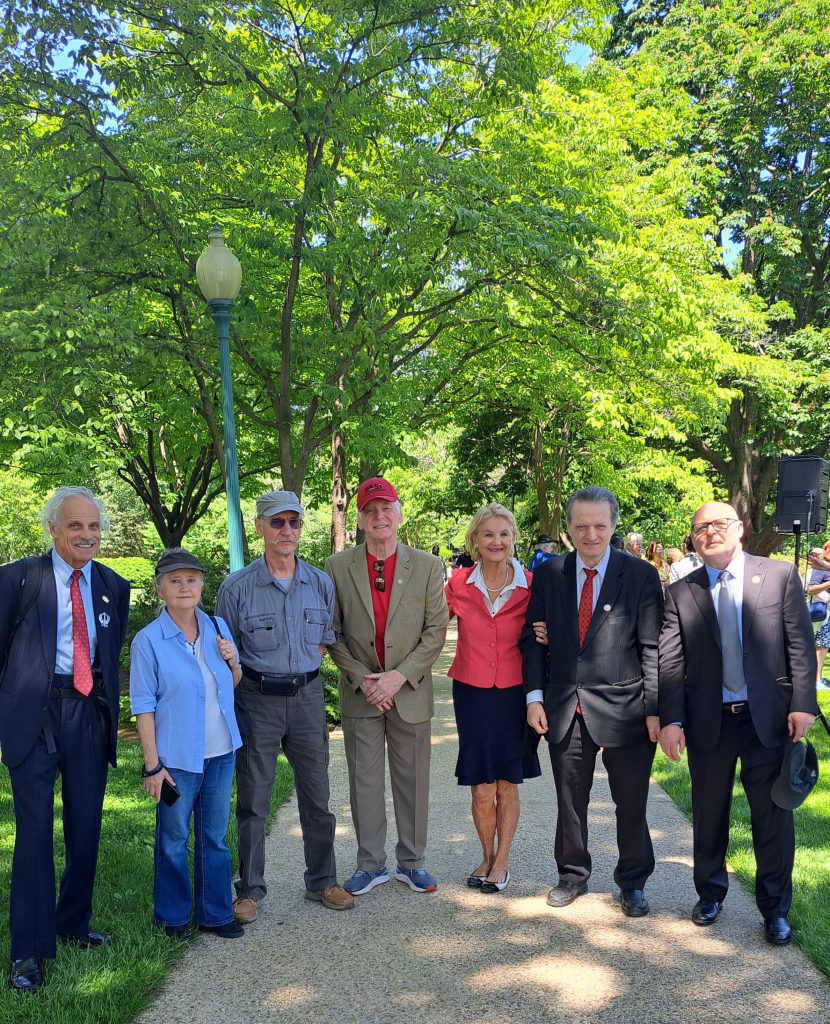
Request for Removal of ArticleWniosek o usunięcie artykułu
Dear Mr. Pignataro,
I am writing in response to the 22 August 2019 CTPost article by Lisa Backus titled “Outcry over Holocaust denier’s speech in CT city’s ‘Little Poland’”.
Ms. Backus writes that New Britain City Council members Carlo Carlozzi and Kate Breslin accused Mr. Edward Reid of being an “anti-Semite” and “well-known Holocaust denier”. These are serious accusations that are false and maliciously defamatory. Ms. Backus presents no evidence to support these accusations.
Two principles of journalism are pursuit of the truth and accuracy of the facts. Journalists can’t always guarantee truth but getting the facts right is the cardinal principle of journalism. Rather than require Mr. Carlozzi and Ms. Breslin to provide supporting evidence for their baseless and slanderous accusations, Ms. Backus instead parroted them in the article’s headline and text. This is an egregious violation of journalistic principles.
Ms. Backus further writes that Mr. Adrian Baron called Mr. Reid’s scheduled presentation a “fringe event”, which conveys a notably negative connotation. However, no effort was made to have Mr. Baron explain his term “fringe event”. Once again, Ms. Backus committed an egregious violation of journalistic principles. Moreover, the CTPost editors who approved the article’s publication committed the same deplorable violation.
As I’m sure you will surmise by my letter, I know Mr. Reid personally. I can confirm that the disparaging accusations made by Mr. Carlozzi and Ms. Breslin, irresponsibly parroted by Ms. Backus, and senselessly published by your editors, are baseless and false. As empirical evidence that validates my statement, I ask that you vist Mr. Reid’s website at https://polishtruth.com/. Thorough examination of his website, which Ms. Backus and your editors could have easily done, will confirm that the accusations of “anti-Semite”, “well-known Holocaust denier”, and “fringe event” are not only categorically false but further question the underlying motives of the accusers.
I would like you to know that this article, and the many antagonistic responses directed against Mr. Reid because of it, continue to weigh on him. Because the article was, and continues to be blatantly false, malicious, and undeserved, I ask that you place yourself in his position and consider how you would react to such unwarranted animus and recurring hostility. I therefore respectfully request that you permanently remove the article from the archives of the CTPost. I further ask for your reply to my request and the action you have taken or will take. If you disagree with my request for the article’s removal, I ask that you provide your justification for your disagreement.
Cordially,
Gene Sokolowski, PhD
President, Polish American Strategic Initiative Education Organization
15 kwietnia, 2022
Szanowny Panie Pignataro,
Zwracam się do Pana w kwestii artykułu Lisy Backus w CTPost z 22 sierpnia 2019 r. pt. „Oburzenie wywołane planowanym przemówieniem negacjonisty Holocaustu w „Małej Polsce” ,CT”.
Pani Backus pisze, że członkowie Rady Miasta New Britain, Carlo Carlozzi i Kate Breslin, oskarżyli Edwarda Reida o bycie „antysemitą” i „znanym negacjonistą Holokaustu”. Są to poważne oskarżenia, które są fałszywe i złośliwie zniesławiające. Pani Backus nie przedstawia żadnych dowodów na poparcie tych oskarżeń.
Dwie podstawowe zasady dziennikarstwa to dążenie do prawdy i ścisłości faktów. Dziennikarze nie zawsze mogą zagwarantować prawdę, ale poprawność faktów jest naczelną zasadą dziennikarstwa. Zamiast wymagać od pana Carlozziego i pani Breslin przedstawienia dowodów potwierdzających ich bezpodstawne i oszczercze oskarżenia, pani Backus powtórzyła je jak papuga w nagłówku i tekście artykułu. To rażące naruszenie zasad dziennikarskich.
Pani Backus pisze dalej, że pan Adrian Baron nazwał zaplanowane spotkanie z panem Reidem „marginalnym wydarzeniem”, które niesie ze sobą szczególnie negatywne skojarzenia. Nie podjęto jednak żadnych starań, aby pan Baron wyjaśnił swój termin „wydarzenie marginalne”. Po raz kolejny pani Backus dopuściła się rażącego naruszenia zasad dziennikarskich. Co więcej, redaktorzy CTPost, którzy zatwierdzili publikację artykułu, popełnili to samo godne ubolewania naruszenie.
Jak z pewnością Pan wnioskuje z mojego listu, osobiście znam pana Reida. Mogę potwierdzić, że lekceważące oskarżenia wysuwane przez pana Carlozziego i panią Breslin, nieodpowiedzialnie powtarzane przez panią Backus i bezsensownie opublikowane przez Waszych redaktorów, są bezpodstawne i fałszywe. Jako dowód empiryczny, który potwierdza moje stwierdzenie, proszę o odwiedzenie strony internetowej pana Reida pod adresem https://polishtruth.com/. Dokładne zbadanie jego strony internetowej, które pani Backus i redaktorzy CTPost mogliby z łatwością zrobić, potwierdza, że oskarżenia: „antysemityzm”, „znany negacjator Holokaustu” i „wydarzenie marginalne” są nie tylko kategorycznie fałszywe, ale również kwestionujące zródła motywujące oskarżycieli.
Chciałbym, aby Pan wiedzial, że ten artykuł i wiele antagonistycznych reakcji skierowanych z tego powodu przeciwko panu Reidowi nadal stanowi obciążenie przeciwko jego osobie. Ponieważ artykuł był i nadal jest rażąco fałszywy, złośliwy i niezasłużony, proszę, aby Pan postawił się na miejscu pana Reida i zastanowił się, jak zareagowałby Pan na tak nieuzasadnioną niechęć i powracającą wrogość. Dlatego z całym szacunkiem proszę o trwałe usunięcie artykułu z archiwów CTPost. Ponadto proszę o odpowiedź na moją prośbę i opisanie działania, które Pan podjął lub podejmie w tej kwestii. Jeśli nie zgadza sie Pan się z moją prośbą o usunięcie artykułu, proszę o uzasadnienie swojego sprzeciwu.
Z serdecznością,
dr Gene Sokołowski
Prezes,
Polsko-Amerykańska Inicjatywa Strategiczna – Organizacja Edukacyjna
Letter of the Elimination of the Unfair GPO and WEP Provisions of the Social Security ActList w sprawie wyeliminowania nieuczciwych przepisów GPO i WEP z ustawy o ubezpieczeniach społecznych
U.S. HOUSE OF REPRESENTATIVES
House Ways and Means Committee
Subcommittee on Social Security
1102 Longworth House Office Building
Washington, DC 20515
The Honorable John B. Larson, Honorable Members Mr. Bill Pascrell, Jr., Ms. Terri A. Sewell, Ms. Gwen Moore, Ranking Member Mr. Tom Reed, Mr. Tom Rice, Mr. Jodey C. Arrington, Mr. Ron Estes, Mr. Kevin Hern.
Dear Chairman Larson and Subcommittee Members:
Since many Polish Americans are among your loyal constituents, we are writing in unity with them to ask you to co-sponsor H.R. 82, “Social Security Fairness Act of 2021”, which your colleagues Representatives Linda Sánchez, Brian Higgins, Steven Horsford, and Earl Blumenauer have done. Additionally, we ask that you vote to report your findings to the House Ways and Means Committee so that it may be brought to the House Floor and voted on.
As you know, H.R. 82 permanently repeals the Windfall Elimination Provision (WEP) and the Government Pension Offset (GPO), both of which unfairly, and too often drastically, reduce the Social Security benefits of numerous government workers and legal immigrants. As a result, many fall into low-income and poverty status.
The GPO and WEP provisions are especially unjust towards legal immigrants whose small retirement pensions come from their native countries. Many of your constituents, including a considerable number of Polish Americans, fled persecution under repressive governments and are adversely affected by these provisions. These constituents are primarily first-generation immigrants who retire with a very modest income that combines Social Security benefits with a foreign pension. Their combined income frequently falls below the poverty threshold. Because these immigrants did not have an option to work in jobs covered by Social Security in their native country, reducing their benefits is discriminatory and unjust. Their foreign pension can in no way be called a “windfall”, which is commonly defined as an “unexpected gain” and “piece of good fortune”.
H.R. 5723 is, most commendably, a major overhaul of the Social Security system; however, Section 110, paragraph (c)(1) only repeals the WEP and GPO restrictions within the years 2022 to 2026. Offering temporary rather than permanent relief to 2.5 million retired Americans who are adversely affected by these provisions appears to be counterintuitive. Furthermore, because H.R. 82 currently has 267 bipartisan cosponsors and will be easily passed, withholding it from a House Floor vote appears to be equally counterintuitive.
Because H.R. 82 will quickly provide these Americans with much-needed, permanent economic relief as well as correct a longstanding injustice, it is imperative that these restrictions be repealed immediately. We respectfully implore you to vote with your four Subcommittee colleagues and report your findings to the House Ways and Means Committee so that H.R. 82 can be brought to the House Floor and voted on.
Sincerely,

Edward W. Jesman, President
Polish American Strategic Initiative
[email protected]
(310) 291-2681(310) 291-2681
|
cc: Chairman Richard Neal (Ways & Means) Representative Linda Sánchez Representative Brian Higgins Representative Steven Horsford Representative Earl Blumenauer |
Izba Reprezentantów USA
Komisja Potrzeb i Środków
Podkomisja Ubezpieczeń Społecznych
1102 Longworth House Office Building
Washington, DC 20515
Szanowny John B. Larson, Szanowni Reprezentanci pan Bill Pascrell, Jr., pani Terri A. Sewell, pani Gwen Moore, szanowny członek pan Tom Reed, pan Tom Rice, pan Jodey C. Arrington, pan Ron Estes, pan Kevin Hern.
Szanowny Panie Przewodniczący Larson i Członkowie Podkomisji:
Jako Amerykanie polskiego pochodzenia i Państwa lojalni wyborcy zwracamy się o współsponsorowanie ustawy HR 82, „Social Security Fairness Act of 2021”, którą Państwa koledzy, reprezentanci Linda Sánchez, Brian Higgins, Steven Horsford i Earl Blumenauer już stworzyli. Ponadto zwracamy się o zgłoszenie swoich własnych uwag do Komisji Potrzeb i Środków, aby w/w Ustawa mogł zostać przedstawiona w Izbie i poddana pod głosowanie.
Jak Państwo wiedzą ustawa HR 82 permanentnie uchyla Windfall Elimination Provision (WEP) i Government Pension Offset (GPO). Oba te akty prawne niesprawiedliwie i często drastycznie redukują świadczenia emerytalne Social Security wypłacane wielu pracownikom rządowym oraz legalnym imigrantom, czego rezultatem są zaniżone dochody i ubóstwo wielu z nich.
Przepisy GPO i WEP są szczególnie krzywdzące i niesprawiedliwe w odniesieniu do legalnych imigrantów, których niewielkie emerytury pochodzą z ich krajów pochodzenia. Wielu Państwa wyborców, w tym znaczna liczba Amerykanów polskiego pochodzenia, uciekło przed prześladowaniami opresyjnych reżimów i w/w ustawy negatywnie wpływają na ich obecną sytuację materialną. Dotyczy to przede wszystkim pierwszego pokolenia imigrantów, których emerytura stanowi połączenie wypłat z Social Security oraz równie skromnej emerytury z kraju pochodzenia. Łączny dochód takich emerytów często znajduje się poniżej progu ubóstwa, ponieważ nie mieli oni możliwości pracy na stanowiskach objętych społecznym ubezpieczeniem w kraju, z którego pochodzą, zatem zmniejszenie ich świadczeń jest dyskryminujące i niesprawiedliwe. Skromnej emerytury zagranicznej w żaden sposób nie można nazwać „uśmiechem losu”, „nieoczekiwanym zyskiem” lub „niezwykłym szczęściem”.
H.R. 5723 jest godną pochwały gruntowną przebudową systemu ubezpieczeń społecznych! Jednak sekcja 110, paragraf (c)(1) uchyla ograniczenia WEP i GPO tylko na lata 2022-2026. Proponowanie tymczasowej, a nie stałej pomocy 2,5 milionom amerykańskich emerytów, na których te przepisy mają negatywny wpływ, wydaje się być sprzeczne ze zdrowym rozsądkiem. Ponieważ ustawa HR 82 ma obecnie 267 międzypartyjnych współsponsorów i może zostać z łatwością uchwalona, powstrzymywanie jej od wprowadzenia pod głosowanie w Izbie Reprezentantów wydaje się być również sprzeczne ze zdrowym rozsądkiem.
W związku z tym, że Ustawa HR 82 szybko zapewni wymienionej grupie Amerykanów tak bardzo potrzebną, trwałą ulgę finansową, jak również naprawi wieloletnią niesprawiedliwość, uważamy za konieczne natychmiastowe zniesienie tych ograniczeń. Apelujemy o głosowanie wraz ze swoimi czterema kolegami z Podkomisji, a także zgłaszanie swoich uwag do Komisji Potrzeb i Środków, aby ustawa HR 82 mogła zostać poddana głosowaniu w Izbie Reprezentantów.
Z poważaniem,

Edward W. Jeśman, Prezes
Polsko-Amerykańska Inicjatywa Strategiczna
[email protected]
(310) 291-2681 (310) 291-2681
|
DW: Przewodniczący Richard Neal (Potrzeby i Środki) Przedstawicielka Linda Sánchez Reprezentant Brian Higgins Przedstawiciel Steven Horsford Przedstawiciel hrabia Blumenauer |
Statement on UkraineOświadczenie w sprawie Ukrainy
Letter To US CongressmenList do Kongresmanów Amerykańskich
U.S. HOUSE OF REPRESENTATIVES
House Committee on Education and Labor
Early Childhood, Elementary, and Secondary Education Subcommittee
2176 Rayburn House Office Building Washington, DC 20515-6100
The Honorable Gregorio Kilili Camacho Sablan, Honorable Members Mr. Robert C. “Bobby” Scott, Ranking Member Mr. Burgess Owens, Ms. Jahana Hayes, Mr. Raúl M. Grijalva, Ms. Frederica S. Wilson, Mr. Mark DeSaulnier, Mr. Joseph D. Morelle, Ms. Lucy McBath, Mr. Andy Levin, Ms. Kathy E. Manning, Mr. Jamaal Bowman, Mr. Glenn Grothman, Mr. Rick W. Allen, Mr. Fred Keller, Ms. Mary E. Miller, Mr. Madison Cawthorn, Ms. Michelle Steel, Ms. Julia Letlow.
Dear Chairman Sablan and Subcommittee Members:
As a coalition of Polish American organizations nationwide, we wish to inform you of our position on the comic book MAUS, which the McMinn County School Board in Tennessee recently removed from its curriculum because of violence, inappropriate language, and nudity. We applaud the decision; however, we wish to point out five additional, essential reasons that justify the book’s removal from school curricula in the United States.
First, the book is not ethically suitable for educational instruction. Ethical writing requires accurate and unbiased accounts; however, MAUS is a historically inaccurate expression of the author’s prejudice against Poles as a nation. In The Norton Anthology of American Literature, editors Jerome Klinkowitz and Patricia B. Wallace describe Spiegelman’s representation of Poles as pigs as “a calculated insult” against Poles. Pigs in popular culture are viewed as disgusting, filthy animals, while in Jewish culture, pigs and pork are unclean in a way that other animals are not. MAUS employs the same imagery of Poles found in Nazi German propaganda, where they were routinely referred to as “Polish pigs.” The highly offensive depiction of Poles as “pigs”, with all the derisive and racist connotations, forms a mental image that cannot be easily erased from the impressionable minds of young students whose knowledge of World War II history and the genocide perpetrated against Poles by the German and Soviet occupiers is minimal at best.
Second, the book is not suitable as a historical account because it falsifies the facts through distortions and material omissions. Poles are portrayed as Nazi German sympathizers, which was never the case. Civil resistance among Poles was universal and the underground Home Army fought the Germans at every turn. Unlike other German-occupied and Axis -allied countries, Poles never formed a collaborationist government, never formed a militia to round up or execute Jews, and never formed SS units. Spiegelman portrays all Auschwitz kapos as Poles, which is complete fiction as there are many eyewitness testimonies by Auschwitz Jews who detail the cruelties inflicted on them by Jewish kapos. He omits the fact that only in Poland those helping Jews, in any way, faced the death penalty together with immediate family. Instead, Poles helping Jews are depicted as greedy and deceitful. Spiegelman also omits the fact that the Germans often relied on Jewish Gestapo agents to hunt down Jewish ghetto escapees. This role is assigned exclusively to Poles, which is egregiously false.
Third, the book is not suitable from an educational perspective because few readers, especially elementary and high school students, have enough historical knowledge to recognize the falsified depiction of Poles. To have educational value, the treatment of historical context must strive for accuracy and objectivity. Hitler’s attempted destruction of Europe’s Jews is a historical event that is rightly considered an important historical topic. However, it is essential that other national groups who were subjected to German genocidal policies are presented fairly. Although Hitler’s policy for European Jews was comprehensive genocide, his policy for Poles was also comprehensive genocide but over a longer time period. As historian Richard C. Lukas describes in his book Forgotten Holocaust, the secret protocol in the 1939 German-Soviet nonaggression pact prescribed the destruction of the Polish people and the annihilation of the Polish state. Polish deaths during World War II were proportionately by far the greatest of any nation participating in the war. For Poland, the deaths of Poles and Polish Jews was a double genocide.
Fourth, MAUS does not teach students about the complexities of the Holocaust but instead falsifies and oversimplifies them. The reality is that neither students nor their teachers possess the necessary tools to assess the book’s flaws properly. For example, the portrayal of Poles contains serious falsehoods and misrepresentations regarding their alleged role in the Holocaust. Such rewriting of history is deplorable and unacceptable by any standard. The notion that teachers can and will expose the author’s biases and misrepresentations is doubtful. Since there is a choice of educational materials that may be used to teach a factual history of World War II and the Holocaust, it is imperative to choose books that are historically accurate and respectful of all the victims of Hitler’s genocidal policies. By contrast, MAUS clearly cannot be treated as an accurate historical record. Nevertheless, after Pulitzer Prize jurors designated the book in 1992 as nonfiction and gave it the Special Award in Letters, it wrongly continues to be considered as such.
Fifth, school children of Polish background who are required to study this book justifiably feel that their identity and cultural heritage has been diminished and are understandably humiliated by this experience. One should be aware that grandparents of these children may have been inmates of German concentration and death camps. Their family members may have been tortured, executed, forced to work as slave laborers, or subjected to medical experiments. Portraying Poles as a nation of pigs is egregiously offensive and constitutes willful harm to the memory of millions of Poles who died at the hands of the Germans. The victims of the Germans’ premeditated genocide included many: Jews, Poles, Russians and Roma. Choosing a book that addresses Hitler’s genocidal policies and respects the memory of all those who perished is necessary for advancing students’ knowledge and understanding of this important historical subject. The purpose of education is not to distort the facts and cause distress and division among students.
Based on reasons outlined above, we consider MAUS to be highly defamatory, a form of hate speech against Poles and, therefore, unsuitable, and unacceptable as a teaching material. Spiegelman’s comic book falsifies history and deeply offends on many levels. No book in any school curriculum targets another group for derision in this way; it is abusive and psychologically damaging. The bigoted stereotype of Poles should have no place in education. Spiegelman’s Polonophobic slurs, falsely considered a work of historical nonfiction, should be promptly and permanently removed from school curricula and school libraries. No child should be forced to study a book that treats his or her national group or community in the dishonest and prejudiced way that Poles are portrayed in MAUS.
Depiction of the entire Polish ethnic group as pigs offends the people of Polish descent and is racist in its nature. Title VI, 42 U.S.C. 2000d et seq., prohibits discrimination based on race, color, and national origin in programs and activities receiving federal financial assistance. The use of MAUS – a prime example of anti-Polish hate speech – as educational material constitutes discrimination and abuse of Polish American students. It forces them not only to study biased educational materials but also imposes on them a bigoted stereotype of brutish, primitive, and dishonest “Polacks”. Such treatment causes great pain and suffering to the youth of Polish descent and subjects them to bullying. For many Polish American students forced to study MAUS, the psychological impact is traumatizing and, at a minimum, adversely affects their self-confidence and academic performance. Furthermore, the exclusion of materials that truthfully present all the victims of Hitler’s genocidal policies is discriminatory and violates states’ educational standards of historical accuracy.
We respectfully ask the Subcommittee to instruct the Department of Education and Department of Justice to send “Dear Colleague” letters to state directors of public education requiring them to instruct their local school districts that the use of MAUS should be promptly discontinued. We further ask that the letters recommend using World War II educational materials that are historically accurate and address all victims of Hitler’s genocidal policies.
Sincerely,
List of signatories as of 03/23/2022
• Gene Sokolowski, Ph.D., President, Polish American Strategic Initiative Educational Organization [email protected], (703) 966-5109(703) 966-5109
• Edward Wojciech Jeśman, President, PASI – Polish American Strategic Initiative [email protected], (310) 291-2681(310) 291-2681
• James J. Robaczewski, National President, Polish Roman Catholic Union of America
• Dorota Andraka, Ph.D., President, Polish Supplementary School Council of America, NY
• Michael Niedzinski, President, Polish American Congress Illinois Div., IL
• Andrzej Prokopczuk Ph.D., M.D., President, Polish American Congress Northern California Div., CA
• Prof. Jim Mazurkiewicz, Ph.D., Texas A&M University, President, Polish American Council of Texas, TX
• Anna Bankowska, President, Polish American Congress Michigan Div., MI
• Blanka Rosenstiel, Chairman, American Institute of Polish Culture (AIPC), FL
• Prof. Witold Lukaszewski, Professor Emeritus at Sam Houston State University, TX
• Agata Marriott, M.D., President, Polonia Institute, CA
• Maria Szonert Binienda, President, Libra Institute, OH
• Richard Widerynski, Vice President, Polish American Congress of Southern California, CA
• Wieslaw Wierzbowski, President, Polish American Congress Eastern Massachusetts Div., MA
• Andrzej Burghardt, President, Polish American Congress, New Jersey Division, NJ
• Miroslawa Dulczewska-Miller, M.D., Honorary President, Polonia for Poland, Chicago, IL
• Walter Wieslaw Golebiewski, President, Polish American Congress Western Florida Div., FL
• Jerzy Bogdziewicz, President, Polish American Congress of Florida, FL
• Richard Brzozowski, President, Polish American Congress, New York Long Island Div., NY
• Marek Waniołka, President, Polish American Congress, Missouri Div., MO
• Tomasz Mroczek, President, Polish American Congress Central New York Div., NY
• Christopher J. Gajda, President, Polish Association in Texas, Dallas, TX
• Jan Malek, President, Polish American Foundation for Research and Education, Torrance, CA
• Leszek Pawlik, President, Coalition of Polish Americans, NJ
• James Lawicki II, President, Polish American Congress Western New York Div., NY
• Walter Wieslaw Golebiewski, President, World Research Council on Poles Abroad, FL
• Dan Zamoyski, Head of Polish Media Issues, Worldwide
• Maja Trochimczyk, Ph.D., President, Helena Modjeska Art and Culture Club, Los Angeles, CA
• Elzbieta Rudzinska, President, Polish American Teachers West Coast Forum, Los Angeles, CA
• Alexander M. Jablonski, Ph.D., President, Oskar Halecki Institute in Canada, CANADA
• Boguslaw Niemczewski, President, Polonia for Poland, IL
• Krystyna Zamorska, Ph.D., American Historical Association and Polish American Historical Association (PAHA), New Britain, CT
• Andrzej Hac, President, Polish American Business and Professional Assoc., New Britain, CT
• Patricia Stepniak, President, General Pulaski Memorial Parade Committee in Jersey City, NJ
• Boguslawa Huang, Principal, Joseph Pilsudski Polish Supplementary School in Jersey City, NJ
• Lucyna Synal, President, John Paul II Catholic Discussion Club, NY
• Walter Brzozowski, President, Polish National Alliance Lodge 1684, Cohoes, NY
• Tadeusz Kulawiak, Trustee, Polish American Citizen Club, Albany, NY
• Marie Glowacki, Secretary, Polish Community Center, Albany, NY
• Marian Wiercioch, Commissioner of District III, Polish National Alliance, Cohoes, NY
• Susan Gorga, President, Ladies Auxiliary, Polish Community Center, Albany, NY
• George Sykala, Commander, Polish American Veterans Inc, Schenectady, NY
• Henry Matala, President, St. Michaels Polish Community Center, Cohoes, NY
• Maria Swieton, President, St. Michaels Rosary Society, Cohoes, NY
• Edward Swiderski, President, Polish National Alliance Lodge 113, Amsterdam, NY
• Marek Maciolowski, President, Historical Conservation Foundation, Chapel Hill, NC
• Pawel Dworak, Treasurer, White Eagle Association, Utica, NY
• Andrzej Cierkosz, President, Dobra Polska Szkola Foundation, New York, NY
• Kazimiera Kmak, Principal, Polish School in Yorba Linda, CA
• Mariola Beresniewicz-Kopcinski, Ph.D., President, Polish American Club of Triangle, NC
• Robert Szydłowski, President, Polish American Cultural Society of Metropolitan St Louis, MO
• Thomas Washock, Polish American Club Inc., Troy, NY
• Jolanta Chorazy, Principal, Nicholas Copernicus Polish School, Mahwah, NJ
• Wanda Urbanska, Former President, Jan Karski Educational Foundation, FL
• Alicja Jachna, Principal, Polish School of Jagiellonians, Passaic, NJ
• Agnieszka Pogorzelska, Principal, Casimir Pulaski Polish Supplementary School in Garfield, NJ
• Jerzy Majcherczyk, President, Polish American Travelers Club in NJ
• Hanna Czuma, Principal, John Paul II Polish School in the Pocono, PA
• Aniela Baj-Thant, President, Adam Mickiewicz Library & Dramatic Circle, Buffalo, NY
• Joyce Troyer, President, Polish American Social Club of San Diego County, CA
• Vince Boshchik, President, Polonia United, San Diego, CA
• Miroslaw Gorny, President, House of Poland, San Diego, CA
• Barbara Brys, Director, Polish Amateur Theatre of Boston, MA
• David Gizara, Polish American Veterans Inc., Amsterdam, NY
• Richard J. Noga, President, The Kopernik Memorial Association, Utica, NY
• Marcin Waszkiewicz, President, Polonia Society of Korona, Bunnell, FL
• James P. Jóźwiak, National President, Polish Union of America, Buffalo, NY
• Jozef Luczaj, President, Polish American Sea League Inc., Rockaway Beach, NY
• Aleksandra Urban, Rector, Polish School at Saint Hedwig Parish, Trenton, NJ
• Monika Kowara, Principal, St. John Cantius Polish Language School, Philadelphia, NJ
• Donald Norkoski, President, Polish Club, Aberdeen, WA
• Andrew Kozlowski, President, Polish Center, Los Angeles, CA
• Darek Swiatkowski, President, Polish American Performing Arts Club, Yorba Linda, CA
• Jan Mroczek, President, Polish Combatants of World War II, Utica, NY
• Hanna Skowronska-Jekal, Principal, Polish Supplementary School of the United Poles in America, Perth Amboy, NJ
• Monika Zarzycka, Principal, Polish School “Ogniwo”, Morrisville, PA
• Piotr Kwidzinski, President, Polonian Pastoral and Cultural Center, Sacramento, CA
• Danuta Eichler, Principal, St. Adalbert Polish Language School, Philadelphia, PA
• Maria Hejnosz, President, Polish Heritage Society of Philadelphia, PA
• Henryka Lazarz, Principal, Polish Alma Mater, Los Angeles, CA
• Karolina Badura, Principal, Janusz Korczak Polish Language School, Providence, RI
• William Spangola, President, Plains Polish American Veterans, Wilkes Barre, PA
• Alicja Ruszala, President, Polish American Club of North Jersey, Paramus, NJ
• Anna Kubicka, Principal, Henryk Sienkiewicz Polish Supplementary School, Brooklyn, NY
• Elżbieta Złotnik, Principal, John Paul II Polish Language School, New Britain, CT
• Beata Popowska, Fr. Augustine Kordecki Polish Supplementary School, New York, NY
• Jan Kozak, Principal, John Paul II Polish Language School, Boston, MA
• Marta Borowski, Principal, John Paul II Polish Saturday School, New Haven, CT
• Wioletta Jusinska, Director, Blessed Jerzy Popieluszko Polish Saturday School, Derby, CT
• Charles Balcer, President, Committee for the Conservation of the Katyn Monument & Historical Objects, Jersey City, NJ
• Aleksandra Ziolkowska-Boehm, Ph.D., author, PEN America, Wilmington, DE
• Boguslawa Doerr, President, Friends of JPII Foundation, Los Angeles, CA
• Ronald A. Lipinski, Commander, Polish American War Veterans, Caseyville, IL
• Malgorzata Starzec, Director, St. Queen Jadwiga Polish Language School, Ridgewood, NY
• Malgorzata Czajkowski, Director, Polish Language School by Parish of Holy Czestochowa Mary, Brooklyn, NY
• Paul Breza, President, Polish Cultural Institute & Museum, Winona, MN
• Jolanta Gmurowski, Director, Adam Mickiewicz Polish Language School, Sterling, MI
• Barbara Swierkowski, President, Polish American Social Club Inc, Port Saint Lucie, FL
• Mary Lou Wyrobek, President, The Polish Singers Alliance of America, NY
• Ted Day, Past President, Polish American Society of Greater Cincinnati, OH
• Jerzy W. Rozalski, Polish Varieties Radio, WNZK 690AM, Detroit, MI
• Richard Walawender, Chairman of the Board, Polish Institute of Culture & Research, Orchard Lake, MI
• Anna Nikadon, Principal, St. Joseph Polish School, Jamaica, NY
• Iwona Podzorski, President, Polish American Social Club of Las Vegas, NV
• Renata Fracz, Polish Lobby, West Bloomfield, MI
• Grazyna Stanowska, Principal, Father Dabrowski Polish Language Center, Orchard Lake, MI
• Urszula Mejza, Principal, Saint John Paul II Polish Language School, Hamtramck, MI
• Halina Szeligowski, President, Pulaski Parade Committee, Stamford, CT
• Veronica Kearns, President, Polish Society of Westchester, Pelham, NY
• Artur Lalik, Principal, Saint Michael Polish School in Lyndhurst, NJ
• Anna Tracz, Principal, Polish Language Academy in Manchester, NJ
• Henry Pakosz, Vice-President, Polish Falcons of America Nest 946, NJ
• Elizabeth Laskowski, Principal, Polish Supplementary School of Polish Falcons Nest 946, Manville, NJ
• Walter Szuba, Vice-President, Polish Falcons of America, District 1, Hillsborough, NJ
• Urszula Gora, Principal, St. Casimir Polish School in Newark, NJ
• Ewa Sadowska, Principal, Polish Educational Organization in Garfield, NJ
• Boguslawa Borkowska, Principal, Casimir Pulaski Supplementary School, Brooklyn, NY
• Anna Ciesluk, Principal, Maria Sklodowska-Curie Polish Supplementary School, Irvington, NJ
• Agata Stopa, Principal, Educational Polish Corporation, Allamuchy, NJ
• Dorota Zaniewska, Principal, St. John Paul II Polish Supplementary School, Staten Island, NY
• Hanna Tomaszkiewicz, Principal, Nicolaus Copernicus Polish School in Houston, TX
• Ewa Zalusinska, Principal, St. Maximillian Kolbe Polish Supplementary School, Riverhead, NY
• Jacek Kawczynski, Commander, Katyn Rally Society-Memory and Identity, Palatine, IL
• Grazyna Wiacek, President, Polish American Retirement Foundation, Los Angeles, CA
• Margaret Meub, President, Austin Polish Society, Austin, TX
• Alicja Karlic Ph.D., Editor in Chief, The Polish Weekly, Detroit, MI
• Mark Kohan, Editor, Polish American Journal, Buffalo, NY
• Richard Zawisny, President General, Pulaski Memorial Parade Committee, Inc. New York, NY
• Roman Zawadzki, Chairman, Polish American Defense Committee, Los Angeles, CA
• Theresa Kuziara-Bonk, Past President, Polish American Congress, Central New York Div, NY
• Marek J. Druzdzel, Ph.D., Professor Emeritus, School of Computing and Information, University of Pittsburgh, PA
• Piotr Nowinski, Ph.D., President, Polish National Alliance Lodge 3821, Las Vegas, NV
• Elzbieta Youngman, Principal, St. John Paul II Polish School, Las Vegas, NV
• Leopold Wierzbicki, Ph.D., Polish National Alliance, Pulaski Lodge, Fresno, CA
• Mira Modelska-Creech, Professor Emeritus, Georgetown University, Washington, DC
• Marek Rudnicki, M.D., Professor of Surgery, Chicago, IL
• Iwona Filipiak, President, Polish American Chamber of Commerce, Chicago, IL
• Malgorzata Grondalski, Principal, Polish School, Denver, CO
• Jan Peczkis, Author and Educator, Chicago, IL
• Aleksander Janta-Polczynski, Principal, Polish Supplementary School, Lakewood, NJ
• Andrew Brylowski, M.D., Fellow American Psychiatric Association, TX
• Renata Dajnowska, Principal of Polish-Cultural Enrichment Program, Portland, OR
• Kazimierz Braun, Professor Emeritus, College of Arts and Sciences, University of Buffalo, NY
• Wendy Higgings, President, Polish Cadets of Buffalo, NY
• Stanislaw W. Sarna, President, Polish Highlanders Alliance of America, Chicago, IL
• Anna Brodziewska, Principal, Wislawa Szymborska Polish Language School, Port Chester, NY
• Stanislaw Purc, Vice President, Polish American Association of Pensioners, Chicago, IL
• Theresa Romanowski, Director, Polish American Cultural Center, Philadelphia, PA
• Michael R. Blicharz, President, Polish American Congress Eastern Pennsylvania Div., PA
• Jacek Hilgier, Publisher and Editor-in-Chief, “Gwiazda Polarna”, Stevens Point, WI
• Arlene Walbert, President, Polish American Association, Cohoes, NY
• Ewa Koch, President, Polish Teacher Association in America, Chicago, IL
• Alina Gauza, Principal, The Polish Supplementary School of Maria Konopnicka, Yonkers, NY
• Kamila Domanski, Principal, The Polish Supplementary School of Wladyslaw Reymont, Bayonne, NJ
• Renata Ochocka, Principal, St. Faustina Polish School in Ozone Park, NY
• Teresa Ochocka, Former Principal, Nicholas Copernicus Polish School, Mahwah, NJ
• Debbie Majka, Principal, Adam Mickiewicz Polish Language School, Philadelphia, PA,
• Bozena Jaroszewska, Principal, Maria Konopnicka Polish Saturday School, Webster, MA
• Edyta Hamala-Tanzi, Principal, St. John Paul II School of Polish Language and Culture, Poughkeepsie/Monroe, NY
• Malgorzata Matuszewska, Principal, St. John Paul II School of Polish Language and Culture, Bridgeport, CT
• Anna Smerdel-Gromaya, Ph.D., President, Hartford Saturday School, CT
• Caria Tomczykowska, President, The Polish Arts and Culture Foundation, San Francisco, CA
• Waldemar Biniecki, Publisher & Editor, Kuryer Polski, WI
• Małgorzata M. Zaleska, Ph.D., President, Polish People’s University, Philadelphia, PA
• Debbie Bonnell, President, American Citizenship Club for Polish Descendents, Newmarket, NH
• Barbara Musiał, Principal, St. Faustyna Polish School, Lombard, IL
• Edmund Lewandowski, Co-Founder, Coalition of Polish Americans, San Francisco, CA
• Adam Konopka, President, Chicago Society PNA, Chicago, IL
• Lucja Mirowska-Kopec, Ed. D., President, Alliance of Polish Clubs in the USA, Chicago, IL
• Jolanta Harrison, Director, Józefa Piłsudski Academy of Polish Language and Culture, Bartlett, IL
• Marzena Klimek, Principal, Albert Chmielowski Polish School, Chicago, IL
• Małgorzata Stępień, President, Polish Cultural Foundation, Clark, NJ
• Barbara Ilnicka, Polish American Radio, Philadelphia, PA
• Zofia Mularczyk, Director, Polish Theatre Company, Philadelphia, PA
• Antonina Ofiara, Director, Polish Language School, Salt Lake City, UT
• Irena Wozniak, Director, The School of Polish Language and Culture, Palos Heights, IL
• Ted Fiszer, President, Polish Library Building Association, Portland, OR
• Barbara Stamberg, Principal, Polish Saturday School, San Jose, CA
• Robert Szydłowski, President, Polish American Cultural Society of Metropolitan St Louis, MO
• Grzegorz Koltuniak, President, Friends of John Paul II Foundation, St. Louis, MO
• Robert Bednarz, President, Polish Heritage Society of Nebraska, Inc. Omaha, NE
• Ilona Sobiech, Vice President ZNP, Henryk Sienkiewicz Polish School, Romeoville, IL
• Teresa Makowski, President, Z114 FCSLA Life, Chicago, IL
• Ryszard Makowski, Member, Polish American Engineers Assoc., Chicago, IL
• Anna Siek, Director, Feliks Konarski Polish Language School, Des Plaines, IL
• Helena Knapczyk, Ladies’ Auxiliary Corps at SWAP, New York, NY
• Tom Jodlowski, Manager, Polish Home, Omaha, NE
• Małgorzata Tys, Principal, St. Blase Polish Catholic School, Summit, IL
• Jay Crepo, Commander, Polish American Veterans Club, New London, CT
• Ewa Pawlik, President Kościuszko Polish Language Foundation, Salem, MA
• Wojciech M. Bolko, President, Foundation of the Polish Supplementary School of Long Island, Hicksville, NY
• Zdzislaw Klazuk, President, Polish Falcons Nest 17, Newark, NJ
• Anna Szeliga, Vice Principal, Polish Supplementary School of Long Island, Hicksville, NY
• Anna Lisowski, Principal, Maria Konopnicka Polish Saturday School, Bunnell, FL
• Andrzej Pronczuk, D.Sc., Past President, Polish Culture Foundation, Boston, MA
• Halina Olszewski, Principal, Saturday Polish Language School, Worcester, MA
• Ewa Pawlik, Principal, Thaddeus Kosciusko Polish Supplementary School, Salem, MA
• Walter Szaflarski, President, The Circle of Highlanders & Lovers of the Mountains of the State of Michigan, Rochester, MI
• Mira Szramel, Principal, Msgr. Peter Adamski Polish Saturday School, Buffalo, NY
• Barbara Tarsoly, President, Polish American Club of Sacramento, Inc., Sacramento, CA
• Heather Gravel, Director, Pilsudski Polish American Citizen Club, Southbridge, MA
• Ewa O’Neal, President, Polish University Club of Los Angeles, CA
• Elzbieta Ostrowski, Polish School of Wisconsin, Milwaukee, WI
• Steve Graus, Chairman, National Polish American Sports Hall of Fame, Troy, MI
• Raymond Glebocki, President, American Council for Polish Culture, Grosse Pointe Park, MI
• Peter Sroczynski, President, NoCodeX, LLC., Austin, TX
• Hanna Gracz, Principal, Polish School for Children, Raleigh, NC
• Piotr Golabek, President, Polish American Soccer Association, Wallington, NJ
• Katarzyna Włodek, President, Jan Karski Polish School of Dallas, TX
• Urszula Gawlik, Director, Tadeusz Kosciuszko Polish Language School, Chicago, IL
• Izabela Przybyla, Director, Polish School of King Casimir the Great, Orland Hills, IL
• Anna Cholewinska, Principal, Jan Twardowski Polish School, Bellevue, WA
• Anna Szpindor, MD, Former President, Polish American Medical Society, Chicago, IL
• Tomasz Skotnicki, Honorary Consul of the Republic of Poland in Colorado, CO
• Jan Cytowski, Vice President, Canadian Polish Congress District Toronto, CANADA
• Matt Zajac, Polish Society of Wisconsin, Milwaukee, WI
• Edward Cyran, President, Tadeusz Kosciuszko Association of Friends of the Polish Lancers in Chicago Il.
23 marca 2022
Izba Reprezentantów Kongresu USA
Komisja Izby Reprezentantów ds. Edukacji i Pracy
Podkomisja ds. Wczesnej Edukacji, Szkolnictwa Podstawowego i Średniego
2176 Rayburn House Office Building
Washington, DC 20515-6100
Przewodniczący Gregorio Kilili Camacho Sablan oraz członkowie podkomisji, Pan Robert C. „Bobby” Scott, Pan Burgess Owens, Pani Jahana Hayes, Pan Raúl M. Grijalva, Pani Frederica S. Wilson, Pan Mark DeSaulnier, Pan Joseph D. Morelle, Pani Lucy McBath, Pan Andy Levin, Pani Kathy E. Manning, Pan Jamaal Bowman, Pan Glenn Grothman, Pan Rick W. Allen, Pan Fred Keller, Pani Mary E Miller, Pan Madison Cawthorn, Pani Michelle Steel i Pani Julia Letlow.
Szanowny Przewodniczący Sablan i Szanowni Członkowie Podkomisji:
Jako koalicja ponad 200 organizacji polonijnych z różnych stanów pragniemy poinformować Kongres o naszym stanowisku w sprawie komiksu MAUS, który rada ds. programów szkolnych powiatu McMinn w Tennessee niedawno usunęła ze swojego programu nauczania historii z powodu zawartych tam aktów przemocy, nagości i wulgarnego języka. Popieramy tą decyzję; chcielibyśmy jednak wskazać na pięć dodatkowych, ważniejszych przyczyn, które uzasadniają usunięcie tej książki raz na zawsze z programów szkolnych na terenie całych Stanów Zjednoczonych.
Po pierwsze, książka nie nadaje się do nauczania z powodów etycznych. Rzetelność przekazu pisanego zależy od dokładności i bezstronności relacji; MAUS jest przekazem zafałszowanym historycznie, który jest wyrazem uprzedzeń autora względem Polaków jako narodu. Jerome Klinkowitz i Patricia B. Wallace, redaktorzy The Norton Anthology of American Literature, definiują przedstawienie Polaków przez autora komiksu, Arta Spiegelmana, jako świnie, jako celową zniewagę i próbę poniżenia Polaków. W kulturze masowej świnie są postrzegane jako odrażające, brudne zwierzęta, a w kulturze żydowskiej świnie i wieprzowina są uważane za nieczyste, w taki sposób, że je to odróżnia w wyraźny i negatywny sposób od innych zwierząt. MAUS wykorzystuje tę samą symbolikę i słownictwo kreując obraz Polaków, który można znaleźć w niemieckiej propagandzie okresu II wojny światowej, która rutynowo nazywała Polaków „polskimi świniami”. Wysoce obraźliwe przedstawienie Polaków jako świnie, ze wszystkimi negatywnymi i rasistowskimi tego słowa konotacjami, tworzy obraz, którego nie sposób jest wymazać z podatnych na wpływy i sugestie umysłów dzieci i młodzieży, tym bardziej że ich znajomość historii II wojny światowej i polityki ludobójstwa popełnionego na Polakach przez okupantów niemieckich i sowieckich są, w najlepszym razie, minimalne.
Po drugie, książka nie spełnia wymogów rzetelnej narracji historycznej, ponieważ fałszuje ona i przeinacza w sposób oczywisty fakty. Polacy są przedstawiani w niej jako sympatycy niemieckiego nazizmu, co jest nieprawdą i co nigdy nie miało miejsca. Opór względem niemieckiej okupacji był wśród Polaków powszechny, a podziemny ruch oporu był zjawiskiem bardzo rozpowszechnionym. W przeciwieństwie do innych okupowanych przez Niemców lub sprzymierzonych z nimi krajów, Polacy nigdy nie utworzyli kolaboracyjnego rządu, nigdy nie stworzyli polskich oddziałów SS i nigdy nie tworzyli grup i bojówek, których celem było wyłapywanie i mordowanie Żydów. Co więcej, w komiksie Arta Spiegelmana wszyscy kapo w Auschwitz są Polakami, co jest kompletną fikcją. Przeczą temu liczne zeznania Żydów ocalałych z Auschwitz, naocznych świadków, którzy szczegółowo opisują okrucieństwa zadawane im przez żydowskich kapo. Autor pomija również fakt, że Polakom i ich najbliższym, za pomoc ludności żydowskiej, groziła kara śmierci. Wbrew faktom, Polacy pomagający Żydom są przedstawiani w komiksie jako osoby chciwe i podstępne. Art Spiegelman zapomina również, że Niemcom polującym na żydowskich uciekinierów z getta pomagali liczni żydowscy agenci Gestapo. Tego typu zachowania przypisywane są w komiksie wyłącznie Polakom, co rażąco mija się z prawdą historyczną.
Po trzecie, książka posiada wątpliwą wartość edukacyjną, ponieważ niewielu czytelników, zwłaszcza uczniów szkół podstawowych i średnich, ma wystarczającą wiedzę historyczną, aby rozpoznać w tej książce zafałszowany obraz Polaków. Aby stanowić wartość edukacyjną, materiały dydaktyczne muszą dokładnie i obiektywnie przedstawiać kontekst historyczny. Eksterminacja europejskich Żydów przez Hitlera jest faktem historycznym, który słusznie uważany jest za ważny temat w nauczaniu historii. Ważne jest jednak, aby historia innych grup narodowych, które również podlegały niemieckiej polityce eksterminacji i ludobójstwa, była w pełni i właściwie uwzględniona w nauczaniu, a ich martyrologia wiernie w niej przedstawiana. Polityka Hitlera wobec europejskich Żydów była polityką ludobójczą, podobnie jak i niemiecka polityka eksterminacji Polaków, chociaż ta miała być rozciągnięta w czasie. Jak opisuje w swojej książce “Zapomniany Holokaust” historyk Richard C. Lukas, tajny protokół będący częścią niemiecko-sowieckiego paktu o nieagresji z 1939 r. przewidywał fizyczne zniszczenie narodu polskiego i unicestwienie polskiego państwa. Śmiertelność wśród Polaków podczas II wojny światowej była proporcjonalnie najwyższa spośród wszystkich narodów biorących udział w wojnie. Dla Polski eksterminacja Polaków i polskich Żydów była polityką podwójnego ludobójstwa.
Po czwarte, MAUS nie prezentuje uczniom pełnego obrazu II wojny światowej, lecz albo ją fałszuje, albo zawęża i nadmiernie upraszcza. W rzeczywistości ani uczniowie, ani ich nauczyciele nie posiadają narzędzi i wiedzy niezbędnych do krytycznej oceny tej lektury. Portret Polaków jako chętnych uczestników eksterminacji Żydów zawiera bez wątpienia poważne przeinaczenia i jest ewidentnym zafałszowaniem historii. Przepisywanie historii na nowo przez autora jest nie do przyjęcia i jest godne potępienia. Oczywiste jest, że współczesne pokolenie nauczycieli nie zna na tyle historii II wojny światowej, żeby mogło rozumieć uprzedzenia i przeinaczenia prawdy historycznej dokonane przez autora i wątpliwe jest, aby mogło je tym samym demaskować, tłumaczyć i ujawniać. Biorąc pod uwagę fakt, że istnieją rzetelne materiały edukacyjne, które można wykorzystać do nauczania prawdziwej historii II wojny światowej i niemieckiego ludobójstwa, konieczny jest dobór lektur, który odpowiada prawdzie historycznej i uwzględnia wszystkie ofiary ludobójczej polityki Hitlera. Komiks MAUS ewidentnie nie może być traktowany jako rzetelna relacja historyczna. Niemniej, po tym jak jurorzy Nagrody Pulitzera uznali komiks Spiegelmana w 1992 roku za literaturę faktu i przyznali mu Nagrodę Specjalną w tej kategorii, pozycja ta dalej niesłusznie i absurdalnie uważana jest za literaturę faktu.
Po piąte, dzieci w wieku szkolnym polskiego pochodzenia, od których wymaga się czytania i studiowania tej książki, słusznie czują, że ich tożsamość i dziedzictwo kulturowe zostały umniejszone i są, co jest zrozumiałe, upokorzone tym doświadczeniem. Trzeba pamiętać, że dziadkowie tych dzieci mogli być więźniami niemieckich obozów koncentracyjnych i obozów zagłady. Członkowie ich rodzin mogli być torturowani, mordowani, zmuszani do pracy niewolniczej lub poddawani eksperymentom medycznym. Przedstawianie Polaków jako narodu świń jest rażąco i celowo obraźliwe oraz umyślnie obraża pamięć milionów Polaków, którzy zginęli z rąk Niemców. Ofiarami polityki eksterminacji popełnionej przez Niemców byli Żydzi, Polacy, Rosjanie, Romowie i wielu innych. Wybór lektur, które odnoszą się do ludobójczej polityki Hitlera i szanują pamięć wszystkich tych, którzy zginęli, jest niezbędny dla rzeczywistego zrozumienia przez uczniów tego ważnego historycznego tematu. Edukacja nie może być równoznaczna ze zniekształcaniem faktów, tworzeniem podziałów i wprowadzaniem uczniów w stan depresji i desperacji.
Z wyżej wymienionych powodów, uważamy lekturę MAUS za wysoce obraźliwą, za mowę nienawiści skierowaną przeciwko Polakom. Książka ta jest nie do przyjęcia jako materiał dydaktyczny. Komiks Spiegelmana fałszuje historię i głęboko obraża na wielu płaszczyznach. Żadna lektura w szkolnych programach nauczania w Stanach Zjednoczonych nie poniża w ten sposób innej grupy narodowościowej. Komiks ten jest obraźliwy i wulgarny i wpływa destrukcyjnie na psychikę uczniów mających polskie korzenie. Kreowanie i posługiwanie się fałszywym i pełnym bigoterii stereotypem Polaka nie powinno mieć miejsca w edukacji. Polonofobiczne obelgi Spiegelmana, promowane na dzieło literatury faktu historycznego, powinny zostać niezwłocznie i trwale usunięte z programów szkolnych i bibliotek szkolnych. Żadne dziecko, żaden uczeń nie powinien być zmuszany do studiowania książki, która traktuje go, jego grupę narodową lub społeczność w sposób nieuczciwy, fałszywy i wrogi, tak jak Polacy są portretowani w MAUS.
Paragraph VI, 42 U.S.C. 2000d zabrania dyskryminacji ze względu na rasę, kolor skóry i pochodzenie narodowe w programach i działalności otrzymującej federalną pomoc finansową. Wykorzystanie MAUS – klasycznego przykładu antypolskiej mowy nienawiści – jako materiału edukacyjnego stanowi dyskryminację i prześladowanie uczniów polskiego pochodzenia. Zmusza ich nie tylko do studiowania tendencyjnych i historycznie nieprawdziwych materiałów, ale także obraża ich promowaniem stereotypu brutalnych, prymitywnych i nieuczciwych „Polaczków”. Takie traktowanie nie tylko wywołuje wstyd i oburzenie, ale także naraża uczniów na nękanie. Dla wielu amerykańskich studentów polskiego pochodzenia, zmuszonych do czytania MAUS, doświadczenie to jest traumatyczne oraz negatywnie wpływa na ich samoocenę i wyniki w nauce. Co więcej, wyłączenie materiałów, które zgodnie z prawdą historyczną przedstawiają wszystkie ofiary ludobójczej polityki Hitlera, jest dyskryminujące i narusza federalne standardy edukacyjne dotyczące rzetelności i dokładności narracji historycznej.
Zwracamy się do Podkomisji aby poinstruowała Departament Edukacji i Departament Sprawiedliwości o konieczności wysłania listów („Szanowny Kolego”) do dyrektorów stanowych instytucji odpowiedzialnych za kształt programów szkolnych oraz aby poinstruowali okręgi szkolne zlokalizowane w zarządzanych przez nich stanach aby te niezwłocznie zaprzestały korzystać z MAUS jako lektury zarówno obowiązkowej jak i pomocniczej w nauczaniu historii. Ponadto prosimy, aby listy te zalecały wprowadzenie w zamian lektur rzetelnych pod względem historycznym i przedstawiających wszystkie ofiary ludobójczej polityki Hitlera.
Z poważaniem,
• Gene Sokolowski, Ph.D., President, Polish American Strategic Initiative Educational Organization [email protected], (703) 966-5109(703) 966-5109
• Edward Wojciech Jeśman, President, PASI – Polish American Strategic Initiative [email protected], (310) 291-2681(310) 291-2681
• James J. Robaczewski, National President, Polish Roman Catholic Union of America
• Dorota Andraka, Ph.D., President, Polish Supplementary School Council of America, NY
• Michael Niedzinski, President, Polish American Congress Illinois Div., IL
• Andrzej Prokopczuk Ph.D., M.D., President, Polish American Congress Northern California Div., CA
• Prof. Jim Mazurkiewicz, Ph.D., Texas A&M University, President, Polish American Council of Texas, TX
• Anna Bankowska, President, Polish American Congress Michigan Div., MI
• Blanka Rosenstiel, Chairman, American Institute of Polish Culture (AIPC), FL
• Prof. Witold Lukaszewski, Professor Emeritus at Sam Houston State University, TX
• Agata Marriott, M.D., President, Polonia Institute, CA
• Maria Szonert Binienda, President, Libra Institute, OH
• Richard Widerynski, Vice President, Polish American Congress of Southern California, CA
• Wieslaw Wierzbowski, President, Polish American Congress Eastern Massachusetts Div., MA
• Andrzej Burghardt, President, Polish American Congress, New Jersey Division, NJ
• Miroslawa Dulczewska-Miller, M.D., Honorary President, Polonia for Poland, Chicago, IL
• Walter Wieslaw Golebiewski, President, Polish American Congress Western Florida Div., FL
• Jerzy Bogdziewicz, President, Polish American Congress of Florida, FL
• Richard Brzozowski, President, Polish American Congress, New York Long Island Div., NY
• Marek Waniołka, President, Polish American Congress, Missouri Div., MO
• Tomasz Mroczek, President, Polish American Congress Central New York Div., NY
• Christopher J. Gajda, President, Polish Association in Texas, Dallas, TX
• Jan Malek, President, Polish American Foundation for Research and Education, Torrance, CA
• Leszek Pawlik, President, Coalition of Polish Americans, NJ
• James Lawicki II, President, Polish American Congress Western New York Div., NY
• Walter Wieslaw Golebiewski, President, World Research Council on Poles Abroad, FL
• Dan Zamoyski, Head of Polish Media Issues, Worldwide
• Maja Trochimczyk, Ph.D., President, Helena Modjeska Art and Culture Club, Los Angeles, CA
• Elzbieta Rudzinska, President, Polish American Teachers West Coast Forum, Los Angeles, CA
• Alexander M. Jablonski, Ph.D., President, Oskar Halecki Institute in Canada, CANADA
• Boguslaw Niemczewski, President, Polonia for Poland, IL
• Krystyna Zamorska, Ph.D., Member, American Historical Association and Polish American Historical Association (PAHA), New Britain, CT
• Andrzej Hac, President, Polish American Business and Professional Assoc., New Britain, CT
• Patricia Stepniak, President, General Pulaski Memorial Parade Committee in Jersey City, NJ
• Boguslawa Huang, Principal, Joseph Pilsudski Polish Supplementary School in Jersey City, NJ
• Lucyna Synal, President, John Paul II Catholic Discussion Club, NY
• Walter Brzozowski, President, Polish National Alliance Lodge 1684, Cohoes, NY
• Tadeusz Kulawiak, Trustee, Polish American Citizen Club, Albany, NY
• Marie Glowacki, Financial Secretary, Polish Community Center, Albany, NY
• Marian Wiercioch, Commissioner of District III, Polish National Alliance, Cohoes, NY
• Susan Gorga, President, Ladies Auxiliary, Polish Community Center, Albany, NY
• George Sykala, Commander, Polish American Veterans Inc, Schenectady, NY
• Henry Matala, President, St. Michaels Polish Community Center, Cohoes, NY
• Maria Swieton, President, St. Michaels Rosary Society, Cohoes, NY
• Edward Swiderski, President, Polish National Alliance Lodge 113, Amsterdam, NY
• Marek Maciolowski, President, Historical Conservation Foundation, Chapel Hill, NC
• Pawel Dworak, Treasurer, White Eagle Association, Utica, NY
• Andrzej Cierkosz, President, Dobra Polska Szkola Foundation, New York, NY
• Kazimiera Kmak, Principal, Polish School in Yorba Linda, CA
• Mariola Beresniewicz-Kopcinski, Ph.D., President, Polish American Club of Triangle, NC
• Robert Szydłowski, President, Polish American Cultural Society of Metropolitan St Louis, MO
• Thomas Washock, Polish American Club Inc., Troy, NY
• Jolanta Chorazy, Principal, Nicholas Copernicus Polish School, Mahwah, NJ
• Wanda Urbanska, Former President, Jan Karski Educational Foundation, FL
• Alicja Jachna, Principal, Polish School of Jagiellonians, Passaic, NJ
• Agnieszka Pogorzelska, Principal, Casimir Pulaski Polish Supplementary School in Garfield, NJ
• Jerzy Majcherczyk, President, Polish American Travelers Club in NJ
• Hanna Czuma, Principal, John Paul II Polish School in the Pocono, PA
• Aniela Baj-Thant, President, Adam Mickiewicz Library & Dramatic Circle, Buffalo, NY
• Joyce Troyer, President, Polish American Social Club of San Diego County, CA
• Vince Boshchik, President, Polonia United, San Diego, CA
• Miroslaw Gorny, President, House of Poland, San Diego, CA
• Barbara Brys, Director, Polish Amateur Theatre of Boston, MA
• David Gizara, Polish American Veterans Inc., Amsterdam, NY
• Richard J. Noga, President, The Kopernik Memorial Association, Utica, NY
• Marcin Waszkiewicz, President, Polonia Society of Korona, Bunnell, FL
• James P. Jóźwiak, National President, Polish Union of America, Buffalo, NY
• Jozef Luczaj, President, Polish American Sea League Inc., Rockaway Beach, NY
• Aleksandra Urban, Rector, Polish School at Saint Hedwig Parish, Trenton, NJ
• Monika Kowara, Principal, St. John Cantius Polish Language School, Philadelphia, NJ
• Donald Norkoski, President, Polish Club, Aberdeen, WA
• Andrew Kozlowski, President, Polish Center, Los Angeles, CA
• Darek Swiatkowski, President, Polish American Performing Arts Club, Yorba Linda, CA
• Jan Mroczek, President, Polish Combatants of World War II, Utica, NY
• Hanna Skowronska-Jekal, Principal, Polish Supplementary School of the United Poles in America, Perth Amboy, NJ
• Monika Zarzycka, Principal, Polish School “Ogniwo”, Morrisville, PA
• Piotr Kwidzinski, President, Polonian Pastoral and Cultural Center, Sacramento, CA
• Danuta Eichler, Principal, St. Adalbert Polish Language School, Philadelphia, PA
• Maria Hejnosz, President, Polish Heritage Society of Philadelphia, PA
• Henryka Lazarz, Principal, Polish Alma Mater, Los Angeles, CA
• Karolina Badura, Principal, Janusz Korczak Polish Language School, Providence, RI
• William Spangola, President, Plains Polish American Veterans, Wilkes Barre, PA
• Alicja Ruszala, President, Polish American Club of North Jersey, Paramus, NJ
• Anna Kubicka, Principal, Henryk Sienkiewicz Polish Supplementary School, Brooklyn, NY
• Elżbieta Złotnik, Principal, John Paul II Polish Language School, New Britain, CT
• Beata Popowska, Fr. Augustine Kordecki Polish Supplementary School, New York, NY
• Jan Kozak, Principal, John Paul II Polish Language School, Boston, MA
• Marta Borowski, Principal, John Paul II Polish Saturday School, New Haven, CT
• Wioletta Jusinska, Director, Blessed Jerzy Popieluszko Polish Saturday School, Derby, CT
• Charles Balcer, President, Committee for the Conservation of the Katyn Monument & Historical Objects, Jersey City, NJ
• Aleksandra Ziolkowska-Boehm, Ph.D., author, PEN America, Wilmington, DE
• Boguslawa Doerr, President, Friends of JPII Foundation, Los Angeles, CA
• Ronald A. Lipinski, Commander, Polish American War Veterans, Caseyville, IL
• Malgorzata Starzec, Director, St. Queen Jadwiga Polish Language School, Ridgewood, NY
• Malgorzata Czajkowski, Director, Polish Language School by Parish of Holy Czestochowa Mary, Brooklyn, NY
• Paul Breza, President, Polish Cultural Institute & Museum, Winona, MN
• Jolanta Gmurowski, Director, Adam Mickiewicz Polish Language School, Sterling Heights, MI
• Barbara Swierkowski, President, Polish American Social Club Inc, Port Saint Lucie, FL
• Mary Lou Wyrobek, President, The Polish Singers Alliance of America, NY
• Ted Day, Past President, Polish American Society of Greater Cincinnati, OH
• Jerzy W. Rozalski, Polish Varieties Radio, WNZK 690AM, Detroit, MI
• Richard Walawender, Chairman of the Board, Polish Institute of Culture & Research, Orchard Lake, MI
• Anna Nikadon, Principal, St. Joseph Polish School, Jamaica, NY
• Iwona Podzorski, President, Polish American Social Club of Las Vegas, NV
• Renata Fracz, Polish Lobby, West Bloomfield, MI
• Grazyna Stanowska, Principal, Father Dabrowski Polish Language Center, Orchard Lake, MI
• Urszula Mejza, Principal, Saint John Paul II Polish Language School, Hamtramck, MI
• Halina Szeligowski, President, Pulaski Parade Committee, Stamford, CT
• Veronica Kearns, President, Polish Society of Westchester, Pelham, NY
• Artur Lalik, Principal, Saint Michael Polish School in Lyndhurst, NJ
• Anna Tracz, Principal, Polish Language Academy in Manchester, NJ
• Henry Pakosz, Vice-President, Polish Falcons of America Nest 946, NJ
• Elizabeth Laskowski, Principal, Polish Supplementary School of Polish Falcons Nest 946, Manville, NJ
• Walter Szuba, Vice-President, Polish Falcons of America, District 1, Hillsborough, NJ
• Urszula Gora, Principal, St. Casimir Polish School in Newark, NJ
• Ewa Sadowska, Principal, Polish Educational Organization in Garfield, NJ
• Boguslawa Borkowska, Principal, Casimir Pulaski Supplementary School, Brooklyn, NY
• Anna Ciesluk, Principal, Maria Sklodowska-Curie Polish Supplementary School, Irvington, NJ
• Agata Stopa, Principal, Educational Polish Corporation, Allamuchy, NJ
• Dorota Zaniewska, Principal, St. John Paul II Polish Supplementary School, Staten Island, NY
• Hanna Tomaszkiewicz, Principal, Nicolaus Copernicus Polish School in Houston, TX
• Ewa Zalusinska, Principal, St. Maximillian Kolbe Polish Supplementary School, Riverhead, NY
• Jacek Kawczynski, Commander, Katyn Rally Society-Memory and Identity, Palatine, IL
• Grazyna Wiacek, President, Polish American Retirement Foundation, Los Angeles, CA
• Margaret Meub, President, Austin Polish Society, Austin, TX
• Alicja Karlic Ph.D., Editor in Chief, The Polish Weekly, Detroit, MI
• Mark Kohan, Editor, Polish American Journal, Buffalo, NY
• Richard Zawisny, President General, Pulaski Memorial Parade Committee, Inc. New York, NY
• Roman Zawadzki, Chairman, Polish American Defense Committee, Los Angeles, CA
• Theresa Kuziara-Bonk, Past President, Polish American Congress, Central New York Div, NY
• Marek J. Druzdzel, Ph.D., Professor Emeritus, School of Computing and Information, University of Pittsburgh, PA
• Piotr Nowinski, Ph.D., President, Polish National Alliance Lodge 3821, Las Vegas, NV
• Elzbieta Youngman, Principal, St. John Paul II Polish School, Las Vegas, NV
• Leopold Wierzbicki, Ph.D., Polish National Alliance, Pulaski Lodge, Fresno, CA
• Mira Modelska-Creech, Professor Emeritus, Georgetown University, Washington, DC
• Marek Rudnicki, M.D., Professor of Surgery, Chicago, IL
• Iwona Filipiak, President, Polish American Chamber of Commerce, Chicago, IL
• Malgorzata Grondalski, Principal, Polish School, Denver, CO
• Jan Peczkis, Author and Educator, Chicago, IL
• Aleksander Janta-Polczynski, Principal, Polish Supplementary School, Lakewood, NJ
• Andrew Brylowski, M.D., Fellow American Psychiatric Association, TX
• Renata Dajnowska, Principal of Polish-Cultural Enrichment Program, Portland, OR
• Kazimierz Braun, Professor Emeritus, College of Arts and Sciences, University of Buffalo, NY
• Wendy Higgings, President, Polish Cadets of Buffalo, NY
• Stanislaw W. Sarna, President, Polish Highlanders Alliance of America, Chicago, IL
• Anna Brodziewska, Principal, Wislawa Szymborska Polish Language School, Port Chester, NY
• Stanislaw Purc, Vice President, Polish American Association of Pensioners, Chicago, IL
• Theresa Romanowski, Director, Polish American Cultural Center, Philadelphia, PA
• Michael R. Blicharz, President, Polish American Congress Eastern Pennsylvania Div., PA
• Jacek Hilgier, Publisher and Editor-in-Chief, “Gwiazda Polarna”, Stevens Point, WI
• Arlene Walbert, President, Polish American Association, Cohoes, NY
• Ewa Koch, President, Polish Teacher Association in America, Chicago, IL
• Alina Gauza, Principal, The Polish Supplementary School of Maria Konopnicka, Yonkers, NY
• Kamila Domanski, Principal, The Polish Supplementary School of Wladyslaw Reymont, Bayonne, NJ
• Renata Ochocka, Principal, St. Faustina Polish School in Ozone Park, NY
• Teresa Ochocka, Former Principal, Nicholas Copernicus Polish School, Mahwah, NJ
• Debbie Majka, Principal, Adam Mickiewicz Polish Language School, Philadelphia, PA,
• Bozena Jaroszewska, Principal, Maria Konopnicka Polish Saturday School, Webster, MA
• Edyta Hamala-Tanzi, Principal, St. John Paul II School of Polish Language and Culture, Poughkeepsie/Monroe, NY
• Malgorzata Matuszewska, Principal, St. John Paul II School of Polish Language and Culture, Bridgeport, CT
• Anna Smerdel-Ramoya, Ph.D., President, Hartford Saturday School, CT
• Caria Tomczykowska, President, The Polish Arts and Culture Foundation, San Francisco, CA
• Waldemar Biniecki, Publisher & Editor, Kuryer Polski, WI
• Małgorzata M. Zaleska, Ph.D., President, Polish People’s University, Philadelphia, PA
• Debbie Bonnell, President, American Citizenship Club for Polish Descendents, Newmarket, NH
• Barbara Musiał, Principal, St. Faustyna Polish School, Lombard, IL
• Edmund Lewandowski, Co-Founder, Coalition of Polish Americans, San Francisco, CA
• Adam Konopka, President, Chicago Society PNA, Chicago, IL
• Lucja Mirowska-Kopec, Ed. D., President, Alliance of Polish Clubs in the USA, Chicago, IL
• Jolanta Harrison, Director, Józefa Piłsudski Academy of Polish Language and Culture, Bartlett, IL
• Marzena Klimek, Principal, Albert Chmielowski Polish School, Chicago, IL
• Małgorzata Stępień, President, Polish Cultural Foundation, Clark, NJ
• Barbara Ilnicka, Polish American Radio, Philadelphia, PA
• Zofia Mularczyk, Director, Polish Theatre Company, Philadelphia, PA
• Antonina Ofiara, Director, Polish Language School, Salt Lake City, UT
• Irena Wozniak, Director, The School of Polish Language and Culture, Palos Heights, IL
• Ted Fiszer, President, Polish Library Building Association, Portland, OR
• Barbara Stamberg, Principal, Polish Saturday School, San Jose, CA
• Robert Szydłowski, President, Polish American Cultural Society of Metropolitan St Louis, MO
• Grzegorz Koltuniak, President, Friends of John Paul II Foundation, St. Louis, MO
• Robert Bednarz, President, Polish Heritage Society of Nebraska, Inc. Omaha, NE
• Ilona Sobiech, Vice President ZNP, Henryk Sienkiewicz Polish School, Romeoville, IL
• Teresa Makowski, President, Z114 FCSLA Life, Chicago, IL
• Ryszard Makowski, Member, Polish American Engineers Assoc., Chicago, IL
• Anna Siek, Director, Feliks Konarski Polish Language School, Des Plaines, IL
• Helena Knapczyk, Ladies’ Auxiliary Corps at SWAP, New York, NY
• Tom Jodlowski, Manager, Polish Home, Omaha, NE
• Małgorzata Tys, Principal, St. Blase Polish Catholic School, Summit, IL
• Jay Crepo, Commander, Polish American Veterans Club, New London, CT
• Ewa Pawlik, President Kościuszko Polish Language Foundation, Salem, MA
• Wojciech M. Bolko, President, Foundation of the Polish Supplementary School of Long Island, Hicksville, NY
• Zdzislaw Klazuk, President, Polish Falcons Nest 17, Newark, NJ
• Anna Szeliga, Vice Principal, Polish Supplementary School of Long Island, Hicksville, NY
• Anna Lisowski, Principal, Maria Konopnicka Polish Saturday School, Bunnell, FL
• Andrzej Pronczuk, D.Sc., Past President, Polish Culture Foundation, Boston, MA
• Halina Olszewski, Principal, Saturday Polish Language School, Worcester, MA
• Ewa Pawlik, Principal, Thaddeus Kosciusko Polish Supplementary School, Salem, MA
• Walter Szaflarski, President, The Circle of Highlanders & Lovers of the Mountains of the State of Michigan, Rochester, MI
• Mira Szramel, Principal, Msgr. Peter Adamski Polish Saturday School, Buffalo, NY
• Barbara Tarsoly, President, Polish American Club of Sacramento, Inc., Sacramento, CA
• Heather Gravel, Director, Pilsudski Polish American Citizen Club, Southbridge, MA
• Ewa O’Neal, President, Polish University Club of Los Angeles, CA
• Elzbieta Ostrowski, Polish School of Wisconsin, Milwaukee, WI
• Steve Graus, Chairman, National Polish American Sports Hall of Fame, Troy, MI
• Raymond Glebocki, President, American Council for Polish Culture, Grosse Pointe Park, MI
• Peter Sroczynski, President, NoCodeX, LLC., Austin, TX
• Hanna Gracz, Principal, Polish School for Children, Raleigh, NC
• Piotr Golabek, President, Polish American Soccer Association, Wallington, NJ
• Katarzyna Włodek, President, Jan Karski Polish School of Dallas, TX
• Urszula Gawlik, Director, Tadeusz Kosciuszko Polish Language School, Chicago, IL
• Izabela Przybyla, Director, Polish School of King Casimir the Great, Orland Hills, IL
• Anna Cholewinska, Principal, Jan Twardowski Polish School, Bellevue, WA
• Anna Szpindor, MD, Former President, Polish American Medical Society, Chicago, IL
• Tomasz Skotnicki, Honorary Consul of the Republic of Poland in Colorado, CO
• Jan Cytowski, Vice President, Canadian Polish Congress District Toronto, CANADA
• Matt Zajac, Polish Society of Wisconsin, Milwaukee, WI
• Edward Cyran, President, Tadeusz Kosciuszko Association of Friends of the Polish Lancers in Chicago Il.
Aid for PolandPomoc dla Polski
U.S. HOUSE OF REPRESENTATIVES
House Committee on Foreign Affairs
2170 Rayburn House Office Building
Washington, DC 20515
The Honorable Gregory Meeks, Ranking Member Michael McCaul, Honorable Members Tom Malinowski, Brad Sherman, Albio Sires, Gerald Connolly, Theodore Deutch, Karen Bass, William Keating, David Cicilline, Ami Bera, Joaquin Castro, Dina Titus, Ted Lieu, Susan Wild, Dean Phillips, Ilhan Omar, Colin Allred, Andy Levin, Abigail Spanberger, Chrissy Houlahan, Andy Kim, Sara Jacobs, Kathy Manning, Jim Costa, Juan Vargas, Vincente Gonzales, Brad Schneider, Brian Mast, Christopher Smith, Steve Chabot, Joe Wilson, Scott Perry, Darrell Issa, Adam Kinzinger, Lee Zeldin, Ann Wagner, Brian Fitzpatrick, Ken Buck, Tim Burchett, Mark Green, Andy Barr, Greg Steube, Dan Meuser, Claudia Tenney, August Pfluger, Peter Meijer, Nicole Malliotakis, Ronny Jackson, Young Kim, Maria Elvira Salazar
Dear Chairman Meeks and Committee Members:
We are writing in response to the devastation caused by war in Ukraine and its significant impact on neighboring countries that strive to provide essential support to fleeing refugees. In view of this, we are grateful that the 2022 Consolidated Appropriations Act provides critically-needed humanitarian assistance to Ukraine and the five refugee-hosting countries of Poland, Slovakia, Hungary, Moldova, and Romania.
The United Nations High Commissioner for Refugees reports that, as of 15 March, 2.86 million Ukrainians have fled to the five refugee-hosting countries. Of these, Poland has received the largest number of refugees, 1.83 million (64 percent), and Poles have responded with outstanding generosity and compassion. Of this number, approximately 625,000 are children and of these, about 500,000 are of school age who need to be enrolled in Polish schools. The Minister of Education reports that about 42,500 children are now enrolled and tens of thousands more are expected. Additionally, and most importantly, the Polish government has formally obligated itself to provide requisite aid and support to all refugees for an 18-month period with likely extensions.
However, while private and government efforts have been exceptionally laudable, Poland is now struggling to adequately support the unceasing influx of refugees. There is a continuous need for beds, meals, medical supplies, psychologists, interpreters, teachers, and a range of other critical resources and services. Poland is rapidly approaching its reception capacity and this will soon be the case for Slovakia, Hungary, Moldova, and Romania.
The 2022 Consolidated Appropriations Act states that the purpose of the $2.65 billion allocated for International Disaster Assistance is “to respond to humanitarian needs in Ukraine and in countries impacted by the situation in Ukraine, including the provision of emergency food and shelter”.
Additionally, the $1.4 billion for Migration and Refugee Assistance has been allocated to “assist refugees from Ukraine”, most of whom have fled to Poland.
As Polish Americans, we are well aware of the serious impact this crisis continues to have on Poland and want to ensure that adequate levels of funding from the combined humanitarian aid total of $4.05 billion are provided.
We therefore respectfully request the following:
1. We ask that you direct the immediate disbursement of these funds to the governments and humanitarian agencies of Poland, Slovakia, Hungary, Moldova, and Romania.
2. Because Poland has received over 64 percent of Ukraine’s refugees and will most assuredly continue to receive this share or more, we ask that you ensure at least 64 percent of the funding is provided to the government and humanitarian agencies of Poland.
3. As there is no end in sight to the destruction in Ukraine, and as there is no end in sight to the flow of refugees into Poland, we ask that this funding serve as a first tranche that will be successively supplemented in response to changing conditions.
Sincerely,

Edward W. Jesman, President
Polish American Strategic Initiative
[email protected]
(310) 291-2681(310) 291-2681
P.O. Box 2771, New Britain, CT 06050
(844) 650-7274(844) 650-7274 // [email protected]
joinpasi.org
Izba Reprezentantów USA
Komisja Spraw Zagranicznych
2170 Rayburn House Office Building
Washington, DC 20515
Czcigodny Gregory Meeks, wyższy rangą czlonek Michael McCaul, szanowni członkowie Tom Malinowski, Brad Sherman, Albio Sires, Gerald Connolly, Theodore Deutch, Karen Bass, William Keating, David Cicilline, Ami Bera, Joaquin Castro, Dina Titus, Ted Lieu, Susan Wild , Dean Phillips, Ilhan Omar, Colin Allred, Andy Levin, Abigail Spanberger, Chrissy Houlahan, Andy Kim, Sara Jacobs, Kathy Manning, Jim Costa, Juan Vargas, Vincente Gonzales, Brad Schneider, Brian Mast, Christopher Smith, Steve Chabot, Joe Wilson, Scott Perry, Darrell Issa, Adam Kinzinger, Lee Zeldin, Ann Wagner, Brian Fitzpatrick, Ken Buck, Tim Burchett, Mark Green, Andy Barr, Greg Steube, Dan Meuser, Claudia Tenney, August Pfluger, Peter Meijer, Nicole Malliotakis, Ronny Jackson, Młoda Kim, Maria Elvira Salazar
Szanowny Panie Przewodniczący Meeks i Członkowie Komisji:
Piszemy do Państwa w odpowiedzi na zniszczenia spowodowane wojną na Ukrainie i znaczącego wpływu tej wojny na sąsiednie kraje, które starają się zapewnić niezbędne wsparcie przybywającym do nich uchodźcom. Jesteśmy wdzięczni, że Ustawa o przyznanych środkach finansowych z 2022 r. zapewnia niezwykle potrzebną pomoc humanitarną Ukrainie i pięciu krajom przyjmującym uchodźców: Polsce, Słowacji, Węgrom, Mołdawii i Rumunii.
Wysoki Komisarz ds. Uchodźców Organizacji Narodów Zjednoczonych informuje, że do dnia 15 marca 2,86 miliona Ukraińców przybyło do pięciu krajów przyjmujących uchodźców. Spośród nich Polska przyjęła największą ich liczbę – 1,83 miliona (64 proc.), a Polacy zareagowali z niezwykłą wspaniałomyślnością i współczuciem. Z powyższej liczby około 625 000 to dzieci, wśród nich około 500 000 w wieku szkolnym, które należy zapisać do polskich szkół. Polski Minister Edukacji informuje, że obecnie zapisanych jest około 42 500 dzieci, ale oczekuje się dziesiątek tysięcy. Ponadto, co najważniejsze, polski rząd formalnie zobowiązał się do zapewnienia niezbędnej pomocy i wsparcia wszystkim uchodźcom przez okres 18 miesięcy przy dużym prawdopodobieństwie przedłużenia tego okresu.
Niezwykłe wysiłki prywatne i rządowe wzbudzają podziw i uznanie, ale Polska obecnie zmaga się z napływem niekończących się fal uchodźców wojennych. Istnieje ciągłe zapotrzebowanie na łóżka, posiłki, środki medyczne, psychologów, tłumaczy, nauczycieli oraz na inne niezbędne usługi i środki pomocowe. Polska szybko zbliża się do granic możliwości przyjmowania uchodźców i wkrótce podzieli sytuację Słowacji, Węgier, Mołdawii i Rumunii.
Zgodnie z Ustawą o przyznanych środkach finansowych z 2022 roku 2,65 miliarda dolarów przeznaczonych na międzynarodową pomoc w przypadku katastrof to „odpowiedź na potrzeby humanitarne na Ukrainie i w krajach dotkniętych sytuacją na Ukrainie, włącznie z zaspokojeniem potrzeb mieszkalnych i żywnościowych”. Dodatkowo 1,4 miliarda dolarów przeznaczono na „pomoc uchodźcom z Ukrainy”, z których większość przybyła do Polski.
Jako Amerykanie polskiego pochodzenia zdajemy sobie sprawę z poważnego wpływu, jaki ten kryzys humanitarny wywiera na Polskę i dlatego apelujemy o przyznanie Polsce proporcjonalnych i odpowiednich sum pomocowych z 4,05 miliarda dolarów przeznaczonych na pomoc humanitarną.
Dlatego apelujemy o następujące czynności:
1. Skierowanie natychmiastowej wypłaty tych środków do rządów i agencji humanitarnych Polski, Słowacji, Węgier, Mołdawii i Rumunii.
2. Zapewnienie, że co najmniej 64 procent środków pomocowych zostanie przekazanych rządowi i agencjom humanitarnym w Polsce, która przyjęła ponad 64 procent uchodźców z Ukrainy i niewątpliwie nadal będzie głównym krajem, w którym uchodźcy wojenni będą szukać schronienia.
3. Przeznaczenie uchwalonych środków pomocy humanitarnej w formie pierwszej transzy oraz ich sukcesywnego uzupełniania w sytuacji, gdy destrukcja Ukrainy trwa nadal, podobnie jak nieustanny napływ wojennych uchodźców do Polski.
Z poważaniem,

Edward W. Jesman, Prezes
Polsko-Amerykańska Inicjatywa Strategiczna
[email protected]
(310) 291-2681 (310) 291-2681
PO Box 2771, New Britain, CT 06050
(844) 650-7274 (844) 650-7274 // [email protected]
joinpasi.org
Joint Statement of Polish American OrganizationsWspólne Oświadczenie Polsko Amerykańskich Organizacji
Statement
On December 17, 2021, the U.S. State Department issued a press statement titled “Weakened Media Freedom in Poland” that accuses the Polish Government of undermining freedom of expression and weakening media freedom because of a recently passed TV broadcasting law that limits foreign ownership of a broadcasting company in Poland to 49 percent.
This statement is blatantly hypocritical as Section 310b of the Communications Act of 1934 limits foreign ownership of a broadcasting company in the U.S. to 25 percent.
It is unacceptable for the United States to claim that Poland’s 49 percent limit on foreign ownership undermines freedom of expression and weakens media freedom within the context of its own much more restrictive 25 percent limit on foreign ownership.
We request that the State Department correct or remove its factually false statement from its website and direct Mr. B. Bix Aliu, Chargé d’Affaires of the U.S. Embassy in Warsaw, to remove his statements on Twitter.
We further insist that the U.S. State Department explain why it employs an obvious double standard in its baseless accusations against Poland since this clearly undermines the bilateral relationship between Poland and the U.S.
Leszek Pawlik, President
Coalition of Polish Americans
[email protected]
Edward Wojciech Jeśman, President
Polish American Strategic Initiative
[email protected]
Maria Szonert-Binienda, President
Libra Institute, Inc.
Ann Bankowski, President
Polish American Congress, Michigan Division
Richard Brzozowski, President
Polish American Congress, Long Island Division New York, Inc.
Andrzej Burghardt, President
Polish American Congress, New Jersey Division, Inc.
Wiesław Wierzbowski, President
Polish American Congress, Eastern Massachusetts Division, Inc.
19 grudnia 2021 r.
Oświadczenie
17 grudnia 2021 r. Departament Stanu USA wydał oświadczenie prasowe zatytułowane „Osłabiona wolność mediów w Polsce”, w którym oskarża polski rząd o naruszanie wolności słowa i osłabianie wolności mediów z powodu niedawno uchwalonej ustawy o telewizji, która ogranicza zagraniczną własność w Polsce do 49 proc.
Zważywszy że sekcja 310b ustawy o komunikacji z 1934 r. ogranicza wkład własnościowy zagranicznego kapitału w przedsiębiorstwie medialnym w USA do 25 procent, to stwierdzenie to jest jawną hipokryzją.
Niedopuszczalne jest, aby Stany Zjednoczone twierdziły, że 49-procentowy limit udziału własności zagranicznej w przedsiębiorstwie medialnym w Polsce podważa wolność słowa i osłabia wolność mediów, w kontekście znacznie bardziej restrykcyjnego limitu 25-proc. dla zagranicznej własności w USA.
Zwracamy sie z prośbą, aby Departament Stanu poprawił lub usunął to sprzeczne z faktami oświadczenie ze swojej strony internetowej i polecił panu B. Bix Aliu, chargé d’affaires ambasady USA w Warszawie, usunięcie jego oświadczeń na Twitterze.
Ponadto domagamy się, aby Departament Stanu USA wyjaśnił dlaczego stosuje oczywiste podwójne standardy w swoim bezpodstawnym ataku na Polskę co podkopuje bilateralne stosunki między Polską a USA.
Leszek Pawlik, Prezes
Coalition of Polish Americans
[email protected]
Edward Wojciech Jeśman, Prezes
Polish American Strategic Initiative
[email protected]
Maria Szonert-Binienda, Prezes
Libra Institute, Inc.
Ann Bankowski, Prezes
Polish American Congress, Michigan Division
Richard Brzozowski, Prezes
Polish American Congress, Long Island Division New York, Inc.
Andrzej Burghardt, Prezes
Polish American Congress, New Jersey Division, Inc.
Wiesław Wierzbowski, Prezes
Polish American Congress, Eastern Massachusetts Division, Inc.
Letter to Congressmen concerning hearing
“Innovative Municipal Leadership in Central Europe: Founding Members of the Pact of Free Cities”
conducted by the House Foreign Affairs Committee’s Subcommittee on Europe, Energy, the Environment and Cyber
List do kongresmenów w sprawie wysłuchania
„Innowacyjne przywództwo miejskie w Europie Środkowej: członkowie założyciele Paktu Wolnych Miast”
przeprowadzonego przez Izbę Zagraniczną Podkomisja Komisji do Spraw Europy, Energii, Środowiska i Cybernetyki
As representatives of the Polish American community, we want to express our disappointment with the way the leadership of the House Foreign Affairs Committee’s Subcommittee on Europe, Energy, the Environment and Cyber conducted the hearing titled “Innovative Municipal Leadership in Central Europe: Founding Members of the Pact of Free Cities” that was held on December 1, 2021.
The United States has been the steadfast and welcomed leader of the free world and champion of democracy because its foreign policy was based on our shared values, not politics. Unfortunately, this traditional approach seems to be a thing of the past. There were several problems with the hearing. The witnesses consisted of four liberal mayors who opposed their current conservative governments. The Subcommittee did not invite any witnesses that could provide differing perspectives and respond to the criticisms voiced during the hearing. The testimonies of the witnesses were one-sided. The four mayors presented various accusations against their current governments, which the Subcommittee accepted at face value and made no attempt to verify the factual accuracy of the testimony. The testimony appeared to be a partisan attempt to gain political sympathy from Democratic Party leaders.
The questions asked to the witnesses were unmistakably leading. No impartial viewer would conclude that they intended to provide the audience with a balanced discussion about issues in Central Europe. Instead, the questions conveyed a partisan message about who is correct and who is not. Several loaded phrases, such as “backsliding on democracy” and “authoritarian tendencies” that were used throughout the hearing were presented as established facts. They left the audience with a notably distorted view of what is occurring in the Czech Republic, Hungary, Poland, and Slovakia. In our opinion, the image presented was entirely subjective and maliciously false.
Consequently, we deplore the fact that Subcommittee members of the party that prides itself as the champion of fairness, diversity, and inclusion instead conducted a hearing that contradicted these principles. There are over 10 million U.S. citizens with Polish roots and our community embraces a broad diversity of political views. However, we also know that fairness and balance are essential to democratic discourse. This hearing was unfair, lacked diversity of thought, and was exceptionally exclusive. Rather than conduct a balanced and fair discussion of the issues in these four countries, the Subcommittee instead presented a singularly partisan position, which not only misrepresents the facts but also constitutes blatant intellectual fraud. Notably, a number of Polish American organizations submitted relevant questions to the Subcommittee before the hearing. None of them were brought up in the hearing or even alluded to. As a result, we believe the hearing disregarded the voices of our community and needlessly and gratuitously discriminated against the many Polish Americans who do not share the views expressed by the four “witnesses.”
A foundational element of democracy is the sovereignty of a democratic society. Therefore, it is disappointingly ironic that Subcommittee members came distressingly close to interfering in the internal affairs of four Central European countries and infringing on their sovereignty by presenting a distorted picture of their national matters. We remain hopeful that future House hearings on Central Europe and particularly Poland will be conducted in a fair and balanced way so that factual realities rather than biased narratives are presented.
Sincerely,
Leszek Pawlik, President
Coalition of Polish Americans (CPA)
Email: [email protected]
Edward Wojciech Jesman, President
Polish American Strategic Initiative (PASI)
Email: [email protected]
Andrzej Prokopczuk, President
Polish American Congress of Northern California
Jerzy Bogdziewicz, President
Polish American Congress of Florida
Wieslaw Wierzbowski, President
Polish American Congress of Eastern Massachusetts
Andrzej Burhardt, President
Polish American Congress, New Jersey Division
Mirek Gorny, President
Polish American Social Club of San Diego
Zbigniew Koralewski, VP
Polish American Congress, Long Island Division NY
Ann Bankowski, President
Polish American Congress, Michigan Division
Drogi Przedstawicielu Kongresu,
Jako przedstawiciele społeczności polonijnej chcemy wyrazić nasze rozczarowanie sposobem, w jaki kierownictwo Podkomisji Komisji Spraw Zagranicznych Izby Reprezentantów ds. Europy, Energii, Środowiska i Cyberprzestrzeni przeprowadziło przesłuchanie pt. Pakt Wolnych Miast”, który odbył się 1 grudnia 2021 r.
Stany Zjednoczone są niezłomnym i mile widzianym przywódcą wolnego świata i orędownikiem demokracji, ponieważ ich polityka zagraniczna opierała się na naszych wspólnych wartościach, a nie na polityce. Niestety to tradycyjne podejście wydaje się być przeszłością. Spotkanie bylo problematyczne z kilku powodow. Zaproszeni swiadkowie byli czterema liberalnymi burmistrzami, w opozycji do obecnych konserwatywnych rządów. Podkomisja nie zaprosiła świadków którzy mogliby przedstawić odmienne perspektywy i ustosunkować się do krytyki zgłaszanej podczas rozprawy. Składane świadectwa były jednostronne. Czterech burmistrzów przedstawiło różne oskarżenia przeciwko swoim obecnym rządom, które Podkomisja przyjęła za dobrą monetę i nie próbowała zweryfikować ich prawdziwości. Zeznania wydawały się być stronniczą próbą zdobycia sympatii politycznej ze strony przywódców Partii Demokratycznej.
Pytania zadawane świadkom były bezsprzecznie tendencyjne. Żaden bezstronny widz nie doszedłby do wniosku, że ich intencją jest zapewnienie odbiorcy wyważonej dyskusji na temat problemów Europy Środkowej. Zamiast tego pytania przekazywały stronnicze przesłanie po czyjej stronie jest racja i po czyjej stronie jest jej brak. Kilka emocjonalnie obciążajacych wyrażeń, takich jak „odchodzenie od demokracji” i „tendencje autorytarne”, które zostały użyte podczas przesłuchania, zostało przedstawionych jako ustalone fakty. Pozostawiły one odbiorcom wyraźnie zniekształcony obraz tego co dzieje się w Czechach, na Węgrzech, w Polsce i na Słowacji. Naszym zdaniem przedstawiony obraz był całkowicie subiektywny i złośliwie zafałszowany.
W związku z tym ubolewamy nad faktem, że członkowie podkomisji partii, która szczyci się mianem orędownika sprawiedliwości, różnorodności i otwartości, przeprowadzili przesłuchanie sprzeczne z tymi zasadami. Istnieje ponad 10 milionów obywateli USA o polskich korzeniach, a nasza społeczność obejmuje szeroką różnorodność poglądów politycznych. Wiemy jednak również, że sprawiedliwość i równowaga są niezbędne w dyskursie demokratycznym. To przesłuchanie było niesprawiedliwe, pozbawione różnorodności perspektyw i wyjątkowo wykluczające. Zamiast poprowadzić wyważoną i uczciwą dyskusję na temat problemów w tych czterech krajach, Podkomisja zaprezentowała wyjątkowo stronnicze stanowisko, które nie tylko przeinacza fakty, ale także stanowi jawne oszustwo intelektualne. W szczególności szereg organizacji polonijnych przed rozprawą skierowało odpowiednie pytania do Podkomisji. Żadne z nich nie zostało podniesione na rozprawie ani nawet nie zostało wspomniane. W rezultacie uważamy że przesłuchanie zlekceważyło głosy naszej społeczności i niepotrzebnie i bezsensownie zdyskryminowało wielu polskich Amerykanów, którzy nie podzielają poglądów wyrażonych przez czterech „świadków”.
Fundamentalnym elementem demokracji jest suwerenność społeczeństwa demokratycznego. Dlatego jest rozczarowująco ironiczne, że członkowie podkomisji zbliżyli się niepokojąco blisko do ingerowania w sprawy wewnętrzne czterech krajów Europy Środkowej i naruszania ich suwerenności poprzez przedstawianie wypaczonego obrazu ich spraw państwowych. Mamy nadzieję, że przyszłe przesłuchania Izby w sprawie Europy Środkowej, a zwłaszcza Polski, będą prowadzone w sposób sprawiedliwy i wyważony, tak aby przedstawione były fakty, a nie stronnicze narracje.
Z poważaniem
Leszek Pawlik, Prezes
Koalicja Polonii Amerykańskiej (CPA)
E-mail: [email protected]
Edward Wojciech Jesman, Prezes
Polsko-Amerykańska Inicjatywa Strategiczna (PASI)
E-mail: [email protected]
Andrzej Prokopczuk, Prezes
Kongres Polonii Amerykańskiej Północnej Kalifornii
Jerzy Bogdziewicz, Prezes
Kongres Polonii Amerykańskiej na Florydzie
Wiesław Wierzbowski, Prezes
Kongres Polonii Amerykańskiej Wschodniej Massachusetts
Andrzej Burhardt, Prezes
Kongres Polonii Amerykańskiej, Oddział New Jersey
Mirek Górny, Prezes
Polish American Social Club of San Diego
Zbigniew Koralewski, wiceprezes
Kongres Polonii Amerykańskiej, Oddział Long Island NY
Ann Bankowski, Prezes
Polish American Congress, Michigan Division
Project of the Kurtyka Foundation in cooperation with PASI's educational arm (PASI EDU).Projekt Fundacji Kurtyki realizowany wspólnie z ramieniem edukacyjnym organizacji PASI (PASI EDU).
"Witnesses to the truth on Katyn:
Heroism behind the iron curtain"."Świadkowie prawdy o Katyniu:
Bohaterstwo za żelazną kurtyną".
This was a joint project by PASI and the Kurtyka Foundation that took place on December 4
at 11 am EST.
This whole meeting can be heard in two languages: Polish and English.
Interesujący projekt PASI oraz Fundacji Kurtyki odbył się 4 tego grudnia
o godz 11 am EST.
Spotkanie można odsłuchać w dwóch językach: po polsku i po angielsku.
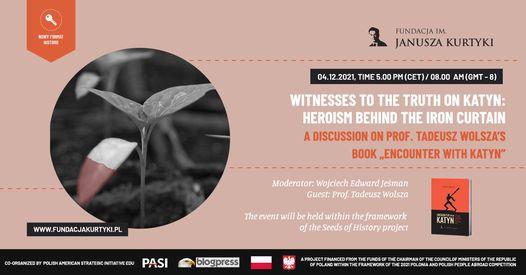
The meeting was held online on Zoom on December 4th, 2021, at 11.00 am (EST)
It was moderated by the President of PASI Edward Wojciech Jesman.
The event was held within the framework of the Kurtyka Foundation’s „The Seeds of history” project.
PROGRAM:
1. Introduction was done by Gene Sokolowski, PhD – PASI EDU President
2. Presentation of the book “Encounter with Katyn” was by Mr. Damian Bębnowski,
Vice President of the Board of the Janusz Kurtyka Foundation
(Promotional trailer: https://www.youtube.com/watch?v=IXVHlGwm3j4)
3. Lecture was by Professor Tadeusz Wolsza
4. A questions and answers session followed.
Polish American Strategic Initiative EDU i Fundacja im. Janusza Kurtyki zorganizowały wspólny projekt i zaprosiły na spotkanie z polskim historykiem Profesorem Tadeuszem Wolszą. Wydarzenie zatytułowano „Świadkowie prawdy o Katyniu. Bohaterstwo za Żelazną Kurtyną”. Spotkanie odbyło się wokół książki Prof. T. Wolszy “Dotyk Katynia”.
Spotkanie odbyło się online na Zoomie 4 grudnia 2021 r. o godz. 11.00 (GMT -5).
Moderatorem spotkania był Prezes PASI Edward Wojciech Jeśman.
Wydarzenie odbyło się w ramach projektu „Ziarna Historii”.
PROGRAM:
1. Spotkanie rozpoczął Dr. Gene Sokolowski – Prezes PASI EDU
2. Pan Damian Bębnowski –
Wiceprezes Zarządu Fundacji im. Janusza Kurtyki wprowadził do książki „Dotyk Katynia” autorstwa Prof. Tadeusza Wolszy przez
(zwiastun książki: https://www.youtube.com/watch?v=IXVHlGwm3j4)
3. Profesor Tadeusz Wolsza wygłosił wykład
4. Po wykładzie nastąpiła sesja pytań i odpowiedzi
can be found here:
https://youtu.be/9m2t95rnrdg
kliknij na poniższy link:
https://youtu.be/wmmfO6Tc490
We need your support.Potrzebujemy twojego wsparcia
CALL TO ACTIONWEZWANIE DO DZIAŁANIA
regarding Tom R. Suozzi’s U.S. House of Representatives resolution H.Res. 664 titled: “Commemorating the Anniversary of the Invasion of Poland and recognizing the importance of the United States alliance with the Republic of Poland.”W sprawie rezolucji Izby Reprezentantów USA H.Res. 664 przedstawionej przez Kongresmena Toma R. Suozziego (D/NY) i zatytułowanej: „Upamiętnienie rocznicy inwazji na Polskę i uznanie wagi sojuszu Stanów Zjednoczonych z Rzecząpospolitą Polską”.
How can you help?
Please call, email, or fax your U.S. Representative and convey the following message to him or her.To Find YOUR U.S. REPRESENTATIVE CLICK HERE
Purpose of the call or subject line if you are communicating through electronic means:
Please co-sponsor Representative Tom R. Suozzi’s resolution H.Res. 664 “Commemorating the Anniversary of the Invasion of Poland and recognizing the importance of the United States alliance with the Republic of Poland.”
Why your U.S. Representative should co-sponsor the resolution?
This month, Polish Americans remember the 20th anniversary of 9/11 and the 72nd anniversary of the aggression against Poland by Germany and the Soviet Union. The attack against Poland ignited World War II. The war caused tens of millions of deaths worldwide, six million resulting from the genocides committed against the Polish citizens, Poles, and Jews.
As your constituent, I request that you co-sponsor Representative Thomas R. Suozzi’s resolution “Commemorating the Anniversary of the Invasion of Poland and recognizing the importance of the United States alliance with the Republic of Poland.”
Remembering and understanding history, including the past mistakes and their consequences, should guide foreign policies for the current unstable world.
The role and position of the United States are questioned and challenged. The United States needs steadfast and proven allies. Poland has always been such an ally.
The adoption of the resolution would show that the United States remains engaged and committed to play its traditional, stabilizing role in European politics.
To support and co-sponsor this resolution or have any questions answered, please email Steven Peterson ([email protected]). Would you please let me know about your decision?
Thank you,
Jak możesz pomóc?
Przekaż poniższą wiadomość swojemu Kongresmenowi lub Kongresmence w formie e-maila, faksu lub telefonicznie.
KLIKNIJ TUTAJ aby znaleźć swojego Kongresmena/Kongresmenkę.
Prośba o ko-sponsorowanie Rezolucji H.Res. 664 przedstawionej przez Kongresmena Toma R. Suozziego: „Upamiętnienie rocznicy inwazji na Polskę i uznanie wagi sojuszu Stanów Zjednoczonych z Rzecząpospolitą Polską”.
Dlaczego Twój Kongresmen/Kongresmenka powinni ko-sponsorować tę uchwałę?
W tym miesiącu Amerykanie Polskiego pochodzenia upamiętniają 20-stą rocznicę ataków: 11 września 2001 r. i 82-gą rocznicę agresji Niemiec i Związku Radzieckiego na Polskę z roku 1939. Atak na Polskę zapoczątkował II Wojnę Światową. Wojna ta spowodowała dziesiątki milionów ofiar na całym świecie, w tym sześć milionów w wyniku ludobójstwa dokonanego na obywatelach polskich, Polakach i Żydach.
Jako wasz wyborca oczekuję by Pani/Pan ko-sponsorował rezolucję Kongresmena Thomasa R. Suozziego „Upamiętnienie rocznicy inwazji na Polskę i uznanie wagi sojuszu Stanów Zjednoczonych z Rzecząpospolitą Polską”.
Pamięć i doświadczenie historyczne, świadomość błędów przeszłości i ich konsekwencji, powinny wpływać na kształt polityki zagranicznej w obecnym niestabilnym świecie.
Rola i pozycja Stanów Zjednoczonych są dziś otwarcie kwestionowane. Stany Zjednoczone potrzebują solidnych i sprawdzonych sojuszników. Polska zawsze była takim sojusznikiem.
Przyjęcie rezolucji dałoby sygnał, że Stany Zjednoczone dalej pozostają poważnie zaangażowane w odgrywanie swojej tradycyjnej, stabilizującej roli w polityce europejskiej.
Aby ko-sponsorować tę rezolucję i uzyskać odpowiedzi na jakiekolwiek pytania, wyślij wiadomość emailem do Stevena Petersona ([email protected]). Czy mógłby Pan/Pani poinformować mnie o swojej decyzji?
Dziękuję
RESOLUTION (see below)REZOLUCJA (patrz poniżej)
Commemorating the anniversary of the Invasion of Poland and recognizing the importance of the United States alliance with the Republic of Poland„Upamiętnienie rocznicy inwazji na Polskę i uznanie wagi sojuszu Stanów Zjednoczonych z Rzecząpospolitą Polską”
Whereas on September 1, 1939, German forces led by Adolf Hitler attacked the Republic of Poland;
Whereas on September 17, 1939, Soviet forces led by Joseph Stalin attacked the Republic of Poland;
Whereas subsequent to the completion of the invasion, the Republic of Poland was divided under the terms of the Secret Protocol of the Molotov–Ribbentrop Pact, which was signed on August 23, 1939;
Whereas Adolf Hitler issued the command to invade with orders “to send to death mercilessly and without compassion, men, women, and children of Polish derivation and language”;
Whereas in Poland, a traditionally tolerant country that was home to Europe’s largest Jewish population, German occupying forces established death camps where millions were murdered;
Whereas Poland lost a higher percentage of its population than any other nation in World War II due to the genocide perpetrated by occupying forces;
Whereas an estimated 6 million Poles were killed, roughly half of whom were Jewish;
Whereas relations between the United States and Poland date back several centuries;
Whereas Polish settlers first arrived in Jamestown in 1608;
Whereas the current relationship between the United States and the Republic of Poland is deep and mutually beneficial to both countries;
Whereas since the collapse of communism in Europe, the Republic of Poland’s prosperity and integration into Western institutions has provided a model for other countries in the region;
Whereas the addition of the Republic of Poland to NATO in 1999 has strengthened the alliance and provided a crucial bulwark against aggression by Russia;
Whereas the Department of State describes the Republic of Poland as “a stalwart ally in Central Europe and one of the United States’ strongest partners in fostering security and prosperity regionally, throughout Europe, and the world’;
Now, therefore, be it
Resolved, That the House of Representatives—
(1) honors the millions of Poles who lost their lives during the invasion and occupation of Poland;
(2) encourages increased education about the atrocities committed by occupying forces against the Poles;
(3) recognizes the critical role that the Republic of Poland plays in maintaining stability and security in Europe;
(4) calls for the strengthening and broadening of diplomatic, economic, and security ties between the United States and the Republic of Poland.
Dnia 1 września 1939 roku wojska niemieckie pod wodzą Adolfa Hitlera zaatakowały Rzeczpospolitą Polską.
Dnia 17 września 1939 roku wojska sowieckie pod wodzą Józefa Stalina zaatakowały Rzeczypospolitą Polską.
Po zakończeniu obu inwazji Rzeczpospolita Polska została podzielona przez Niemcy Hitlerowskie i Związek Sowiecki na podstawie tajnego protokołu będącego częścią paktu Ribbentrop–Mołotow, podpisanego 23 sierpnia 1939 r.
Adolf Hitler wydał rozkaz inwazji z instrukcją, aby „bezlitośnie i bez skrupułów mordować Polaków: mężczyzn, kobiety i dzieci”.
W Polsce, kraju szczycącym się od wieków tradycją tolerancji, który był domem największej społeczności żydowskiej w Europie, niemieccy okupanci utworzyli obozy śmierci, w których mordowano miliony osadzonych tam więźniów.
Około 6 milionów obywateli polskich zostało zabitych, połowa z nich była Żydami.
Dnia 1 września 1939 roku wojska niemieckie pod wodzą Adolfa Hitlera zaatakowały Rzeczpospolitą Polską.
Stosunki między Stanami Zjednoczonymi a Polską sięgają kilku wieków.
Polscy osadnicy po raz pierwszy przybyli do Jamestown w 1608 r.
Obecnie stosunki między Stanami Zjednoczonymi a Rzeczpospolitą Polską są bliskie i wzajemnie korzystne dla obu krajów.
Od upadku komunizmu w Europie osiągnięcia Rzeczypospolitej Polskiej i jej integracja z instytucjami zachodnimi stały się wzorem dla innych krajów regionu.
Wstąpienie Rzeczpospolitej Polskiej do NATO w 1999 r. wzmocniło sojusz i stworzyło istotną zaporę przed agresją Rosji.
Departament Stanu opisuje Rzeczpospolitą Polską jako „lojalnego sojusznika w Europie Środkowej i jednego z najważniejszych partnerów Stanów Zjednoczonych w tworzeniu bezpieczeństwa i dobrobytu w Europie i na świecie”.
Niech więc tak będzie:
Postanowiono, że Izba Reprezentantów:
(1) uhonoruje miliony Polaków, którzy stracili życie podczas inwazji i okupacji Polski,
(2) zachęci do poprawy stanu wiedzy na temat okrucieństw popełnianych przez okupantów na Polakach,
(3) uzna kluczową rolę, jaką Rzeczpospolita Polska odgrywa w utrzymaniu stabilności i bezpieczeństwa w Europie,
(4) wezwie do wzmocnienia i rozszerzenia więzi dyplomatycznych, gospodarczych i militarnych między Stanami Zjednoczonymi a Rzeczpospolitą Polską.
PASI ACTIONPASI W DZIAŁANIU
Town Hall Meeting took place on August 22, 2021. Below You can see the Video Presentation shown during the meeting.22 sierpnia 2021 r. odbyło się spotkanie online na temat problemu łączenia emerytur z Polski i USA. Poniżej można zobaczyć wideo prezentację wyświetloną podczas spotkania.
Please sign The Declaration of Support: Proszę podpisać Deklarację Poparcia https://joinpasi.org/index.php/appeal
PASI works on your behalf to:PASI działa w Twoim imieniu, w celu:
Promote the common good and welfare of Polish AmericansPromowania wspólnego dobra i dobrobytu Polonii amerykańskiej
Lobby politicians
and candidates for officeLobbowania polityków
i kandydatów na urzędy państwowe
Serve as an educational resource on the present status and history of Polish AmericansEdukowania na temat obecnego statusu i historii Amerykanów polskiego pochodzenia
MILLION PEOPLEMILIONÓW LUDZI
ORGANIZATIONSORGANIZACJE
PROJECTEDPRZEWIDYWANIE
Vision and MissionWizja i Misja
Edward W. JesmanEdward W. Jeśman
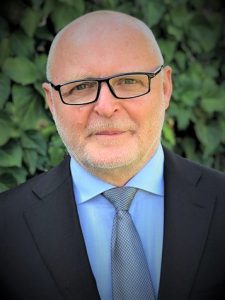
President’s MessagePrzesłanie Prezesa
We are here to promote and advance the political and economic interests of Polish Americans.
Jesteśmy tu po to, by promować i wspierać polityczne i gospodarcze interesy Amerykanów polskiego pochodzenia.
We pay close attention to the bills, resolutions, and policies originating on Capitol Hill and strive to be a valued and assertive voice in Washington, D.C.
Zwracamy szczególną uwagę na ustawy, rezolucje i politykę pochodzącą z Kapitolu i staramy się być cenionym i asertywnym głosem w Waszyngtonie.
We provide needed guidance and unifying leadership while advancing ideas of peace and prosperity. We hope to inspire a new generation of Polish American leaders.
Zapewniamy potrzebne wskazówki i jednoczące przywództwo, jednocześnie propagując idee pokoju i dobrobytu. Mamy nadzieję zainspirować nowe pokolenie przywódców o polsko amerykańskich korzeniach.
Join us! Together we can improve the political and economic standing of all Polish Americans and build a better America and a better Poland. The future is in our hands!
Dołącz do nas! Razem możemy poprawić sytuację polityczną i gospodarczą wszystkich Amerykanów polskiego pochodzenia i zbudować lepszą Amerykę i Polskę. Przyszłość jest w naszych rękach!
Edward W Jesman, President PASI
Polish American Strategic Initiative, Inc.
844-650-PASI844-650-PASI (Toll-free)
310-291-2681310-291-2681 (Cell)
[email protected]
Edward W Jeśman, Prezes PASI
Polsko-Amerykańska Inicjatywa Strategiczna, Inc.
844-650-PASI844-650-PASI (bezpłatny)
310-291-2681310-291-2681 (komórka)
[email protected]
Combating Holocaust ignorance – with facts. Zwalczanie ignorancji o Holokauście – faktami.
The letter below, written by G. Sokolowski, Ph.D., is in response to the article that appeared in the Los Angeles Times, June 24, 2021, entitled “In Germany, Blinken joins initiative to combat Holocaust denial and ignorance.” The Los Angeles Times article is a commentary on the statements made by Mr. Antony Blinken, the US Secretary of State, at the Berlin Memorial to the Murdered Jews of Europe.
The article suggests the need to recognize the wrongs suffered by European Jews, with a particular need to acknowledge the facts surrounding the role of such countries as Austria and Poland in the plight of European Jews during the Second World War. It states: “Scholars say Germany has led the way in accepting responsibility for the Holocaust while other countries, such as Austria and Poland, remain more evasive about their roles in the Nazi-ordered genocide.”
Indeed, there seems to be an urgent need to recognize the role of Poland and Austria in the history of the II World War. In the case of Poland, shut off from the rest of the world behind the Iron Curtain for over forty years and unable to present its history uncensored by its post-war Soviet oppressors, this need is especially acute. Dr. Sokolowski’s article fills this gap in historical knowledge. Given the sentiments expressed in the Los Angeles Times, it seems to be long overdue.
Poniższy list, napisany przez dr G. Sokołowskiego, jest odpowiedzią na artykuł, który ukazał się w Los Angeles Times 24 czerwca 2021 r., pod tytułem „W Niemczech Blinken przyłącza się do inicjatywy na rzecz zwalczania negowania Holokaustu i ignorancji”. Artykuł w Los Angeles Times jest komentarzem do oświadczeń wygłoszonych przy Berlińskim Pomniku Pomordowanych Żydów Europy przez Anthony’ego Blinkena, Sekretarza Stanu USA.
Artykuł sugeruje potrzebę rozpoznawania krzywd poniesionych przez europejskich Żydów, ze szczególnym uwzględnieniem faktów dotyczących roli takich krajów jak Austria i Polska w losach europejskich Żydów podczas II wojny światowej. Według artykułu: „Uczeni twierdzą, że Niemcy wiodą prym w akceptowaniu odpowiedzialności za Holokaust, podczas gdy inne kraje, takie jak Austria i Polska, są bardziej wymijające w kwestii swojej roli w nazistowskim ludobójstwie”.
Faktycznie, istnieje pilna potrzeba rozpoznawania roli Polski i Austrii w historii II wojny światowej. W przypadku Polski, która od ponad czterdziestu lat była odcięta od reszty świata przez żelazną kurtynę i przez to niezdolna do prezentowania swojej historii bez cenzury swoich powojennych sowieckich ciemiężycieli, potrzeba ta jest szczególnie dotkliwa. Artykuł dr Sokołowskiego wypełnia lukę w wiedzy historycznej. Biorąc pod uwagę opinie wyrażone w Los Angeles Times, wydaje się, że artykuł dr Sokołowskiego był potrzebny już dawno temu.
Dear Ms. Wilkinson,
I am writing in response to your June 24 article in the Los Angeles Times titled “In Germany, Blinken joins initiative to combat Holocaust denial and ignorance”. I realize your knowledge of what occurred in Poland during World War II is limited, as is the case with most Americans, and I’d like to assist by providing relevant facts.
The last sentence of your fourth paragraph states: “Scholars say Germany has led the way in accepting responsibility for the Holocaust while other countries, such as Austria and Poland, remain more evasive about their roles in the Nazi-ordered genocide.” Outlined below is why this sentence, which asserts that Poland is one of the countries responsible for the Holocaust, is both false and offensive.
First, consider the definition of “the Holocaust”. The US Holocaust Memorial Museum defines it as “the systematic, state-sponsored persecution and murder of six million Jews by the Nazi regime and its allies and collaborators.” This means that the Polish state, as it existed during World War II under German and Soviet occupation, was either an ally of Germany or established a collaborationist government controlled by Germany. This was never the case. The Polish state during the war consisted of the Polish government-in-exile in London and the Polish Underground State. The Polish Underground State, together with its military arm, the Home Army (Armia Krajowa), fought the occupying Germans at every turn. No historian has asserted that this Polish state, systematically and at the direction of the occupying Germans, sponsored and engaged in the persecution and murder of Poland’s Jews.
It is also important to understand which German-allied and German-occupied states persecuted, (i.e., rounded up and interned their Jews in ghettos and transit camps for transport to labor, concentration, and extermination camps), and in some cases, murdered their Jews. The Polish state never established a collaborationist government (as did France’s Petain, Norway’s Quisling, Slovakia’s Tiso, Croatia’s Pavelic, Hungary’s Horthy, and Romania’s Antonescu); never established a militia to round up and deport Jews to the camps or kill them outright (as did Belgium’s Degrelle, Holland’s Mussert, France’s Petain, Norway’s Quisling, Slovakia’s Hlinka Guard, Croatia’s Ustase, Hungary’s Arrow Cross, and Romania’s Iron Guard); and never established SS units to fight under German command (as did Denmark, Norway, Belgium, Latvia, Hungary, Estonia, Italy, France, Holland, Albania, Ukraine, Bulgaria, Croatia, and others), which prolonged the war and Hitler’s campaign of racist mass murder. In contrast to the actions of these German-allied and German-occupied states, neither Poles nor the Polish state were elements of Hitler’s mass-murder apparatus and the proposition that Poland “needs to accept responsibility for the Holocaust” is clearly absurd. Because Poles were also rounded up by the Germans and died in Hitler’s concentration and extermination camps, this proposition is equally offensive. Note that in February 2018, Chancellor Merkel publicly admitted on several occasions that the full responsibility for the Holocaust lies with Germany.
It is further important to understand why World War II in Europe occurred. Hitler and Stalin initiated the war to divide Europe between them and the secret protocol in their 1939 nonaggression pact prescribed the destruction of the Polish people and annihilation of the Polish state. In the first two years of the war, Poles were the primary target of a coordinated German and Soviet extermination process designed to annihilate them on both sides of the Ribbentrop-Molotov line. Hitler’s racial doctrine dictated that Poles and other Slavs were racially inferior Untermenschen deserving of enslavement and extermination. During the war’s first two years, virtually all of Poland’s Jews were imprisoned in German-operated ghettos. The Germans immediately established Jewish Councils (Judenräte), who ceased all contact with Polish authorities and negotiated the conditions of Jewish governance of the ghettos. Within months following Germany’s attack, nearly half of Poland’s Jews lived under Judenrat regimes. The Judenräte gathered up Jews from small towns and concentrated them in the ghettos of the larger cities. They further kept ghetto Jews convinced they were being deported to work in German-designated areas in the East. Beginning in early 1942, they directed the Jewish Ghetto Police to forcibly round up ghetto Jews and load them onto the trains destined for the death camps.
While nearly all of Poland’s Jews were imprisoned in the ghettos, Poles were in a day-to-day struggle for survival because of the brutalities and severe conditions exacted by the occupiers. The Germans imposed near-starvation rations, enforced onerous quotas on farmers, confiscated crops and livestock, conducted daily executions to terrorize the populace, randomly arrested and tortured Poles to extract intelligence on the Polish underground, and conducted recurrent round-ups for deportation to concentration and labor camps. Over two million Poles were sent to the camps while up to 200,000 Polish children were abducted for Germanization under Himmler’s Lebensborn program.
As evidenced by his Generalplan Ost and Lebensraum program, Hitler did not attack Poland to eradicate Polish Jews. His objective was to annihilate the Poles, take over their land, and settle it with Germans. He began by immediately arresting and murdering up to 100,000 Polish elite, expelling approximately 1.5 million Poles from occupied Polish territory, and resettling ethnic Germans into vacated Polish properties. Stalin’s policy was to annihilate Poland’s elites, destroy Polish societal structure, and Sovietize dispossessed Poles into compliant subjects of Stalin’s totalitarian Communist regime. As the Red Army occupied eastern Poland, up to 1.6 million Poles were deported to the Gulag camps, which resulted in an estimated death rate of 60 percent. Stalin’s barbarity was further evidenced by his Katyn Massacre, a series of executions encompassing 22,000 captured Polish officers. Poland’s population losses during World War II were proportionately the greatest of any nation in the war. Of its prewar 35 million people, Poland lost approximately 6.5 million. An estimated 664,000 were battlefield deaths and the remainder, about 3 million Polish Jews and 2.8 million Poles, were civilians of all ages. Note also that Hitler annexed western Poland to Germany while Stalin annexed eastern Poland to the Soviet Union, which is why Poland ceased to exist as a nation state.
Often overlooked are Polish efforts to rescue fugitive Jews who hid by not moving into or escaping from the ghettos. Only in Poland did the Germans have a standing order that anyone aiding a Jew in any way would be executed together with immediate family. Despite this death penalty, the largest number by far of any country honored as Righteous Among the Nations by Israel (over 7,000) are Poles, many of whom were killed for aiding Jews. While these are known to Israel’s Yad Vashem, thousands more are known only to God. Estimates of Poles who aided Jews range from 300,000 to 1 million and estimates of those killed for doing so approach 50,000. Note also that German death squads carried out mass executions of entire villages that aided Jews and some of the annihilated villages became extinct. Note further that in no other occupied country or in Germany itself were there such large-scale round-ups, searches with dogs, and blockades of whole districts in all of the larger cities that were conducted by the Germans to find fugitive Jews. Ask yourself, Ms. Wilkinson, if you would risk your life and the lives of your family to save one or more persons in similar circumstances. Many Poles did so because they believed it was the Christian thing to do. Also, two Polish institutions were critically instrumental in rescuing Jews. The first, Żegota, was the only government organization in the German-occupied countries established to rescue Jews. Estimates of Jews saved by Żegota range from 30,000 to 60, 000. The second was the Catholic Church, which rescued Jewish children on a massive scale by hiding them in convents, orphanages, and rectories. No German-occupied country had such an organizational infrastructure that aided tens of thousands of Jews.
Also overlooked are the significant Polish efforts that warned the West about the mass murder of Jews in occupied Poland. Witold Pilecki voluntarily walked into a German round-up for Auschwitz prisoners and then sent reports to the Polish Underground headquarters in Warsaw. These comprised the first record that convinced the Allies the Germans were engaged in murder on an unprecedented scale. Jan Karski was a secret courier who travelled between the Polish government-in-exile in London and the Polish Underground in occupied Poland. He was twice smuggled into the Warsaw Ghetto by Jewish underground leaders to observe the horrifying conditions and also entered the Izbica Lubelska transit camp, where Jews were confined in appalling conditions awaiting transport to the Bełżec and Sobibór death camps. Karski carried out of Poland a microfilm with this information and it became one of the earliest and most accurate accounts of the beginning of the Holocaust. He was also the first eyewitness to personally meet with FDR and British Foreign Secretary Anthony Eden and gave a detailed statement on what he had seen, which sadly fell on deaf ears. On December 10, 1942, the Polish government-in-exile published a document titled The Mass Extermination of Jews in German Occupied Poland, which was addressed to the Governments of the United Nations and was the first international publication of Hitler’s mass murders.
In the case of Austria, I offer the following facts. There had been strong support from Austrians and Germans to unify the two countries. On 12 March 1938, the German Wehrmacht crossed the border into Austria, unopposed by the Austrian military. The Germans were greeted with great enthusiasm and a plebiscite was held on 10 April, which officially ratified Austria’s annexation by Germany, called the “Anschluss”. With the Anschluss, Austria ceased to exist as an independent state. Austrians loyally supported Germany during the early years of the war. The initial German military victories and Austria’s geographic location beyond the reach of Allied bombers shielded the Austrian population from the full impact of the war. Only after the German defeat at the Battle of Stalingrad in early 1943, when the course of the war increasingly turned against Germany, did popular support for the war and for the Anschluss begin to erode. Some 800,000 Austrians were drafted into the German army (Wehrmacht) and another 150,000 served in the Waffen SS, an elite military unit that managed the concentration and extermination camps. Because the Austrians were integrated into German units, no Austrian military units were formed. The majority of the bureaucrats who implemented the Final Solution were Austrian. David Art of Tufts University states that 40 per cent of the staff and 75 per cent of commanders at death camps were Austrian. Austrians who played key roles in the Final Solution include Adolf Eichmann and his aide, Alois Brunner; SS General Ernst Kaltenbrunner, Chief of the Reich Security Main Office (RSHA); Arthur Seyss-Inquart, Reich Commissioner for Holland; and Odilo Globocnik, who had a leading role in Operation Reinhard. Operation Reinhard organized the murder of around one and a half million mostly Polish Jews at the Treblinka, Sobibór, and Bełżec extermination camps. Globocnik was also responsible for the deaths at the Majdanek extermination camp. Austrians also conducted mass murder in Hartheim Castle near Linz, where the killing program Action T4, i.e., involuntary euthanasia, took place, and in Am Spiegelgrund clinic in Vienna, where more than 700 handicapped children were murdered.
From the above, it should be evident why the sentence in question is not only false but also offensive to Poles and Polish Americans. I would ask that, if in the future you write about Poland, kindly conduct the necessary research as this should negate the likelihood of misstating the facts.
Cordially,Gene Sokolowski, PhD
Polish Media Issues Group
Szanowna Pani Wilkinson
Piszę w odpowiedzi na Pani artykuł z 24 czerwca w Los Angeles Times zatytułowany „W Niemczech Blinken przyłącza się do inicjatywy na rzecz zwalczania negowania Holokaustu i ignorancji”. Wydaje się, że wiedza Pani o tym co wydarzyło się w Polsce podczas II wojny światowej, tak jak wiedza większości Amerykanów na ten temat, jest ograniczona, i dlatego chciałbym pomóc, przedstawiając istotne fakty.
Ostatnie zdanie czwartego akapitu Pani artykułu stwierdza: „Uczeni twierdzą, że Niemcy wiodą prym w akceptacji odpowiedzialności za Holokaust, podczas gdy inne kraje, takie jak Austria i Polska, pozostają bardziej wymijające w kwestii swojej roli w nazistowskim ludobójstwie”. Poniżej naszkicuję, dlaczego to zdanie, stwierdzające, że Polska jest jednym z krajów odpowiedzialnych za Holokaust, jest nie tylko fałszywe, ale także obraźliwe.
Rozpocznijmy od rozważenia definicji słowa „Holokaust”. Amerykańskie Muzeum Pamięci Holokaustu definiuje je jako „systematyczne, sponsorowane przez państwo prześladowanie i mordowanie sześciu milionów Żydów przez reżim nazistowski oraz jego sojuszników i kolaborantów”. Oznacza to, że państwo polskie, jakie istniało w czasie II wojny światowej pod okupacją niemiecką i sowiecką, było albo sojusznikiem Niemiec, albo utworzyło rząd kolaboracyjny kontrolowany przez Niemcy. Tak nigdy nie było. Państwo polskie w czasie wojny składało się z polskiego rządu emigracyjnego w Londynie i Polskiego Państwa Podziemnego. Polskie Państwo Podziemne poprzez swoje ramię wojskowe, Armię Krajową, walczyło wszędzie z okupantem niemieckim. Żaden historyk nigdy nie twierdził, że polskie państwo systematycznie i pod kierunkiem okupujących Niemców sponsorowało i angażowało się w prześladowanie i mordowanie polskich Żydów.
Ważne jest również zrozumienie, które państwa sprzymierzone z i okupowane przez Niemców prześladowały (tj. łapały i internowały swoich Żydów w gettach i obozach przejściowych w celu transportu do obozów pracy, koncentracyjnych i obozów zagłady), a w niektórych przypadkach mordowały swoich Żydów. Państwo polskie nigdy nie utworzyło kolaboracyjnego rządu (w odróżnieniu od francuskiego Petaina, norweskiego Quislinga, słowackiego Tiso, chorwackiego Pavelica, węgierskiego Horthy’iego i rumuńskiego Antonescu); nigdy nie utworzyło policji w celu łapania i deportowania Żydów do obozów lub zabijania ich wprost (tak jak Degrelle w Belgii, Mussert w Holandii, Petain we Francji, Quisling w Norwegii, Gwardia Hlinka na Słowacji, Ustase w Chorwacji, Krzyż Strzał na Węgrzech, czy i Żelazna Gwardia w Rumunii); i nigdy nie utworzyło jednostek SS do walki pod dowództwem niemieckim (tak jak Dania, Norwegia, Belgia, Łotwa, Węgry, Estonia, Włochy, Francja, Holandia, Albania, Ukraina, Bułgaria, Chorwacja i inne), co przedłużyło nie tylko wojnę ale także hitlerowską kampanię rasistowskiego, masowego mordu. W odróżnieniu od wyżej wymienionych działań państw sprzymierzonych z Niemcami lub okupowanych przez Niemcy, ani Polacy, ani państwo polskie nigdy nie było częścią hitlerowskiego aparatu masowego mordu i dlatego teza, że Polska „musi wziąć odpowiedzialność za Holokaust” jest oczywistym absurdem. Ponieważ Polacy byli również łapani przez Niemców i ginęli w hitlerowskich koncentracyjnych obozach zagłady, teza ta jest również obraźliwa. Należy zauważyć, że w lutym 2018 r. Kanclerz Niemiec Merkel kilkakrotnie publicznie przyznała, że pełna odpowiedzialność za Holokaust spoczywa na Niemczech.
Ponadto ważne jest, aby zrozumieć, dlaczego w Europie wybuchła II wojna światowa. Hitler i Stalin rozpoczęli wojnę, by podzielić między sobą Europę, a tajny protokół w ich pakcie o nieagresji, Ribbentrop-Mołotow, z 1939 r. nakazywał zniszczenie narodu polskiego i unicestwienie państwa polskiego. W pierwszych dwóch latach wojny Polacy byli głównym celem skoordynowanego niemiecko-sowieckiego procesu eksterminacji, mającego na celu unicestwienie ich po obu stronach linii Ribbentrop-Mołotow. Doktryna rasowa Hitlera dyktowała, że Polacy i inni Słowianie są rasowo gorszymi Untermenschen, i zasługują na zniewolenie i eksterminację. W pierwszych dwóch latach wojny praktycznie wszyscy polscy Żydzi byli więzieni w gettach zarządzanych przez Niemców. Niemcy natychmiast utworzyli Rady Żydowskie (Judenräte), które zerwały wszelkie kontakty z władzami polskimi i negocjowały warunki żydowskiego zarządzania gettami. W ciągu kilku miesięcy od ataku Niemiec prawie połowa polskich Żydów żyła pod rządami Judenratu. Rady Żydowskie zbierały Żydów z małych miasteczek i koncentrowały ich w gettach większych miast. Ponadto Rady Żydowskie utrzymywały Żydów w gettach w przekonaniu, że będą deportowani do pracy na wyznaczonych przez Niemców terenach na wschodzie. Od początku 1942 r., Rady Żydowskie nakazywały Żydowskim Policjom Gett przymusowe łapanie Żydów i ładowanie ich do pociągów jadących do obozów zagłady.
Kiedy prawie wszyscy polscy Żydzi byli więzieni w gettach, Polacy toczyli codzienną walkę o przetrwanie w sytuacji brutalności i surowych warunków stworzonych przez okupanta. Niemcy ustanowili głodowe racje żywnościowe, narzucili rolnikom uciążliwe dostawy, konfiskowali plony i zwierzęta gospodarskie, dokonywali codziennych egzekucji w celu terroryzowania ludności, losowo aresztowali i torturowali Polaków w celu wydobycia informacji o polskim podziemiu, przeprowadzali powtarzające się łapanki na deportacje do obozów koncentracyjnych i pracy. Do obozów wywieziono ponad dwa miliony Polaków, a w ramach programu Himmlera Lebensborn uprowadzono nawet 200 000 polskich dzieci w celu germanizacji.
Jak dowodzą programy Generalplan Ost i Lebensraum, Hitler nie zaatakował Polski w celu usunięcia polskich Żydów. Jego celem było unicestwienie Polaków, przejęcie ich ziemi i zasiedlenie jej Niemcami. Zaczął od natychmiastowego aresztowania i zamordowania do 100 tysięcy polskich elit, wypędzenia około 1,5 miliona Polaków z okupowanych ziem polskich i przesiedlenia etnicznych Niemców na zwolnione polskie posiadłości. Polityka Stalina polegała na unicestwieniu polskich elit, zniszczeniu polskiej struktury społecznej i sowietyzacji wywłaszczonych Polaków tak aby uczynić z nich uległych poddanych totalitarnego reżimu komunistycznego. Gdy Armia Czerwona zajęła wschodnią Polskę, do gułagów deportowano około 1,6 miliona Polaków, co poskutkowało śmiertelnością ocenianą na poziomie 60 procent. Barbarzyństwo Stalina zostało dodatkowo potwierdzone przez zbrodnię katyńską, czyli serię egzekucji obejmujących 22 000 wziętych do niewoli polskich oficerów. Straty ludnościowe Polski podczas II wojny światowej były proporcjonalnie największe ze wszystkich narodów biorących udział w wojnie. Z przedwojennej populacji 35 milionów, Polska straciła około 6,5 miliona. Z tej liczby, szacuje się, że 664 000 zginęło na polu bitwy, a pozostała część zabitych, około 3 miliony polskich Żydów i 2,8 miliona Polaków, była cywilami w każdym wieku. Proszę również zauważyć, że Hitler zaanektował zachodnią Polskę do Niemiec, podczas gdy Stalin zaanektował wschodnią Polskę do Związku Sowieckiego, co spowodowało, że Polska przestała istnieć jako państwo.
Często pomijane są polskie wysiłki na rzecz ratowania zbiegłych Żydów, którzy ukrywali się, nie przeprowadziwszy się do gett lub uciekając z nich. Tylko w Polsce Niemcy mieli stały rozkaz, że każdy, kto w jakikolwiek sposób pomoże Żydowi, zostanie rozstrzelany wraz z najbliższą rodziną. Pomimo tej kary śmierci, zdecydowanie największą grupą narodową spośród wszystkich krajów uhonorowanych przez Izrael tytułem Sprawiedliwych wśród Narodów Świata (ponad 7000) stanowią Polacy, z których wielu zginęło za pomoc Żydom. Chociaż ci bohaterowie znani są izraelskiemu Yad Vashem, tysiące innych znanych jest tylko Bogu. Szacunki liczby Polaków, którzy pomagali Żydom, wahają się od 300 000 do 1 miliona, a liczba zabitych za to około 50 000. Należy również zauważyć, że niemieckie szwadrony śmierci dokonywały masowych egzekucji całych wsi, które pomagały Żydom, a niektóre z unicestwionych wsi wymarły. Proszę zauważyć dalej, że w żadnym innym okupowanym kraju ani w samych Niemczech nie było tyle łapanek na tak dużą skalę, rewizji z psami i blokad całych dzielnic we wszystkich większych miastach, które Niemcy przeprowadzali w celu znalezienia zbiegłych Żydów. Proszę zapytać siebie, Pani Wilkinson, czy zaryzykowałaby Pani swoje życie i życie swojej rodziny, aby uratować jedną lub większą ilość osób w podobnych okolicznościach? Wielu Polaków robiło to, ponieważ wierzyło, że tak powinien postępować Chrześcijanin. Dwie polskie instytucje odegrały krytyczną rolę w ratowaniu Żydów. Pierwsza, Żegota, była jedyną organizacją rządową w krajach okupowanych przez Niemców powołaną do ratowania Żydów. Szacunki ocalonych przez Żegotę Żydów wahają się od 30 000 do 60 000. Drugą instytucją był Kościół Katolicki, który masowo ratował żydowskie dzieci, ukrywając je w klasztorach, sierocińcach i plebaniach. Żaden kraj okupowany przez Niemców nie miał takiej infrastruktury organizacyjnej, która pomogłaby dziesiątkom tysięcy Żydów.
Pomija się także znaczące wysiłki Polaków mające na celu ostrzeżenie Zachodu o masowych mordach Żydów w okupowanej Polsce. Witold Pilecki dobrowolnie dał się złapać niemieckiej łapance na więźniów do Auschwitz, i następnie przesyłał meldunki do siedziby Polskiego Podziemia w Warszawie. Były to pierwsze zapisy, które przekonały aliantów, że Niemcy byli zaangażowani w mordy na bezprecedensową skalę. Jan Karski był tajnym kurierem, który kursował między polskim rządem na uchodźstwie w Londynie a polskim podziemiem w okupowanej Polsce. Dwukrotnie został przemycony do warszawskiego getta przez żydowskich przywódców podziemia, aby obserwować przerażające warunki, a także dostał się do obozu przejściowego w Izbicy Lubelskiej, gdzie przetrzymywano Żydów w strasznych warunkach w oczekiwaniu na transport do obozów zagłady w Bełżcu i Sobiborze. Karski wywiózł z Polski mikrofilm z informacją, która stała się jedną z najwcześniejszych i najdokładniejszych relacji o początkach Holokaustu. Był także pierwszym naocznym świadkiem, który osobiście spotkał się z FDR i brytyjskim ministrem spraw zagranicznych Anthonym Edenem i złożył szczegółowe oświadczenie na temat tego, co zobaczył, co niestety nie zostało należycie przyjęte. 10 grudnia 1942 r. rząd RP na uchodźstwie opublikował dokument pt. „Masowa eksterminacja Żydów w okupowanej przez Niemców Polsce”, skierowany do rządów ONZ i był pierwszą międzynarodową publikacją o masowych mordach Hitlera.
W przypadku Austrii podaję następujące fakty. Istniało silne poparcie Austriaków i Niemców dla zjednoczenia obu krajów. 12 marca 1938 r. niemiecki Wehrmacht przekroczył granicę z Austrią, bez sprzeciwu austriackiego wojska. Niemców powitano z wielkim entuzjazmem i 10 kwietnia odbył się plebiscyt, który oficjalnie ratyfikował aneksję Austrii przez Niemcy, zwaną „Anschluss”. Wraz z Anschlussem Austria przestała istnieć jako niezależne państwo. Austriacy lojalnie wspierali Niemcy w pierwszych latach wojny. Początkowe niemieckie zwycięstwa militarne i położenie geograficzne Austrii poza zasięgiem alianckich bombowców uchroniły ludność austriacką przed pełnymi skutkami wojny. Dopiero po klęsce Niemiec w bitwie pod Stalingradem na początku 1943 r., kiedy tok wojny coraz bardziej zwracał się przeciwko Niemcom, powszechne poparcie dla wojny i Anschlussu zaczęło słabnąć. Około 800 000 Austriaków zostało wcielonych do armii niemieckiej (Wehrmachtu), a kolejne 150 000 służyło w Waffen SS, elitarnej jednostce wojskowej, która zarządzała obozami koncentracyjnymi i obozami zagłady. Ponieważ Austriacy bylii zintegrowaną częścią jednostek niemieckich, nie tworzono austriackich jednostek wojskowych. Większość biurokratów, która wdrażała Rozwiązanie Ostateczne sprawy żydowskiej, była Austriakami. David Art z Tufts University twierdzi, że 40 procent personelu i 75 procent dowódców w obozach śmierci stanowili Austriacy. Austriacy, którzy odegrali kluczową rolę w Ostatecznym Rozwiązaniu, to Adolf Eichmann i jego doradca Alois Brunner; Generał SS Ernst Kaltenbrunner, szef Głównego Urzędu Bezpieczeństwa Rzeszy (RSHA); Arthur Seyss-Inquart, Komisarz Rzeszy na Holandię; i Odilo Globocnik, który odegrał wiodącą rolę w operacji Reinhard. Operacja Reinhard zorganizowała mord około półtora miliona, głównie polskich Żydów, w obozach zagłady w Treblince, Sobiborze i Bełżcu. Globocnik również odpowiada za zabijanie w obozie zagłady na Majdanku. Austriacy dokonali też masowych mordów w zamku Hartheim pod Linz, gdzie miał miejsce program zabijania Akcja T4, czyli przymusowa eutanazja oraz w klinice Am Spiegelgrund w Wiedniu, gdzie zamordowano ponad 700 niepełnosprawnych dzieci.
Z powyższego powinno być jasne, dlaczego wyżej wymienione zdanie w Pani artykule jest nie tylko fałszywe, ale także obraźliwe dla Polaków i Amerykanów polskiego pochodzenia. Jeżeli w przyszłości będzie Pani pisała o Polsce, prosiłbym uprzejmie o przeprowadzenie niezbędnych badań, tak aby w ten sposób nie dopuścić do możliwości przeinaczenia faktów.
Z poważaniem,Gene Sokołowski, PhD
Polska Grupa ds. Mediów
Current ConcernsAktualne Sprawy
offensive Act based on a double standard.Prawnie wadliwa i moralnie
obraźliwa Ustawa oparta na podwójnych standardach.
the WW2 exclusively to the
extermination of JewsUstawa zawęża nauczanie historii
II Wojny Światowej wyłącznie do
historii zagłady Żydów
and politically careless
Resolution with legal consequences.
and legal consequences Historycznie błędne
i politycznie nieostrożne
Rozstrzygnięcie z konsekwencjami prawnymi.
i konsekwencjami prawnymi
offensive Act based on a double standard.Prawnie wadliwa i moralnie
obraźliwa Ustawa oparta na podwójnych standardach.
ACT S.447 (JUST ACT OF 2017),USTAWA S.447 (USTAWA JUST 2017),
“Justice for Uncompensated Survivors Today (JUST) Act of 2017”“Ustawa 447 o sprawiedliwości dla osób ocalałych z Holokaustu, które nie otrzymały zadośćuczynienia (JUST) z 2017 r.” Introduced by Sen. Tammy Baldwin of WI on February 27, 2017 Wprowadzona przez senatorkę Tammy Baldwin z WI 27 lutego 2017 rSigned into law by President Donald Trump on May 9, 2018Podpisana przez prezydenta Donalda Trumpa 9 maja 2018 r.
The law requires the US Department of State to assess the national laws and policies of countries participating in the 2009 Terezin Holocaust Era Assets Conference, concerning the identification and return of, or restitution of assets allegedly wrongfully seized from Jews during World War II, including the so-called “HEIRLESS PROPERTY”. PASI considers Act S.447 to be legally flawed, discriminatory, unjust, and its language deceiving.Prawo wymaga od Departamentu Stanu USA oceny praw krajowych i polityki krajów uczestniczących w konferencji Terezin Holocaust Era Assets Conference 2009, dotyczących identyfikacji i zwrotu lub restytucji mienia rzekomo niesłusznie zajętego Żydom podczas II wojny ąwiatowej, w tym tak zwaną „WŁASNOŚĆ BEZDZIEDZICZNA”. PASI uważa ustawę S.447 za wadliwą pod względem prawnym, dyskryminującą, niesprawiedliwą i posługującą się mylącym językiem.
There is no such thing as “heirless property.” In all countries, the United States included, heirless properties escheat to the state. The private Jewish American organizations make legally unfounded demands for billions of dollars without any evidence of title. The so-called “heirless properties” are legal property of the Polish state, the only legal successor of all Polish citizens regardless of their ethnic or religious background. The transfer of such property would only amount to a massive property giveaway. Nie ma czegoś takiego jak „własność bezdziedziczna”. We wszystkich krajach, w tym w Stanach Zjednoczonych, nieruchomości bez spadkobierców przechodzą na wlasność panstwa. Prywatne amerykańskie organizacje żydowskie wysuwają nieuzasadnione prawnie żądania miliardów dolarów bez żadnego dowodu własności. Tak zwane „własności bezspadkowe” są prawnym majątkiem państwa polskiego, jedynego następcy prawnego wszystkich obywateli polskich bez względu na ich pochodzenie etniczne czy wyznaniowe. Przekazanie takiej własności oznaczałoby jedynie kolosalne darmowe rozdawnictwo nieruchomości.
Law 115-171 is morally offensive because it is based on an apparent double standard, which advocates an extralegal solution, which would not be acceptable in the United States. Furthermore, there are no uncompensated Jewish Holocaust survivors. Jewish organizations, state of Israel and individual Jews received untold billions of dollars from Germany for all human and property losses suffered by European Jews during World War II. The “JUST” law distorts the history of World War II and eliminates Millions of ethnic Polish victims from the definition of Genocide.Ustawa 115-171 jest moralnie obraźliwa, ponieważ opiera się najwyraźniej na podwójnych standardach, które opowiadają się za rozwiązaniem pozaprawnym, które nie byłoby akceptowalne w Stanach Zjednoczonych. Co więcej, nie ma ocalałych z Holokaustu Żydów bez rekompensaty. Organizacje żydowskie, państwo Izrael i poszczególni Żydzi otrzymali z Niemiec niezliczone miliardy dolarów za wszystkie straty ludzkie i majątkowe poniesione przez europejskich Żydów podczas II wojny światowej. Ustawa „SPRAWIEDLIWA” wypacza historię II wojny światowej i eliminuje miliony polskich ofiar z definicji ludobójstwa.
Poland must not be held responsible for the Genocide and property expropriations conducted by her German and Soviet occupiers, and for the political, social, and economic ramifications of the Yalta Agreement imposed on Poland by the United States, Great Britain, and the Soviet Union in 1944.Polska nie może być pociągnięta do odpowiedzialności za ludobójstwo i wywłaszczenia mienia dokonane przez jej niemieckich i sowieckich okupantów, a także za polityczne, społeczne i gospodarcze konsekwencje Układu Jałtańskiego narzuconego Polsce przez Stany Zjednoczone, Wielką Brytanię i Związek Radziecki w 1944.
the WW2 exclusively to the
extermination of JewsUstawa zawęża nauczanie historii
II Wojny Światowej wyłącznie do
historii zagłady Żydów
Act H.R.943Ustawa H.R.943
(Never Again Education Act) (Ustawa o edukacji nigdy więcej)Introduced by Rep. Carolyn Maloney of NY. on January 31, 2019 Wprowadzona przez kongresmenkę Carolyn Maloney z NY 31 stycznia 2019 r.
Signed into law by President Donald Trump on May 29, 2020 Podpisana przez prezydenta Donalda Trumpa 29 maja 2020 r.
The Never Again Education Act introduced in the US Senate as S.2085 by Senators Jacky Rosen (D-NV), Kevin Cramer (R-ND), Marco Rubio (R-FL), and Richard Blumenthal (D-CT) and in the House of Representatives as HR 943 by Carolyn Maloney (D-NY) and Elise Stefanik (R-NY) is designed to increase the allegedly diminishing awareness of the Holocaust in the United States. The Never Again Education Act calls to establish a public-private funding mechanism at the US Department of Education to allow the introduction of various new Holocaust education programs, which would target teachers in all 50 states. The law expands US Holocaust Memorial Museum education programming and tasks it with developing and disseminating fitting resources.Ustawa Edukacyjna Nigdy Więcej wprowadzona w Senacie Stanów Zjednoczonych jako S.2085 przez senatorów Jacky Rosena (D-NV), Kevina Cramer (R-ND), Marco Rubio (R-FL) i Richarda Blumenthala (D-CT) oraz w Izbie Reprezentantów jako HR 943 autorstwa Carolyn Maloney (D-NY) i Elise Stefanik (R-NY) ma na celu zwiększenie rzekomo zmniejszającej się świadomości Holokaustu w Stanach Zjednoczonych. Ustawa Edukacyjna Nigdy Więcej wzywa do ustanowienia mechanizmu finansowania publiczno-prywatnego dla Departamentu Edukacji Stanów Zjednoczonych, aby umożliwić wprowadzenie różnych nowych programów edukacji o Holokauście, skierowanych do nauczycieli we wszystkich 50 stanach. Ustawa rozszerza program edukacyjny Amerykańskiego Muzeum Pamięci Holokaustu i nakłada na nie obowiązek opracowywania i rozpowszechniania odpowiednich zasobów edukacyjnych.
PASI continues to oppose the Never Again Education Act, because it fails to acknowledge and include in the envisioned new programs the Genocide committed by Nazi Germany and Soviet Russia against millions of Poles. This Act is now a law, yet it unacceptably restricts the meaning and teaching of the WW2 Genocide exclusively to the extermination of Jews.PASI sprzeciwia się ustawie edukacyjnej „Nigdy więcej”, ponieważ nie uznaje ona i nie uwzględnia w przewidzianych nowych programach ludobójstwa popełnionego przez nazistowskie Niemcy i sowiecką Rosję na milionach Polaków. Ustawa ta jest obecnie prawem, choć niedopuszczalnie ogranicza znaczenie, i nauczanie o ludobójstwie podczas II wojny światowej, wyłącznie do eksterminacji Żydów.
and politically careless
Resolution with legal consequences.
and legal consequences Historycznie błędne
i politycznie nieostrożne
Rozstrzygnięcie z konsekwencjami prawnymi.
i konsekwencjami prawnymi
Senate Resolution 566Rezolucja Senatu 556
(Introduced by Sen. Menendez of NJ. on May 7, 2020)(Wprowadzona przez Senatora Menedeza z NJ 7 maja 2020r.)While PASI supports the idea of the resolution commemorating 22,000 victims of the Katyń Genocide, PASI strongly opposes specific fragments of the proposed resolution. As is, Senate Resolution 566 strips Polish citizens – most of them Prisoners-of-War murdered by Soviet Russia in 1940 – of their citizenship and falsely merges them with a vaguely defined mass of political crimes committed by the Communists worldwide.Podczas gdy PASI popiera ideę rezolucji upamiętniającej 22 000 ofiar ludobójstwa katyńskiego, PASI zdecydowanie sprzeciwia się konkretnym fragmentom proponowanej rezolucji. W obecnej formie, rezolucja Senatu nr 566 pozbawia obywateli polskich – w większości jeńcom wojennym zamordowanym przez Rosję Sowiecką w 1940 r. – obywatelstwa i fałszywie łączy ich z niejasno określoną masą zbrodni politycznych popełnianych przez komunistów na całym świecie.
The present version of the resolution resembles an attempt at Genocide Denial rather than an accurate characterization of the nature of the horrific mass murders confirmed by the 952 Report of the US Rep. Ray J. Madden Commission.Obecna wersja rezolucji przypomina raczej próbę negacji ludobójstwa niż dokładną charakterystykę natury przerażających masowych morderstw potwierdzonych przez Raport 952 Komisji Reprezentanta USA Raya J. Maddena.
The proposed text of the resolution is not only historically erroneous, but it also creates specific political and legal consequences, which prejudice and disaffirm the rights of thousands of Polish families to the legal inquests and proper compensation.Zaproponowany tekst uchwały jest nie tylko błędny historycznie, ale rodzi też określone konsekwencje polityczne i prawne, które naruszają i negują prawa tysięcy polskich rodzin do dochodzeń prawnych i odpowiedniego zadośćuczynienia.
Despite the 80 years which have passed, the world is still waiting for the official Genocide recognition by the US government of the brutal mass murders and deportations of millions of Polish citizens. The United States Congress owes the world a clear and straightforward declaration. The US government’s suppression of the Katyń Genocide needs to end today!Mimo ze upłynęło 80 lat, świat wciąż czeka na oficjalne uznanie przez rząd USA brutalnych masowych mordów i deportacji milionów obywateli Polski. Kongres Stanów Zjednoczonych jest winien światu jasną i bezpośrednią deklarację. Tłumienie ludobójstwa katyńskiego przez rząd USA musi się dzisiaj skończyć!
link to PASI letter to Senators Menendez Durbin and Rischodnośnik do listu PASI do Senatorów Menendeza, Durbina i Rischa
Act S.447, Public Law 115-171Ustawa S.447/Prawo Publiczne 115-171
Legally flawed and morally offensive Act based on a double standard.
Prawnie wadliwa i moralnie
obraźliwa Ustawa oparta na podwójnych standardach.
ACT S.447 (JUST ACT OF 2017),USTAWA S.447 (USTAWA JUST 2017),
“Justice for Uncompensated Survivors Today (JUST) Act of 2017”“Ustawa 447 o sprawiedliwości dla osób ocalałych z Holokaustu, które nie otrzymały zadośćuczynienia (JUST) z 2017 r.”Introduced by Sen. Tammy Baldwin of WI on February 27, 2017 Wprowadzona przez senatorkę Tammy Baldwin z WI 27 lutego 2017 r.
Signed into law by President Donald Trump on May 9, 2018 Podpisana przez prezydenta Donalda Trumpa 9 maja 2018 r.
The law requires the US Department of State to assess the national laws and policies of countries participating in the 2009 Terezin Holocaust Era Assets Conference, concerning the identification and return of, or restitution of assets allegedly wrongfully seized from Jews during World War II, including the so-called “HEIRLESS PROPERTY”. PASI considers Act S.447 to be legally flawed, discriminatory, unjust, and its language deceiving. Prawo wymaga od Departamentu Stanu USA oceny praw krajowych i polityki krajów uczestniczących w konferencji Terezin Holocaust Era Assets Conference 2009, dotyczących identyfikacji i zwrotu lub restytucji mienia rzekomo niesłusznie zajętego Żydom podczas II wojny ąwiatowej, w tym tak zwaną „WŁASNOŚĆ BEZDZIEDZICZNA”. PASI uważa ustawę S.447 za wadliwą pod względem prawnym, dyskryminującą, niesprawiedliwą i posługującą się mylącym językiem.
There is no such thing as “heirless property.” In all countries, the United States included, heirless properties escheat to the state. The private Jewish American organizations make legally unfounded demands for billions of dollars without any evidence of title. The so-called “heirless properties” are legal property of the Polish state, the only legal successor of all Polish citizens regardless of their ethnic or religious background. The transfer of such property would only amount to a massive property giveaway. Nie ma czegoś takiego jak „własność bezdziedziczna”. We wszystkich krajach, w tym w Stanach Zjednoczonych, nieruchomości bez spadkobierców przechodzą na wlasność panstwa. Prywatne amerykańskie organizacje żydowskie wysuwają nieuzasadnione prawnie żądania miliardów dolarów bez żadnego dowodu własności. Tak zwane „własności bezspadkowe” są prawnym majątkiem państwa polskiego, jedynego następcy prawnego wszystkich obywateli polskich bez względu na ich pochodzenie etniczne czy wyznaniowe. Przekazanie takiej własności oznaczałoby jedynie kolosalne darmowe rozdawnictwo nieruchomości.
Law 115-171 is morally offensive because it is based on an apparent double standard, which advocates an extralegal solution, which would not be acceptable in the United States. Furthermore, there are no uncompensated Jewish Holocaust survivors. Jewish organizations, state of Israel and individual Jews received untold billions of dollars from Germany for all human and property losses suffered by European Jews during World War II. The “JUST” law distorts the history of World War II and eliminates Millions of ethnic Polish victims from the definition of Genocide. Ustawa 115-171 jest moralnie obraźliwa, ponieważ opiera się najwyraźniej na podwójnych standardach, które opowiadają się za rozwiązaniem pozaprawnym, które nie byłoby akceptowalne w Stanach Zjednoczonych. Co więcej, nie ma ocalałych z Holokaustu Żydów bez rekompensaty. Organizacje żydowskie, państwo Izrael i poszczególni Żydzi otrzymali z Niemiec niezliczone miliardy dolarów za wszystkie straty ludzkie i majątkowe poniesione przez europejskich Żydów podczas II wojny światowej. Ustawa „SPRAWIEDLIWA” wypacza historię II wojny światowej i eliminuje miliony polskich ofiar z definicji ludobójstwa.
Poland must not be held responsible for the Genocide and property expropriations conducted by her German and Soviet occupiers, and for the political, social, and economic ramifications of the Yalta Agreement imposed on Poland by the United States, Great Britain, and the Soviet Union in 1944. Polska nie może być pociągnięta do odpowiedzialności za ludobójstwo i wywłaszczenia mienia dokonane przez jej niemieckich i sowieckich okupantów, a także za polityczne, społeczne i gospodarcze konsekwencje Układu Jałtańskiego narzuconego Polsce przez Stany Zjednoczone, Wielką Brytanię i Związek Radziecki w 1944.
Act H.R.943, Never Again Education ActUstawa o edukacji nigdy więcej
Act restricts the teaching of the WW2 exclusively to the extermination of JewsUstawa zawęża nauczanie historii II Wojny Światowej wyłącznie do historii zagłady Żydów
Act H.R.943Ustawa H.R.943
(Never Again Education Act)(Ustawa o edukacji nigdy więcej)Introduced by Rep. Carolyn Maloney of NY. on January 31, 2019Wprowadzona przez kongresmenkę Carolyn Maloney z NY 31 stycznia 2019 r.
Signed into law by President Donald Trump on May 29, 2020Podpisana przez prezydenta Donalda Trumpa 29 maja 2020 r.
The Never Again Education Act introduced in the US Senate as S.2085 by Senators Jacky Rosen (D-NV), Kevin Cramer (R-ND), Marco Rubio (R-FL), and Richard Blumenthal (D-CT) and in the House of Representatives as HR 943 by Carolyn Maloney (D-NY) and Elise Stefanik (R-NY) is designed to increase the allegedly diminishing awareness of the Holocaust in the United States. The Never Again Education Act calls to establish a public-private funding mechanism at the US Department of Education to allow the introduction of various new Holocaust education programs, which would target teachers in all 50 states. The law expands US Holocaust Memorial Museum education programming and tasks it with developing and disseminating fitting resources.Ustawa Edukacyjna Nigdy Więcej wprowadzona w Senacie Stanów Zjednoczonych jako S.2085 przez senatorów Jacky Rosena (D-NV), Kevina Cramer (R-ND), Marco Rubio (R-FL) i Richarda Blumenthala (D-CT) oraz w Izbie Reprezentantów jako HR 943 autorstwa Carolyn Maloney (D-NY) i Elise Stefanik (R-NY) ma na celu zwiększenie rzekomo zmniejszającej się świadomości Holokaustu w Stanach Zjednoczonych. Ustawa Edukacyjna Nigdy Więcej wzywa do ustanowienia mechanizmu finansowania publiczno-prywatnego dla Departamentu Edukacji Stanów Zjednoczonych, aby umożliwić wprowadzenie różnych nowych programów edukacji o Holokauście, skierowanych do nauczycieli we wszystkich 50 stanach. Ustawa rozszerza program edukacyjny Amerykańskiego Muzeum Pamięci Holokaustu i nakłada na nie obowiązek opracowywania i rozpowszechniania odpowiednich zasobów edukacyjnych.
PASI continues to oppose the Never Again Education Act, because it fails to acknowledge and include in the envisioned new programs the Genocide committed by Nazi Germany and Soviet Russia against millions of Poles. This Act is now a law, yet it unacceptably restricts the meaning and teaching of the WW2 Genocide exclusively to the extermination of Jews.PASI sprzeciwia się ustawie edukacyjnej „Nigdy więcej”, ponieważ nie uznaje ona i nie uwzględnia w przewidzianych nowych programach ludobójstwa popełnionego przez nazistowskie Niemcy i sowiecką Rosję na milionach Polaków. Ustawa ta jest obecnie prawem, choć niedopuszczalnie ogranicza znaczenie, i nauczanie o ludobójstwie podczas II wojny światowej, wyłącznie do eksterminacji Żydów.
RES.566, Senate Resolution 566 RES. 566 Rezolucja Senatu 556
Historically erroneous and politically careless Resolution with legal consequences.
Senate Resolution 566
(Introduced by Sen. Menendez of NJ. on May 7, 2020)
While PASI supports the idea of the resolution commemorating 22,000 victims of the Katyń Genocide, PASI strongly opposes specific fragments of the proposed resolution. As is, Senate Resolution 566 strips Polish citizens – most of them Prisoners-of-War murdered by Soviet Russia in 1940 – of their citizenship and falsely merges them with a vaguely defined mass of political crimes committed by the Communists worldwide.
The present version of the resolution resembles an attempt at Genocide Denial rather than an accurate characterization of the nature of the horrific mass murders confirmed by the 952 Report of the US Rep. Ray J. Madden Commission. The proposed text of the resolution is not only historically erroneous, but it also creates specific political and legal consequences, which prejudice and disaffirm the rights of thousands of Polish families to the legal inquests and proper compensation.
Despite the 80 years which have passed, the world is still waiting for the official Genocide recognition by the US government of the brutal mass murders and deportations of millions of Polish citizens. The United States Congress owes the world a clear and straightforward declaration. The US government’s suppression of the Katyń Genocide needs to end today!
BOARD OF DIRECTORSRADA DYREKTORÓW
Why PASI?Dlaczego PASI?
We are here to promote and advance the political and economic interests of Polish Americans.
Jesteśmy tu po to, by promować i wspierać polityczne i gospodarcze interesy Amerykanów polskiego pochodzenia.
We pay close attention to the bills, resolutions, and policies originating on Capitol Hill and strive to be a valued and assertive voice in Washington, D.C.
Zwracamy szczególną uwagę na ustawy, rezolucje i politykę pochodzącą z Kapitolu i staramy się być cenionym i asertywnym głosem w Waszyngtonie.
We provide needed guidance and unifying leadership while advancing ideas of peace and prosperity. We hope to inspire a new generation of Polish American leaders.
Zapewniamy potrzebne wskazówki i jednoczące przywództwo, jednocześnie propagując idee pokoju i dobrobytu. Mamy nadzieję zainspirować nowe pokolenie przywódców o polsko amerykańskich korzeniach.
Join us! Together we can improve the political and economic standing of all Polish Americans and build a better America and a better Poland. The future is in our hands!
Dołącz do nas! Razem możemy poprawić sytuację polityczną i gospodarczą wszystkich Amerykanów polskiego pochodzenia i zbudować lepszą Amerykę i Polskę. Przyszłość jest w naszych rękach!
Edward W Jesman, President PASI
Polish American Strategic Initiative, Inc.
844-650-PASI844-650-PASI (Toll-free)
310-291-2681310-291-2681 (Cell)
[email protected]
Edward W Jeśman, Prezes PASI
Polsko-Amerykańska Inicjatywa Strategiczna, Inc.
844-650-PASI844-650-PASI (bezpłatny)
310-291-2681310-291-2681 (komórka)
[email protected]
President Welcome
Edward W. Jesman
PASI PresidentPrzesłanie Prezesa
Edward W. Jeśman
Prezes PASI
Hollywood’s War with Poland, 1939-1945 (Speech / The International Historical Conference “Poland First to Fight,” )
MIECZYSLAW B. BISKUPSKI (USA) - Keynote speaker. A Professor of History Stanislaus A. Blejwas Endowed Chair in Polish and Polish American Studies, Coordinator of Polish Studies Program at the Central Connecticut State University (CCSU), United States
Wojna Hollywoodu z Polską, 1939-1945 (Wykład / Międzynarodowa Konferencja Historyczna „Polska pierwsza przystąpiła do walki” )MIECZYSŁAW B. BISKUPSKI (USA) - Prelegent. Profesor historii Stanisław A. Blejwas dyrektor katedry Studiów Polsko-Amerykańskich, Koordynator Programu Polonistyki na Central Connecticut State University (CCSU), Stany Zjednoczone
Join PASIWstąp do PASI
December 4, 20214 grudnia 2021 r.
Project of the Kurtyka Foundation and PASI's educational arm "Weaknesses to the truth on Katyn. Heroism behind the iron curtain", which took place online. Link to the meeting: https://youtu.be/9m2t95rnrdg "Świadkowie prawdy o Katyniu. Bohaterstwo za żelazną kurtyną". Projekt fundacji Kurtyki i ramienia edukacyjnego PASI, który odbył się wirtualnie. Spotkanie można odsłuchać: https://youtu.be/wmmfO6Tc490
November 11, 202111 listopada 2021 r.
On the occasion of Poland's Independence Day celebration, we, as Poles living in the United States and Americans of Polish descent, aware of, and appreciating our ties with the Motherland, proud of her achievements, of our own ancestry, and knowing Poland's turbulent history, would like to extend our best wishes to the Honorable President of Poland, to the entire Polish Nation, and to all Poles scattered all over the world.
Polacy w Stanach Zjednoczonych i Amerykanie polskiego pochodzenia, świadomi i ceniący powiązania z Ojczyzną, dumni z Jej osiągnięć i ze swojego pochodzenia, znający Jej burzliwe dzieje, w Dniu Niepodległości składamy życzenia na ręce Prezydenta Szanownego Pana Andrzeja Dudy, Polsce, całemu Narodowi Polskiemu oraz wszystkim Polakom rozsianym po całym świecie.
Polish American Strategic Initiative
Polsko Amerykańska Inicjatywa Strategiczna
June 17, 202017 czerwca 2020 r.
A letter of protest sent to Senators Menendez, Risch, and Durbin, opposing a misleading language of the proposed Senate Resolution 566. The letter recommends the elimination of the erroneous statements, which distort historical events as documented by the 1952 Rep. Ray J. Madden Report prepared for the U.S. Congress. The United States government owes the world a clear and unequivocal declaration that the mass murder of 22,000 Polish POWs committed by the Soviet NKVD in April and May 1940 was an act of Genocide. The letter was signed by Edward W. Jeśman (PASI), Janusz Sporek (Committee for the Conservation of the Katyń Monument & Historical Objects), Richard Boggiano, Councilman (City of Jersey City), and Rev. Nathaniel Legay (Jersey City Branch of the National Association of the Colored People).List protestacyjny wysłany do senatorów Menendeza, Rischa i Durbina, sprzeciwiający się wprowadzającemu w błąd językowi proponowanej rezolucji Senatu nr 566. List zaleca usunięcie błędnych oświadczeń, które zniekształcają wydarzenia historyczne, udokumentowane przez deputowanego Raya J. Maddena z 1952 r. Raport przygotowany dla Kongresu USA. Rząd Stanów Zjednoczonych przedstawia światu jasne i jednoznaczne świadectwo, że masowy mord 22 tys. polskich jeńców wojennych dokonany przez sowieckie NKWD w kwietniu i maju 1940 r. był aktem ludobójstwa. List podpisali Edward W. Jeśman (PASI), Janusz Sporek (Komitet Konserwacji Pomnika Katyńskiego i Obiektów Historycznych), Richard Boggiano, radny (City of Jersey City) i ks. Nathaniel Legay (Oddział Jersey City Ogólnopolskiego Związku Osób Kolorowych).
[PDF: PASI letter to Senators Menendez Durbin and Risch][PDF: List PASI do senatorów Menendeza, Durbina i Rischa]
June 14, 202014 czerwca 2020 r
Representatives of PASI joined a celebration around the Katyń Genocide Monument at Sacred Heart Cemetery in New Britain, CT, to commemorate the Anniversary of the First Transport of 748 Polish prisoners to Auschwitz on June 14, 1940.Przedstawiciele PASI przyłączyli się do uroczystości wokół Pomnika Ludobójstwa Katyńskiego na Cmentarzu Najświętszego Serca w New Britain, CT, z okazji rocznicy pierwszego transportu 748 więźniów polskich do Auschwitz 14 czerwca 1940.
June 14, 202014 czerwca 2020 r
PASI lays a wreath at the Wall of Executions in a German Concentration Camp in Auschwitz to commemorate the 80th anniversary of the first transport of prisoners to Auschwitz. All 748 prisoners sent to the camp on that day were Polish. Auschwitz Concentration Camp functioned from 1940 to 1942 as a concentration camp mainly for Poles. Mass extermination of Jews at the camp happened from 1942 to 1944. The first transport of Jews arrived at the camp in March 1942.PASI składa wieniec pod Ścianą Straceń w niemieckim obozie koncentracyjnym w Auschwitz z okazji 80-tej rocznicy pierwszego transportu więźniów do Auschwitz. 748 więźniów wysłanych tego dnia do obozu było Polakami. Obóz koncentracyjny Auschwitz funkcjonował w latach 1940-1942 jako obóz koncentracyjny głównie dla Polaków. Masowa eksterminacja Żydów w obozie miała miejsce w latach 1942-1944. Pierwszy transport Żydów przybył do obozu w marcu 1942 r.
April 29, 202029 kwietnia 2020 r
PASI adopts Bylaws and installs the Board of Directors. Edward W. Jesman is elected to serve as PASI President for a five-year term.PASI uchwala Regulamin i powołuje Radę Dyrektorów. Prezesem PASI na pięcioletnią kadencję zostaje wybrany Edward W. Jeśman.
April 2020kwiecień 2020 r
PASI cancels its 2020 Congressional Outreach due to COVID19 restrictions. As soon as it is possible, PASI is planning to visit Capitol Hill and renew its lobbying activities in the U.S. Congress.PASI anuluje Congressional Outreach 2020 z powodu ograniczeń COVID19. PASI planuje jak najszybciej odwiedzić Kapitol i wznowić działalność lobbingową w Kongresie USA.
November 2019listopad 2019 r
The International Historical Conference “Poland First to Fight”, a 3-day event takes place at the National Press Club in Washington, D.C. PASI under the leadership of Edward W. Jesman is one of the organizers.Międzynarodowa Konferencja Historyczna „Polska pierwsza przystąpiła do walki”, trzydniowa impreza odbywa się w National Press Club w Waszyngtonie, DC PASI pod przewodnictwem Edwarda W. Jeśmana, który jest jednym z jej organizatorów.
[Click here to see the conference][Kliknij tutaj, aby zobaczyć konferencję]

